A to Z Album Reviews
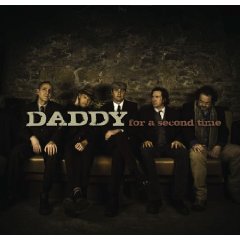
Making their debut with a live album, the side project collaboration between Will Kimbrough and Tommy Womack now follows up with a studio set that ably taps into their stage energy and underlines their Southern rock roadhouse band heritage.
With John Deaderick on keyboards and Dave Jacques and Paul Griffith providing the rhythm section, they confidently walk a path trod by the likes of the Allmans, Marshall Tucker Band and the Stones before them. Indeed, Nobody From Nowhere features a percussion motif not a million miles away from Sympathy For The Devil while a similar Stonesy bar room swagger carries along Womack's Early To Bed, Early to Rise. A marriage of Iko Iko and Bo Diddley riff drives the lyrically playful goodtime shrugging boogie Wash & Fold while organ led instrumental Love In A Bottle hits a swampy Creedence groove.
Mouth harp, saloon piano and slide guitar provide a suitably dirty blues bedrock for I Want To Be Clean which features a guest shot from Todd Snider and in places sounds like a slowed down Rainy Day Women #12 & 35.
Not too surprising then to also hear Dylan's influence at work on the Highway 51 barrelling I Went To Heaven In A Dream Last Night, rambling acoustic folk blues Redemption Is The Mother's Only Son and, even approximating Bob's nasal drawl, their soulful r&b flavoured cover of Mike Milius' Guthrie-esque 1968 song The Ballad Of Martin Luther King
Probably more likely to fill venues than shift albums perhaps, but this is solid listening from musicians who know and respect their roots.
Mike Davies March 2010

Whatever level of success he attains or respect he deservedly earns, Will Kimbrough will always be undervalued. The reason is simple, he is one of the best songwriters and singers working today.
But Daddy offers far more than simply Will Kimbrough because he is joined on stage by Tommy Womack - bringing back memories of their days as bis-quits - John Deaderick, Paul Griffith and Dave Jacques in what was clearly a night to remember. No disrespect to Deaderick, Griffith or Jacques but this is in essence Kimbrough and Womack, the pair write the album (apart from a magical The Powers That Be/Ooh La La segue) and they play their songs like their lives depended on them
On this live CD, recorded in front of family and friends at Frankfort's Women's Club (Frankfort Kentucky), the band obviously feels comfortable enough to let rip and the result is some God-fearing country and some blues/rock that'll put the fear of God into you.
The explanantion behind the band's name is because none of its members are in the first flush of youth and, as anyone can tell you, no-one plays guitar like your Daddy. The second explanation appears to be the most plausible because you'll hear things you've never heard before and guitars treated in a way that becomes almost cruel.
The opening track Glory Be stays true to its title, it and Cold Chill are irresistible calls to the faithful rather than the merely tracks in a gig. After that, if it weren't musicians of the calibre of Womack and Kimbrough the album could be affectionately sub-titled 'youth recaptured', it is unashamed and unadulterated guitar rock. Gloryland, which finishes the album, sounds as if its being played with the fires of hell lapping at the band's feet.
If Daddy is a side project for both Kimbrough and Womack, then they've redefined the term. I can think of one world renowned guitarist whose side project isn't worth the name but this is energetic, passionate and all are fully commited to it and take it as 'seriously' as they would their 'day jobs'.
But for all the fire and brimstone it's the quality of the songs that stands out Womack's 'I Miss Ronald Reagan' sounds like it should be piece of nonsense verse but in fact it uses its lightness and wit to drive home a serious point and in the end you'll find yourself nodding in agreement, while Nightmares becomes a self-fulfilling prophecy.
Daddy At The Women's Club is certainly more rock n roll than you might expect, although Happy In Your Skin and Cousin Darryl are superb slices of flyblown, lazy river, country blues, enchanting and easy on the ear.
But whatever the style or genre, Kimbrough and Womack have produced an album that is a joy from first to last and one that provides an experience that could surely only be bettered by being there when it was recorded.
Michael Mee, February 2006
Steve Daggett - Songs In A Carrier Bag
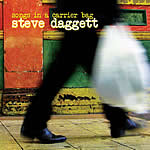
The title of Steve Daggett's new album sums up the delight and the dilemma which surrounds a singer/songwriter who is one of the foundations on which north east music is built.
Songs is an accurate, if slightly emotionless start but then up leaps the self-deprecating In A Carrier Bag suggesting a humbleness which is misplaced. There are some with a tenth of Daggett's talent who shout twice as loud about it.
If the category exists then Steve Daggett is the singer songwriter's singer songwriter. His passionate performance of The Ballad Of Jimmy Forsyth, accurately mirrors the passion of the writing.
It is also a typical Steve Daggett song, deviod of pretension it is plain speaking and beautifully visual. Daggett's spare but emotive use of lyrics is onl;y one of his many strengths.
Daggett at times plays down the depths his songs reach but Pretty Useless is a biting and compassionate, confessional love song. It could easily be any one of us looking in the mirror at that particular track.
Folk artists, because that is what he undoubtedly is, are sometimes thought of as unnecessarily intense and introspective but Daggett is the exception there is an openness and robustness about his music. He has a big talent and a big heart both of which are on display on Songs In A Carrier Bag, it's just that title.
Michael Mee
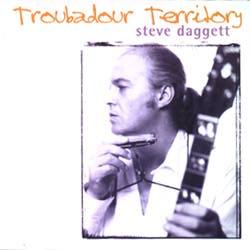
Steve has been around in the music industry for many years, working with the likes of Stiletto, Ronnie Lane, The Fabulous Poodles, and latterly Lindisfarne. It was with the North Eastern combo that he developed a fast friendship with the late, great Alan Hull, and on this, his first solo album the influence is clear.
The arrangements are generally sparce, with mandoline and acoustic much to the fore, accenting Steves' gravelly vocals, something of a cross between Dylan, Tom Petty and suchlike.
But it is the songs themselves that make this on of the best singer/songwriter collections that I have heard in a long while. Highlights are 'Mandoline Moon' - a tribute to Alan Hull - the lyrics containing the titles of some of Alan's songs, 'Just to see You Smile' - very reminsicent of Petty's 'Don't Come Around Here No More', but individual nevertheless. 'Rise' is a heartfelt exhortation for better things to come, 'Love Song (part one)' is simply beautiful - the track of the album.
'Live Your Life Your Own Way' has a wonderful dulcimer and border pipe arrangement, 'Have a drink' is a bit of Geordie fun. 'Always on my Mind' reminds me of early Neil Young, with some nice harmonica and lyrics of longing. 'Evening World' gently rounds of this most impressive release. Cracking album!
Jon Hall
Two top-class albums within the space of a year from this award-winning bluegrass duo, who appear to have made 2008 "their" year after seemingly coming out of nowhere (although they've been members of the bands of Doyle Lawson and Rhonda Vincent for some years). Although they're both fine instrumentalists in their own right, their true speciality is their terrific close-harmony singing (think Louvins, Monroes, Stanleys), which is demonstrated loud and clear on these faithfully-recorded discs (which form the duo's second and third releases). Jamie's brilliantly confident high tenor lines in particular are a real joy.
Brothers From Different Mothers pushes the standard bluegrass envelope by giving the D&V treatment to a healthy range of exceedingly well-chosen material - from the glorious southern gospel of When I've Travelled My Last Mile (from the repertoire of Jamie's dad's group The Four Js) and classy self-penned numbers like Girl In The Valley to exhilarating covers of Gillian Welch/David Rawlings' Winter's Come And Gone and the breezy Statler Brothers pop-country single Years Ago and solid tear-jerkers like Ron Spears' Please Don't Let Our Sweet Love Die and the deeply emotional album closer On The Other Side (from the pen of Jimmy Fortune). To help Jamie and Darrin realise their powerful bluegrass-inspired vision, their gorgeous thrusting harmonies are perfectly encased in jewel-like instrumental settings that utilise a goodly dozen special guests including Ron Block, Stuart Duncan, Tim Crouch, Adam Haynes, Andy Leftwich, Bryan Sutton, Jeff Parker and Joe Dean Jr. Well I may've said it before, but never I suspect with such conviction - bluegrass-inspired albums really don't come any better than this: I mean it!
Singing From The Heart is a slightly different animal: a rousing set of 12 acappella gospel and spiritual songs, recorded as a special project to benefit Tennessee Bible College (yet the idea came about in 2001, long before the men came together as a duo). The intention in choosing the songs was that 95% of the listeners would know 70% of them well enough to sing along, the remainder being new enough to generate interest in the developing Dailey & Vincent repertoire, and that aim's certainly been achieved! Even though (as the liner notes honestly admit) cues are taken from time-honoured arrangements of earlier gospel ensembles (Golden Gate Quartet, Oak Ridge Boys, the most well-known of the pieces still sound entirely freshly conceived in these wonderful Dailey & Vincent settings. The old chestnut Farther Along has probably never sounded better, and the uptempo African-American spirituals like Moses Smote The Water, Don't You Want To Go To Heaven and Joshua Fit The Battle Of Jericho really rouse the hackles.
Most of the songs incorporate the awesome bass tones of Glenn Dustin, providing a steady "movable bedrock" of constant interest, while a host of other guest singers help to swell the texture beyond Jamie and Darrin's own superlative voices. Molly Skaggs adds her own special tenor to an intriguing rendition of Amazing Grace (which enjoys a key-change on every verse!), and also appearing variously include Tony King, Anthony Facello and Andy Ball, with the incomparable Doyle Lawson singing baritone on Near The Cross. In every respect this is an exemplary gospel album, and very very uplifting indeed.
If you've any feel for classic "brother duo" bluegrass-cum-country and top-flight Americana, then you'll revel in this truly marvellous pair of albums, whose only deficiency is their unfortunate brevity (only just over half-an-hour apiece).
David Kidman December 2009

An acoustic folk duo with harmonies (a blend of alto and soprano) to die for and jangly acoustic guitar strums, the easiest touchstones for reference would be the Indigo Girls or the Dear Janes, though you'll also hear nods to Emmylou and the Everlys.
Trading in matters of the heart, their songs pluck resonant emotional chords and come armed with a nice line in memorable lyrics. Case in point, the opening Lonely Girl with sports the line 'she wears her body like a lifetime achievement' and talks about favouring connection over one night stands as they sing how they'd "rather be alone than someone you take home."
Alive, keeps the momentum rolling with its jangling bounce and a singalong 'we are fearless' chorus hook that positively bristles with pop sensibilities. The same's true of the album's lead single, the handclapping beat 50s throwback flavoured Levi Blues while, voices soaring, sorrow laced piano ballad Horses is like an alchemical marriage of Neil Young and Emmylou.
Whether the plangent mid-tempo strum of fame vs love Northern Lights ("she's got a French last name and a home made hula hoop"), the melancholic acoustic guitar brooding Compass or the hymnal quality of the Art Garfunkel-like Stand In Awe where the notes hang on their breath in the autumnal air, there's not a false step throughout.
Earlier this year they were the only Canadian act invited to perform at the 50th anniversary of the Newport Folk Festival. If you think that suggests they're a little bit special, you'd be very right.
www.dalagirls.com
www.myspace.com/dalagirls
Mike Davies October 2009
Heather hails from Toronto; she writes and performs her own material, which is forthright storytelling-folk, mostly with a distinct Celtic bent (tho' happily without the unfortunate feyness that tag implies) and sometimes incorporating local-legendry in the vein of, say, Tanglefoot. Some of Heather's previous four albums have embraced detailed dealings in Arthurian legend, but the focus here is more wide-ranging, taking in the Irish hero Oisín (Adrift), the Decameron (the racy Up Into The Pear Tree), Maid Marian (Confession) and Inuit mythology (Sedna - a disc highlight that reminded me a little of Burning Times), and as often as not using myth as metaphor (Medusa). Heather's songs have much to offer, especially when performed and arranged as persuasively as they are on this disc - and she has a really good voice too. The Greyhound is a stirring tale of maritime tragedy, whereas the title track is a catchy acappella-with-percussion celebration of the spirit of the pilgrimage, set to a suitably sinuous and exotic melody. Heather's voice (and approach) have been compared to Loreena McKennitt and Sarah McLachlan, and on songs like Hunter the comparison is apt, with its tasteful neo-classical setting reinforcing that impression. The two non-originals on the album are good choices too: first there's Graham Pratt's Black Fox (one of those rare hunting songs where the fox actually wins!), which is followed by the rousing (but less often heard) Stan Rogers song Flowers Of Bermuda. The instrumental settings Heather employs are inventive and well considered, utilising guitar, cello, violin/fiddle, recorders, piano, and often bass and drums too, with occasional exotica such as both varieties of dulcimer, bowed psaltery and didgeridoo sparingly used, but the arrangements are always attractive and accessible if at times the sheer smoothness and level of accomplishment seems a trifle too easily won perhaps. Even so, The Road To Santiago adds up to much more than just another predictably appealing slice of Canadian Celtic which it might at first appear to be. Presentation is excellent too, with notes and full song texts.
David Kidman March 2008

With half of the songs tributes to her dad, somewhat inevitably there's an air of grief therapy about things as she celebrates his life and ponders their relationship, the title track a bittersweet reflection on 'precious time wasted' in not getting to know him better and about conversations never had while the likes of I'm Your Child, One Year On and Rainbow ("the passing of time is a healer") are all fairly self-explanatory.
Elsewhere she's to be found examining herself on the likes of Lost Girl and This Is My Skin or singing about loves and relationships gone (Alive), found (Breath of Live) or questioned (Funny Little Mystery). Possessed of a smoky honeyed voice, musically you'll hear shades of both Carole King and (on the catchy Funny Little Mystery especially) a less quirky Tori Amos in her spare piano ballads while the English pop acoustic strums of things like the summery Alive call to mind Harriet Wheeler of The Sundays and the rockier blood of This Is My Skin bears hints of Sharleen Spiteri. She has a firm grasp of melody, letting her voice soar or float as the mood requires and while a couple of the tracks tend to drift away into meandering folksiness with slightly 5th form girlie poetry lyrics for the most part this marks her a talent to keep an eye on.
Mike Davies
This Cornish outfit has been proudly flying the flag for the region's indigenous music over the course of ten years and three albums; indeed, band member Neil Davey was (with his group Bucca) one of those responsible for kick-starting the Cornish traditional music revival back in the 1970s.
Now Dalla returns for a further persuasive invocation of the magic of Cornwall; Cribbar is a lively and compelling portrait of its music and traditions, on which multi-instrumentalist Neil is joined once again by clarinettist/singer Hilary Coleman and singer/darabuka player Bec Applebee, along with new recruit, guitarist and crowdy crawn player Steve Hunt. Through a well-engineered sequence of tunes and songs, the flavour of Cornish traditions is authentically evoked in performances that are uplifting, committed and energetic. Those class acts Tanglefoot and Churchfitters might most immediately spring to mind as ready-made comparisons, but Dalla unquestionably possess their own distinctive and piquant regional identity.
Cribbar's opening track has a strong link to Neil's childhood home; the sound of the Huer's Horn ushers in an account of the troyls (parties) once held at Newquay harbour's fish-cellars. The disc then goes on to parade before us a veritable local pageant incorporating a bewildering, and intensely satisfying, variety of music. First there's several rollicking sets of tunes, bringing in the traditional kabm pymp (Cornish five-step), oll adro, jowster and furry dance; some are given an almost klezmer feel by Hilary's clarinet, some showcase Neil's dazzling bouzouki playing, while others include guest musicians on accordion, viola or gaita bagpipes. And the invigorating Talla Rooz might be thought of as a Cornish equivalent of Gaelic mouth music.
As respite from the dances we're treated to a gorgeous, hypnotic chiming Ann Tremellan (a Cornish version of Barbara Allen), a sensitive rendition of "witchy" Maggie May (the late-19th-century American song popularised in Padstow by Charlie Bate), a vivid dream-inspired composition of Hilary's (Turning Of The Tide) and a pot-pourri segment of the dramatic music from Bec's one-woman theatre show telling the story of Cornish highwaywoman Mary Bryant (was she a distant relative, I wonder, of master Cornish songwriter Roger Bryant, whose rousing Falmouth Packet forms the basis of an earlier track?).
Throughout, Dalla prove to have a keen ear for innovative instrumental and vocal blending while making great capital out of their traditional sources. Cribbar! I cry – for this mighty wave of Cornish music is breaking on your shore: so prepare to be engulfed by the tide.
David Kidman August 2010
This Cornish outfit has been proudly flying the flag for the region's indigenous music over the course of ten years and three albums; indeed, band member Neil Davey was (with his group Bucca) one of those responsible for kick-starting the Cornish traditional music revival back in the 1970s.
Now Dalla returns for a further persuasive invocation of the magic of Cornwall; Cribbar is a lively and compelling portrait of its music and traditions, on which multi-instrumentalist Neil is joined once again by clarinettist/singer Hilary Coleman and singer/darabuka player Bec Applebee, along with new recruit, guitarist and crowdy crawn player Steve Hunt. Through a well-engineered sequence of tunes and songs, the flavour of Cornish traditions is authentically evoked in performances that are uplifting, committed and energetic. Those class acts Tanglefoot and Churchfitters might most immediately spring to mind as ready-made comparisons, but Dalla unquestionably possess their own distinctive and piquant regional identity.
Cribbar's opening track has a strong link to Neil's childhood home; the sound of the Huer's Horn ushers in an account of the troyls (parties) once held at Newquay harbour's fish-cellars. The disc then goes on to parade before us a veritable local pageant incorporating a bewildering, and intensely satisfying, variety of music. First there's several rollicking sets of tunes, bringing in the traditional kabm pymp (Cornish five-step), oll adro, jowster and furry dance; some are given an almost klezmer feel by Hilary's clarinet, some showcase Neil's dazzling bouzouki playing, while others include guest musicians on accordion, viola or gaita bagpipes. And the invigorating Talla Rooz might be thought of as a Cornish equivalent of Gaelic mouth music.
As respite from the dances we're treated to a gorgeous, hypnotic chiming Ann Tremellan (a Cornish version of Barbara Allen), a sensitive rendition of "witchy" Maggie May (the late-19th-century American song popularised in Padstow by Charlie Bate), a vivid dream-inspired composition of Hilary's (Turning Of The Tide) and a pot-pourri segment of the dramatic music from Bec's one-woman theatre show telling the story of Cornish highwaywoman Mary Bryant (was she a distant relative, I wonder, of master Cornish songwriter Roger Bryant, whose rousing Falmouth Packet forms the basis of an earlier track?).
Throughout, Dalla prove to have a keen ear for innovative instrumental and vocal blending while making great capital out of their traditional sources. Cribbar! I cry – for this mighty wave of Cornish music is breaking on your shore: so prepare to be engulfed by the tide.
David Kidman August 2010
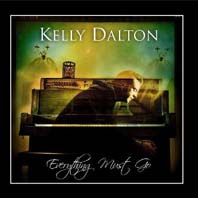
The son of Dan Dalton and Lois Fletcher, members of 60s folk outfit Back Porch Majority, the New Yorker went through various indie rock outfits and albums before finally finding his inner singer-songwriter through which to channel those James Taylor and Simon & Garfunkel influences.
Dealing with themes of loss, addiction, change and personal struggles, this is his second solo album and finds him occupying the piano and acoustic guitar stage, songs occasionally given additional warmth with strings and mandolin, the voice reminiscent of Cat Stevens.
While Seen It All picks up the tempo and The Message turns on the bluesy rock guitar and moody solos, the bulk of the album is low key introspection with Dalton working through the melancholic emotions with simple arrangements and accompaniment. It's when he's so exposed that he cuts deepest, the stand-outs coming in a pack of three with the folk shaded sadness of Forgotten, slow piano waltz It Comes Easy and the violin caressed Rescue Me.
The only disappointment is the closing track, Hang On, the album fading away on a harmonica led instrumental when what it needed was the come down soothing ebb of his vocals to leave you wanting more.
Mike Davies October 2010
An unusual album this - 27 tracks of solo piano, playing repertoire drawn principally from the American fiddle tradition, mostly in an appealing and neatly mobile ragtime groove, with hints here and there of New Orleans stride or boogie styles. Apparently, Colm's known in old-time circles as a guitarist and occasional fiddler, but it's clear from this home-produced CD that he's no mean pianist too! In fact, it's also a good bet that you'll not have heard this music played quite like this; to some it may sound a potential recipe for disaster (on paper at least), but I find it stimulating and intriguing, not least because it points up the close (and under-appreciated) kinship between the traditional fiddle tunes and the ragtime of Scott Joplin and his era, and how naturally the latter developed in full knowledge of the former from the sprightly minstrelsy of the cakewalk players.
Aspects of ragtime technique abound, such as ornamentation and trills, while heavy syncopation often takes the place of the four-square rhythmic orientation of the original dance tunes. Remember how Joshua Rifkin's deliberate and unhurried renditions of Joplin invoked charges of "heresy"?!; well, this ain't heresy either, but again just a different slant on the music, and is most refreshing. Colm's "walking bass" has an enviable solidity, but occasional unavoidable imperfections elsewhere in his playing don't matter a jot, as he effortlessly and naturally communicates his enjoyment of the music with a good-time vibe in every bar (and juke-joint!). He's not afraid to exercise expressive rubato on the less pacey numbers like Ashokan Farewell and Margaret's Waltz either, and he's not averse to a bit of henhouse vamp (as on Growling Old Men), while he also relishes a bit of Jerry Lee Lewis when the mood takes him; to his credit, though, his approach is so fully-formed that none of these influences seems out of place within the context of his treatments of the material.
homepage.ntlworld.com/colm.daly
David Kidman
Way back in 1977, Jackie Daly - once of De Danann and Patrick Street and latterly dubbed by the New York Times as "probably the best accordionist in Ireland" - released his debut solo album. Topic made it the final volume in their Music From Sliabh Luachra series, which presented landmark recordings of the music of the border area between Cork and Kerry – although the record has also been intermittently available on the Green Linnet and Ossian labels too over the years. Jackie, who grew up in the north of Co Cork, was at the time the recording was made at the peak of his powers, and, rightly acknowledged as a virtuoso, already famed for his experiments in tuning the accordion, encouraging the popularity of the C#/D accordion played in the older "press and draw" style.
The strength the music derives from this approach is tangible, as the 15 selections on this disc (the majority being traditional tunes sourced from the Newmarket area of north-west Cork) amply demonstrate – for whether on polkas, slides, airs, reels or hornpipes, Jackie's playing is both invigorating and persuasive, and the disc's 42 minutes just fly by (even though there are no other musicians present). On four of the tracks, Jackie moves to anglo concertina, and on one set of polkas he takes up the single-reed accordion. Versatility and musicianship go hand in hand here. This treasurable disc certainly deserves a pride of place in the illustrious parade of releases that celebrated Topic's 70th anniversary last year.
David Kidman December 2010
p>Raised in New Jersey, but resident in Germany, D'Amico's polished up the sound for her sophomore album, producer and guitarist Badley Kopp making this rather more soft rock than her sparse folk-country debut.
The good news, though, is that the songs still hew to her themes of light and dark, looking both outward and inward to explore how, as she sings on strummed soulful slow builder Stubborn Land, how people get to where they are. She's good at getting inside both her own skin and that of others. With a clever use of imagery, This House is a liltingly lovely but sad examination of a relationship coming apart stone by stone like the home the couple built, wondering if it's possible to plaster over the cracks, backed by soul country organ and bluesy guitar Inside Out addresses a similar notion of covering up the hurt while Der Grenzer, a song about the wall that divided Germany, is sung in the voice of a border guard questioning orders and moral loyalties.
I can see how her trebly, nasal voice could grate on some ears, but when you're presented with numbers such as Beneath The Rubble's account of searching for survivors after a disaster, the doomed lovers of the pared back Star-Crossed and the gentle This Is My World it's well worth persisting.
Mike Davies June 2011
Marybeth D'Amico - Heaven, Hell, Sin And Redemption (Own Label)
Marybeth's an American singer-songwriter living in Germany, a former journalist whose epiphany came with her discovery, around four or five years ago, of the songwriting of Patty Griffin (and later other less well-known writers including Lori McKenna and Deb Talan). Marybeth's stock-in-trade is melody-driven, surprisingly upbeat-sounding songs that trade stories of characters with shadowy secrets and often dubious habits. This turns out to be her first full-length album, and it's a confidently managed set on which she's been fortunate to engage the services of producer/bassist Bradley Kopp and a crew of musicians comprising Lloyd Maines (pedal steel, dobro), Richard Bowden (violin), David Webb (keyboards) and Paul Pearcy (drums). The album was well received in Europe on its release last summer, apparently, although reviews of its predecessor EP were mixed. Evidently the support team has provided the catalyst here for Marybeth to deliver the goods musically this time round. This album exhibits a lightly-worn classiness, a listener-friendly pop-country-folk-Americana feel that belies the fairly dark nature of its content, in which aspect it's been (quite fairly I believe) compared to the work of Kathleen Edwards. Marybeth sings well, with conviction and a quality of believability that stems from her direct, no-nonsense delivery; she makes the best of a voice that may not be considered the most individual. Another significant plus is that maybe you don't exactly expect a lady singer to convince when portraying a male protagonist, but Every Week and Ohio (in particular) really hit home. There are occasions when reading the lyrics in the booklet gives a more potent sense of their poetry than listening to the record, but on the other hand (and especially on third or fourth play), luckily the melodies and arrangements entice and hook sufficiently to prevent the lyrics from being too easily glossed over, so one's emotions are engaged from the outset on virtually every song. The album's unity derives from the fact that Marybeth's characters are real, and realistically depicted, and this record is a sufficiently distinctive and credible first-stab that should make something of a mark in a rather crowded marketplace, especially when backed up with a forthcoming UK tour (June 2009).
www.marybethdamico.com
www.myspace/marylisbeth
David Kidman January 2009
That rather twee and perhaps overtly chummy name conceals what's actually a fresh-sounding young duo from Warwickshire who here present their debut CD, a collection of self-arranged songs (mostly traditional in origin) with some tunes thrown in for good measure. Majoring on the exceedingly pure (=read also sibilantly pretty) vocal tones of Susie Bones with brother Dan on guitar, Danansooz give us some thoughtful, interesting and generally audience-friendly takes on those songs. Glancing at the track-list, well, many of these you'd think you've probably had enough of during the recent folk revival. But do stop to listen - starting with the duo's adventurous, melancholy, minor-key take on Bonnie Light Horseman; although there's a modicum of additional instrumental backing (including a piano keyboard), it's ably and attractively managed and does not intrude on Susie's interpretation of the text. A similar degree of thoughtfulness is much in evidence on the majority of the songs here, from an unusually sprightly Shamrock Shore to a tender Lass Of Glenshee. Susie's acapella rendition of Searching For Lambs (where she benefits from doubletracking with her own harmonies) is both brave and proficient, and works well. Some might feel that Susie's sheer beauty of tone isn't quite enough to carry Song For Ireland to its lofty heights, but hers is still a believable interpretation, and the fiddle and piano backing (courtesy of Joe O'Donnell and Peter McDonald respectively) is certainly a very lovely touch. Other friends marshalled for the recording include Harriet Bartlett, Ian Hartland, Mabel Morgan and George Van Ristell, and they provide neat and unobtrusive embellishments to Dan's guitar and bass and Susie's whistle at various times. The duo's playing on the tunes (which crop up mainly as codas to songs) is commendably efficient and provides the necessary variety in timbre to keep our interest. Very occasionally I feel there's almost a too self-conscious desire to be different or to make an impression, but, a few slightly mannered interpretative quirks aside, Danansooz exhibit a naturalness and bright, keen edge to their treatments of what are viewed as overly well-worn songs, and they display a clear-sighted sense of enterprise which is to be encouraged. Benji Kirkpatrick's composition Tolling Bell makes an unusual and effective choice for closer, capped by a performance of Paddy McCarthy's Reel. This is a very pleasing release: a most credible debut, and with the right exposure (and possibly a change of name?) I'd forecast greater things for Danansooz.
David Kidman
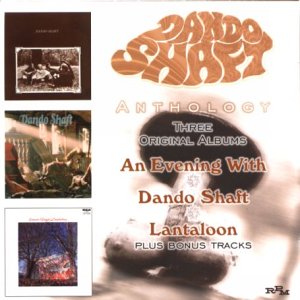
David Kidman
The Dandy Warhols - Odditorium Or Warlords of Mars (Parlophone)
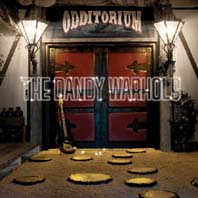
Popular wisdom says that the Dandys have never really produced anything to match Bohemian Like You, the song that struck them lucky by being picked up saturated all over a Vodafone commercial. This is clearly nonsense. They may not have become world dominating superstars, but Courtney Taylor-Taylor and the band have consistently turned out interesting and at times irresistible material both before and after the HIT.
Following on from the Nick Rhodes produced electro washed Welcome to the Monkeyhouse, they've sort of gone back to basics with an album (named after their studio) that rocks in the same way as acknowledged blueprint Primal Scream and rather obvious reference point, the Rolling Stones. Indeed, in the spoken word intro spoof that charts the band's shift from banjo playing hicks to seminal rocking influences on Bill Haley and Elvis, the narrator even 'quotes' Courtney as saying 'it's only rock n roll but I think I like it'.
They don't ease you in either. The first track, the stunning Love Is The New Feel Awful, is a nine and a half minute epic of swirling psychedelia, martial beat, plangent guitars, wailing sax and Hawkwind freak out midsection that takes your breath away. They don't give you time to recover either, following up with seven minutes of Easy with its snaky hissed breath vocals and Stones on funky heat rhythmic strut. And while they're in a Stones mood they let slip All The Money Or The Simple Life Honey that reminds you of what Jagger and Richards were capable of when they were lean and hungry bad boys.
It's not all Rolling rock though. The New Country is a thigh-slapping hoe down with its tongue planted firmly in its musical cheeks, complete with yeehawing whoops, Holding Me Up harks to My Bloody Valentine while Smoke It and Down Like Disco are Stooges garage punk riff pounding mayhem and Everyone Is Totally Insane and the close on 12 minute blues moaning strung out closer A Loan For Tonight take their cues from 80s electro, the former a nod to Duran, the latter a Depeche Mode style dark sludgy dirge that sounds like they're writhing on their deathbed, guts churned with poison. They're not, in fact they've probably never been healthier. Their red planet is clearly in a most auspicious orbit.
Mike Davies
Hands up those who don't know the name of Barbara Dane! Not all that long ago I would've been one to do so, I'm ashamed to admit, tho' I suppose it's mostly because I just wasn't around the right part of the scene at the time. For Barbara was primarily a blues singer, and this album, formerly entitled When I Was A Young Girl, was her only true folk recording. Originally issued in 1959, it came as a bold awakening for many fans who were hitherto unaware of Barbara's deep folk roots. Barbara's singing is extraordinary, her gorgeously dark timbre bringing a powerful blues sensibility to these songs which comprise such an important part of her heritage.
It's no exaggeration to say that listening to Barbara on tracks like When I Was A Young Girl, Turkey Reveille (a variant of Golden Vanity) and Nine Hundred Miles, you could easily be forgiven for not realising she was a white woman, so amazingly soulful and gutsy is the way she uses her voice. No wonder that on its original release this LP garnered such considerable attention - even securing a major feature story in Ebony magazine - and no wonder that artists from Janis Joplin to Tracy Chapman have cited Barbara as a big influence, tho' I suspect you'll hear many more contemporary singers who've (possibly unknowingly) been influenced to some extent by Barbara. And now, after almost fifty years of musical water have flown under that ol' bridge, it's still headline news in my opinion as regards quality of music-making is concerned.
Barbara's voice and guitar are augmented on many of the tracks by Tom Paley's deft, idiomatic banjo or guitar. All of which adds up to an essential purchase that's likely to open your ears and provide you with must-hear-and-keep versions of some now-well-travelled traditional material. This excellent reissue comes complete with full original liner notes too.
David Kidman January 2007
Luke Daniels and Jonathan Preiss - Above The Bellow (Gael Music)
Button-accordionist and singer Luke was winner of the Young Tradition Award in 1994, since which time his career has involved stints with De Dannan and the Riverdance band, working as a songwriter alongside Eleanor Shanley and with such prestigious musicians as Arty McGlynn and Cathal Hayden. His career to date has been anthologised on a Wren Records release The Secret Sessions, which I intend to review at a later date, but it's no secret that Luke's an extremely talented player. Ever since he and guitarist Jonathan Preiss worked together on Howard Shore's music for Lord Of The Rings at the RAH, Luke's been busy preparing the material that has become Above The Bellow. Jonathan's best known for his work with the London Guitar Trio and Brazilian jazz project Caratinga, and his seven-stringed instrument brings to this album of roughly half-traditional, half self-penned material an intimate and subtle classical styling with engaging overtones of Brazilian and folk inflections. Luke's own playing is on a technical level highly proficient and a distinctive presence throughout the CD as you'd expect, but in terms of phrasing Luke can sometimes be quite self-effacing, stepping back from the limelight, and there are times when one could almost argue that it's Jonathan's warm and almost telepathic complementary guitar work that provides the album's primary musical and textural signature. Jonathan's contributions are gently virtuosic and always most intelligently considered, certainly more so than guitar accompanists are normally given credit for, and there's a lot more going on across the fretboard than it's possible to take in on one or even two playthroughs (I'm still getting the measure after half-a-dozen!). The opening track (The Road To Salalah) provides a good example, wherein melodic and rhythmic embellishment alternates with counterpoint in an ever-changing permutation, the instrumental lines weaving around each other in intriguing empathy. Jonathan's harmonic adventurousness comes to the fore on the musicians' arrangement of Long Acre, where shifts and variations in tempo and pulse between the two instrumental parts provide felicitous and unexpected contrasts of mood. Both musicians demonstrate their aptitude for a variety of instrumental styles, from the spiky verve they bring to straightforward traditional tunes like Bobby Casey's to the stylish Parisian café-music ambience of Musette à Teresa. Among the CD's ten tracks will be found three songs (two of which are Luke's own compositions), where Luke handles vocal duties in an attractive, drawling, laid-back manner that's reminiscent of Bert Jansch (especially on Way Back Home) but in the final analysis is probably a bit lacking in presence in terms of enunciation and not always seeming to identify with the words. That minor consideration aside, I'm very impressed with the musicianship and performances on this CD. However, I'm not anything like as impressed with the accompanying booklet; firstly, it's decidedly deficient as regards background information on the music performed, but secondly, it's got the composition credits for several of the tracks mixed up – track 3, The Silver Spire, is traditional, whereas track 4, A River Runs, is one of Luke's compositions, and – more seriously – track 6 (Field Behind The Plow, a cover of the beautiful Stan Rogers song) is mis-credited as track 9, while to compound the injury Stan's surname is even misspelt Rodgers… unforgivably careless!
www.queen-mab.com/index.htm?home
David Kidman
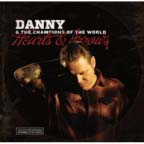
If Slim Chance's folk-country was the direction in which last year's Streets Of Our Time looked to be travelling, those approaching the follow up expecting to travel further down the Ronnie Lane will be surprised to find that Danny George Wilson has chosen to head along the blue collar E Street instead.
Fronting yet another new line-up and sporting a Stratocaster on the album's back cover, Wilson's unleashed his inner rock n roller with all the attendant anthemic choruses, power chords and air-punching sentiments.
Opening track Ghosts In The Wire leaves you in no doubt that things have changed, roaring out of the traps with an insistent drum beat and circling guitar figure that finally explodes around 90 seconds in. Given Wilson's Bruce-like delivery, the only things it lacks are Roy Bittan's piano and a roaring Clarence sax break. And, just to show he means business, Heart & Arrow keeps things moving with a thundering drum roll into and gunslinger guitars.
If anything, he's perhaps gone overboard on the Springsteen with lines about hiding in the alley waiting for glory, backseats, sha la las, leaving 'this town' behind and Billie and Jeannie looking for, if not magic in the night, then a similar teenage sound not to mention such titles as On The Street (which sounds like a lost out-take from The River), Soul In The City and, nostalgic friendship's bond stand out, Brothers In The Night.
But he's not the first to release a record in thrall to the Boss (who, after all, has even endorsed and played on soundalikes' albums) at the end of the day it comes down to how good it is in its own right; and this is pretty damn good indeed.
Produced by Tony Poole of Starry-Eyed and Laughing fame and mixed by Ted Hutt (whose Gaslight Anthem connections are apparent here) there's barely a track that doesn't sound like it was built to get stadium crowds on their feet, though the sparse acoustic Too Tough To Cry (see Tom Joad for musical reference) offers ballad respite and Walk With Me closes up shop in If I Should Fall Behind mood.
It isn't exclusively a Bruce fest, however. It's hard not to think of Rick Springfield's Jessie's Girl listening to the guitar chug and melody line of You Don't Know (My Heart Is In The Right Place), Every Beat Of My Heart has those McGuinn 12 string arpeggios, while Colonel And The King, a song about Elvis and Tom Parker, is pure Neil Young.
Not an original sounding album by any means, but the songs have genuine heart and soul, the music fires up your blood and the band sound like they had as a great a time making it as you will playing it.
Mike Davies July 2011
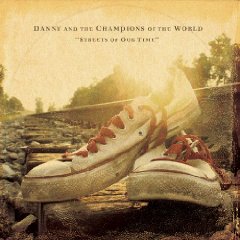
The follow up to 2008's self-titled band debut finds Danny George Wilson and his fluid line up of musicians edging even closer to Slim Chance, the folk-country outfit founded by one of his musical heroes, the late Ronnie Lane. Indeed, Henry the Van, a mandolin strummed campfire song about the demise of the faithful tour bus en route to Aberdeen, even includes a line about the romance of the road and a poacher.
That homespun feel of back porches and dusty byways runs throughout, evident noticeably on the pedal steel coated Appalachian flavoured Wandle Swan a reference to a South London river and the fiddle and banjo rousing bluegrass and Irish stomp of Parakeets.
Lane's not the only influence to ring clearly. The steady rolling Follow The River nods to Springsteen's optimistic romantic nostalgia, complete with a Clarence Clemons style sax solo, the keening Bluebird harks to the West Coast colours of CS&N, Restless Feet takes a Neil Young like wistful stroll through memories of youthful dreams, and the pedal steel jaunty Lose These Rags recalls Gene Clark.
The People Here (Shine A Light) is a bit of a mess with its gospel chorus and jerky verse rhythms and various instruments trying to elbow their way in, but otherwise, steeped in the weary but contended melancholia of passing years that imbues Streets Of Time, these are streets well worth the walking.
www.thechampionsoftheworld.org
www.myspace.com/dannyandthechampionsoftheworld1
Mike Davies January 2010
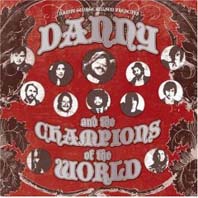
That will be Danny George Wilson then, Australian sometime singer with Grand Drive, welcoming along members from The Brakes, Electric Soft Parade and Goldrush to create his second solo album, the follow up to The Famous Mad Mile. Where that adopted a simple campfire acoustic approach, this time round (taking its title from Roald Dahl's novel) things are a little lusher with brass, strings and even a dash of sitar adding extra textures to his self-described 'celebration of collective yesness'.
Co-written with Neal Casal, opening track The Truest Kind sets the vibe with its strummed guitar, Wilson's warm croon, backwoods hula society humming harmonies and a melody that strokes the sun from the sky.
Neatly dividing itself into the bouncy upbeat and dreamy slower numbers, the former's gorgeously represented by the jubilantly summery The Ghosts And Me and the good times by the creek These Days while a hillbilly CS&N styled bluesy folk Shadow Of The Wolf and Red Tree Song with its air of hilltops and clear skies are prime examples of the latter.
There's only eight tracks, but three of these clock in at over seven minutes with two of them proving the album highlights; the plaintive confessional I Still Believe which builds slowly to almost Polyphonic Spree proportions, and the epic When The Summer's Gone, a majestic number that starts out as a simple backporch, mandolin rippling folk and, introducing brass, swells to a tumultuous, heart-bursting street parade finale. Pure yesness, indeed.
www.thechampionsoftheworld.org
Mike Davies May 2008
Danú - One Night Stand - DVD (Danú)
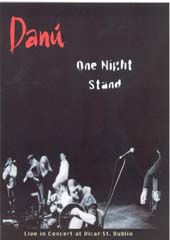
MAGIC! TREMENDOUS! ONE OF THE BEST DVDs I OWN! ? Well you asked me to be honest didn't you? The snag is always what else to say about a band whom I've already praised to the skies reviewing their CDs, what more can you say?
OK, I accept the challenge, reluctantly. The majority of this DVD is a no-nonsense record of a concert Danú gave at the famous Vicar Street venue in Dublin, in front of a capacity and well appreciative crowd which included friends, relatives and assorted invited guests, many of whom joined the band on stage at strategic points during their set. It really is the next best thing to being there, and puts many live videos and DVDs to shame.
All the usual Danú hallmarks are there - the easy virtuosity of each individual musician, the ease and panache with which they interact, the easy rapport with their audience. And lest I be criticised for making it sound too ?easy?, there's not a trace of complacency in the performance, just that fabulous mix of well-rehearsed and properly planned arrangements with an enviable natural spontaneity. Each musician knows just when to step back and let the contributions of others breathe out through the texture. And those moments during the tune-sets when the y move up through the gears (and/or keys) to take the tune round again with ever more dashing dexterity, there's always one more notch on the gear-lever and they're having such a great time that they just have to share it with you. It fair blows the socks off me feet and reduces me to tears of unreserved joy and abandon! And then there's the shining presence of beautiful singer/whistle player Muireann Nic Amhlaoibh (pause for mild swoon here)? natural grace and poise personified (and not in the least showing off to her dad in the audience!). Her rendition of Mollai Na g-Cuach (accompanied only by Donnchadh's bodhrán), movingly dedicated to Frank Harte (also in the audience that night), is an intimate showstopper before the solo-set sequence.
Well I know I've said all this before, but it needs saying again, for Danú really are the finest out of the Irish traditonal acts I've seen live in recent years, no question. And they're such easy, charming folks to meet too, as I discovered when I compèred for them in York just a few weeks ago. But back to this excellent DVD. The sound quality is just brilliant, and the video recording faithfully captures the sheer busy-ness of the band's presence - there's always so much going on, so many details in the ever-changing combinations of colours and textures, the measured-but-enormous-fun ambience they so effortlessly generate whenever they pick up their instruments.
There are, as you might guess, some enticing and exciting unique features about this concert, mainly centred around the extra-special guests. There's the generation-bridging appearance of fiddler John Sheahan onstage with Liam Clancy's son Donal to perform his own ?impish hornpipe? complete with ?demented? jazz chords! There's the stepdancing prowess of box player Benny's brother Stephen McCarthy - who needs Riverdance?! There's the slightly-panto silliness of dancers Des and Peggy. And finest of all, the Grand Finale with guests a-plenty (I haven't yet mentioned Sharon Shannon, Phil Cunningham, Aongus McAuley, Des Dillon?) crowding the stage out to bow, blow, squeeze and strum their hearts out in boundless energy.
The DVD also contains 15 minutes' extra concert footage, including what was for me the musical nadir, Phil Cunningham leading a rendition of the Londonderry Air (here punningly retitled Danú Boy!) - only the nadir because I never liked that tune?!). There's also a sequence of interview segments and little on-the-road-tales, and even some early concert footage including a brief excerpt from Muireann's first ever gig with the band! All in all, as I said, a winning DVD that's the most persuasive advocate for the power and charm of Irish traditional music at its best.
David Kidman
Danú - When All Is Said And Done (Shanachie)
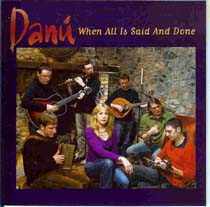
I could so easily have resorted to a swift cop-out for this review merely in order to meet the CD's release date deadline, saying something like "another sparkling and exuberant album from one of Ireland's most invigorating young traditional bands". Well sure, it is all of those things, and how, but there's always been so much more to Danú's art - as I'm finding is being revealed on each successive play. Of course, the instrumental sets (which comprise seven out of the album's twelve tracks) make their impact right from the first playthrough, but the five vocal tracks (being deceptively gentler) tend to win you over rather more gradually, possibly due to the elegant and mildly understated way that Muireann Nic Amhlaoibh sings. In the latter respect especially then, there's not the obvious change in band sound since 2003's The Road Less Traveled which that CD had brought from their previous offering, primarily because the role of lead singer remains the province of the lovely Muireann. Indeed (and unusually too, you may think!), the entire band lineup is unaltered (ie Tom and Éamon Doorley, Donnchadh Gough, Donal Clancy, Oisín McAuley and Benny McCarthy). I so love the way that Danú's performances combine clarity of expression and purpose with a sense of spaciousness, allowing the nuances of the music to breathe through the contributions of the individual musicians, each of whom understands so well just when - and how - to pull back or step forward. The concept of "the egalitarianism of the session" may sound academic, and Danú's members do take it seriously, but hey, they know how to have fun with it. And I've commented before (but there's no harm in reiterating) regarding the breathtaking way that Danú as an ensemble combine an intelligently managed lightness of overall texture that's truly amazing for a seven-piece with an aptitude for selectively thickening that texture at crucial moments in the music that fair makes the goose-pimples rise, and a thundering drive that's equally selectively employed. If anything, these miraculous qualities have been even more finely honed for this new CD, almost certainly due to the large number of unbelievably dynamic live performances they've given in the intervening years. Moments where individual instruments enter the arena with their specific melodic input are managed impeccably yet at the same time so very creatively, combining attitude with grace, forthrightness with delicate clarity. Also, the band prove so at ease with their material that they can be unafraid to take chances and try out fresh (for them) instrumental complements to achieve different textural nuances and interplays, as the glorious twin-fiddle and twin-flute work on the Coachman's Whip set so ably demonstrates. It's a shame, then, that the whole package is compromised just a smidgen by too many careless errors in the credits (for instance, Gerry "4 Men And A Dog" O'Connor guests on banjo on track 11, not track 9 as listed, whereas Tom and Oisín contribute backing vocals to track 10 not track 11, and Éamon plays fiddle on track 7 not track 10 - I'd better resist the temptation to go on…!). The other sad news that the CD's title hints at is the band's plan to considerably pare down their future touring appearances outside of Ireland once their current crop of commitments has been honoured - so I urge you to catch them on one of their few remaining dates this summer before they become another infuriatingly absent legend!
David Kidman
Back in 2000, the Dappled Grays were lauded as "Atlanta's best bluegrass band", but things then went rather quiet and only now do I find they've produced a followup, albeit with a new approach and new personnel (tho' I'll bet they're still Atlanta's best bluegrass band! ). So what's changed? - the band's sound, tho' still identifiably bluegrass, is now dominated by superb young vocalist and fiddler Leah Calvert, the current lineup being completed by founder members Casey Cook (guitar) and Michael Smith (mandolin) with newer recruits Keith Morris (bass) and Greg Earnest (banjo) now firmly on board. What a team! Although the disc's eleven songs vary in provenance (two apiece by Michael and Casey alongside three by Malcolm Holcombe, one by Leah, one trad-arr, one by Gillian Welch and Jonathan Byrd's Young Slaver), there's such a strong unity in the band's approach that they all seem almost to spring from the same stock. Performance style is suitably slick, with some world-class picking and bowing, but this is given depth by some progressive nuances and abundantly solid vocal prowess - which is where Leah comes in, with her sincere and honest yet attractively light-textured delivery that straightway recalls Alison Krauss in particular (no criticism intended!). She brings a wonderful tenderness and delicacy to whatever she sings (those last two mentioned covers are especially fine in that respect), yet she's capable of much strength and fortitude when more intense power is required (as on Red Rockin' Chair). Leah's virtuoso fiddle playing is a great addition to the basic group sound, and I'd have liked a bit more focus on it at times maybe, whereas Greg's banjo work is notable for its melding of traditional playing styles with inventive melodic twists and turns, Michael's expert mando work is steeped in the tradition and the rhythm team of guitar and bass give the songs an infectious foot-tapping drive that's real hard to resist. The individual members' talent for composition is more than proven, although I was a tad unsure about Leah's cheeky swing-club-style Put You In My Pocket fitting in with the rest of the cuts at first. But as with so many (hey let's be honest: way too many!) bluegrass-based albums, this one's all over before you can say Earl Scruggs - another of those 30-something-minute wonders that fair makes you ask where did they put all that surplus energy once the recording session had ended!
David Kidman December 2007
Diana Darby - The Magdalene Laundries (Delmore Recording Society)
Just as with skinning a cat, there are many ways to record a memorable album.
You can produce a set of songs awash with lush harmonies, enough hooks to net a small school of fish and melodies that will revive the philosophy of whistle while you work single-handedly.
Or you can do as Diana Darby has done on The Magdalene Laundries and create magic from what appear to be the barest of ingredients.
If you wrote a list of what Diana Darby had actually used to make The Magdalene Laundries, it would be a very short list, guitar and voice are pretty much it. But what you can not write down is what you can't see, can't touch but you can most certainly hear and that's the sound of her soul. The opening track Skin is here and gone in the blink of eye, however in half a dozen lines and with a voice that is rough and raw, Diana Darby says more than most would achieve with an orchestra and a whole evening at their disposal.
As the Magdalene Laundries unfolds you realize that she is not singing or playing quietly simply for effect but becasue to do either any louder would simply crush the spirit of the songs underfoot.
Where at first, you find you're leaning forward to hear better, eventually you find you're doing it as reflex action as you become totally absorbed in each song's beauty.
This is not an album that is readily or easily understood, each track is its own labyrinthine poem, accompanied by the lightest touch of music. Words and music initially appear to be completely unrelated, however they soon wrap around each other, forming an unbreakable bond.
As Kierkegaard for one, arouses your interest and then your passion, there's no turning back on The Magdalene Laundries. It may be delicate but Diana Darby's music is possessed of a vice-like grip, there is an overwhelming need to find out what Diana Darby has come up with next.
Listening to The Magdalene Laundries is like being caught up in a surreal dream, as the experience moves on the sense of wonder increases. And, like a dream, you're never quite sure if anything is real or not but eventually the spell Diana Darby casts means it doesn't really matter.
Michael Mee
The Dartmoor Pixie Band (inevitably!) are steeped in the music and dance traditions of their native Devon. The ensemble was originally formed over 35 years ago by the renowned late melodeon player Bob Cann, whose grandson Mark Bazeley (also a melodeon player, and kind-of band-member since age 10!) now proudly carries on the tradition in the company of long-standing members Rob Murch (five-string banjo) and Cyril May (drums), caller Sarah Bazeley and more recent recruits Jason Rice (piano accordion) and Ed Rennie (acoustic bass). The band hasn't brought out a record since a tape some 17 years ago, so this lineup is making its recorded debut! The sound the band makes is a distinctive one, which it might sound a cliché to describe as sprightly yet soft-textured, delightfully fleet-footed, like Pixies trippytoeing across the dance floor (as opposed to clodhopping trolls!). They play, and it would seem (not least on the evidence of the seven tracks on this CD that were recorded live) that folks down in Dartmoor dance, with a wonderful quality of jaunty delicacy that you don't always get at ceilidhs; having said which, there's evidently no lack of thrust or energy in either the band's playing or the dancers' movements. From a purely musical angle, the DPB have much going for them: its special instrumental complement is quite unusual, not least for the inclusion of Rob's banjo but also for the adoption of two different squeezeboxes playing in tandem (and well nigh inseparable from the sound of it!) throughout; against this defiant front-line backdrop, it takes someone with a very inventive approach to the drumkit to make it all sound good and inspire the feet, and Cyril's spirited playing, characterised by what's been called that driving "Devon rush", gets it just right. The band's repertoire, too, is quite individual, with reels, two-steps and polkas interspersed with gleeful "dance conversions" of familiar and popular country, New Orleans-jazz and gospel tunes - and it all works! It's delicious and infectious to listen to (that smile almost never leaves your face!), one reason for this no doubt being Sarah's special calling style (she even sings some of her directions!). Yet it can easily seem that the tune medleys tempt you to merge it all into one continuous ceilidh (if they don't tempt you to get up on your feet first!) - so I'll bet you too will be "motoring by the end" of the CD!
David Kidman February 2007
At last, here's the solo debut of the singer/musician/songwriter who's best known perhaps as one constituent of the excellent Sheffield band Crucible, Gav's also been keeping himself inordinately busy playing with ceilidh band Hekety and those other indescribable outfits Glorystrokes and the Privateers and presiding over numerous sessions in deepest Sheffield, not to mention a stint a few years ago as editor of redoubtable South Yorkshire folk quarterly Stirrings.
Although he humbly insists on the Brief Lives press release that "these songs have been around a lot longer than I have and deserve to speak a little louder than me", it's inevitably Gav's own personality, his dynamic, forceful presence that pervades Brief Lives. It's an urgent record, exuding immediacy almost as if his life depended on making it (life is brief after all, and the chance had to be taken while the iron was hot) – but at the same time there's a distinctly considered air about the project, with Gav clearly having thought long and carefully about his chosen material and his approach to it, and spending time to thoroughly get to grips with its interpretation before committing it to CD.
The qualities of starkness (direct, uncompromising vision) and tenderness (affection and respect for sources) go hand in hand in Gav's keen realisations (and in some cases, recompositions) of traditional ballads and broadsides. He's doubly fortunate in being the proud possessor of a singing voice whose bold attack and commanding sense of expressive import is complemented (for the most part not compromised) by its distinctive tremulous vibrato. This instrument turns in two storming unaccompanied performances here, the disc being brought to a magnificent and intensely memorable close with his tremendous, dramatically charged rendition of House Carpenter that he's wrought out of the base metals of versions by singers as diverse as Peter Bellamy and Kelly Joe Phelps. The other unaccompanied song is the extraordinary Silent Alarm, an original composition of Gav's taking the form of an unambiguously contemporary narrative (a violently emotional depiction of a slice-of-modern-day-life) that's every bit as masterly in its own way as Chris Wood's acclaimed One In A Million (although vastly different in character of course).
On the remainder of the record, Gav accompanies himself on anglo concertina, guitar and cittern, with some exceedingly effective guest contributions from Ian Stephenson of 422, Kathryn Tickell's band and KAN (here on double bass), fellow-Cruciblers Richard Arrowsmith (melodeon) and Helena Reynolds (fiddle), Matt Quinn (melodeon), Tyler Carson (fiddle), Natalie Fischer (backing vocals) and the album's producer Tom Wright of PBS6 and the Eliza Carthy Band (backing vocals, banjo and guitar). With all those resources to call on, it's no wonder that the aforementioned starker acappella moments need to be offset by what turn out to be decidedly chirpy renditions of Seven Gypsies, Ratcliffe Highway and British Man Of War, suitably accessible and respectable (no criticism intended!), as well as opening the disc with a neat chunk of "misery in a major key" (Two Pretty Boys).
But for me, highlights among the accompanied tracks are Gav's inspirational version of the ostensibly unpromising Dutch folksong A Snow White Bird (taking on board the "fabulously singable" English words by Sheffield-based singer Jenny Reid), and his superb new account of Young Hastings (itself a slightly mangled variant of Tam Lin originally sourced from Peter Buchan) which sports some particularly harmonious, atmospheric fiddle playing (Helena) within its fulsome box-driven setting. And then there's False Knight, another standout, just Gav here but with a spectral echo effect placed in the opposite channel to his concertina, somehow seeming to evoke the very ghost of his own grandfather who gave his life in WWII and whom this strikingly personal version of the ballad commemorates. Gav's take on On Board A Ninety-Eight is good too: no slavish copy of the Bellamy version (and that's such a hard act to follow), but instead creatively set to a transposition of a morris tune.
All told, then, Brief Lives is a carefully crafted record, containing thoughtful and honest responses to traditional material which also have something to say about the present. It's a record that Gav was absolutely born to make and another of those which reassures us that the tradition is in safe hands.
David Kidman January 2011
In 2008 these fine South-Yorkshire-based singers released their second album (Songbooks) which, like the first (Under The Leaves), interspersed carefully researched songs and ballads from the tradition with a handful of songs composed in the tradition by contemporary writers including Paul himself.
Its direct sequel, Spring Tide Rising, sticks to roughly the same formula, balancing solo performances with unison duets, acappella with accompanied (either on melodeon or guitar), and like its predecessor consists of a series of "as live" single-take performances which bring all the passion of the moment in the true spirit of folk music (if inevitably that brings some roughness and the occasional lapse in pitch or fluctuation in key).
The new disc's contents do, however, more closely reflect Paul and Liz's origins (their childhoods were spent on the coastal fringe close to the sea and the Humber estuary). And in that regard, it's undoubtedly the brace of Paul's own-compositions that turn out to be among its highlights. The first of these, the album's title track, powerfully and memorably relates just one of the human stories centred round a strange trysting tree on a surreal raised beach near Covehithe in Suffolk, whereas the second (Davy Cross) examines the iconic significance of the specially-knitted fisherman's gansey, wrapped round the story of a Flamborough man drowned at sea and set to an appropriately-sword-dance-like tune niftily picked out on guitar as accompaniment. The remaining contemporary songs provide a telling contrast: Pilgrimage, penned by Crucible's Jess Arrowsmith to a Flemish melody that sounds Andalucian, raises interesting questions about the nature of conflict, whereas John Warner's rousing Bring Out The Banners stirringly keeps the faith, evoking added resonances for the local (South Yorkshire) pit communities.
As always with Paul and Liz, the traditional songs are either enterprising in their actual choice or else enterprisingly researched or presented – and often both. The disc contains examples of little-heard versions of familiar material: sourced from Arthur Laycock of Wentworth Woodhouse, there's Grange Moor, a rare version of The Sheepstealer, and The Thresherman, while Liz's version of If I Were A Blackbird comes from the singing of May Bradley.
Liz's traveller roots show not just in her singing style generally but also in her choice of songs to perform solo (eg The Rich Farmer From Sheffield, clearly inspired by Wiggy Smith's rendition). Her singing has real depth and power, although it can at times (as on Stowe Brow, Scarborough Sands and parts of A Blacksmith Courted Me) exhibit a slightly intimidating quality that might for some listeners appear the wrong side of commanding. Paul's voice, though arguably easier to listen to, shows no lack of presence, especially in matters of line and dynamic, with a force of character that tellingly combines tenderness and strength; the episodic nature of Paul's imaginative new setting of Glasgerion furnishes good opportunity for him to demonstrate his skill in storytelling through singing. And Paul's realisation of the Child ballad Bonnie Annie (All On A Falling Tide) is a gently captivating highlight, truly masterly in the way it conveys the timeless essence of the tale of elopement by bringing an enchanting shanty-like ebb and flow to its telling.
Spring Tide Rising constitutes a persuasive and thoroughly engaging third instalment in the Davenports' Treasury Of Song.
David Kidman January 2011
This disc contains some intensely beautiful and greatly consoling music. Basically, Béal Tuinne is a set of songs based on poems in Irish by Kevin Kennedy, the music being composed by Shaun Davey and performed by a dedicated group of West Kerry traditional musicians and singers. The title, which literally means "mouth of the wave", refers to the bow wave of a boat: this in turn is likely to signify the perspective of the poet, which often denotes that of an outsider (in a boat perhaps) who is looking in or across to the small gaeltacht village of Baile An Mhuraigh (Parish Of Moor), in the Ballydavid area west of Dingle, where Kevin Kennedy himself spent most of his life. Many of the poems are powerfully reflective: in one of the most memorable (Briotánach Óg ó L'Orient), the solitary poet thinks on a young Breton sailor who drowned, and in another (Díbeartach) he poignantly laments the fate of the exile, while the collection's final piece is a setting of Kevin's last poem which through the reminiscences of two old fishermen captured his own memories of friends and fishing in Ballydavid. The majority of the poems celebrate the fact that music and community are bound together inextricably in the life of this village, and I don't think I'm being fanciful when I say one gets the impression that the lilting of everyday speech and sung refrains are evidently part of the lingua franca of the area, as illustrated in the carefree jig-rhythms of Cuairteóir (that same exhilarating dance portrays the tumbling Rover Lee on Cois Laoi) and the affectionate waltz-time celebration of friendship that is Lá Élgin Fadó Fadó; on Fearaibh Na bhFeoibh (Men Of The Foze), we even find the tale of a heroic fishing voyage set to a reel (and no pun intended!)... As you'll gather, the musical idiom is loosely traditional, though the acoustic instrumentation tends, somewhat unusually, to be combined with the sound of the pedal harmonium, lending the whole a slight - but not unappealing - demeanour of cultured grandeur. On a couple of the later songs, however, a string synthesiser is used instead, which can render the texture unnecessarily bland and smooth, undermining the tastefully earthy traditional feel of the rest of the pieces: not a happy move, I feel. That reservation aside, there are some marvellous sounds and lovely melodies here, with performances of real character from singers Rita Connolly, Lawrence Courtney, Dáithí Ó Sé and Éilís Kennedy (Kevin's daughter), and musicians including button accordionist Séamus Begley, his son Eoin (concertina) and Jim Murray (guitar) - although all but one of the aforementioned singers double up on instrumental duties (banjo, whistles, flute, guitar). There are isolated instances where the massed (choral) vocal support to the principal singer and the instrumental lines gets mildly overwhelming, but on the plus side this device also becomes a special feature of the sound and unifies the whole set of songs. Béal Tuinne was debuted in a special concert at St. James's Church, Dingle in October 2006, which forms the basis for this recording - and certainly the magical atmosphere of this occasion is conveyed par excellence in the warm acoustics and spacious (but not overfacing) ambience.
www.bealtuinne.com
www.copperplatedistribution.com
David Kidman August 2008
After I pronounced self-professed "more or less hobo" singer/songwriter Ethan's fourth album, Don Quixote De Suburbia, a "distinctly maverick, furiously eclectic set", along comes another stunning album from the man that, although sounding almost completely different, could also be accurately described in exactly the same terms! Taking as inspiration the Woody Guthrie axiom "Life has got a habit of not standing hitched. You got to ride it like you find it", there's all that typical restlessness in Ethan's work, a rootlessness that proudly refuses to chain itself to any one musical style, for settling down is not a concept in Ethan's personal vocabulary; travelling the world with guitar in hand in the best troubadour tradition, he translates into song the stories of the people he meets. Yet when he gets it together in the studio with his friends, the result is a fully formed product, a fully frontal political attack, yet musically speaking it's all expertly and eloquently arranged. His music jumps around from mood to mood, like leaping in and out of boxcars and stepping out into situations as he finds them, confronting them then moving on unpredictably yet with an almost inexplicable true sense of purpose. More so than on the Don Quixote album, each of the 14 songs on Ethan's latest is a direct (in the sense of unsubtle) political statement, whether those politics concern the state or a relationship; he uses his songs as a vehicle for his outrage at legal or social injustice, yet without coming across as self-righteous. This time round, the 14 tracks even include a cover version, a spit-in-yer-face dirty fuzz-punk thrash through John Prine's vitriolic take on the American status quo Your Flag Decal Won't Get You Into Heaven Anymore. Ethan's vision is a compelling one, if often seeming somewhat warped, and this is borne out by his twisted way with his musical inspirations - just check out Carry Me Back To San Juan Hill (a weird cinematic-western take on the old shanty tune Santianna), or the Zeppelinesque bombast of Situationist (Non) National Commercial, or the bleak and strange Semi-Literate Cowboy Poem, for starters. But do check out Ethan's lyrics too - they're every bit as literate in their own way as his shameless encompassing of those musical influences. Five is another tremendously satisfying release from Ethan, who I bet is already out there on the roads and rails a-gatherin' more stories for album number six!
David Kidman
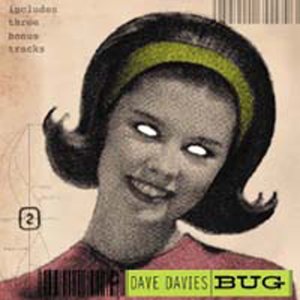
There's an article on the Kinks in this month's Uncut which asks the question: 'Did the Kinks invent heavy metal?'. That may be pushing it a bit, however if you want to know where a host of artists including Ian Dury and Blur got their ideas from, you could do worse than listen to Dave Davies' latest CD Bug.
Davies always seemed to be the 'other one', somehow living in the shadow of his brother Ray. While Ray was urbane and literary Dave was cast in the role of the slightly edgier and darker force in The Kinks.
Thankfully Bug proves that he has not lost the wil, or drive, to produce great rock n roll. His solo releases may be rare but they're worth the wait. Who's Foolin Who may be a slightly sardonic nod in the direction of a band many consider to have stolen the Kinks clothes. But Bug is no exercise in bitter retrospection it's a masterclass, showing just why we ruled the airwaves in the 60s. Be warned though, apart from Life After Life - which is not the album's strongest song - there is little evidence of modern music this is how rock music used to be.
What Bug does is show just how vital Dave Davies was to creating the sound both of the Kinks in particular and British music in general. He also provides the reason why the 'heavy metal' question was asked and after listening to Bug the answer is, maybe. There's also a little moment for Kinks fans with the track Fortis Green, which mentions the Clissold Arms which is where it all began.
Michael Mee
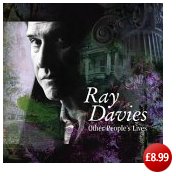
It's taken him over 40 years to get round to a solo album proper and he's spent a decade doing it, its release delayed by the minor hiccup of being robbed and shot in New Orleans. So, does it do justice to one of the most influential songwriters in the history of rock music? Well, in parts. As you'd expect it's witty, sardonic, and, despite heading into Memphis soul and Dylan inflections territory with Run Away From Time, very English, tossing off lines like "Is there life after breakfast?" , "cheer up son, put the kettle on" and telling how Mr Brown "ran off with an Essex blonde" on the mid-tempo jaunty strumalong Next Door Neighbour.
As you might expect from his advancing years, there's a tendency to view contemporary culture through jaundiced eyes, most notably on the Ian Dury-like talk-sing Stand Up Comic's contempt for dumbing down yobbism that passes for today's wit, while both the country-inflected The Getaway and the sultry moodiness of The Tourist's musings on travel find him seeking escape from the humdrum and disillusioned with the flash nature of his countrymen abroad.
There is not, though, anything here of the same pedigree as Waterloo Sunset, Dead End Street or the underrated Don't Forget To Dance and you'd not imagine fishing this out in forty years time and finding it still fresh and pertinent and you have to lament the fact that the man who wrote something as sharp as Dedicated Follower Of Fashion now feels the need to pen lines like "now the clown does a fart and we all fart back . . . and that's that." But, when it shines, as it does on Creatures of Little Faith's tale of domestic strife or the 11 minute Over My Head with its wah wah guitar, organ soul, reggae hints, folk-rock and stadium baiting flourishes, then it stays with you all day, and all of the night.
Mike Davies, February 2006
Defiantly "northern", yes, but certainly not trash. Roger's a West Yorkshire (Brighouse-born) singer-songwriter who engages your attention straight away with his easy, unassuming, captivatingly relaxed performing style and his knack for finding musical poetry in purely local places, stories and references. (It's been said that if anyone can make Huddersfield seem beautiful, then it's Roger!) But the glory is that you don't feel that it's exclusive or cliquey - no, Roger is genuinely welcoming you to his world, of which he's equally genuinely proud. He draws you in straightaway with his plain, touching, wry observations: there's a total lack of pretension in his writing which is refreshing, as he addresses things that matter to us all: small details in the bigger scheme of things they may be, but they mean the world to the likes of Roger and us. Roger writes with evident affection about living in his native county, and this quality colours his perception of life in general. He's one of the good guys, and he makes you feel good about being alive and able to appreciate simple pleasures. The gentle romance of The Way You Love Me and Harmony are good examples of Roger's craft, which is informed by the espousal of solid traditional songwriting values (Old Fashioned Man forms a kind of mission statement, I guess!). Roger has a real gift for easy-flowing melody and an enviable economy of expression: in these respects, songs such as Bradford Girl and Harmony put me in mind of Clive Gregson. Only once did I feel that wordiness got the better of Roger, in the extended litany of pub names that takes up the final minutes of Beer Belly Blues. But generally, while you're listening to Roger's songs, you don't notice the craft in the economy; the lines seem to come out so naturally, conversationally, and the phrases seem curiously - well, obvious, but just you try to write something similar and you'll realise how difficult it is! Finally, Roger's own guitar accompaniments are unflashy but actually highly adept, with a real art to their very unobtrusiveness. Do try Roger's music - I'm sure you'll find him utterly charming, entertaining and accessible.
David Kidman November 2007
This latest (and long-awaited third) full-length CD from Brighouse (West Yorkshire)'s finest is arguably his own finest too. As is often the case with the best art, Roger's is itself something of a paradox, in that the easy charm of his personality, his innate unpretentiousness and the deceptively simple nature of both his songwriting and his own guitar accompaniment should not by rights make such a deep impression as they do.
But his is an unmistakable voice within the world of singer-songwriterdom, a true individual with his own sincerely affectionate take on life, allied to an entirely natural talent for communicating this and making you believe there are good things in this world after all - particularly in his own native Yorkshire! Regional pride is not a new thing in art, but rarely has it been so genuinely and persuasively conveyed as in Roger's heartfelt songs - and, entirely refreshingly, without a trace of tweeness or sentimentality (although, it must be said, the very presence of the famous Brighouse & Rastrick Brass Band resplendent with proud warmth on the disc's opening song, a loving paean to Brighouse On A Saturday Night, which surely hath the power to mist over the eyes of even the most hardened listener).
True to the busker ethos, Roger keeps things welcomely unadorned, and (from track two onwards) he's right there in front of you (a captive audience, if you like) with just his guitar and harmonica, playing only for you, directly and with no distractions. He writes in a language we can all understand, with a carefully crafted economy of expression that's tellingly informed by local references and self-evident personal experience. The title track is a wistful and poignant reminder of the universal power of music (songs like Fields Of Gold and Penny Lane make a life worth living for), from the busker's perspective. And yes, there are unavoidable (intentional?) traces of the early-Donovan-Dylan-style troubadour-folk template here and there (White Roses are almost audibly blowin' in the wind of a Huddersfield street corner, for instance), but Roger always makes capital out of such influences and his songs are always recognisably his own creations. (I Think I Hear) Destiny Calling succinctly and memorably portrays Roger's attitude to his own metier; it's a kind of sequel to Old Fashioned Man from his earlier album Northern Trash. And while on the subject of craft, just take on board the apparently effortlessness of the unbelievably catchy Into The Sun, which has already been adopted by children at an Elland Primary School who've readily embraced its positive message.
And hey, I've still not singled out the disc's standout song (amongst many pearls): Peter Brook's Paintings - Roger's touching personal tribute to this Pennine landscape painter, a fellow Brighouse resident and personal friend of Roger's who passed away last November aged 81; sheer magic, deeply inspired and supremely affectionate. Other notable songs here include Joe Dawson, a thoughtful folk-ballad-style creation, and the tender vignette Sunbridge Road. For commendably, Roger's songs encompass a healthy palette of emotional responses, and the many sidelong glimpses of gentle humour are complemented by the more painfully earthy Ballad Of Knockin' Nelly (ouch!). The only song on this 11-tracker which I thought a touch superfluous was Beer Belly Blues part 2, a further tongue-twisting litany of local pub names that literally carries on where part 1 left off (having outstayed its welcome at that point - it's one of those "fine if you hear it a couple of times live, but" - pieces IMHO).
But taken as a whole, The Busker sees Roger effortlessly consolidating his deserved reputation as one of the county's top songwriters - and if there's any justice it won't be long before he gets recognised as a national treasure too!
www.myspace.com/rogerdaviesmusic
David Kidman February 2010
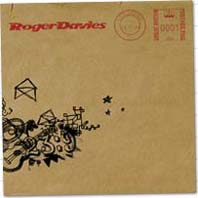
Brighouse's answer to Martyn Joseph (their voices even sound similar), this is Snow Patrol mate Davies's debut album after paying his dues as an art student in Dundee and Chicago, playing student union bars. In 2004 he headed off to the Brighton Institute of Modern Music where he came to the notice of former Sleeper guitarist Jon Stewart and Chris Difford. Not that either of them have anything to do with the album which is simply Davies on guitar, percussion and harmonica with Simon Shaw playing bass and synth. There's no producer credit, but then maybe that's because it sounds like all they did was set up a microphone and run the tape.
Thankfully his voice and songs make up for any deficiencies elsewhere. The songs run a familiar gamut of everyman themes - growing up, leaving home with a bagful of dreams, going back chastened, making a living, the blessings of a good woman who gets you through the bad times, and how he's always going to be true - but he invests these with a simple organic honesty that keeps them from becoming cliches. Given his origins, it is though surprising to find so little social comment.
Musically we're talking acoustic folk with occasional hints of blues and while there's nothing here that's going to find him elevated into next big contemporary singer-songwriter thing the likes of James Dean, Hangin' Around, Littletown and All This Time should ensure a healthy following around the clubs. And, stay until the end and a live hidden track, Cold Black Heart, will convince you he's worth the travelling.
Mike Davies
In name if nothing else, Gareth may sound thoroughly Welsh, but he actually hails from another Bangor (the one in Northern Ireland), and is currently based in Northumberland. None of which gives any clue to his music: he's best described as a lyrical troubadour-balladeer singer-songwriter writing thoughtful and beautifully melodic songs in the tradition of Ralph McTell, Donovan, Cat Stevens and maybe early Dylan. In fact, on the evidence of Water And Light, his third release, Gareth is rapidly turning out to be something very special in the singer-songwriter stakes. I'll admit that goes against my initial expectations, for I honestly didn't quite connect with his debut EP Faith, Folk And Fair Trade. The followup, Only For A Short While (2006), gave me more to think about although it suffered lyrically from some over-obvious turns of phrase and there were times when Gareth's overtly Christian stance felt just a little uncomfortably "worthy". Two years on, though, and Water Of Light banishes my previous reservations at a stroke, for it's a really fine collection of eleven brand-new, heartfelt, impressively well-written songs that retain Gareth's trademark key social awareness, compassion and protest-cred and yet hit the mark so much more effectively by keeping the sentiments and their expression simple and keeping off the religious soapbox.
Gareth's genuine concern for humanity is keenly expressed through literate, intelligent language, crafted lyrics that delicately and wistfully make their point without ramming it down your throat. His music is arresting, but in that it straightaway draws, and then holds, your attention in a totally enchanting, life-affirmingly positive way: you feel that he (and we) can actually make a difference still. Gareth's musical language resides squarely within the folk-acoustic mainstream, yet without being derivative; he clearly is inspired by, and has a knowledge of and a feel for, contemporary folk songwriting tradition. There's not a remotely weak song on the CD: Shoreline Of Ghosts, a captivating lament for the North-East's declining industries, has all the melodic facility of Allan Taylor; Borderland and Scottish Lights are a pair of anthemic paeans to Scotland that rival Dougie MacLean; First Light and Butterfly both bring us further insight into Gareth's acute political conscience; Breathe is one of those classy Radio-2-friendly songs that fairly reaches out for the charts; whereas the disc's undisputed standout, Gareth's re-telling of the epic tale of the Princess Victoria, has all the empathy, sense of history and expressive potency of the very best of Steve Knightley. It might be thought curious that amongst all these gems, Gareth bravely interposes his own take on the hoary old Black Velvet Band – yet thereby he provides the most persuasive case for the song's rehabilitation that I've heard in many a year.
Instrumentally, throughout the disc Gareth's own acoustic guitar work is intensely attractive: deft and intricate when necessary but without needing to be showy (and there's a bonus, purely instrumental track, Path To Windy Gyle, which ripples away seductively and evocatively in the tradition of early Michael Chapman). Gareth employs a select crew of supporting musicians, who are given just enough head to enhance his creations accessibly and undistractingly: there's some gorgeous backing vocals from Yvonne Lyon and Esther O'Connor (and Jez Lowe on a further track), while Graeme and Jamie Duffin, Shona Mooney, David Lyon, Calum Stewart and (Karine Polwart's bassist) Kevin McGuire all contribute with distinction to the musical palette. The CD's presentation is exemplary too, with the accompanying booklet containing full lyrics and credits, clearly set out. And finally: the album is just over a minute short of an hour in playing-time, with nearly every individual song clocking in at around four minutes or so, yet time absolutely flies while it's playing and really never feels a moment too long. This is Quality with a capital Q, and very highly recommended indeed.
www.myspace.com/garethdaviesjones
David Kidman April 2009
Recorded live in the studio over 2 days, without any overdubs and mainly taking only one take, Ain't Gotta Dime is Boo Boo Davis' 6th album for Dutch label, Black & Tan.
Silvermine is a grizzly, grungy, throbbing opener. There is no level of pace injected into Ten Thousand Dollar either but the quality is already shining through. Watch Yourself is a mid-paced R&B with a fuzzed vocal and a certain earthy feel. The quality continues with My Baby Got Me Fixed and The Man Who Be Around evokes feelings of the past and confirms Boo Boo as a true blues man. The eponymous title track is deep, down in your soul music and Boo Boo Blues is a romping, stomping boogie. Boo Boo certainly knows how to have a rollicking good time.
Cake Lady is a Delta blues with a drumbeat and this will touch your hidden depths. The repetition on Don't Wait Too Late will hypnotize you but you will be brought crashing back to earth by the superb blowing harp and fuzzed vocal of Standing At The Fishbank. Let Me Ride With You is a hi-energy, swinging blues and he goes all Bo Diddley on Got My Loving, Now You're Gone. Cryin' Blues is slow and wailing, well what would you expect? He finishes it off with the fast paced R&B of the quaintly titled There's A Roach Crawlin'. Boo Boo Davis has an air of authenticity that some of his peers lack.
David Blue February 2010
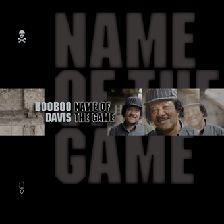
Boo Boo Davis is a true Delta bluesman and one of the last of his generation. A poor childhood meant he couldn't learn to read or write not that has not kept him down.
His latest album for Dutch based Black & Tan opens with Dirty Dog which is, as you would expect from the title, a grungy blues. The pounding beat from drummer John Gerritse is a sign of things to come. I'm Coming Home is even more grungy than the opener. It's done in a John Lee Hooker style with a fuzzed vocal and added harp from Davis. This highlights how powerful Boo Boo is as a singer. There is some good advice on Stay Away From The Casino and he starts to funk things up a little with some pace also injected. However, the repetition made me take a little time to warm to it. Want Nobody Tell Me How To Live My Life is a more straightforward harmonica and guitar blues and Boo Boo finds a groove on Tryin To Get Ahead. The Chicago blues of the eponymous title track has a prominent harmonica and a beefy vocal.
Who Stole The Booty is a contemporary blues with overcharged guitar and harp. Believe me, this riff will work its way right into your brain. Why You Wanna Do It is more of a soft rock song and although slightly out of kilter with the rest of the album, it does have a very good vocal. Lonely All By Myself is a slow Chicago blues and more than meets the standard with its deep pulsating bass line, even though he doesn't use a bass player! It's A Shame is an upbeat blues with harp to the fore. I just love the energy! Throbbing drums herald I'm So Tired and when the world weary guitar and spoken intro join in then we have a song on our hands. It's conducted at walking pace throughout and Davis produces one of his best vocals. Hot Foot is a funky grinder and he closes with St Louis Woman, loosely played in the St Louis style. He seems to like the fuzz effect on his vocal and he could be accused of using it too much. Nevertheless, this is a great finish to a top class album.
David Blue September 2008
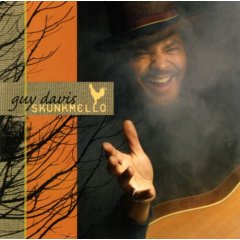
Each successive album by this consummate bluesman brings another sizzlin', cookin' selection of tracks; this new one intersperses eleven of Guy's original compositions with a smaller-than-usual sprinkling of acknowledged blues standards. There's only three of the latter this time round, but they're pretty noteworthy, especially the lazy simmerin' eight-minute workout Guy gives Goin' Down Slow (which he believes "just about the finest blues song ever written" - and in a performance like this you'll believe it too!). Po' Boy is given a fresh (if gritty!) lick of paint just when you thought you'd heard the last word on it, and Tommy Johnson's Maggie Campbell Blues gets a welcome revival in a drivin' Charlie Patton style. Like all of Guy's previous offerings, Skunkmello has the feel of a classic album from the first playthrough - it flows naturally, and it also compels, holds your attention all the way through, even down to the most disposable (bonus) cut, a kinda reprise of the opening rapping cut on 2004's Legacy (Uncle Tom Is Dead), here termed a "milk'n'cookies" remix even tho' the "offending" words haven't been altered! Guy's new compositions here retain that timeless feel that characterises all his work, and seem effortlessly constructed. And deliciously sung - hey, you can just taste that "chocolate man"!... The indigenous idioms Guy so easily embraces, assimilates and incorporates on his travels are once again as wide-ranging as the blues itself, taking in the good-time jugband of Natural Born Eas' Man, oldtimey clawhammer banjo on Shaky Pudding and Blackberry Ramble, and even some wild arm-flapping chicken-dance back-country (for it's a famous chicken thief that gives the album its title!). Guy's masterly backing crew for Skunkmello is a somewhat larger unit than last time round, and comprises Walt Michael, Mark Naftalin, Nerak Roth Patterson, John Platania, Mark Murphy and Gary Burke alongside familiar face T-Bone Wolk ("his breath smells like music"!), together producing a gutsy acoustic band sound with a supreme lightness of touch and texture that provides the perfect foil for Guy's dark soulful tones. By the way, Guy's got an all-too-brief UK tourette coming up, so check out his website for dates.
David Kidman, June 2006
Guy Davis - Legacy (Red House)
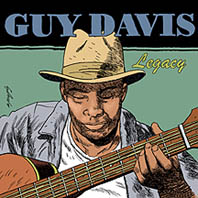
I think Legacy is Guy's seventh Red House release now (OK, so Stomp Down Rider was just a kinda repackage of his self-released live set, but who's countin'?) – and inexplicably I missed out on Chocolate To The Bone last year…. Anyway, I digress – here on Legacy Guy continues his lifelong journey through the blues in his own inimitable fashion, presenting a tasty mix of originals and standards that simultaneously explore right back to his acoustic blues roots and cast an ironic eye over current trends in music. Guy chooses to kick off the CD with a fun example of the latter, in fact– Uncle Tom Is Dead takes the form of a wicked little rap exchange between Guy and his teenage son Martial. And on the blues standards, yet again Guy has the knack of turning in what must be among the best of the recorded versions of many of these – and over a broad canvas of styles too, with economic yet telling backing from a very select crew (of mostly just two – Mark Murphy and T-Bone Wolk) to complement Guy's own guitar, mandolin, banjo and harmonica. There's soulfulness, spiritual commitment, feeling aplenty in the gentle stompin' of Guy's reinterpretations of these classic blues songs, and he's entirely at home with the various idioms of the blues stretching from deep southern country to gospel and worksong. At home and therefore comfortable yes, and fairly laid-back, sure, lazy in just the right way – i.e., nothing in the slightest soporific or couldn't-care-less about Guy's committed performances. The gritty drive of Drop Down Mama, the understated energy of Hikin' Jerry, the primitive backwoods charm of Henry Thomas's Run Molly Run, the lonesome stretch-out over Nehemiah James's Cypress Grove, the ever-so-slightly Tex-Mex lope of See See Rider – all these are superlative interpretations, on which a small handful of Guy's own compositions like the delicious, seriously soulful I Just Can't Help Loving You set a powerful seal and round out the album to provide an unparalleled portrait of the compleat bluesman-storyteller that is Guy. This is the real deal, sure 'nuff.
David Kidman
Jeff's one of the most charismatic and widely-regarded of American oldtime-folk revival performers, possessing that maddeningly enviable trait of being master of several different instruments (on this disc we hear just banjo, fiddle, mandocello and guitar) as well being a darned fine singer, a man of wholly unpretentious and completely natural musicianship who all the while makes everything he does seem totally effortless. (Bit like Bruce Molsky in that respect!...) Jeff's pedigree is long and distinguished: he worked in a duo partnership with Jeff Warner for many years, while more recently he contributed two excellent tracks to Martyn Wyndham-Read's Songlinks 2 project back in 2005. And yet this solo CD has been a long time a-comin' - tho' it sure is worth the wait! It's a healthy mix of songs and tunes taken from the tradition, originating from all over the States and notably including examples from the Frank Warner collection; and yet Jeff readily admits he's no purist, and goes about adapting his material with considerable ingenuity and a thoroughly infectious excitement. Basically, the tradition's in his blood, as is the rare ability to communicate its music with a keen sense of discovery, that eagerness to share a new song or tune with his listeners. Although it was Frank Warner whose singing of Tom Dooley "in the old style of the old singers" formed Jeff's original "Damascus" experience and Frank has subsequently proved an all-pervasive influence on Jeff's own music-making, everything Jeff does seems also to be infused with an evangelical zeal, much in the spirit of Alan Lomax and his collecting activity you might say. (Jeff's intriguing performance of Beulah Land on this CD is a kind of homage to Lomax, even attempting to loosely re-create a noted Lomax recording from his Southern Journey, which was itself an intended re-creation of the sound of a slave-era African-American band...) This enthusiasm extends from Jeff's own performing style (both timeless and evocative in the very truest manner) into his way of penning liner notes (those for this particular CD are, significantly, brilliantly well-researched, erudite and copious almost to the point of telling us way more than we might wish to know - tho' hey, I've not got a problem with that!); it's no exaggeration to say that Jeff's understanding and knowledge of this repertoire is second to none. His own instrumental versatility (along with an entirely apposite, and selective, choice of just four guest musicians, principally the redoubtable Brian Peters) enables him to ring the changes with a different complement and sound on virtually every track, and there's no shortage of marvellous attention to detail within the sparse but telling arrangements he employs. The material itself cuts across all borders and ranges unashamedly right across the tradition, from straight folk tales (The Bold Privateer) and epic historical ballads (Cumberland And The Merrimac), to quirky obscurities like Felix The Soldier and cowboy songs, via a powerful piece of reportage (Libby Prison, one of two songs here that Jeff sings unaccompanied); there's also a couple of instrumental tracks providing good ol' down-home fun with great technique but no need of being showy. Even the most ostensibly well-worn of the songs (like Wild Bill Jones and Shortening Bread) emerge from the Jeff Davis stable fresh as new paint (as indeed does Old Paint here!). Adieu My Lovely Nancy is a particular success, taking as its primary source the Bertha Lauderdale version rather than the more usual Copper Family one and benefiting from the unusual combination of mandocello and anglo-concertina for accompaniment. In Jeff's talented hands, the music of his (our) heritage is so vividly brought to life: the land of deep tradition is some fabulous yonder, indeed, and a grand place to visit.
David Kidman January 2008
Glasgow-based "songwriters' songwriter" Ian is a veteran performer in, and organiser of, countless Lowland folk clubs, and winner of as many songwriting competitions! And he doesn't believe in doing things by halves - for here's a three-disc set containing no fewer than 52 of his own compositions, ostensibly a sequel to the two-disc Volume 1 (which appeared in 2001 and contained 30 songs covering the period from 1992 to 2000). Getting the gripe out of the way first, the set comes with virtually no documentation beyond a straight track-listing on the rear box and a list of personnel credits inserted into the box itself, so we know nothing of the provenance or background to any of the songs, which is a missed opportunity. And neither does Ian's website provide any information beyond the actual lyrics - shame. Now given the sheer prolific nature of this man, I can't claim, and therefore wouldn't even try to pretend, that every one of Ian's songs is magic - some leave me a bit cold, and others don't quite seem to hit the mark, but each and every one is well-crafted, that's for sure, and the ratio of hits to misses is more than healthy. There are one or two that put me in mind of Eric Bogle, others perhaps of Robin Laing or Allan Taylor, others of Matt McGinn or the less scurrilous side of Billy Connolly; but they're all imbued with the hallmarks of Ian's own personality - a generous spirit, a gentle humanity, an abundantly genial (sometimes quite dry) sense of humour, with on some songs an evocative wistfulness, others a sense of local pride and a strong flavour of the "Glesca' Patter". Musically speaking, Ian's songs are couched in a tasteful and listener-friendly idiom, taking in a variety of folky moods and styles and encompassing a wide range of subjects, while Ian's also unafraid of adopting existing traditional tunes occasionally (as on To Get To You, All My Mind, Left It Ringin' and She's The One) to good effect. Elsewhere, hints of the lighter side of traditional sit alongside rock-a-boogie, all communicated to the listener in an attractive and unashamedly accessible manner that wins you over in much the same way as Anthony John Clarke. Ian employs around ten musicians in various combinations to help bring his songs alive, and the textures are efficiently managed although a slight dated air of blandness sets in on the tracks where synthy keyboard work is involved. The songs on these three well-filled discs surely point to the fact that Ian's work is worth investigating. And when Ian comes up with a real gem you sure know it (Dark Streets, Magic, Absence, Clydebank Blitz are ones that readily spring to mind).
David Kidman
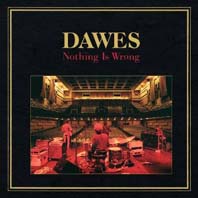
Formerly a post punk Los Angeles five piece named Simon Dawes, now a folk rock quartet made up of brothers Taylor and Griffin Goldsmith, Wylie Gelber, and Tay Strathai, it's not too hard to pick out influences, primarily Neil Young, the Band, Flying Burrito Brothers and, on the lovely piano ballad Moon In The Water, surely a touch of Paul Simon.
It's a 60s/70s Laurel Canyon sound that shines on harmonies, rich melodies and jangling guitars, the latter ensuring a sparky start to proceedings as they meld with organ on the road and relationships-themed Time Spent In Los Angeles.
Lead singer and main writer, Taylor has a plaintive vocal twang and a smart way with words, packing choruses with sharp lines like 'the only point of looking back is to see how far we've come' on How Far We've Come while both it and the one/two march beat backing of the catchy stand out Coming Back To A Man underline his brother's skill behind the drum kit.
While both those numbers adopt a bouncy approach, the album's pacing is generally slow to mid-tempo, ranging between the throaty guitars and piano Neil Young feel of If I Wanted Someone, The Way You Laugh's loping country pop and the dusty piano backed wedding song A Little Bit Of Everything which could stand proud alongside vintage Jackson Browne.
Both clocking in at over six minutes, the pensive and plaintive My Way Back Home and the ebb and flow Springsteenesque anthemics of Fire Away While (on which Browne himself provides backing vocals) show they can stretch a tune without stretching your patience.
It's not an instant album, but like the best and longest lasting relationships, it's one that grows on you over repeated listens until you feel you've known it all your life. It's testament to their talents and rising profile that they were hand picked by Robbie Robertson as his backing band for his live dates promoting the How to Become Clairvoyant album. The man has good musical taste, is yours any less?
Mike Davies July 2011
Steve and Helen have for many years been stalwart supporters of Ron's excellent club at the Sun in Stockton, and their sturdy, reliable performances of all kinds of songs have become an eagerly-awaited feature of any evening there. And though each is a really fine solo singer, their individual voices prove highly complementary. Typically, they're very modest, almost to the point of being reticent about any self-publicity - but as is often the case, those who shout least loudest actually have more to say and are more worth listening to! This CD is Steve & Helen's fourth release as a duo, and it's an enterprising maritime-themed collection which runs the gamut of familiar and unfamiliar, rousing and reflective - all given the sterling Dawes and Pitt treatment, with plenty of upfront presence and 150% commitment. A supreme strength and confidence abound, both in the solo work and the well-considered harmonies, and the duo's renditions of repertoire classics like Tom's Gone To Hilo, Banks Of Claudy, The Drowned Lovers and Boston Harbour could well be considered among the best available – Steve and Helen always seem to be able to find something distinctive and fresh in the otherwise well-trodden.
But another of their strengths has always been the unearthing of some excellent songs not otherwise widely sung, and then creating their own definitive renditions. At least six of the sixteen songs here come into that category, and I'll bet you'll not have encountered most of them before (I hadn't); pick of the bunch must be the incredibly evocative Road To Drumleman (one of those tracks where Helen's lovingly moulded phrasing is almost too beautiful!), Bob Conroy's Safe At Snug Harbor and the wry Graham Penny returning-sailor song Channels. I also welcome the prominence Steve and Helen give to some of those undersung but very talented songwriters and song adapters with which the north-east folk scene is well blessed: Joy Rennie's fine setting of Cicely Fox Smith's A Dog's Life being a case in point, as for that matter is Helen's own Frobisher's Dream, which inventively utilises (paraphrases) the tune and basic framework of Willow Day.
My own favourites, though, are Never Turn Back (named after the watchword of the men of the Caister lifeboat crew), and Bobby Tulloch's Hunted On The Hillside, a portrayal of the cruelty visited on communities in the past by the press-gangs; the latter track closes the disc and I'm convinced it has a built-in repeat-button command!... Two-thirds of the songs are performed with accompaniment: mostly Steve's guitar, with Helen's English concertina on several and occasional extra enhancement from whistle, harmonica or accordion. Well-judged and highly competent though their instrumental contributions are, I'll always rate Steve and Helen most for the strength and great character of their acappella work, of which this disc contains plenty of examples to rejoice in. If I must nitpick, well just occasionally there's a sense of mild over-deliberation in delivery (rather than pace) which may be due to a laudable desire to make each word and line count; this can result in a sense of slight stiltedness (Lester Simpson's Polly On The Shore suffers a little in this regard – it comes across better live), and there are one or two instances where Steve appears to rush at the start of a line, almost in a surfeit of enthusiasm (but who can blame him?!); also, maybe Steve's voice is a tad too close/forwardly mixed on a couple of songs where he takes the lead. But these are such incredibly minor points in the context of a disc which has so very much to recommend it. Anyone looking for an exceptionally well-planned and well-performed disc of interesting and rewarding maritime songs will certainly not be disappointed.
David Kidman 2007
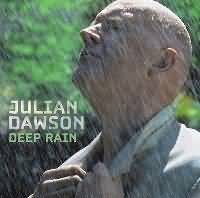
I've commented before that Julian's one of the music world's best kept secrets, steadfastly ploughing his own furrow with a seemingly inexhaustible succession of high-quality releases. Deep Rain, the latest, was released in Germany late last year and now gains a UK release. It's another collection of punchy songs with keen hooks and sharply observed, witty lyrics that, while embodying many of the familiar Dawson characteristics, nevertheless has a slightly more funky-soulful feel generally, particularly on the title cut (one of the album's four Dan Penn co-writes), Keys To The Kingdom Of Love and Perfect World. There's even a pretty routine cover of the old Jimmy Ruffin hit, What Becomes Of The Broken Hearted, which is otherwise redeemed by Julian's powerful harmonica work. If I'm pressed, I'd admit I tend on balance to prefer Julian's more reflective side (Walking On The Dead), or the quirkier and catchier numbers like That's Why God Made Saturday Night (shades of Clive Gregson here I thought) and Barbed Wire Fence (co-written with his Plainsong companion Iain Matthews). Julian's crew of additional musicians includes Steve Allen, Daniel Tashian, Steve Ebe and Billy Livsey, while there's guest vocals from Barry & Holly Tashian and Vince & Barbara Santoro (among others). I could've done without the occasional sound effects (an intrusive gimmick on the otherwise appealing, ukulele-ridden Girl Friday for instance), but for the most part Julian has wisely avoided giving in to the indulgence of extraneous overdubs, letting the songs and fairly simple arrangements speak for themselves. Maybe in the final analysis Deep Rain isn't quite Julian's most compelling collection, but it's no disappointment and still worth having – and by the way, the album's bonus track Christmas Every Day is available for free download from Julian's website.
David Kidman January 2009
Julian Dawson with Gene Parsons - Hillbilly Zen (Fledg'ling)
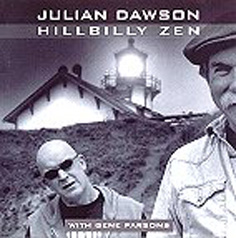
For his fifteenth album, London born Dawson, sometime member of Plainsong and UK roots circuit fixture, hooked up with the former Byrd having renewed their acquaintance at a folk music conference. Suggesting Parsons might care to bring his one-man ochestra talents to bear on a shared album, the pair holed up in California, Dawson with his guitar, Parsons with banjo, pedal steel, mandolin, drums, bass, Stringbender, spoons and much more, including wife Meridian Green's harmony vocals.
All the songs are Dawson's, either partly or wholly (Freedom Of The Highway resurfacing after being lost on the third Germany only Plainsong album) and range from guitar picking rag blues (Don't Just Do Something [Sit Here Son]) and banjo bluegrass (Banjo Song, what else, four of them) to soul (To Hold You Again), country (A Man Never Wanted A Woman So Much), and rockabilly (Hillbillies on Pills) rounding off with the lazy hula swing of What Kind of Change. Not life changing stuff maybe, but the fun they had making it certainly spills out to brighten the day while you listen.
Mike Davies
Kimya Dawson - I'm Sorry That Sometimes I'm Mean (Rough Trade)
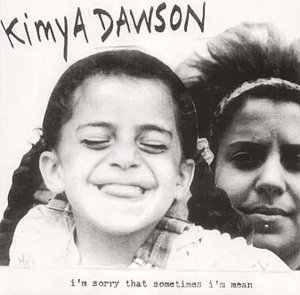
Taking its cue from the no fi acoustic style and deadpan lyrics of Jonathan Richman, the acoustic anti-folk movement has become something of a New York underground cult, spawning a loose collective of artists who regularly share a tour bus or a coffee bar. Most high profile pioneers of the scene have been The Moldy Peaches, and co-founder Dawson fetches up here with the countrified flavours of the first of three planned solo albums, recorded rough and ready in her bedroom on a four track, packed with simple songs and straightforward sentiments. Basic guitar strums and her whispery voice lay the emotions bare on a collection of childlike songs of (mostly) childhood that talk of loneliness (Everything's Alright), misfits (Rocks With Holes), pre-pubescent gawkyness (Eleventeen), bedtime sleepy heads (Sleep), times and experiences past (Reminders of Then) and, on the fragile splinters of Hold My Hand, child abuse. And if there isn't such a thing as nursery rhyme gothic, then the wonderful Wandering Daughter has surely invented it.
www.antifolk.homestead.com/KimyaDawson
Mike Davies
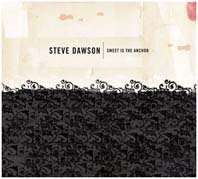
Anyone who has even the most fleeting affection for their wonderful harmonies, will find it impossible to listen to Steve Dawson's solo album Sweet Is The Anchor without thinking of the wonderful Dolly Varden.
That thought lasts for all of 10 seconds of the opening track, suitably called Temporary, after that Steve Dawson takes full ownership of the album and never lets go.
Even when his Dolly Varden partner Diane Christiansen guests on Ten Thousand Pounds and the title track, there is not the slightest suspicion that Dawson feels the need of group comfort. In fact none of the songs on Sweet Is The Anchor could be improved upon by being given the band makeover.But it is trademark Steve Dawson, he is the consummate soft rocker. Dawson is well respected both as a writer and singer and he has a solid CV behind him but Sweet Is The Anchor is surprisingly revealing.
Reignite for one reveals him to be a master songbuilder as well, it builds layer upon layer and as it grows and stretches in the middle of it all is the hugely impressive Dawson, testing his talents to their limit.
While Steve Dawson either as a wrier, singer or stager performer will never be a screamer or shouter, Sweet Is The Anchor is proof positive that he is one of Americana's most intelligent, incisive and just plain best musicians, with or without a band.
Michael Mee, January 2006
Stephen Dawson - Demos For Dolly (Self-produced)
CDs bearing the words, rarities, demos and unreleased, should also have the title 'abandon hope all ye who enter here' attached. After all I drive a car but I don't want to see it being made, or drive the one that was rejected. It's the finished product I want.
And that's what you get here, only it's a different finished product. The 15 songs on 'Demos For Dolly' are fully formed and stand on their own merits. For anyone who doesn't know, Stephen Dawson is one half of the Dawson/Christiansen axis around which Chicago's Dolly Varden revolves. He is also the band's songwriter and these are his songs.
What helps immeasurably with 'Demos For Dolly' are the comprehensive sleeve notes, each track has a potted history, charting it's birth and development, all that appears to be missing is who it's first date is going to be. There is no better example of their contribution than the opening track Times Beach Theme. Originally written for a 1994 documentary about a town sufering the effects of dioxin spraying, in thatcontext it's haunting and evocative. However when you learn that the filmmaker subsequently died of cancer, believed to have been caused by filming in the town, it takes on a whole new and bottomless meaning.
Originally a shows-only release, this is undoubtedly aimed at fans and the part of the fun is just how different some established Dolly Varden songs are when left to the tender mercies of their creator, (step forward Dr Dawsonstein). But I have to admit that my first impression of some of them was that something's missing without Diane Christiansen.
But, after that initial shock, Forgiven Now and The Dumbest Magnets take on a whole new perspective. Even the most 'Dolly Varden' of all songs, The Thing You Love Is Killing You is a new song. Wonderfully sparse and bare, the meaning of the song is clear. What i'd always thoughtof as a woman's song will never be quite the same again.
Dawson shows a vulnerability and depth of feeling which isn't always apparent when he's with the band. Here he's not the rock on which all else is built, he's on his own emotionally as well as literally.
There is a real suprise in store for those familiar with Dolly Varden with the hitherto unreleased No Money, No Level Ground. Dawson will never be a mean rock 'n' roller but this is a song with dirt under its fingernails and a burning passion in its heart. It also shows another level of Dawson the songwriter, we know he can write a love song now he's revealed a social awareness.
Alongside those 'better known' numbers, sit some 'unknowns' (that's what you call them when they are this good). plus a couple of songs that were originally played by Dawson's previous band Stump The Host.All in all it's a comprehensive examination of Dawson's talent.
The only flaw on 'Demos for Dolly' is that title, these aren't recordings that point the way to better things, they are the portfolio of a great writer. Wisely Stephen Dawson has made 'Demos For Dolly' available through the band's website.
Michael Mee
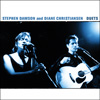
I wouldn't have thought it possible for Stephen Dawson and Diane Christiansen - in essence Dolly Varden - to strip their songs back any further and yet still extract more. On Duets they have acheived the musical equivalent of a capitalist's dream, more from less. As a band, Dolly Varden was hardly in the Meatloaf league of theatrics, everything they did, either live or on CD had a purpose. However Duets comes across as one of those treasured demos that should never ever be tampered with. It is a much bleaker album than expected, Doghouse Window is positively dark and brooding. But it establishes this as a Dawson/Christiansen project in more than just name. A fact cemented by The Second Round and One Thousand Brilliant Prizes, the intimate performances go beyond the professional. They are shared moments between husband and wife, mere singing partners ain't that close.The best example of a track given anew identity is The Thing You Love Is Killing You, neither particularly worse or better than when it appears on Dumbest Magnets. Slower and isolated it moves from a country love song to a desperate, desolate cry between two people.The simplicity of the album will probably appeal to those who already know the pair's work. But if you prefer no frills, plenty of feelings then Duets is as good an introduction to Stephen Dawson/Diane Christiansen and Dolly Varden as you are going to get.
Michael Mee
Steve, the principal behind the Canadian indie label Black Hen, is also a noted guitarist and a more than capable songwriter. Steve's last album Welcome To The Gold Coast (2005) was a well-received set that pitted his characteristic fingerpicking against a sophisticated and soft electric backdrop, and Waiting For The Lights To Come Up continues that trend with another attractive and well-balanced collection that's easy on the ear yet not lacking in textural substance and interest. Just over half of the album consists of Steve's own songs, which are informed by an easy familiarity with all manner of roots musics and a chameleon-like ability to blend and switch between the styles and conventions of these musics. At times you might feel that this versatility is a double-edged sword, in that it's almost too smoothly controlled and executed, with the suspicion that he may be going through the motions to prove a point (and not quite succeeding), but at his best - as on Room To Room, At Arm's Length and Dry As Our Luck, say - there's an appealing edginess that offsets the smooth accomplishments of his musicianship.
As a songwriter, maybe Steve's voice is less distinctive than workmanlike, but he doesn't really put a foot wrong and his songs sit well enough alongside the covers: these include Dylan's Walking Down The Line, the Mississippi Sheiks' Somebody's Got To Help You and two slightly skewed takes on vintage Hawaiian music which work just fine. There's no doubting Steve's dexterity and flair for creative multi-instrumental intricacy in colouring, and this provides the main interest really, while it's a paradox that the instrumental tracks probably stand up the best in terms of memorability - a bit like superior movie music, Penguin Café meets Ry Cooder maybe - rather than the songs. Still, I find there's much to enjoy in successive playthroughs, and I suspect the album may prove something of a sleeper.
David Kidman May 2008
Jesse Dayton - Country Soul Brother (Stag Records)
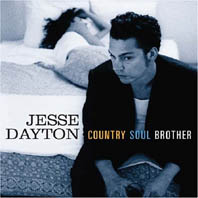
It's always a pleasure to come across an artist who just sees thing a little differently from everyone else.
It's not that Jesse Dayton makes any radical departures from his country roots. He's just looked in different corners to find inspiration. Although the 'soul' reference can only refer to the 'inner man' because there's little to suggest Detroit, Philadelphia or for that matter any other place noted for its soul music.
You can see the attraction for a major label of songs like Daily Ritual, good looking, young guy sings heartfelt ballad. Women swoon and everyone's laughing all the way to the bank. The only fly in that particular ointment is Dayton himself.
He makes the kind of edgy country music that made the late Warren Zevon great. Ain't Grace Amazing would fit neatly into Zevon's off-kilter legacy, while Jesus Pick Me Up is twisted just enough, jazz violin blending with a little southern revivalism to produce something that is recognizably country but different enough to grab the attention and good enough to hold on to it. It isn't difficult, listening to Country Soul Brother, to understand why musicians from Waylon Jennings to the Supersuckers have availed themselves of Dayton's services. And if Johnny Cash calls you 'different', then you know you've got something special about you. Who am I to argue with Johnny Cash?
Michael Mee, Editor, The Hawick News
Dead Air is just Rainy Orteca: pure and simple. Rainy Orteca, as not everybody knows, is an integral part of the Joan As A Police Woman outfit, bassist and "second-fiddle" for frontlady Joan Wasser; yet this New York-based self-taught guitarist has also worked with Antony & The Johnsons, Lou Reed and Lloyd Cole. Now she chances her arm by bringing out a defiantly state-of-the-art DIY entirely-solo record under the mysterious guise of Dead Air. It's quite a bit different from what the above CV might lead you to expect, being instead a collection of sonorous and heavily atmospheric electronica, Rainy's pop and singer-songwriter sensibilities merging in a sometimes retro-futurist and somewhat other-worldly soundscape. Dead Air music makes much play of the contrast between Rainy's breathy, sweet-toned voice and the quite ominous industrial-beats, claps and snaps of the synthesised textures rumbling along behind her. The imagery is dreamlike and intense and yet the stream of consciousness doesn't always follow through (full lyrics should be available on the website, apparently, but I couldn't find them!), while the production (by Josh Hager) is artful and upfront. The six songs here are mini-epics, economic with the truth of sheer sound, from the crafted quasi-lullaby of Tin Drum with its echoes of trip-hop, through to the more ecstatic uptempo Sprechstimme delivery of Electronic Heart. It all adds up to an enigmatic, delicately crafted, warmly textured yet coolly abstract record, tantalising in its brevity and whose entrancing delights are over all too soon.
David Kidman October 2008
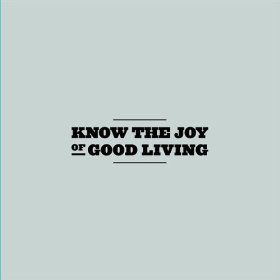
When the Sheffield six piece came to record their debut album, few knew their way round the studio quite as well as they. Hardly surprising really since, finding themselves without any major label backing, they struck a deal with Arctic Monkeys/Richard Hawley producer Alan Smythe to spend two months helping build the place in return for recording time when it was completed. If the finished studio is as good as the finished album, then the music industry's gain is the construction industry's loss.
As the title suggests, this lot are in the business of life affirming, optimistic punch the sky anthems built to turn stadiums into sea of waving arms and voices singing in unison. It's a musical manifesto laid out from the get go with Streets, four minutes of heroic romance streaked Springsteenesque blue collar pop with ringing guitars, circling riffs, cascading keyboard, pounding drums, big chorus and soaring harmony vocals.
They don't let up as, almost designed as a live set segue, Roy Bittan piano leads into I Couldn't Love You More, brothers Sam and Matthew Taylor sharing vocals with Alice Faraday. All it needed was a sax break and it could have sailed straight out of Tunnel Of Love. Making it three in a row, 1000 Miles is another folk pop standard bearer, this time echoing Rumours era Fleetwood Mac with a dose of pre-Eurovision Katrina & The Waves.
With a further nine tracks to go, the standard never falters as they mine such other influences as Phil Spector, Neil Diamond and, I'd venture, Gene Pitney across both big young and in love, hood down and cruising numbers like You're Not Alone, Sarah, Cherry Street (just off the boardwalk from Bruce's Backstreets) and the Jim Steinman-esque When We Were 17 alongside the more reflective acoustic 60s pop ballad melancholia of Driving To Nowhere (which actually reminds me of Smokie at their very best), Cross The Water and the harmonica introed What A Bloody Shame.
Yes it's derivative and yes it will, inevitably, suffer the slings and arrows of comparisons to The Gaslight Anthem and, sure, the songs don't have their inspired desperate urgency and scarred heart poeticism and nor do they burn with the same life or death passion of a Born To Run or a Badlands.
But, if I was 17, had just discovered Rebel Without A Cause and was spending my nights in romantic fantasies of desert highways and girls with wild hair and wilder eyes, then this is the band whose name I'd have tattooed on my arm. Hell, maybe I'll just do it anyway.
www.deadlikeharry.co.uk
www.myspace.com/deadlikeharrymusic
Mike Davies March 2010
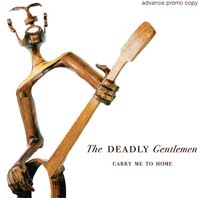
I reviewed this outfit's debut record The Bastard Masterpiece back in autumn 2008. It was a really strange hybrid of edgy rap and traditional bluegrass styling, and, while undeniably captivating, it rather left me wondering how they'd be able to progress. Now here's the answer… and the jury's out here. As you'll recall, the band was configured by Greg Liszt (of Crooked Still and Springsteen's Seeger Sessions etc), who'd gathered around him three then-18-year-old bluegrass wunderkind prodigies (Josh Pinkham, Mike Barnett and Sam Grisman, David's son) to help him realise the project.
Three years on, Greg's still at the helm, but Josh has departed and been replaced by guitarist Stash Wyslouch and mandolinist Dominick Leslie; the band dynamic may not appear to have changed overmuch, nor the timbral components of the sound, but the approach is now less experimental rap and more what they term "epic folk and grasscore". Instead of having a lead singer now, they use what they call "a nonstop orchestration of somewhat unconventional vocals, with everybody in the band doing everything they can". With the result that, at least vocally, it sounds more of a mish-mash of ideas and methods, with an unpredictable, almost scattergun (even somewhat Zappa-esque) admixture of babble and squeak.
The more experimental and weird, the better things tend to come off it seems – Sadie receives a rushed, breathless semi-spoken vocal treatment with harmony interjections that are all over the place, and an accompaniment that's described as acoustic death metal: extraordinary by any standards! Police and Bullet In My Shoulder both marry a whiplash delivery of lyrics to a high-speed breakdown-cum-hoedown, while the rockabilly-freight-train promise of The Road Is Rocky and its excellent instrumental work is muted by an inconsistent vocal treatment; World Of Pain, however, is a limp and forgettable soul-gospel number, and the title song is a would-be folk anthem that never quite takes off. 99 Days is an example of the tendency to interpolate awkward group-shouted phrases into the song structure, a device which can become wearing on repetition, as on the "Gonzo folk" of Bad Habit Blues. Moonshiner sounds like something the Canadian Tanglefoot would've brought out on an early album, with rugged group vocalising over a suitably rootsy backing.
All in all, and even though the album feels more consistent on successive plays, there's a feeling that the band's overwhelming desire to shift their game plan has resulted in a more uncertain blend of alt-bluegrass and not-quite-sure-where-to-take-it folksiness. It'll still be worth catching them live when they tour the UK late-November.
David Kidman November 2011
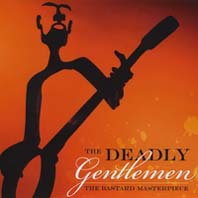
Now I done heard everything!… The Deadly Gentlemen are (is?) a rap band. But it ain't rap like you ever heard before. It's more a heavy, edgy stream-of-consciousness groove, deep-rooted in the acoustic tradition and done to a straight bluegrass backing - banjo, mandolin, fiddle and double bass.
Folks will likely consider The Bastard Masterpiece the illegitimate child of an unholy liaison of bluegrass and rap, then. Actually, it's the brainchild of Greg Liszt (Crooked Still, Springsteen's Seeger Sessions etc), who's gathered around him three 18-year-old bluegrass prodigies (Josh Pinkham, Mike Barnett and Sam Grisman, David's son -all three with work experience to die for already!) to help him realise his often frenetic, skewed but intensely compelling lyrical vision of the modern world.
Greg's delivery is less urban rap than wild-west wild-man, declamatory, in its fervour often rising to a shout or bawl but always brilliantly in control. Some tracks (like Hobo Rockstar) are more semi-spoken, almost beat-scat in nature, with the beats' sense of freewheeling abandon; other tracks are more overtly dramatic, histrionic even (I'm Coming Back threatens to derail several times but stays on track somehow).
The most successful outings are those which harshly poeticise their violent western badland setting, like The Demon Ether and the epic When I Was A Cowboy. It's great too that full texts are printed in the booklet, for such is the nature of the delivery that you'll want to halt the rapid-fire attack occasionally and pause for breath. It's an interesting experiment -tho' it's not easy to foresee how it might develop further down the road on a second CD without merging into its own clichés.
www.myspace.com/deadlygentlemen
David Kidman September 2008
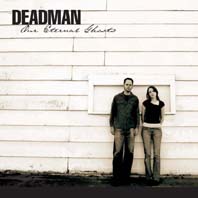
A Texas duo comprising the nasal twang voiced Steve Collins and organist and co-vocalist Sherilyn Collins, while the press blurb offers the album up as a sonic and thematic descendent of U2's Joshua Tree, it's harder to avoid making the Gram/Emmylou comparisons the moment you hear When The Music's Not Forgotten while you'll also detect the strong influence of both Dylan and the Band here too.
Laced with keening pedal steel, the album dwells on a theme of eternity and the determination to live in the face of the awareness of mortality, focusing on what matters rather than the distractions. The result's an often bluesy affair, such as the twilight burnished intimacy of Won't Be Long, a beat jazz lounged Werewolves and the scouring Crazy Horse workout of Sad Ole' Geronimo but it's probably the more desert hued slow swaying colours that paint The Monsters of Goya, the wearied Brother and the fuzzed slow burn country gospel Love Will Guide You Home that's going to send the shivers playing down the spine.
Mike Davies
Dead Rock West - the name conjures up something west-coast and something vaguely country maybe, and that's not far from what you get: power-pop jangle with dashes of garage and country, singing songs that have a timeless-sounding appeal to the emotions and dealing with the familiar and age-worn themes of love, loss, disillusionment and self-discovery. And when DRW rock , well they really rock. Based around the talents of founder members/joint vocalists Cindy Wasserman and guitarist Frank Lee Drennen, Dead Rock West make a strong initial impact then continue to convince all throughout this 42-minute twelve-tracker with their gritty, punchy brand of soul-searching. Contrasting the defiant rocky punk of Telephone with the warm desert wind of All I Know and the solid-state barroom country of Boredom (How Did I Get Here), the Quicksilverish Burning House Of Love, the strutting Turtles-soundalike I Really Wanted You and the sweet brooding of Going Home, there's plenty of contrast here with each successive corner you turn on your eventful journey through the disc. These are tightly crafted, economical songs with clanging guitar riffs and polished vocal harmonies, delivered by Frank and Cindy with the help of keyboard wiz Phil Parlapiano (that can't be his real moniker!), bassist David J. Carpenter and drummer Bryan Head, along with a pedal steel player (Greg Leisz) and the Section (string) Quartet; the recording is clean, natural and uncluttered, "in tribute to older recording methods". Sounds like it just can't go wrong - and that's sure the impression you get, and I ended up liking this one a hell of a lot.
David Kidman April 2007
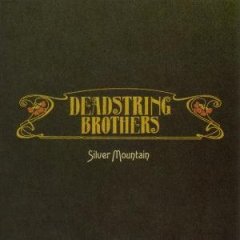
You can't really mistake the influences that have shaped the Detroit based outfit's latest album. Fuelled by many boozy nights in London's Heavy Load club where the current line-up coalesced, this is positively awash with the vintage sound of the Faces and Stones.
Named for the club, Meet Me Down At Heavy Load is so pure Poolhall Richard you need to check that's not Ian McLagan on keyboards while If You Want Me To could be either an outtake from Exile On Mainstreet or an early draft of You Can't Always Get What You Want To and Tennessee Sure Enough a blind date with Honky Tonk Women. And, just to add some extra reference points, stepping into the vocal spotlight on several cuts Masha Marjeh channels Nutbush Tina Turner with a vengeance on Ain't No Hidin' Love and, before it morphs into Wild Horses halfway, Queen of the Scene.
And so it pretty much goes for the remaining tracks, with the title cut, You Look Like The Devil and The Light Shines Within visiting Gram and Emmylou honky tonk territory to satisfy the redneck element of the party clinking the beer bottles. Not remotely original perhaps, but, volume cranked up loud and everyone doing the Jagger strut round the dancefloor, this is the dictionary definition of a rock n roll good time.
www.deadstringbrothers.com
www.myspace.com/deadstringbrothers
Mike Davies February 2008
Deadstring Brothers - Starving Winter Report (Evangeline)
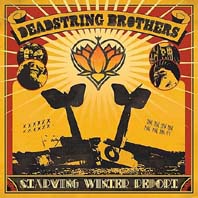
Had plans not gone awry with a fatal overdose, country rock pioneer Gram Parsons might well have joined the Rolling Stones back in the early 70s. Anyone wondering what combination might have sounded like should make an appointment with these Detroit boys. Following up 2003's outstanding eponymous debut, they return an album feet firmly planted on Exile On Main Street's cobble stones and singer Kurt Marschke wearing a Jagger drawl. Heck, they even have a song called All Over Now.
From the opening Stonesys country rolling strutter Sacred Heart through to thumping Motown beat meets blues country closer Lonely Days, there's not a duff moment in evidence. Given the influence of The Band to be heard on Lights Go Out and the gutsy Til The Bleeding Stops it's no surprise they turn in such a cracking cover of their rootsy swaggering Get Up Jake while Talking' Born Blues nods the hat to The Band's old boss circa Highway 61 Revisited.
Fiddles akimbo, Moonlight Only Knows is more straight ahead mountain music country, picking up the earlier Wild Horses soulful ballad notes of Lights Go Out and giving them a bluegrass colouring with the assured unbridled confidence of a band that knows exactly where they've come from and where they're going. They may not be carving out any new highways, but the old roads they travel have rarely been in such good repair.
Mike Davies
Before you hear a note of the music produced by this premier Scottish folk band, you'll love the name! But their music's no letdown, being enticing in a way that the predictable, staid image that Scottish music still has among those not in the know (ie, nowt but plaid and tartan frippery) ain't. Believe it or not, Deaf Shepherd are already on their third album release; Even In The Rain is more than just a creditable follow-up to the brilliant successes of Ae Spark O' Nature's Fire and Synergy, both recorded for the Greentrax label. The band's distinctive sound is down to its blending of what are by any standards some pretty exceptional musical talents. The lineup sports two fiddlers - Clare McLaughlin and Marianne Campbell - and a pipes/whistle player par excellence (Rory Campbell), while the rhythmic bedrock is expertly provided by the guitars of John Morran and bouzouki of Malcolm Stitt, now further enhanced by the bodhrán and other percussion of more recent recruit Mark Maguire. This combination produces some very exciting purely instrumental tracks (just over half of the total), and the playing never disappoints on the vocal selections either. There's a winning enthusiasm, an enviable sprightliness and radiant confidence about the way the band approach and perform their material, whether it's traditional or self-composed in the idiom, and their arrangements combine a masterful tightness with a relaxed sense of momentum. Subtlety is present in the tune-sets as well as in the vocal tracks. The latter mostly feature the singing of John Morran, whose voice has a plaintive yet refreshingly unmannered quality that I started by finding rather an acquired taste but ended up being completely won over. The album's final track, Lost For Words At Sea, has a surprise in store - a vocal contribution from Sam Brown (yes, the selfsame lass who's sung with Jools Holland's Big Band), which proves not the slightest at odds with the simpler folk style of the accompaniment. This exciting album is enhanced by the inclusion on the CDROM of video clips (including a sparkling live tune-set which highlights Mark's prowess on the rhythm beasties!) and other additional information.
David Kidman
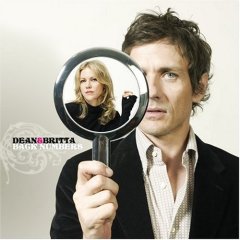
A new album from Dean Wareham, former luminary of fuzz psychedelia outfits Galaxie 500 and Luna, is always an enticing propisition, all the more so since his pairing with fellow erstwhile Luna partner Britta Phillips as a duo. You'll still hear references to their Velvet inspirations on something like Words You Used To Say where Wareham's vocals evoke a mellower Lou Reed, but it's their cover of You Turned My Head Around that perhaps posits their ambitions for the album as a Lee Hazlewood and, sometimes Nancy, sometimes Ann-Margret, for the 21st century. Wareham's voice is considerably more hushed and smoother than Hazlewood's gravel tones, but you can hear the influence seeping through numbers like the lazily languid afternoon relaxing waltzer The Sun Is Still Sunny (expanded from their score to the Squid and the Whale), the lysergic pulsing Singer Sing and his solo voiced soft-acid version of Donovan's Teen Angel which, unless I'm mistaken, also slips in a musical refrain from Angel of the Morning That's just one of the sprinkling of 60s songs here, the other two being Britta's dreamy cover of Jacky hit White Horses and, again underlining Reg Presley's rock credibility, a breathy cosmic float through the Troggs' Our Love Will Still Be There.
Elsewhere the wooziness is supplied by the couple's own material, at its best on the minimal night under open stars sway of Phillips spotlight Wait For Me (first heard on the soundtrack of Clean) and the shimmeringly lovely Crystal Blue R.I.P. which sounds like a happy union between Brian Wilson and Tommy James. It's unlikely to advance them beyond their current cult status, but as a soundtrack to a chemically enhanced sprawl on the sun lounger they don't come much better.
www.deanandbritta.com
www.myspace.com/deanandbritta
Mike Davies April 2007
Six years ago, Barbara Marsh and Ginny Clee were celebrating the release of their second album, No Skin (released here on Transatlantic), and a major label deal with Geffen. However, no sooner was the album out in the States and surging to No 14 on the Triple-A charts than Geffen got sold and the girls found themselves handed a wad of cash to go away. Thankfully they didn't decide to call it a day and, better late than never, they're finally back with a new label and long awaited third album that features helping studio hands from Billy Bragg and his Blokes. It opens with its best track, Drunk on Hallelujahs, a title surely reheard from a line in Cohen's Hallelujah and a melody that recalls the Cowboy Junkies' Misguided Angel. "I'm holding auditions for a new guardian angel The last one didn't work out bored and distracted whenever I tangled with gloomy disaster and doubt," they sing, putting to rest any worries that their lyrical edge may have dulled in the intervening years.
The remaining nine tracks aren't exactly also-rans though. She Was The Dynamite is a powerful swampy song of domestic abuse ("there's blood on the sheets and steam on the mirror He's drawing a map with his wedding ring finger His bruises are mountains his veins churning rivers his eyes distant cities where you wouldn't raise children and he remembers crossing the room walking towards her like a train") but one that comes couched in understanding if not excuses ("some other guy in some other town is buying her a drink touching her thigh star in her eye she's laughing ... She was the dynamite waiting on his track), while by immediate contrast Ship, a song (co-penned with Syd Straw) urging giving in to your heart, and the beautifully harmonised devotional Fix conjures again the McGarrigles comparisons. Rise and Shine is gossamer acoustic folk hued (a bit like Pooka in a way) with a tumbling collapse in your arms ringing guitar line that belies the utter desolation of the lyrics, Damage a liltingly gentle mountain country song of break-up aftermath. While at the other end of the spectrum their rock sensibilities plangently ring through the folk-rock rumbling Too Much Girl (a cautionary riposte to Ship) and Skinning rides a twangy guitar and wibbling programming through a noirish, nervy mood of trying to move on while clinging to the past's bruises ("I reach into the wardrobe where I've hung my old skin Try it on It will always fit but it will scratch me").
The closing harmonised dust dry river bed folk of the emotionally damaged and desperate Crack My Heart, sparse guitar laced with yearning strings, sums up a running thread of barely hanging in there, attempting to numb the pain and retaining a slipping grip on hope and trying to feel under a sky the colour of lead. It's a melancholic affair, but rarely has melancholy sounded so beguiling.
Mike Davies
One might be forgiven for thinking that the legal profession is taking over the folk scene of late, with ensemble names-to-conjure-with like Patterson, Jordan & Dipper; Spiers & Boden; Craig, Morgan & Robson; Shepheard, Spiers & Watson, and now we have that obscure firm of solicitors (no, only kidding!) Dearman, Gammon & Harrison…! I've known and loved the singing and playing of this charismatic trio for some years now through their residency at Pete Coe's fine Ryburn 3-Step folk club, and I was surprised to find that this is their first joint recording despite their evident extensive experience of reinterpreting traditional folksong in what they legitimately and accurately call "a robust and firmly rooted English style". Hallmarks of their style are an infectious, lively delivery, which is at once direct and upfront yet thoughtful, and here EFDSS have done them proud in giving them a recording to match, supremely accommodating yet immediate in impact and coming across very much as though they're performing there live in front of you. The trio is blessed with two singers who are contrasted in both character and timbre yet also highly complementary when singing together. They provide a vital spark, with phrasing determined by long experience of thinking about and singing their chosen versions of the songs. Their ensemble version of Lark In The Morning, for example, bounces along most joyously. Annie's voice is a strongly individual and distinctive one, with warmth and a quality of rather seductive earthiness that she shares with Chris Coe and Mary Humphreys; she also has a definite "Essex" vowelisation that's a bit of a trademark. Just sample Besom Maker (aptly prefaced by a Broom Seller's Call), or Pretty Little Feet, or Sorry The Day I Got Married, for an idea of how attractive Annie's singing is, while there's also her unaccompanied rendition of The Crafty Maid's Policy which delights by being at once stirring and fun. Turning to the estimable Vic, his richly turned singing with its careful use of vibrato is a constant pleasure, possibly never more so than on Just As The Tide Was Flowing and his unaccompanied rendition of Early, Early In The Spring. These, like many of the selections on the CD, may seem over-familiar titles, yet the variants which the threesome have collected or collated with due scholarly care and forethought turn out to be wholly credible and performable and in some cases preferable to the more "usual" ones. I need also to praise Steve Harrison's exemplary musicianship on one- and two-row melodeons and mouth-organs; his generous and tuneful phrasing, lithe step and non-intrusive rubato enable the singers to achieve free rein for the expressive demands of the song texts. And he clearly understands the needs of both too – an understanding which few "accompanists" imagine let alone achieve. Vic's prowess on 5-string banjo, anglo concertinas and one-row melodeon playing also contributes greatly to the CD, and along with Steve (and Johnny Adams playing a "real piano" – glory be!) he performs three brief, suitably sprightly tunes as interludes. A delightful release that manages to be attractive and accessible while also satisfying more specialist tastes.
David Kidman
Why I'd not come across Niamh before is a real mystery, for she's a very accomplished singer, no doubt about that. Her CV includes membership of Fionnuisce, the Park Singers choir and Mick O'Brien's band Callino, and she's also performed with diverse ensembles from concert orchestra to jazz band. She possesses a glorious voice whose resonance lingers in the memory well after the song has finished. Her elegance of expression and supremely graceful command of phrasing are most impressive too, and she has a real feel for the traditional song repertoire, from which the bulk of the material on this, her debut CD, is drawn. And she scores another bonus point in my estimation by steering clear of the well-trodden and over-recorded songs. Niamh is joined here by a select roster of highly-regarded musicians: Máire Breatnach (fiddle), Séamus Brett (keyboards), Altan's Mark Kelly (guitar), Mick O'Brien (pipes, whistles), Mick Giblin (guitar), Danny Byrt (percussion), Mary Black band members Bill Shanley (guitars) and James Blennerhasset (bass), and backing vocals from Jim O'Leary and Fergal Ó Murchú (of the Ragús show). They flesh out the texture very appealingly, and provide a soft-focus yet admirably sensitive foil for Niamh's voice with just enough going on to set and maintain listener interest, while Máire's production work is exemplary, enabling the textures to breathe even when a number of instruments are being played at once. Generally speaking, the piano is given more prominent a role than the guitar, and this lends a quite mellow air to the proceedings, but it's all very attractively managed. My favourite tracks so far are probably Ye Lovers All, the forthright yet sprightly Síle Ní Ghadra and Andy M. Stewart's beautiful If I Never Spend A Morning Without You, but Niamh's truly lovely duet with Jim O'Leary on Farewell Dearest Nancy runs them very close. On the basis of the music contained within alone, this is a CD to treasure, and I look forward to hearing more of Niamh (I bet she sounds great unaccompanied too - how about that for the next CD?). However, the impact of this lovely release is seriously compromised by the total lack of any notes on the songs, or even a summary translation of the lyrics (no fewer than six of the twelve songs are sung in Gaelic) - let alone the barest paraphrase of the titles. If, as Niamh claims in the tiny booklet-note, the songs are ones that hold a special meaning for her and her aim is to communicate that meaning to the listener, then why on earth can't the necessary information be provided?
www.gaellinn.com
www.copperplatedistribution.com
David Kidman August 2006
Decameron - Parabola Road (Castle) Formed in Cheltenham in 1968 and finally settling into their five piece line up in 1973 with Dik Cadbury joining Johnny Coppin, Al Fenn, Geoff March, and Dave Bell following the recording of their Say Hello To The Band debut (and only) album for Vertigo, Decameron were essentially Gloucestershire's folk rock answer to Lindisfarne and The Strawbs. However, despite a sizeable following and being well respected in critical circles, the band never translated their popularity into chart bothering sales. As this anthology, a gathering together of their three Mooncrest/Transatlantic albums, Mammoth Special, Third Light and Tomorrow's Pantomime, shows, such commercial neglect was decidedly undeserved.
Certainly not everything has stood the test of time and some of the songs - Mammoth Special's tale of a Rotterdam restaurant comes to mind - were probably ill-advised even at the time, but there's much here to be welcomed by new ears as well as longtime admirers.
Their ability to write catchily melodic potential singles is well demonstrated on Rock and Roll Away and the business bashing Breakdown Of The Song while they certainly turned in a more than respectable covers of Buffalo Springfield's Rock and Roll Woman (done a capella) and Tim Buckley's Morning Glory. But it was on their tremulously emotive ballads at which they really excelled, songs such as Just Enough Like Home, Glimpse of Me, Wide As The Years and The Strawbs-like The Strawman all classics in their repertoire that still bring a shiver to the spine.
It's great to hear these and the likes of The Shadows on the Stairs, The Stonehouse and The Ungodly again without the accompaniment of slicks and scratches on the old vinyl, and as a bonus the 2CD set also adds two non album live tracks (Poscards From Cornwall, About Time) and a brace of rarities in Cheltenham Ladies and Twinset and Pearls. Plus you also get spot on covers of New Girl In School, Why Do Fools Fall In Love? and Leiber/Stoller's What About Us? the three tracks they released under their fun side project pseudonym as American close harmony surfers The Magnificent Mercury Brothers.
Mike Davies
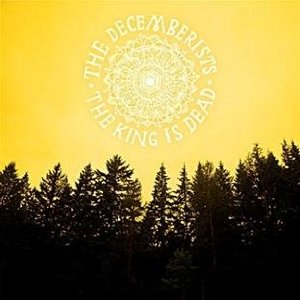
Their name taken from the reformist Russian revolutionaries of 1825 (the band have been known to open live shows with the soviet national anthem), the Portland outfit fronted by Colin Meloy have been building a considerable cult following over the past decade with their British folk and Morrissey influenced albums. However, this, their sixth studio album (and spot The Smiths title riposte), could well be the one to break them into mainstream success. Perhaps drained by the intensity of 2009's folk opera concept album, The Hazards Of Love, Meloy has lightened up the musical and melodic canvas and drawn considerably on the REM influence to be heard on earlier numbers We Both Go Down Together and Yankee Bayonet. Peter Buck even joins them on three tracks.
From the harmonica blowing intro and slow marching beat of opening track Don't Carry It All with Rawlings and Welch on backing vocals, it's evident they've plumped for crowd swaying anthemic melodies to carry the keening vocals, chorus hooks dominating the menu.
Kicked off with ringing acoustic guitar, Calamity Song is the first of the obvious REM nods (Driver 8, as it happens), Buck supplying the chiming 12 string guitar of the chorus while John Moen supplies a typical Bill Berry drum pattern. It's a rousing, jubilant number, even if the lyrics do talk about scores of innocents dying when California succumbs to the fault lines. Of the other REM echoes, Down By The Water has Neil Young harmonica intro, but (again featuring Buck) the rest is firmly coloured in the darker shades of their folk-rock painbox with Welch amping up the harmonies; indeed Meloy himself says the song actually began as a paean to REM. And, while Buck not appear on This Is Why We Fight, Michael Stipe and Morrissey share equal input on what is yet another of the album's stirring anthemics.
However, REM aren't the only building bricks in the playbox. January Hymn is a beautiful slice of acoustic English folk music, the simplicity of the melody line complementing lines like "on a winter's Sunday I go to clear away the snow and green the ground below', an image that could almost be a metaphor for the band musical rejuvenation itself.
A few months later comes the glorious June Hymn. With shades of Paul Simon circa his Songbook solo album, picking up on the line about the turning of the seasons in the opening track, it's a celebratory rebirth of a song packed with bucolic imagery of yellow bonnets garlanding lawns, 'a barony of ivy in the trees' and jasmine on the vine.
Fiddle getting things moving, All Arise! is a stomping honky tonker with Jenny Conlee tinkling the ivories, Rox In The Box is a shanty bluegrass sway about the miners of Butte, Montana, Conlee trading accordion with Annalisa Tornfelt's violin while, streaked by weeping pedal steel, Rise To Me is a lovely lilting Americana love song of determination to wife and child, even mentioning the latter, Henry, by name.
An untitled coda to This Is Why We Fight, a bluegrass fragment featuring Welch, banjo, accordion, rain and thunder, leads into the final track, Laura Veirs joining Welch and Rawlings on backing vocals for Dear Avery, a poignantly forlorn lament for a missing youth, pedal steel underscoring the lyrics as Meloy sings 'you were my Avery and when you needed saving I could just grab you by the nape of your neck.'
If you're one of the millions who think Reckoning was REM's finest hour, then this is the album you've been waiting for.
The Deluxe Edition comes with Pendarvia, a DVD making of documentary that also includes the unreleased Burying Davy.
Mike Davies January 2011
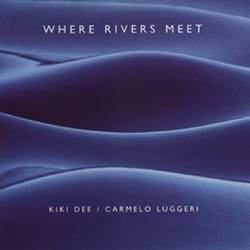
Let's be honest about this, following her plunge into direction dithering after 1973's Amoreuse, I'd have had to be tied down to listen to a Kiki Dee record. And no, I'm not one of those who go weak at the knees at the thought of Don't Go Breaking My Heart. Well, I do, but not for the right reasons. Then came 1995's revelatory live acoustic album Almost Naked and I found myself on the Road to Damascus.
The journey continues with the rediscovery (repromotion?) of this, recorded in '98 and her first studio album in twelve years. Again teamed with guitarist/co-writer Luggeri, it's a fuller affair than the acoustic set but by no means over-arranged and over-orchestrated as has been a problem with her past albums. A gentle, ambient spiritual atmosphere allows Dee's voice to shine through, mellowed now into a smoky smooth wonder that caresses with its beguiling mix of melancholy, wonder and affecting emotion. I guess it's a world album as such since it fuses the duo's own sensibilities with a strong Eastern rhythmic influence with tabla, flute, tanpura and Indian percussion as well as the western ethnic tribal flavours imparted by bouzouki, didgeridoo, auto harp and mandolins on assorted tracks.
Taking to harmonium for One And Only Love, a number arising out of her relationship with her parents, the folksy heart beats strongly here and on several occasions, Dee's supple, warm voice caressing and entwining around the melodies in a manner that evokes both Eddi Reader and Sinead O'Connor. There's gorgeous, dreamy, emotionally piquant stuff here, and while the consistently high quality of material and performance makes it's hard to single out highlights, for those wavering about commitment to the listening experience I'd have to recommend relationship break up song I've Run Dry, the uplifting mother/daughter celebration Under The Night Sky and the peaceful, hymnal affirmation of Wake Me From This Sleep that is, quite possibly, the finest thing she's ever recorded. An album essentially about looking forward at a certain age, "this is my November song.. it's just my beginning" she sings on the highly personal Pretty Tune. The future looks radiant.
Mike Davies
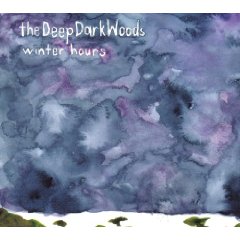
On Winter Hours, Saskatchewan's premier alt-country-roots outfit Deep Dark Woods twang and intone their way through a second helping of hard-luck stories and misery-filled narratives, though - importantly - retaining a certain feelgood factor (I'm not sure exactly how).
The opening Farewell has the lugubrious tone of a Handsome Family opus (albeit sung in a tenor rather than bass-baritone register), but it soon relaxes into a pedal-steel lament much in the Gram/Burritos groove. Similarly starting out how it means to go on, there's the plaintive How Can I Try, which signals a renewal of desperation in its cyclical chord progression that returns us to nowhere in particular. Not altogether typically for the band's producer Steve Dawson, we also encounter a certain quality of warm, claustrophobic opaqueness in some of the instrumental textures, which kindof adds to the moodiness and overall sense of shifting uncertainty generated by the lyrics. OK, so with Deep Dark Woods it's more downbeat than downright surreal, so the Handsome comparison proves more superficial than actual, and there are times when the hymnal harmonies of Fleet Foxes are recalled, as on the beauteously sad All The Money I Had Is Gone, the doleful mood of which is finally lifted by an organ break towards the end of the track. And several other songs recall the old-time Americana sensibility of Garcia-Hunter classics of the Working Man's Dead/American Beauty era.
The traditional song When First Into This Country (covered towards the end of the set) has clearly also influenced the writing of the band's mainman songsmith Ryan Boldt, especially on tracks like As I Roved Out, although one of the most traditional-sounding numbers, Polly, turns out to be an organically jammed group composition. The Gallows could have emerged out of the shadows of Big Pink, while comparably timeless (and almost naïvely simple, in the old-time sense) constructions like The Birds On The Bridge and the delicate, eerily harmonious title song seem to almost gaily sidestep the directly personal paranoia of the lyrics.
Although the musical settings are full of character, their sometimes minimalist nature tends at times to tread deceptively carefully and even respectfully, almost denying any intentional involvement in, or any right to comment on, those lyrics; occasional exceptions, such as the laconic, uncharacteristically uptempo Two Time Loser, let the music breathe more and even chance a rockout solo or two - and they stretch out more bluesily on The Sun Never Shines. But I'd not want to seem to be underselling Deep Dark Woods' intense musical vision, which actually rewards considerably more with each successive play: don't be diverted by first impressions, for this is a strong, honest and sincere, and thoroughly fulfilling record.
www.myspace.com/thedeepdarkwoods
David Kidman July 2009
This is Deering & Down's third album and having based themselves in Tennessee since 2004, it has a flavour of that states most famous town, Memphis. They have amassed themselves a formidable band whose members include Rick Steff on keyboards (ex- Cat Power, George Thorogood, Gin Blossoms) and drummer Kurt Ruleman (ex-San The Sham). I was certainly taken aback by Canadian vocalist Lahna Deering' squeaky tones on the opening track, Finally Found The One. It turns gritty rather than squeaky the further into the song we go. It has a rag tag homemade sound and doesn't really reach its initial promise. Whatcha' Thinkin' Of has a certain punk feel to it. Her voice is better suited here but it does get a bit of getting used to. There's a better base to this. Can't Wait is mid paced rock and Richard Of Los Angeles is a rock ballad with the obligatory big chorus. Unfortunately, the stadium rock guitar solo from Rev Neil Down doesn't quite work.
Sad Love is slow and plodding and Wonder Who's Callin' doesn't offer anything too exciting either. Velvet On Stone is a slow country ballad and the singer has a Dolly Parton tone to her voce but don't be fooled by the childlike quality, there is a lot of power in there. Sugar is a sleazy, grungy blues that works well and Cow Cow Girl is a fractured alt.country that is one of the best songs on the album. Deering turns in a Stevie Nicks style vocal on Oh So Good before giving us another slow song in the form of Abbey. Perhaps they have recorded too many slower songs for this album than is absolutely necessary. There is nothing wrong with this one but it is just not exceptional. Bessie's Big Way is the closing track and this is unashamed country although I originally thought that it was going to be about Bessie Smith. It's a guitar instrumental with enough small (deliberate) errors to give it that homemade feel. This may be a slow burner and there are certainly enough plus marks to give hope for the future.
www.deeringanddown.comDavid Blue February 2008
Oonagh's an Armagh singer-songwriter whose original songs, written from a modern-day woman's perspective, are musically accessible while remaining edgily contemporary in outlook. Her debut CD's 12 tracks comprise ten original compositions and two covers, and employ a comfortingly familiar-sounding instrumental backdrop that makes good capital of acoustic instrumentation alongside occasional use of a radio-friendly rhythm section. Oonagh has evidently found a sympathetic producer in Gerry O'Connor (of Four Men And A Dog fame), who also brings his own brand of banjo and fiddle virtuosity to the mix on several tracks.
Perhaps against the odds, Oonagh has chosen to kick off the CD with one of the covers, a neat and perky take on The Sugar Babes' About You Now with some pleasing guest dobro work from Colin Henry well up in the mix. After that encouraging opener, though, I was surprised to find Oonagh's own compositions, for all their well-sung and pleasantly scored qualities, rather lacking in individuality, at any rate the first pair, Sick Sore And Tired and the title track, these being little more than pop-rock confections with not a great deal of musical substance to fire the imagination. Things seem to improve with Oonagh's poetic expression of regret on the more lyrical September and the cautious optimism of I Still Believe.
The album's centrepiece, Beauty The Betrayer, is the odd-track-out in that it pits Oonagh's spoken lyric against Barry Kerr's keening uilleann pipes, and the wistful acoustica of Jigsaw Pieces (one of four songs jointly penned with Stephen Derby) is an affectionate expression of love for a child couched in a gentle and attractive musical setting. Lovely Friend continues in a similar vein, while the uptempo country-styled Silver Shoes explores the fantasies and regrets of a modern multi-tasking mother. However, the spell is then broken by I Am Because, another slight, pop-styled excursion that doesn't really do anything special. Oonagh's individual and clearly heartfelt cover of Thin Lizzy's Dear Miss Lonely Hearts brings the disc's final interlude, and qualifies as another successful reworking, leading effectively into one of the album's standout cuts, The Dove Children, which closes proceedings in reflective mood with a beautiful guitar-and-dobro backing that (sparse though it is) feels almost too sumptuous for its tearfully questioning and confused lyric.
In all, while I can appreciate the superb quality of Oonagh's voice and some of her songwriting certainly engages appropriately, I still don't feel wholly convinced by her debut offering, even after a number of visits to Harmony Street.
www.oonaghderby.com
Available from Copperplate Consultants
David Kidman August 2011
Domenic's debut solo CD, only finally recorded after some twenty years' experience of playing and writing, turns out to be a series of mature and eloquent, intimate, passionate and haunting performances of his own impressively crafted original songs given with uncluttered and tremendously effective backings (mostly his own guitars and Laouto - a Cretan instrument - with some flute and keyboard). And superbly recorded to boot, crisp yet with plenty of ambience. As for background info, Domenic was born in Canada, the son of Italian immigrants, but now lives in London; since well before the millennium, he's been travelling the world sharing his musical skills as a film and TV composer as well as co-founder/lead vocalist of the world music group Praying For The Rain, with whom he's appeared at several key festivals in the UK and Europe, and producing and performing with the 60-piece Songlines Choir. Still Lives And Dreamers sees Domenic returning to his roots as a singer-songwriter, and it's clear that he has a talent for coming up with lyrical and thought-provoking songs which reflect powerfully and movingly on themes such as the rediscovery and celebration of life. In some respects (songs such as A Single Soul), his writing reminds me of classic chansonniers such as Brel, whereas other songs (I Feel You In Me) bring to mind the gentle philosophicality of Dougie MacLean through the use of universal imagery. The settings may be admirably simple for the most part, but the overall effect is of a sumptuous tonal richness that suits Domenic's writing – and his intense, accomplished vocal work - ideally. This is not a criticism, but there's a possible barrier in that the relative uniformity of pace (slow-to-medium) over the vast majority of the disc's 61 minutes may be too wearing for some listeners, at any rate all in one sitting; it's only with Angel's Wings, All That I Am and then the penultimate track, the Cat Stevens-like Glass Bubble, that the tempo marking manages to rise much above adagio. Domenic clearly has a good feel for texture, and exercises an admirable restraint on most of the album; striking instrumental colours such as Vince DeCicco's accordion and David Coulter's violin or bowed saw weave a luscious magic on songs such as the title track, Let Go Of The Tears and Angel's Wings. It's only with the glitteringly over-arranged It's Christmas Time Again that things get a mite stodgy (this track, which inevitably got released as a single last year, strays mildly over the line of acceptability for me). Oh, and I might also mention that one key song, Sunlight Skies, is given in two differently-accompanied versions here. Taken on its own terms, Still Lives And Dreamers is actually a quietly stunning record that you may well enjoy more than you might expect. Presentation is economical too, with full lyrics crammed neatly into the single-fold insert. (Distributed by Proper.)
David Kidman April 2007
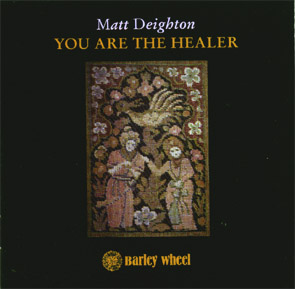
Originally recorded in 1996 but not released until four years of record label hell later, this finally appeared in 2000 on Deighton's own Barley Wheel imprint. Now it's reissued at budget price via his current deal with Almafame that spawned last year's follow up The Common Good. This afford the chance for newcomers to catch up on the back catalogue and to see that's he's remained faithful to the soulful acoustic and organic folk-rock he's been pursuing since his days with Mother Earth.
Enlisting the help of Brian Auger on organ and his other half, Nicola Bright-Thomas on harmony and, on The Garden Grows and Little Lost, lead vocals, it's a largely low key affair, the sparse guitars given added colour with the addition of strings, sax and flute. Again it's hard not to make mention of the obvious Paul Weller comparisons in terms of melodies, voice and guitar work but since they share a common affection for 70s English progressive pastoral folk and Nick Drake in particular (check out Years In Pieces if you need any convincing) and so that's not too surprising. You'll also hear echoes of Van Morrison, John Martyn, and the David Crosby elements of CS&N filtering through such tracks as Next Year, In The Finish and the instrumental Tannis Root and while So Are You clearly doffs the cap to Steve Winwood.
A warm voiced singer, talented songsmith and immaculate guitarist, Deighton's slowly building an admirable body of solo work but after three albums of essentially the same blueprint, hopefully his fourth will find him expanding his boundaries rather than simply working within them.
Mike Davies
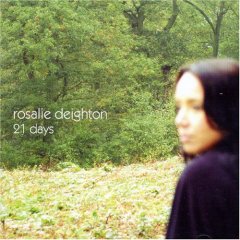
Putting aside her brief (and now erased from history) tenure as one third of Hummingbird, this marks the Indonesian-Dutch-Barnsleyite's first recordings since her debut Truth Drug, an album she hated, feeling she'd been pressured by the label into making something unrepresentative of what she was about.
Here though, ensconced in a new home and collaborating with the ubiquitous Boo Hewardine (who co-penned five of the 11 tracks) and the likes of John McCusker, Fran Healy and Dave Marks, she's a much happier puppy.
Rightly so, because, getting back to her English folk roots (though Where Do You Go When You Dream?, written about watching a child sleeping, is flavoured with a feel of French cafe music) this is a fine collection of melancholy destined to tingle your emotions as finely as Deighton's catch in the throat sweet husked voice entrances the ears.
Asked to write a song to break hearts she duly obliges with the opening Sing To Me, a lovely lazy drifting lost summer number imbued with a dreamy weariness and achingly wistful chorus. But then she effortlessly achieves the same effect on several other cuts, notably the yearningly reflective backwoods folk feel of Wagon Wheel where she could pass for a female Jackson Browne, the heavy sadness that hangs over Turn Down The Light as she evokes thoughts of the young Melanie had she been a Yorkshire folkie, and the simple mandolin rippled Don't where you can almost hear her heart tremble as she warns 'don't you dare make me cry'.
Although she's now happily settled with best friend Marks, the album's full of similar break up and betrayal songs, finding her nakedly vulnerable on the lullaby lilting Second Best, and adopting false bravado on the bluesy starkly acoustic Bruised only to collapse into the plea 'please recover me'.
While she gently admonishes whoever it was that fooled her again on the delicate waltz time Favour (where she calls to mind one of her prime inspirations, Mary Margaret O'Hara) and the brushed slow dancing Pilgrim, she also acknowledges 'you're no Jesus, I'm no Mary Magdalene, owning up to being easily swayed by a winning smile on the title track, referring to both the time it took to record the album and the period needed to break a cycle of hurt.
She doesn't wallow though, which for all the downside of love it reflects, makes this actually a surprisingly uplifting and buoyant album, a hymn to rising above it all and trying again. She did, she has and this is three weeks worth of sheer pleasure that should last a lifetime of listening.
www.rosaliedeighton.com
www.myspace.com/rosaliedeighton
Mike Davies July 2007
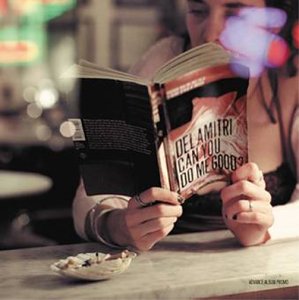
You know what you're getting with a new Del Amitri album - a collection of good, honest rock songs boasting an occasional country-ish tinge played by a good honest rock band. So, you confidently load Can You Do Me Good? - the band's first album of new material for five years - into the CD drawer and settle back for what you know will be coming from your speakers and - what's this? Timmy Thomas playing keyboards with Mother's Finest over a Norman Whitfield orchestral arrangement?
What you're listening to is Just before you leave, the first single to be lifted from the album, and its standout track. It opens with the choppy organ motif from Thomas' hit Why can't we live together? then develops the funkiest and most insistent bass pattern, reminiscent of Chaka Khan's old band, and then the sweetest of string arrangements is applied, harking back to some of The Temptations' finest moments. Over it all are Justin Currie's trademark vocals relating a tale of acrimony as a woman's former lover asks if she treats her new man as badly as she'd treated him: "Don't you try to bend him until he breaks, like you broke me?"
Back on more familiar Dels' territory, Cash and prizes is a similarly bitter affair as the son's character bemoans his misery and loneliness despite being surrounded by great wealth. He has a "Rolls Royce running, just 'cos I love the sound it makes" and the saddest aspect of all: "I've got two sons competing to be the images of me but cash and prizes, I guess, is all that they can see." Through it all Ian Harvie repeats a catchy guitar figure and Mark Price's drums chunkily push it all along at a pleasing lope.
Currie must surely have been listening to The Strokes when he sat down to write Drunk in a band, a prime slice of Scots-inflected New York punk, from the thick guitar chords to the manic synthesised squeals. While Currie may complain of being the inebriate of the title, the catalogue of old friends and acquaintances' careers make you realize there's more than a little irony at play here: "Pat is the guy with the record shop, and John sells fruit but wants to be a cop, and Paul deals speed in a Celtic top, but I'm just a drunk in a band."
With that manic thrash out of their systems One more last hurrah arrives on the wave of a gently picked acoustic soothing cymbal washes before building up steam on a drum-driven rhythmic tide. Love, and lovers, lost is a regular theme and is visited on Buttons on my clothes ("Everybody knows she ain't comin' back"); Out falls the past ("Every time I find somebody, the whispering begins about how I change my women like traffic switches lanes"); and She's passing this way ("When she walks and leaves you blue, you'll look like the junkie standing here in front of you").
There are a dozen slices of this particular Del Amitri cake and, after the initial shocks of Just before you leave and Drunk in a band, it quickly becomes apparent that what we have here is a collection of good honest rock songs - well up to scratch.
Fred Hall
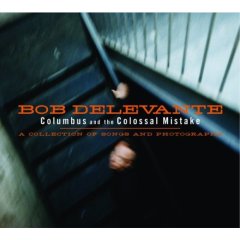
Formerly 50% of The Delevantes with brother Mike, this is his second album and comes sporting the subtitle A Collection of Songs and Photographs, a reminder that he's not just a singer-songwriter, but a graphic designer who's a dab hand behind the lens too.
His tenor voice reminiscent of Steve Forbert, it doesn't quite have the power to give the uptempo, more rocking numbers the vocal charge to go with the musical muscle, but on the quieter, reflective songs it ably provides the emotional catch to his literate lyrics. Not to say the sprightlier tracks don't always work, indeed the opening title track, a witty tale of bumping into love by accident, is a naggingly catchy affair, but you do find yourself thinking that the train rhythm boogie woogie Paint My House, the Creedence like choogling Like A Meadowlark Blues and the lyrically inspired throaty blues Venice Is Sinking would benefit from deeper, gutsier tones.
However, when it turns to the ballad or mid-tempo country roots numbers, the dusty edge to Delevante's delivery is perfectly suited to socking across such songs as the jangling Circles Like Me (which sports the line 'she dances like an angel, she charges like a Sherman tank'), the wistful, cello accompanied childhood memories of An Old Picture Of You, the Steve Earle pop swagger Fly Home To and the fun driving romp that is Texarkana State of Mind with its burbling jews harp backing. With a tight house band that includes bassist Gary Tallent and pedal guitarist Fats Kaplin, and guest appearances by Buddy Miller, Emmylou and, blowing harp, Southside Johnny, Delevante also throws in an unexpected delight in the form of a shuffling country blues slowdown twangy guitar burn through Ramones classic The Blitzkrieg Bop. Not an album you'll have on repeat play perhaps, but it's a solid Americana listen; and those chiaroscuro black and white photos aren't bad either.
Mike Davies November 2006
Delays - Faded Seaside Glamour (Rough Trade)
Fronted by the tremulous girlie voiced Greg Gilbert, the newly emergent Southampton outfit are steeped in a starry eyed and laughing 60s nostalgia for jangling three minute pop songs that soar heavenwards on chorus wings and the sort of cascading melodies that make The Las seem like industrial white noise merchants.
Bursting into the public consciousness like the first swallow of summer with a debut album that offers a ltd edition featuring bonus DVD of promo vids and live performances, they swell with falsetto hope on Wanderlust as Gilbert assumes the mantle of Liz Fraser before he switches vocal affection to sound uncannily like Stevie Nicks on Bedroom Scene and then gets his gonads temporarily into Spiritualized gear for You Wear The Sun and a pretty fair impression of Roger McGuinn before his voice broke on Hey Girl.
They don't quite manage to sustain that first glorious rush throughout the album, Stay Where You Are is a particularly turgid sub Happy Mondays groove, There's Water Here a noodling acoustic number that never quite sounds finished and Satellites Lost could have done with the direction counter being reset, but by the time they get to the chiming One Night Away and the Stone Roses-ish mantra sway of On all is forgiven.
Listen carefully and you'll find that with tales of lost innocence, death and wasted promise, the lyrics aren't quite as joyful as the melodies might suggest but when you're being swept away into angelic singalong bliss for Nearer Than Heaven I daresay you'll be too euphoric to notice.
Mike Davies
Grey De Lisle - Iron Flowers (Sugar Hill)
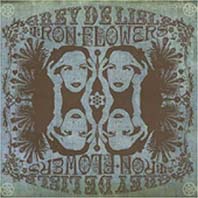
David Kidman
Grey De Lisle - The Graceful Ghost (Sugar Hill)
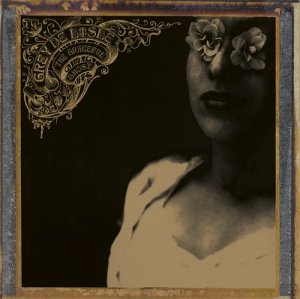
This is a real strange record, and not your typical Sugar Hill fare at all. At first it sounds like Dolly Parton trying to sing old-time songs she made up on the spot from childhood memories while trapped inside an old backwoods house full of antiquarian instruments and gadgets, possessed by the spirits haunting the place. OK, so Grey sounds uncannily like a reincarnated sister to Dolly. And the sparse musical settings imply a weird partnership between Gillian Welch and the Handsome Family in their ghostly neo-gothic garb. But actually on balance this album's probably better described as a collection of tender, bittersweet ballads that were all composed by Grey herself at the time she and her then-boyfriend Murry Hammond were engaged in a long-distance romance, as a kinda record of their courtship and what it turned into. It all positively drips the atmosphere of pre-Civil War old-time music, an ambience exaggerated by Grey's use of archaic instrumental timbres like autoharp, music-boxes, pedal harmonium and authentic 1800s out-of-tune piano alongside the usual guitars and stand-up bass. Guitars are played by the aforementioned Murry, by the way, along with Marvin Etzioni, and bass by Sheldon Gomberg, but all textures are crystal clear and kept unswamped, giving the songs a mood of intimate, delicate spirituality. The whole affair was recorded in Grey's living-room, believe it or not. Occasionally passing gimmicks like a repro-acetate spoken reading of an old love letter (on Tell Me True) are a tad contrived, while the melody of This White Circle On My Finger is too close to I Love You Because for comfort, but for the most part Grey's take on ancient Americana is charming, original and inspired, heavy on genuine atmosphere, and sounds absolutely delicious. The packaging of the album is attractive too, being inspired by Julia Margaret Cameron's photographs of women with "ghostly eyes"; and as well as the audio CD there's an eight-minute video on the making of the album. I also learn from the press release that Grey's already released three albums under her own aegis – now these I'd love to hear…
David Kidman
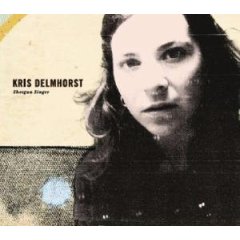
Her last album saw the Brooklyn singer-songwriter interpreting the poetry of, among others, Byron, Browning, Masefield and e e cummings. Here though, it's back to her own material but those expecting a return to the salt and sea flavours of Songs For A Hurricane arc will be surprised to find that, while she's still elemental in her ambience, her musical location now seems to be more the fecund groves of swampy everglades. You can forget the Baez and Lucinda comparisons too. Instead you might think of Dusty Springfield around The Look Of Love when you hear the breathy If Not For Love, find strong hints of kd lang-our to the jazzy folk inflected Blue Adeline and even touches of Tom Waits crossbred with Victoria Williams and Laura Veirs on the loose limbed guitar blues Riverwide.
Recorded over late nights in rural cabin solitude with minimal gear and loads of instruments weaving into each song before she invited in other musicians to work their own brushes to their canvas, it very much captures the twilight hours of its genesis. On Birds of Belfast you can almost hear the dawn rising through the mist as she sings of transformative love recalled in quietness, while on the cello coloured Freediver her voice stretches like someone rousing from slumber to pad around the house breathing in the stillness and the pizzicato strings on Oleander (where I'd swear she's been listening to Kate Bush) gather like fireflies around the songs flickering candlelight waltz.
Not that she doesn't get the blood flowing too. 1000 Reasons with its drum machine and clap beats is a skittering pop song infused with the anticipation of a lover's meeting, To The Wire with its coy finger on lips vocals is joyous tinkling classic songwriter pop with jogging chorus beat, tinkling strings and clinking percussion that surely owes inspiration to Brian Wilson's skewed summers.
The lullabying bluesy gospel lit torch of Midnight Ringer (from whence the title line comes) puts me in memory of Chi Coltrane, the simple naked voice and guitar Brand New Sound (another song about love's euphoria) bringing the album to a close on an early hours note that taps into the combined essences of Billie Holiday, Janis Ian, Dory Previn, Joni Mitchell and Randy Newman as its kisses your brow as you finally slip into that soothing, peaceful sleep.
Delmhorst's masterpiece may yet still be to come, but for now this feels unsurpassable.
www.krisdelmhorst.com
www.myspace.com/krisdelmhorst
Mike Davies April 2008
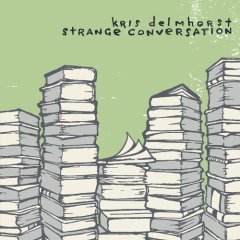
A departure from the norm for the Brooklyn born singer-songwriter, rather than her own material this sees her setting to music adaptations of poems by such names as Byron, Browning and e e cummings. Opening with Galuppi Baldassare, a goodtime Dixieland jazz spin on Browning's A Toccata of Galuppi's, the album's styles range across jazz, folk and blues, bringing a twilight country waltz to Byron's We'll Go No More A-Roving and a star-kissed evening whisper to Masefield's Sea Fever.
Only a few of the tracks are straight interpretations; the others being a quiet acoustic folk reading of 20s Harlem poet James Johnson's Since You Went Away, co penned with Mark Olson, and a bluesy roll through Edna St Vincent Millay's Tavern. The others offer inspired reworks that take a poem and weave a song a round it.
Fine examples include the New Orleans ragtime slouch Invisible Choir from George Eliot's O May I Join the Choir Invisible, a bluegrassy old tyme hoedown Pretty How Town that perfectly fits the playful cummings sensibility, the gentle roots rocking Light of the Light based on elements of Walt Whitman's Passage To India and a bass twanging, crunchy swamp blues Water Water that began life as Robert Herrick's The Scare Fire.
Perhaps the most ambitious here in terms of lyrical adaptation are Strange Conversation and The Drop & The Dream, two spare Southern country torches lit from Bruch's The Death of Virgil.
Never once sounding fusty or academic exercises, the words are given stirring blood and a sense of spontaneity by Delmhorst's warm voice and laid back arrangements, reinvigorating the muses and rhythms that first brought them to life, filling them with joy, yearning and sadness. A fine testament to the enduring quality and relevance of art and, as she notes in her closing New Orleans jazz adaptation of the 13th century work by Sufi mystic Jalaluddin Rumi, that Everything Is Music.
Mike Davies, July 2006
Kris Delmhorst - Songs For A Hurricane (Acoustic Routes)
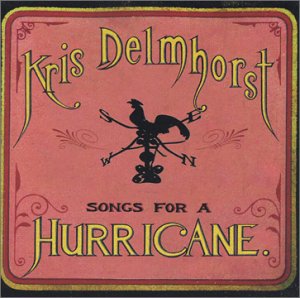
Thus there are songs of uncertainty (Waiting Under The Waves), the sadness of not being noticed by the object of affection (Hummingbird), the need to escape a suffocating relationship (Bobby Lee), resentment (Short Work), self-empowerment (Weathervane), the realisation of the need to call it a day (the slow swaying Wasted Word and the uptempo bluegrassed Short Work) and, course, the simple, disarming freefall into romance (Juice + June).
East of the Mountains urges along with a chugging express train rhythm while Hurricane builds to an appropriate guitar squall that calls to mind Neil Young's own meteorological epic, but it's the quieter, more introspective moments that really make this shine, the haunting resigned ache of You're No Train, the simple back porch with banjo bluesy folk and breathy vocal that is Come Home and the album's affecting play out sailor's song Mingalay as the ship of the heart , heads determinedly into the weather and sails homeward to its safe self harbour. She may not yet be an international name, but with this album the answer to that is clearly blowing in the wind.
Mike Davies
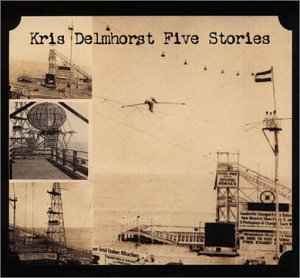
Here's another great little release that snuck out towards the end of last year unheralded. Brooklyn-born, Boston-based singer-songwriter Kris had one lone track on the marvellous Signature Sounds women songwriters' collection Respond, but I'd not encountered either of her two previous solo albums or EP and I'd not made the connection that she was the self-same cello player as Chris (sic) Delmhorst on Peter Mulvey's Deep Blue album or on Mary Gauthier's first (Dixie Kitchen). For she's an accomplished instrumentalist too, having picked up both fiddle and guitar since originally studying cello at high school. On Five Stories, her own playing is but one strand in the rich yet minimal and delicately-scored musical tapestry, which (though it includes contributions from instruments as diverse as accordion, mandolin, saxophone, organ and banjo, with guitars defiantly not in the forefront!) is so strikingly intimate and acutely managed that the listening focus remains on the quality of the songs and Kris's singing.
Lyrically, her songs pull an incisive punch through their economy of poetical expression, clearly filtered through her love of traditional song; they are, however, meditative and advisory, deeply personal statements rather than "stories", a fact which belies the album's title (which, I learn, refers to the location of the recording studio used, on the fifth storey of a building, and also the feeling of being "up in the air"). Kris's voice has a gorgeous, creamily compelling timbre that's a touch reminiscent of Lucy Kaplansky on cuts like the unbelievably haunting Damn Love Song and the searching Words Fail You, and with shades of latter-day Emmylou perhaps on the opener Cluck Old Hen, while she shows a mean old flair for the bluegrass idiom on Mean Old Wind and for biting yet almost casual sassiness on the uptempo rap Honeyed Out, with her heart-stoppingly beautiful vocal control on Lullaby 101 forming the perfect closer (unless you leave the disc playing, that is, in which case you'll fall victim to a thrashy mini-bonus track!). The close-miked and spare (yet tellingly full) production, masterminded by Kris herself with ex-Morphine drummer Billy Conway and engineer Steve Folsom, proves an exemplary setting for Kris's highly distinctive songs, which encompass a variety of styles. And this album has proved one of the year's real discoveries.
David Kidman
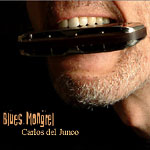
Harp player extraordinaire Del Junco is another Cuban taken under the wing of NorthernBlues. This is his sixth album but the first for the excellent Canadian label. He opens with Little Walter's Blues With A Feeling which has a fractured heavy blues start and has a contemporary feel as well as paying historical dues. Right from the beginning his harmonica playing is top class and it's not hard to see why he has won awards for his playing all over the globe. He has a novel way of playing – he plays chromatically by using an 'overblow' technique on a ten hole diatonic harmonica. He has a good voice too!
No Particular Place shows he has lungs of steel. Great interplay between the harp and Kevin Breit's guitar on this blues/jazz instrumental. Plain Old (Down Home) Blues has a little Tex-Mex influence and although his vocal is a little too pronounced there's no disputing his harp playing. Skatoon is a dual-layered instrumental with ska overtones and Don't Bring Me Down has Breit on slide guitar. This tends towards traditional country but just slightly on the alt. side. This is a favourite of mine.
The Jerry Goldsmith song Our Man Flint may seem like a strange choice but Carlos's ethereal beginning opens out into a swing beat and his harmonica breezes through the melody. The old favourite Run Me Down is jazzier than the The Notting Hillbillies version and the rockabilly guitar solo is excellent. Add to that another lung bursting harmonica solo and there you have it. Let's Mambo gives it all away in the title and there's a militaristic beginning to Long Highway. Carlos's laconic vocal adds to a mixture of styles.
The title track is another fractured blues but the now commonplace interplay between guitar and harp is still strong. This instrumental probably has the best harmonica playing on the album. Sonny Boy Williamson's Nine Below Zero is treated well as Carlos snorts his way through the track. He turns acoustic for the first time on the closing track Don't Worry Your Pretty Little Head. This has a cowboy feeling and is just another facet to Carlos Del Junco. Don't believe what it says on the cover, this boy is pedigree.
David Blue
Although one suspects that's not the name on the 25 year old Liverpudlian's birth certificate, her adopted musical bloodlines clearly flow through Memphis and the Mississippi. Reared on her parents collection of Bonie Raitt, Taj Mahal, Patsy Cline and Stevie Ray Vaughan records, the pivotal moment in deciding her direction came with a copy of Rory Block's Best Blues and Originals.
Teaching herself to play guitar (left-handed) from Son House and Leadbelly discs, she set about forging her own music. Her debut mini-album is an impressive opening statement of intent, even if the Dolly Parton twang to her voice isn't one you usually associate with devotees of the delta blues. However, as the two covers underline, she clearly knows her stuff.
Taken at a sleepy liquor soaked afternoon pace Slow Down is a rare number by Chicago guitarist J.B Lenoir while on Eric Bibb's jerky barroom swagger Don't Ever Let Nobody Drag Your Spirit Down she interlaces a handclap backed verse from Reverend Gary Davis' Gonna Sit Down On The Banks Of The River.
Of her own contributions, Broken Branches leans towards the countrier side of her musical raising with a Louisiana blues shuffle that conjures images of molasses jars and hillside stills while the finger-picked Stop Worrying shows more of a 50s pop influence and Any Way I Want To is a lazy swoon riposte to a domineering lover declaring she's gonna lay back and pour a few stiff ones to "feel bad anyway that I want to". You could almost hear Bessie Smith growling it out.
She needs to deepen her guitar technique and probably needs to down a few more quarts of bourbon before she sounds as stained and seasoned as Block, but, while she does look a little too wholesome for the genre, this is one Maid who won't be in waiting for long.
Mike Davies August 2010
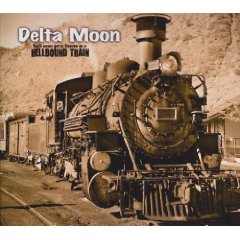
Released on the Belgian label Blues Boulevard, this is the second official European album release from this Atlanta, Georgia combo purveying straight-down-the-line contemporary Southern blues-rock that derives its lineage from Lynyrd Skynyrd, the Allman Brothers and Mick-Taylor-period Rolling Stones, with a soupcon of Z.Z. Top thrown in too perhaps. Suitably gritty-voiced and authentic, and with most of their material self-penned (albeit with a wry slant) by lead vocalist and lap steel guitarist Tom Gray (occasionally in tandem with fellow-band-members), Delta Moon give us a masterful set of tough (but not over-the-top) delta-blues-rock that audibly takes no prisoners, even if not exactly treading any new ground. The funky slide-and-keyboard strut of Stuck In Carolina (with what sounds like an uncredited sax player on the playout coda), two neat excursions into stripped-down acoustica (the plaintively nostalgic Plantation Song and an excellent cover of Mississippi Fred McDowell's You Got To Move) and the welcome appearance of a six-string banjo (on Get Gone), are all extra elements that add spice to the already laudably solid brew, and, notwithstanding a couple of unremarkable cuts later on in the sequence, this still turns out a pretty satisfying - and rather replayable - rootsy set that heralds Delta Moon (now boasting a different rhythm section from that on their Howling At The Southern Moon album, by the way) as a band to watch.
www.myspace.com/deltamoonrocks
David Kidman January 2010
Delta Moon - Goin' Down South (Delta Moon Records)
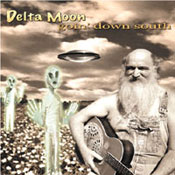
The album cover might not help you define Delta Moon's music: a spaceship hovers overhead while aliens and an old bearded man with a guitar stand in a cotton field. The aliens look surprised - maybe this is their first experience of Southern blues/rock. The old man looks happy - he gets to hold a wood-bodied dobro!
But there's nothing alien about the eleven songs on the album, seven of which were written or co-written by band leader Tom Gray. (Three more were written by J.B. Lenoir, R.L. Burnside and David Bowie/Iggy Pop.) It's an irresistible amalgam of hooky songs and wailing slide guitar, a feet-dancing beat and powerful white soul & gospel flavoured vocals. The dominant voice is Gina Leigh's and her bare-foot sass and strut are as high-octane is possible without actually exploding and burning the house down! The beat is laid down solid by rhythm section Scott Callison (drums) and Jon Schwenke (bass). Guitars from Tom Gray (vocals, bottleneck, piano, dulcimer) and Mark Johnson (electric slide, mando guitar) provide enough twang to power a V8 engine. There's added spice from album guests legendary fiddler Vassar Clements and dobro master Mike Audridge.
Get ready UK music lovers - Delta Moon are coming your way very soon and they are one of the best live shows around. I get the feeling that pretty soon you won't be able to get closer to them than a steel barrier in front of a 20,000 Music Festival crowd!
Sue Cavendish
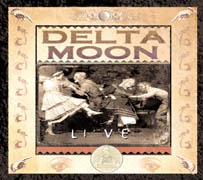
New country blues five-piece Delta Moon from Atlanta, Georgia, give classic blues favourites and original songs a sparkling fresh wash and brush up. Gina Leigh (vocals and percussion), Tom Gray (vocals, lap steel, keyboards), Mark Johnson (Bottleneck guitar), Johnny McNight (drums) and Jon Schwenke (bass) deliver plenty of swampy blues rock, gospel energy and great grooves.
Delta Moon 'Live' was recorded before a studio audience in Deluth, Georgia. 'Live' is how the blues should be heard - drawing it's energy from an audibly participating audience. Not here is the immediacy cooled by the studio situation. It's one of those albums where all the elements are a cut above the rest - from Gina and her powerful white gospel vocals and Tom Gray's gravel-toned leads and harmonies - a contemporary Delaney & Bonnie - to the twangy duals from the slide guys (think Allman Brothers!) and excellent production.
Well-known classics performed include Baby Please Don't Go, Do The Do and Look Way Down That Lonesome Road - on their previous album 'Delta Moon' Shake 'Em On Down, Preachin' The Blues, Wang Dang Doodle get the treatment - but there's fine original roots material from Tom Gray too. I've heard it reported that seeing them live is a must - they are absolutely sensational. Briefly here in the UK, you have an opportunity in November 2003. Go see - or let your mouse take you to Amazon.com
Sue Cavendish
For their sophomore album the San Diego clearly decided not to fix what wasn't broken. So here's another collection of love and protest songs streaked with themes of spirituality, delivered in Matt Vasquez's rasp, living musically close to the Texas border and again attracting those Creedence, Violent Femmes, Dylan, and Ochs references.
The opening track 911 throws in a touch of Doug Sahm too, a jangling cantina shuffle that addresses the workday slog ("Oh my lord, it's 6am The day ain't nothin' but a sentence paid You work so hard and nothin' changed") and the way business capitalises on war ("We'll turn the Marlboro Man into a marine. The brave youth will come from far & wide When 911 is the battle cry") for money, power and glory.
The eight minute closing number, Ballad Of Vitaly, also refers to specific events. The ghost of Phil Ochs hovers as, to accompaniment of acoustic guitar, Vasquez recounts the story of Vitaly Kaloyev, a Russian architect whose wife and two children were among the 71 (mostly Russian schoolkids) killed in a mid-air collision over Germany.
Getting no satisfaction from the air traffic control company which sought to shift the blame, Kaloyev went to the house of Peter Nielsen, the only one on duty at the time of the accident, seeking an apology. When the Dane brushed away the photos of the dead children, Kaloyev stabbed him to death. After serving four years, pressure from the Russian government secured his release and he returned home a hero. It's a tragic story, and the song does it full emotional justice.
There's heartache too on the hymnal slow country waltzing Vivian, another song of loss but with a more personal history; a waiting for you in heaven love song from his late grandfather to his dying wife. There's other personal notes here too; Bushwick Blues a driving rocker about how memories of an old flame always get in the way of forming new relationships, the rippling ballad Salt In The Wood vexed by religious doubt as he sings "if there's a god in my head Then there's a devil too. How can I tell the difference when they both claim to be true."
There's a couple of numbers that slightly let the side down, but with the trad-folk styled betrayed love of Scarecrow and the harvesting of several Irish blessings for the beautiful Devil Know's Your Dead, this is up there with the year's finest.
www.deltaspirit.net
www.myspace.com/deltaspirit
Mike Davies June 2010
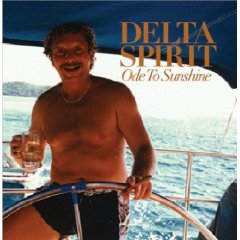
Their name derived from Delta Spirit Taxidermy Station of North Central Alabama, a company run by founder bassist Jon Jameson's great uncle, the San Diego quintet have been called a honky tonk Creedence Clearwater Revival, compared to the early Kinks, tagged with 60s protest folk, likened to the Violent Femmes and had Streetwalker called South of the Border Orbison twang. So, I may as well add my ingredients to the mix and suggest that, with the opening Tomorrow Goes Away, Ronnie Lane's Slim Chance and Paul McCartney could be in the equation too. People C'mon nods to Oasis and, if you dig deep, Trashcan could even be a close but less intense cousin to Cream's Badge.
You'll hear Phil Ochs and John Prine (rather than Dylan) blowing through the closing time swaying 60s anti-war folk protest People Turn Around, the period also informing Children which could easily have come from some rally with Barry McGuire carrying the flag upfront.
Put the reference points aside for a moment though and just listen to the music. Which, by and large, consists of singalong songs about living while you can played with a barroom shuffle of boogie woogie piano, waltzing acoustic guitars, loping drums and frontman Matthew Vasquez' dusty adenoidal twang.
There's an honesty and enthusiasm to the playing and the songs, the melodies instant and infectious whether they're riding the fuzzy waves of Strange Vine's surf pop or going for the reverb blues of Parade. Listen to Bleeding Bells, an album highlight that begins with just a strummed guitar and Vasquez again in his Greenwich Village persona and then introduces Texicali horns to add an extra air of desert melancholy. Or again to the simple honky tonk piano slow waltzing sadness of House Built for Two, a song on which you can almost see him drinking away the heartache as the melody lurches down the street to an empty bedroom. And, just for one final unlikely comparison, the album closes up with the horns belting, upbeat waltzing title track that sounds like the Denny Laine era Moody Blues partying at Big Pink.
Terrific stuff, the self-produced album originally came out two years ago on the band's own label and pretty much sank without trace before Rounder rescued it from oblivion and reissued it (with multi-instrumentalist Kelly Winrich's uncle on the cover), thereby instantly warranting a nomination for a services to music award.
Mike Davies March 2009
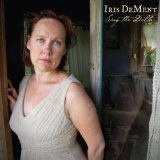
That high-pitched Arkansas trill, a mix of Harris, Parton and Jeannie C Riley, sounds a little wearier, a little more seasoned, but its purity is undiminished and the emotion and sincerity she invests in every line, reminds why we were captivated from the first moment we heard Our Town.
Raised in a Pentecostal household, gospel is a dominant influence in the music, the blood that flows through the album's folk and country veins, and, as you might expect, religion informs several songs. However, as those who have followed her since Infamous Angel will know, DeMent has always subjected her faith to hard questioning.
The Riley-like The Night I Learned How Not To Pray is a heartbreaking memory about when, as a four-year-old, she saw her baby brother tumble down the stairs and be taken to hospital. She prayed through the night, but the boy died, leaving her to conclude prayer's a waste of time 'because God does what he wants to anyway'.
Stopping in a church to pray, she sings "I don't even know if I believe in God" on the spiritual styled The Kingdom Has Already Come only to think that that, seeing joy around her - kids playing in a fire hydrant, the wind in the trees - perhaps heaven is already here. If there is a heaven, for DeMent it is to be found in the love people have for one another and in their struggle to wrench light out of the darkness, a theme that lies at the heart of the uptempo, organ-laced honky tonk gospel There's A Whole Lotta Heaven.
And, of course, family is pivotal, the anchor that holds us together and makes us who we are. Mama Was Always Tellin' Her Truth, she sings on the bouncy tune with its saloon piano backing, recalling the woman from whom she learned her values while the bluesy swayalong. That's also at the heart of the soulful, horns-coloured title track, a song written towards the end of her mother's life and marking DeMent's epiphany of just how much of her Delta culture she had passed on to her. Following directly on and using the same piano (and Al Perkins' weeping pedal steel), the waltzing If That Ain't Love paints a portrait of her hard-working father, remembering driving to the drug store with him listening to Aretha on the car radio.
Memories and a yearning to go back invest almost all of the songs; on Livin' On the Inside with its soulful horns she's reminiscing about the simpler pleasures of childhood, Go On Ahead And Go Home with its revival tent mood and walking rhythm talks of moving on from the material world and letting your mama again see you smile, while, conjuring the spirit of Patsy Cline, the lovely Making My Way Back Home addresses the same desire, but in more literal terms.
Bolstered by Before The Colors Fade and Morning Glory with their meditations on endings and beginnings, the album closes with Out Of The Fire, an eight minute, circling piano lullaby gathering together her themes of death and rebirth, of memory's balm and, as in embodied in the final words 'I'm headed back home', a healing return to the roots where we belong.
It's taken her 16 years to make the journey. Let's hope she doesn't go away again.
Mike Davies November 2012
Iris DeMent - Lifeline (Flariella)
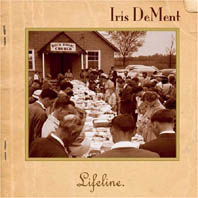
It's been an incredible eight years since DeMent released, The Way I Should, a stunning third politically charged, rock infused album from which the angry and emotionally devastating There's A Wall In Washington and Wasteland of the Free took their place alongside previous classics Sweet is The Melody, Our Town and Infamous Angel.
Since when though her profile has been low key to say the least. There was a low key acting debut in 2000's Sundance favourite Songcatcher while her recordings have been limited to occasional harmony appearances on albums by the likes of Emmylou, Tom Paxton, Tom Russell and Nanci Griffiths, Merle Haggard and Jimmie Rodgers tributes, a couple of Mountain Stage live albums, the Beautiful South's live version of Liar's Bar from Jools Holland's Later, and her recent duets with John Prine on his Grammy nominated In Spite Of Ourselves album. Devotees meanwhile waited with increasing frustration for a return to recording in her own right.
Given she reappears now on a small independent label rather than Warners, one wonders if perhaps legal wrangles played a part in the lengthy career sabbatical along, whether she just lost faith with the business or if maybe she hit some sort of writer's block. Certainly there's only one self-penned number here, He Reached Down, but then the whole project isn't exactly what admirers might have anticipated.
Raised among a devoutly religious family, the album takes her back to her roots for a collection of the sort of country-gospel she undoubtedly heard from the likes of the Louvins on the radio and sang alongside mom and dad growing up in the Missouri River delta town of Paragould, Arkansas. Laying down the agenda with the opening rouser I've Got That Old Time Religion In My Heart, it harks back to days when music was more concerned about reaching into people's souls rather than their wallets. A stripped down, acoustic collection (often just voice and piano) of public domain numbers dating mostly from the late 19th century, DeMent's warbling pure treble investing the songs with the uplifting spirituality, world weariness and honest passion from which they stemmed. Hymnbook archivists might be familiar with such songs as Fill My Way With Love, The Old Gospel Ship, Sweet Hour of Prayer, Near The Cross and I Don't Want To Get Adjusted (To This World), but you don't have to share the faith to be totally disarmed and beguiled by this wonderful album. Now, if only she could get round to writing and recording some new songs of her own too....
Mike Davies
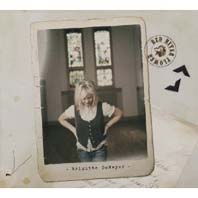
Not everybody wants to reinvent the wheel, some artists are happy to just release albums that slip down easy and satisfy their fan base. If they collect a few new ears along the way, all well and good. Not to say that the Bay Area singer-songwriter isn't ambitious - she's opened for Dylan and Marc Cohn - but more that she sounds quite comfortable doing what she does without trying to prove herself.
She has a strong voice, streaked with southern soul and country twang alike and her music flows fluidly between the gospel bluegrass of Shepherd, the jazzy blues of double bass, organ and finger-clicking groove Looking For Moses, a rockabilly Without You (one of two tracks with Buddy Miller sitting in on guitar) and the Loretta tear-stained country of Bird. On When I'm Gone she hits a blues stride and the closing An Old Song is pure 30s back porch croon with Al Perkins keening away on pedal steel. If none of the songs leap out and demand attention, neither do any of them lose it, making for an enjoyable if not necessarily enduring album.
www.brigittedemeyer.com
www.myspace.com/brigittedemeyer
Mike Davies September 2010

Writing together for eight years, Alistair Mackie and Mark Collyer finally get round to assembling a debut album, produced by acclaimed concert guitarist Richard Durrant (who adds double bass, keyboards and cello) with Marianne Hillier-Brooks on percussion. With songs that variously address hangovers (Where Do We Go?), romance born (Hooks) and lost (Savage Days), small town life (Demolition Sky), worn down dreams (Cowboy Song) and, on Far Away Tree, Shoot The Moon and 1202, those desires and goals that alwasy seem just out of reach.
Centred around their harmonies and acoustic guitars, the music's firmly of the contemporary folk persuasion, shaded with jazz, pop and hints of world and Latin. As such they remind me very much of Nizlopi (especially on Where Do We Go?) and Ezio while, here and there (as on Savage Days), the influence of Paul Simon can be heard. If you've warmed to them, then you'll probably find this worth the effort of tracking down.
Mike Davies January 2010
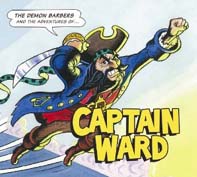
Since (most deservedly) winning the BBC Radio 2 Folk Award in 2009 for Best Live Act, the Demon Barbers have never stood still, continually refining and developing that act apace and taking their ultra-exciting mix of tradition and innovation around the circuit – and even to China! – blowing audiences away each time and receiving rave reviews wherever they go. It's an obvious given, then, that their original and imaginative, and overwhelmingly athletic, mobile presentation can never entirely translate to the medium of CD (or even DVD, come to that) – such is the nature of the beast (the outfit's live show being a true extravaganza that incorporates exhilarating dance, clog and rapper sequences and showstopping theatrical effects in addition to the storming musical elements).
So it goes without saying that any attempt to encapsulate the Demon Barbers on CD will only give us part of the experience, albeit a large and important part. Nevertheless, their latest CD, …Captain Ward, at least allows us to appreciate at close quarters the ensemble's high degree of genuine musicality while also giving us a darned close approximation of the blood-and-thunder and gutsy impact of the purely musical side of selected items taken from the live show's extensive programme.
Damo and his merry band of musician-iconoclasts are expert practitioners of the darker side of folk-rock: traditionalists will find their special, heady brew more akin to electric Goth-rock than folk, perhaps. Here the ultra-assured, heavily rockist backbone rhythm-section of Lee Sykes and Ben Griffith pounds away in a brilliantly controlled display, solidly yet creatively underpinning the rampaging melodeon stance of Will Hampson and the stirringly intense fiddling of Bryony Griffith that in turn together provide a tremendous foil for front-man Damien Barber's box, vocal and guitar.
Previous, limited-scope excursions into the recording studio have focused on the DBs' unique way of transforming primarily traditional sources, with only tentative dips into the murky waters of original songwriting on Damien's part, but the latter comes to the fore here on the rousing contemporary protest opus Rise Up, while there's also a fresh revisit of the Grateful Dead cover Friend Of The Devil (which first appeared on the DBs' +24db mini-album). But the biggest step forward on this latest set is the increasing prominence given to Bryony's strongly individual talents, notably her being given her head in the role of dominatrix - I mean lead vocalist (to complement her already formidably impressive fiddle playing) – on a number of songs (Bonny Boy, Soul Cake, Calling On Song, and a persuasive take on David Dodds' powerful The Magpie).
Not that Damien's own charismatic contributions are in any way under-par here; his stompingly defiant rendition of Ed Pickford's Pound A Week Rise may not eclipse Dick Gaughan's towering version, and ok, Damien can't altogether seem to avoid the occasional affectation in vocal delivery elsewhere, but by and large he convinces more than ever with his highly personal reinterpretations – and even manages to have loadsa fun in the process, as his decidedly punk-Rockney-music-hall take on Three Drunken Maid(en)s proves when it spills exuberantly out of the speakers. We're also treated to some audio-verité clogging from Roadshow members Tiny, Hannah and Laura on Harry's Hornpipe - tho' their terpsichorean dexterity still has to be seen in the flesh to be fully appreciated of course - and a few tracks (notably Calling On Song and Bonny Boy) prominently feature the beatbox of JB (John Stuckey) adding another innovative (and highly hypnotic) element to the already bold texture.
And a word of praise too for the glorious Tony Hall cartoons which adorn the digipack cover, for they're totally in keeping with the cheeky, healthy sense of fun and delight-mingled-with-excitement which permeates the musical extravaganza within.
www.thedemonbarbers.com
www.myspace.com/thedemonbarbers
David Kidman June 2010

Here at last is a CD début for the audible part of that ambitious multi-faceted roadshow masterminded by the irrepressible Damien Barber, one of the most charismatic young performers on today's scene and in direct line from the famed Norfolk singing tradition (Walter Pardon through Peter Bellamy). Uncut is a live recording made in Haworth earlier this year (though just to be awkward the insert photo was taken at Holmfirth Festival!), at once an appetiser for the roadshow's live act and a take-home reminder of the great music that provides a backdrop for the visual action, though it more than stands up in its own right as a continuously high-energy yet wholly listenable artefact - in fact, having the soundtrack in this form and giving it your undivided attention allows you to appreciate just how damned fine all five musicians are It's much more than just Damien with a backing band, although his voice, concertina and (increasingly) guitar are for much of the time the fulcrum. Credit must be given where it's due therefore, to the totally amazing fiddle playing and vocals of Bedlam's Bryony Griffith, the spirited melodeon playing of that ensemble's Will Hampson (and you can just tell he plays for a Morris side, in this case the Dogrose Cotswold team), and the tight and funky "non-folkie" rhythm section of Lee Sykes and Rich Ashby that responds so intuitively to the pulse of the music. Songs range from the opener, which boldly juxtaposes Willie Goggins' Hat (penned by the prolific yet startlingly unheard Jack Hardy) with Gareth Turner's Boeuf Français, to a typically forthright Pete Morton song, from Nic Jones' evocative Ruins By The Shore to the epic Companion Of A Mile, Chris Sugden's setting of Alfred Noyes's recounting of the morris-dancing journey of Will Kemp (a supremely fitting choice given the Roadshow's credo). Songs give way to tunes quite naturally and most credibly, and the whole set is pretty exciting stuff (absence of clogs notwithstanding!), a triumph of collaborative and responsive musicianship. Plodding folk-rock this ain't! David Kidman
David Kidman
After his debut, expectations were high around our house for 'Soul Parade', Jesse DeNatale's second album. First play gave me a bit of a sinking feeling as I wondered if he'd delivered all the good stuff on that debut. But, hey, don't all the good ones take a while to grow on you? The opening lyrics, 'cigarettes and candy and some tattoo art on a hot June night' capture in a moment his ability to paint pictures with words. Tinkling piano, gentle pedal steel guitar and a slovenly - in a nice way - beat. That's it. Uncork the bottle. Shame that at this time of year I can't feel the heat but I certainly get the mood of 'Children Of The Sun'. And that's another trick up his sleeve. Boy, he can create a mood. Oh yes, here's the head around the door asking me who this is.
Strings and backing choirs slip in all over the place on 'Shine Your Light'. That piano is there again with a starkness that reminds me of Springsteen's use of piano on his early records. In fact, after all the comparisons with Van Morrison, I'm beginning to wonder if it's more Bruce than Van. And I'm sorry to fall back on comparisons but you get the idea that this music creates images in cinemascope. This isn't a doodle, it's a big picture.
This time around, the styles expand with a jaunty 'Nightingale', slinky 'Keep on Walkin', folksy 'The Bell' and just downright delightful title track. 'Shake my hand, tip my hat' he sings. Jesse, any time, any time at all. Keep knocking these wonderful records out. So, are you guys and gals out there gonna wake up or is it just me, Tom Waits and Nick Hornby who'll sing his praises? I guess I'm in good company. Come and join us you'll love it.
Steve Henderson February 2007
It's taken me a few months to get to grips with this LA-based six-piece who've been turning heads for the past year or so, most especially at their UK festival appearances last summer. Their sound is a distinctive one: initially held to be a reinvention of Khmer rock and pop of the early 1970s, the band's style has evolved over three albums from playing exclusively covers of Cambodian 60s pop tunes to writing and performing all-original material which stylistically mixes key inspiration sources like Sinn Sisamouth (whom they treat with absolute respect) with elements of American garage rock and surf psychedelia. Dick Dale meets The Doors meets Joe Meek meets B52s meets Blondie? Well, Dengue Fever certainly have a hell of an ace to play in the shape of their Cambodian vocalist Chhom Nimol, a former pop singing sensation in her native country, who had left there at the start of the present decade. While living in Long Beach's Khmer community, she was discovered by brothers Ethan and Zac Holtzman, who on an earlier visit to Cambodia had become totally enamoured of that country's pop music, and so they teamed up to form Dengue Fever... Chhom's sensational vocal presence, exotic and boldly sensuous, is a true icon in sound, defining and determining the landscape of the band's music much in the way that a Bollywood singer does: mildly overpowering and plaintively impassioned in its expression of emotions. Some songs are sung in Khmer, others in English, but all embody the spirit of the "golden age" of Cambodian pop, the singing of Ros Sereysothea especially. Behind Chhom's swooning, soaring voice, there's a Farfisa organ, sax, guitar, bass and drums, grinding out an atmospheric, alternately heady, aromatic and ferocious garage-beat setting. Sleazy-mutant twang has never sounded more persuasive, even if one or two of the riffs sound more than a little familiar (is that opening figure of Sober Driver a dead ringer for Ghost Town or what?). Echo Beach was always part of some obscure 50s sci-fi B-movie, after all, and the instrumental Oceans Of Venus just has to be that movie's theme. The album's bonus track, added for this UK release, is a radio session take of One Thousand Tears Of A Tarantula. The intense vibe Of Dengue Fever is very contagious, so much so that I don't actually want to be cured!
David Kidman February 2009
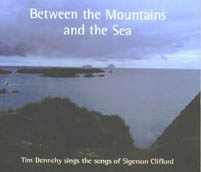
www.sceilig.com
www.copperplatedistribution.com
David Kidman
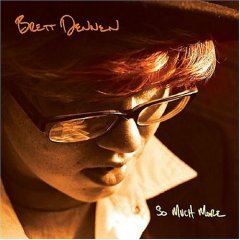
Hailing from the small California town of Oakdale, California, Dennen made an impressive splash with his eponymous self-released debut album of a couple of years back, garnering a contract with Dualtone along the way. Now comes the first release for his new label and, it's fair to say, he can look forward to another hefty sheaf of glowing reviews.
Looking not unlike a red-haired young Steve Forbert, Dennen has an equally distinctive, almost feminine, warbling voice although it's not too hard to discern some obvious influences behind it.
The opening Ain't No Reason, featuring just voice and guitar and veined with socio-political lyrics (themes to which he returns on I Asked When), conjures thought of Tracy Chapman while elsewhere the spirit of Bob Marley hovers over Someday and The One Who Loves You The Most evokes early Dylan while She's Mine could well be the bridge between Billie Holiday and Van Morrison.
The most readily apparent inspiration though is Paul Simon, whose spirit is there in the musical arrangements and phrasings, most notably so on There Is So Much More and, the African flavoured Darlin' Do Not Fear.
However, Dennen is clearly working towards a style and sound of his own, and these easy going, gently melancholic and often disarmingly romantic songs should go a long way to establishing him as a name with a bright future ahead.
www.brettdennen.com
www.myspace.com/brettdennen
Mike Davies January 2007
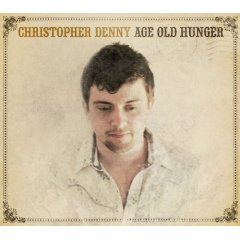
Here's another extraordinary new singer/songwriter with a very distinctive voice. What first almost beggars belief is that the guy's only 23 - yet his sounds like an old-time voice from another era almost: a sanctified, high-country-gospel voice laden with drama and with a pronounced tremolo that's just gotta be an acquired taste. Having duly settled into that sound and acquired said taste, you can then settle in and appreciate Chris's songwriting craft. Chris hails from Little Rock, Arkansas, and his life thus far has embraced plenty of sorrow, confusion and heartbreak - all of which you can tell is the strong first-hand experience that suffuses his songs through and through.
Age Old Hunger, Chris's debut recording, presents nine of his compositions. Most influenced by encountering the music of Lefty Frizzell and Hank Thompson at age 17 through his great-uncle's vinyl collection, Chris's own writing contains a similar mix of world-weary emotions, those that reside in the heartland where melancholy meets danger. The best and more reflective of his songs, like the regretful Time, encompass a wealth of experience that fair make you believe Chris has lived multiple past lives. Around half of the songs are rowdier and rockier, several set off with rather Dylanesque harmonica breaks and riffs, but there's no shortchanging of emotional impact or insight. The woeful title track provides a powerful album closer; it's a shame that it follows the disc's two comparatively orthodox covers (of songs by Kristofferson and Cash respectively - clearly respectful, but equally clearly not Chris's own experiences). Chris's band The Old Soles (Chris Atwood and Marcus Lowe) and extra guest musicians Robbie Crowell and Steve Bates are together given just the right kind of rough-house ensemble sound (courtesy of engineer Jason Weinheimer) to complement Chris's knowingly defined musical vision. But hey, I just realised whose voice Chris's most reminds me of - good ol' Jerry Lee!...
www.christopherdenny.com
www.myspace.com/christopherdenny
David Kidman March 2008
Sandy Denny - The Notes And The Words (Island/Universal)Almost exactly two years ago, in November 2010, Universal brought out what might be regarded as the ultimate in box-sets: a massive, and glorious, 19-disc retrospective celebrating the music of Sandy Denny, which contained, in addition to all her studio recordings, an exhaustive collection of live tracks and radio sessions, rarities and demos and – most crucially – a host of previously unreleased material from within those categories, much of it well remastered. The exceedingly lavish presentation involved the provision within the large box itself of a number of items of memorabilia in addition to (most significantly) a really handsome LP-size booklet, and the whole artefact, being a limited-edition item, quickly became a highly-prized collectible that is currently fetching obscene prices on the Internet.
However, many true Denny enthusiasts felt (quite legitimately) distinctly deprived, being genuinely unable to afford to fork out around £150 for the box in order to gain access to what amounted to probably eight or nine discs' worth of hitherto unavailable or ultra-rare material; and so this new limited-edition four-disc box should be at least partly the answer to their prayers, for it gathers together a major selection (in total a generous 75) of arguably the most significant of the demos, outtakes and rarities from the big box-set and, importantly, sequences them (more or less) chronologically. The discs are housed in a high-quality, sturdy near-DVD-sized case approximating previous similarly-scoped compilations, and within the enclosed 42-page booklet each disc sports (along with a good quotient of well-reproduced photos etc) a comprehensive sleeve-note that provides as much relevant detail as possible (not exactly track-by-track but the next best thing, and in several cases illuminating or elaborating on the comparable information provided with the original big-box, which was often either frustratingly imprecise or else difficult to extract from the main text), together with a decent appraisal of the necessary contextual perspective for the recordings on that disc, incidentally furnishing further fascinating nuggets of insight and back-story.
Thus, the first disc takes us through the early home demos, culminating in the very first (and revelatory), 1967 recording of Who Knows Where The Time Goes?, before presenting the acoustic demos Sandy recorded between Fairport albums What We Did On Our Holidays and Unhalfbricking. Disc 2 samples an obscure 1969 film soundtrack before straddling the Liege And Lief sessions, the years with Fotheringay and moving on into Sandy's first solo record (North Star Grassman), ending with the most-recently-discovered item from the box, her quite stunning a cappella take of the Lord Bateman ballad.
Disc 3, which covers the years of Sandy's burgeoning songwriting and the solo albums from North Star Grassman through to Like An Old Fashioned Waltz, presents either solo acoustic demos or (in the case of the latter album sessions) alternate takes without overdubs or in different arrangements. Pride of place inevitably goes to the solo rendition of No End, where we gain considerable insight into Sandy's creative processes and can virtually hear the song evolving before our ears through this intense yet relaxed performance.
Disc 4 gives us the non-album-track home demos recorded just as Sandy was rejoining Fairport in early 1974, followed by some Troubadour live cuts and Rising For The Moon alternate takes, then presents the Rendezvous-period acoustic takes and ends with Sandy's very last studio recording (Moments) and the 1977 home demo of her very last original composition, Makes Me Think Of You.
So, as I've already hinted, the release of this well-presented four-disc set provides, rather than a mere cynical "further repackaging exercise", a genuinely useful service for the serious Sandy Denny collector who for whatever reason was forced to miss out on the not inconsiderable number of treasures that were liberally (and not always entirely logically) scattered amongst the 19 discs of the 2010 big-box; while, although still somewhat of a "tip of the iceberg" in nature, it also constitutes a useful supplementary (and complementary) stand-alone set to be taken and shelved alongside, and within the context of, this year's "enhanced edition" reissues of the four Sandy Denny solo albums.
David Kidman November 2012
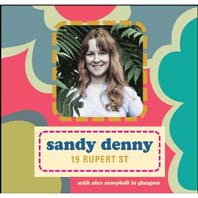
Just when you thought there couldn't possibly be any more previously unheard/unreleased Sandy Denny recordings, along comes another fresh surprise. Sandy had already made her recording debut in March 1967, singing on three numbers on the Alex Campbell And His Friends, the tracks - The False Bride, This Train and You Never Wanted Me - resurfacing on The Original Sandy Denny in 1978. She and Campbell had clearly become good friends, and so it was that on August 5 of 1967, she was staying with him and wife Patsy at his Glasgow home. Also there that week were Alex's Danish friend Carsten Linde and his girlfriend. Linde had just bought a new tape recorder and a reel of tape and, on the third day of their visit, he set it rolling to record an impromptu evening of singing.
It is, inevitably, a fairly rough affair in terms of sound quality, but not so rough as to disguise the magic of Denny's voice or, lubricated by a bottle of whisky, the enjoyment clearly being had. Most of the songs are Denny's arrangement of traditional tunes, kicking off with The Leaves of Life with Campbell providing a medieval troubadour style guitar accompaniment.
Sandy and Patsy duet on Willie Moore (Alex having to pick up the lines when they forget the lyrics) and, after much laughter, The Sans Day Carol, Campbell's rich tones joining in on the chorus.
The spontaneous nature of the evening can be heard as Sandy asks 'what do you want me to do then?', before launching into Balulalow, a translation of a Martin Luther hymn for children, while other trad numbers feature her distinctive delivery in thrilling form for She Moves Through The Fair and Alex taking lead on skiffle hit The Midnight Special, Denny delivering exuberant backing on the chorus, and the blues standard Trouble In Mind, which breaks down during the intro as they collapse into giggles and Campbell erupts into laughter as he seemingly tries to throw her by changing the guitar rhythm as she wails away like Bessie Smith.
Good spirits are flowing liberally by the time they get to a leg slapping version of the Carter Family's old country classic Jimmie Brown The Newsboy as, midway in, Campbell stops playing and tells Sandy to pick it up, she protesting 'I don't know how to do it' before delivering a nifty fingerpicking guitar solo. Disappointingly, the recording fades out just as Campbell demonstrates the flatpicking alternative.
There's just two contemporary tunes, the first a deeply felt cover of Milk And Honey, a song likely written about her by Jackson C Frank on whose Blues Run The Game she'd played tambourine and with whom she was then in a relationship. The other is her own seminal and then freshly minted Who Knows Where The Time Goes, first recorded just two months earlier with The Strawbs. Vocally it's a splendid reading, but unfortunately, despite her efforts at the start, the guitar's out of tune all the way through. But then, that's part of the album's charm.
As, indeed, is the final track as, the evening slips into Sunday, Campbell's two young sons, woken by the singing, take their turn in the musical gathering for Chuffa Chuffa Chuff, My Darling Clementine and Jesus Loves Me. One for Denny completists only to be sure, but a lovely memento of an artist fully enjoying life and just beginning to discover how talented she truly was.
Mike Davies October 2011
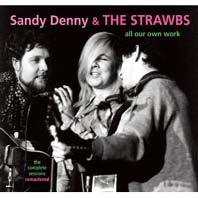
Invited to join The Strawbs in 1967, Denny had a brief tenure with the band before leaving to become part of Fairport Convention, persuaded that singing with then could do more for her career. In July of that year, she did, however, record several tracks in Denmark with the early Strawbs line-up of Dave Cousins, Tony Hooper and Ron Chesterman. These didn't surface until 1973, after she'd already left Fairport, formed and quit Fotheringay and released three solo albums, and even then only on the budget Pickwick label. An immediate collector's item for her following, it became even more so on its 1991 reissue via Hannibal which had a different track listings and string arrangements. To the best of my knowledge, only one track, Sail Away to the Sea, has ever figured on any of the anthologies and box sets.
Compiled by Cousins and remastered from the original tapes by Chris Tsangarides, this is the definitive assemblage of those 1967 recordings. The first dozen cuts comprise the original version of the album, of which Denny takes lead vocal on seven, among them On My Way, Tell Me What You See In Me, Stay Awhile With Me (which sounds more like a Springfields number), the Greenwich Village folk-rock style All I Need Is you and, of course, given the solo spotlight, her first recording of self-penned signature tune Who Knows Where The Time Goes, a tape of which would, eventually, make its way to Judy Collins and make Denny an international name.
Tracks 13-21 comprise 'Out-Takes and Demos'. Three of these - Poor Jimmy Wilson, I've Been My Own Worst Friend and (the only one on which Denny's featured) Two Weeks Last Summer (subsequently the title track of Cousins' 1972 solo album and recorded for the aborted second Fotheringay album) - appeared on the reissue, replacing Wild Strawberries and Sweetling, while that album's version of Tell Me What You See In Me features Cy Nicklin on sitar and Ken Gudman on gong.
There's also Denny's more bouncy, Dylanesque take on Nothing Else Will Do, far superior to the Cousins recording on the official album as well as the alternate string section arrangement versions of All You Need Me, Stay Awhile With Me and, diluting its emotional potency, Who Knows....
The remaining tracks are all Cousins numbers; Strawberry Picking an alternate version of banjo breakdown Wild Strawberries, the other three previously unreleased demos of Pieces of 79 and 15 (from the Strawbs' eponymous debut) and the hitherto unheard (though neither are a great loss to the Cousins canon) The Falling Leaves and Indian Summer.
Once listed among a poll of Great Lost Albums, whether you're a Cousins or a Denny devotee, it's good to finally have it out there.
www.sandydenny.co.uk
www.strawbsweb.co.uk
Mike Davies July 2010
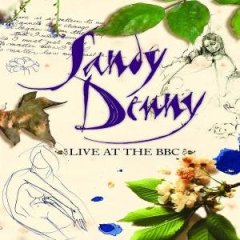
This wonderful new set is intended as a companion to the recent Fairport At The BBC set. Comprising three CDs and a DVD, it is claimed to contain "99% of Sandy's BBC recordings", including some rare and off-air recordings of sessions long thought "lost" by the BBC. This, of course, necessarily restricts the scope to Sandy's true solo work, so there's nothing from her recordings with Fairport, Fotheringay or the Strawbs.
Disc 1 brings Sandy's 1966 debut at the age of 19, at the BBC's Folk Song Cellar, with amazing renditions of two traditional songs (Fhir A Bhata and Green Grow The Laurels), also the subsequent Cellarful Of Folk session tracks which included her version of then-boyfriend Jackson C. Frank's Blues Run The Game. These are at times quite crumbly, but they're all serviceable enough. Much better in quality are the 15 recordings comprising the remainder of Disc 1, which represent Sandy's sessions for the Bob Harris and John Peel programmes, all but one track of which (Solo, from the September 1973 Peel session) had already appeared on the limited-edition 1997 Strange Fruit CD Sandy Denny - The BBC Sessions 1971-73. Now at the time of that SF disc's compilation, the BBC's archivist had only managed to locate 20 of Sandy's BBC recordings, the rest having been wiped over (standard BBC practice). Interestingly, it was only last year that tapes of virtually all of the remaining BBC recordings came to light in the collection of a Sandy Denny fan (only two items are missing, hence the above "99%" claim), so these are receiving their première outing on disc (having not even appeared on bootlegs thus far, to my knowledge). The Harris and Peel tracks contain some peerlessly assured performances, including a superlative Who Knows Where The Time Goes, and the mid-'71 Harris session is particularly fine.
Disc 2 starts exactly as the SF disc had done, with the celebrated Paris Theatre concert from March 1972. This now gives us all seven songs (Bruton Town having been omitted from the SF release), but, somewhat inexplicably, comes minus Sandy's wonderful introduction where (among other things) she apologises for "not knowing very much boogie-woogie"! This is followed by the November 1973 Sounds On Sunday concert (rather fluttery, but still acceptable in the circumstances), which is interspersed with extracts from an interview with Johnny Moran), then finally a brief BBC World Services interview from 1972.
Disc 3 is the DVD, and this kicks off with ten glorious minutes comprising Sandy's (presumably only?) surviving TV performances: three songs on the BBC TV programme One In Ten (North Star Grassman, Crazy Lady Blues and Late November). The DVD also presents a 38-page slide show of handwritten extracts from Sandy's personal notebooks, which incorporates pages of song lyrics - some, intriguingly, unrecorded - and rare family photos, sketches and recollections, followed by a photo gallery and printed discography. The DVD is a worthwhile, if maddeningly brief, adjunct to the aural material, but the notebook slide-show in particular is intensely fascinating, and I made extensive use of the pause button during its course (all it needed was a zoom-in facility!).
Disc 4, which clocks in at a mere 33 minutes, contains some true rarities in the shape of songs Sandy never recorded anywhere else (like The Quiet Land Of Erin). This disc gathers together the remaining BBC performances in distinctly off-air (home-taped) recordings: these vary considerably in quality, from acceptable (the Spinners TV show tracks, which include a remarkable version of Blackwaterside) to flaky and crumbly (a 1971 North Star Grassman recorded for the Bob Harris show).
I can't comment on the packaging, as review copies didn't include it, but I'd assume it to be complementary to the Fairport BBC box-set release that Island brought out earlier this year. But I'd take it as given that any fans of Sandy will want this new set, containing as it does some recordings that many will have but dim and distant memories of hearing at the time; indeed, I've discovered several which I'd not heard before.
David Kidman October 2007
Sandy Denny - Where The Time Goes (Castle)
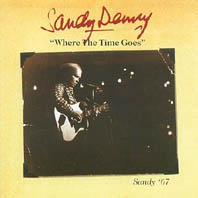
This ostensibly unoriginally-titled new CD is in all but name a complete replacement for, and a sizeable expansion of, the 1978 Mooncrest-label disc The Original Sandy Denny, a somewhat confusing (but for a long time the only readily available) collection of Sandy's 1967 folk-circuit recordings which itself was a botched attempt at compiling which I seem to recall underwent several vinyl and at least two CD incarnations with no attempt at correcting the misconceptions or altering its contents.
That "compilation of sorts" was cobbled together from the relevant parts of two Saga-label various-artist LPs (Alex Campbell & Friends and Sandy & Johnny), although with use of incorrect master tapes and other inconsistencies ... So even if you have the 90s CD version of The Original Sandy Denny, this new Castle issue is the one to have, no mistake, not least because the accompanying documentation is superb as befits its subject: a new booklet essay by Sandy's biographer Clinton Heylin which, in pronouncing this Castle disc the final word on Sandy's pre-Fairport recordings (which I'd split hairs and say it ain't quite!), at long last properly clears the fog away from around the details of the many and various LP issues of those recordings, whilst presenting a short and readable general appraisal of Sandy's early performing years. And the beautifully reproduced photographs are almost worth the price alone.
As far as the musical content of this new disc is concerned, it still wins hands down over all previous repackages of the same material. It contains the entire contents of The Original Sandy Denny, plus five alternate takes of tracks from that issue which had appeared on another Saga LP (It's Sandy Denny) in 1970 but which are in most cases markedly superior to the others. These tracks are supplemented by two from the 1969 sessions which produced the Sandy & The Strawbs: All Their Own Work album - Two Weeks Last Summer (which only came to light when the album was being prepared for CD release in 1991) and a landmark early version of the song that was to become her signature tune, Who Knows Where The Time Goes. I did wonder whether it would have been possible - indeed, preferable - to have expanded the anthology to two discs and incorporate the entire contents of the All Our Own Work sessions (since LP and CD versions of that album were at variance). Anyway, what we have here is still an object lesson in how to repackage sensibly.
One other notable feature of this latest issue is the superior sound quality compared with the previous CD transfers which had stupidly retained all the clicks and pops of the original vinyl sources! (the only exception here being the Alex Campbell rendition of Been On The Road So Long, which still sounds very "clicky"). Musically - and not just with the benefit of hindsight - these early recordings are important, and Sandy's voice sounds anything but nascent or primitive. So even if you're already a Sandy Denny fan and/or already have several of these tracks in your collection, this new CD is worth your investment.
David Kidman
[Ed - The history bit: Sandy Denny's final studio recording was Bryn Haworth's 'Moments'. The story goes that Bryn was in Olympic Studios remixing his A&M album 'Grand Arrival' and in another studio at Olympic were Sandy Denny and Trevor Lucas. Sandy heard 'Moments' - a track from 'Grand Arrival' - and wanted to record it. She cut a version of the track in May 1977. Tragically, in less that a year she had died from a brain haemorrhage. 'Moments' was finally released in 1995 on her album 'Attic Tracks 1972-1984'. Bryn's albums are archived under 'H'.)
Sandy Denny - A Boxful of Treasures (Fledgling)
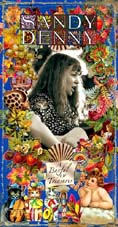
Headline news this – one box-set that should be in every home that has any pretension to housing genuine music lovers. It celebrates, intensely lovingly, the enormous and still illogically underappreciated talent of Sandy Denny – fine singer, fine songwriter, ex-Fairporter, who so tragically died in April 1978. But there's already a Sandy Denny box-set, I hear you cry – well, OK, sort of, but notwithstanding the fact that Hannibal's Who Knows Where The Time Goes? box-set is currently unavailable, for whatever reason, you have to take into consideration also the important fact that the whole standard to which box-sets aspire has moved on apace since then, and this new one, stretching to five extremely well-filled discs, is absolutely exemplary by today's high standards. For a start, it is genuinely representative and takes in all phases of Sandy's criminally short career – from extremely promising solo singer who was at times strangely uncertain of her own talent, to her work with the Strawbs, through her turbulent days with the early Fairport, her breakaway with Fotheringay and subsequent rejoining of Fairport, to her fully-fledged solo work. Here on these five discs we get Sandy's almost-first (well, very early) and (very) last recordings, between which there's a sensible and thorough large helping of the acknowledged Sandy classics, some highly significant alternate takes and radio session tracks, and some illuminating demos of both early and late vintage. A third of the tracks (29 out of 88) are previously unreleased too (at any rate officially!) – notably on Disc 5, subtitled "a collection of rarities and demos", which includes a generous selection of stark home-demos for the album that was to become Rendezvous. At the outset, I'll get the inevitable out of the way – we all have our favourite Sandy recordings, so there will be substitutions for any one person's ideal compilation (I know folks who'd want her appearance on Led Zepp's Battle Of Evermore included here!), but let's not make too much of that. Instead let's embark on this epic six-hour journey through Sandy's recorded legacy:
Disc 1 presents Sandy feeling her way (pretty confidently, it must be said) through traditional song (early home demos of Geordie and She Moved Through The Fair), typical staple folk repertoire of the time (3.10 To Yuma, This Train – tracks taken from albums Sandy made with friends like Johnny Silvo and Alex Campbell) and some early examples of her own songwriting. A fascinating example of the latter is the brief Boxful Of Treasure, which uses an early version of the basic melody that was later to achieve fame in the guise of Fotheringay. Of the dozen or so cuts Sandy recorded with the Strawbs, here we get three of the most captivating – Sail Away To The Sea, Tell Me What You See In Me and an impressive early version of the celebrated Who Knows Where The Time Goes?. Disc 1's zenith is then reached with an amazing solo demo of Autopsy, the strange shifting tempos of the final, and very different, version of which were to disturb Fairport's Unhalfbricking so memorably less than a year later. The other contemporaneous demo Now And Then is almost as interesting; it's followed by a couple of choice radio session tracks (though I'd probably have put Suzanne in there instead of Bird On A Wire), and Disc 1 then closes with three representative tracks from the What We Did On Our Holidays LP (I don't suppose anyone could forgive the compilers if they'd missed out Meet On The Ledge now?!).
Disc 2 is the one with the lowest proportion of previously unreleased material, but it still provides an unrivalled listening sequence – that is, once you're over the first two tracks (Si Tu Dois Partir and Cajun Woman) that make for a bit of a throwaway start. No decent Sandy Denny collection would be complete without the landmark, epic Unhalfbricking version of A Sailor's Life – many fans would say that if ever just one track summed up her years with Fairport then it has to be that one; so here it is in all its ultra-hypnotic 11-minute glory. Three tracks from Liege And Lief (sensibly including Tam Lin rather than Matty Groves, but curiously omitting Crazy Man Michael), then a radio session version of Sir Patrick Spens featuring Sandy doing a sterling job of telling the tale (a task which fell to Swarb when the song finally got recorded for Full House, of course). Three tracks from Fotheringay's album follow, with a generous addendum in the form of a really lovely, luxuriously-paced rendition of the country classic Silver Threads And Golden Needles (another previously unreleased gem), a live Nothing More and the two extra tracks from the Fotheringay album sessions (Gypsy Davey and Late November), whilst sandwiched in amongst these there's a fine acapella Lowlands Of Holland, taken from a 1971 radio session, proving that Sandy still possessed a breathtaking command of traditional song.
Disc 3 charts the first segment of Sandy's solo years, starting with three tracks from the muddled, haphazard North Star Grassman And The Ravens LP (including the enigmatic title track, not an obvious choice perhaps, and I think the solo BBC session version would have sat better here). Sandy's contribution to Ian Matthews' Thro' My Eyes is an imaginative interpolation in the running order, while the fun side-project The Bunch – Rock On is represented by Learning The Game and the decidedly strange Pass Of Iron soundtrack by the comparatively straightforward Here In Silence. A clutch of fine pre-Sandy demos precede the mandolin-sodden French-language Écoute, Écoute, then the selection of album tracks brings forth the excellent Quiet Joys Of Brotherhood and The Music Weaver, and Disc 3's pièce-de-resistance, a glorious solo take of No End (the song that was to so memorably close Sandy's supremely beautiful Like An Old-Fashioned Waltz album the following year). A radio session track and an brassily-augmented Fotheringay-backed cover of Walking The Floor Over You close this disc.Disc 4 then takes us through the final four years of Sandy's life, which produced her mature final two solo albums and in between which she rejoined Fairport for the classic Rising For The Moon album. Disc 4 includes radio versions of two tracks from Old-Fashioned Waltz, along with a juicy alternate (string-less) take of At The End Of The Day, then two previously unreleased tracks recorded with Fairport in February 1974 at the LA Troubadour. Rising is represented by two solo demos and two album tracks, then the admittedly patchy Rendezvous by two album tracks and two further cuts (By The Time It Gets Dark and No More Sad Refrains) recorded at the album sessions. Disc 4 concludes with Sandy's final three studio recordings, which show Sandy branching out into hitherto unvisited areas with covers of Lowell George's funky Easy To Slip and Bryn Haworth's chillingly reflective Moments.
Disc 5, the bonus disc slipped into the package, contains in addition to the aforementioned Rendezvous home-demos, a further two different versions of By The Time It Gets Dark and some more unreleased nuggets ranging from 1972 through to 1976 (only one, All Our Days, has no date listed, which may be just a simple oversight). If by the end of Disc 4 you're still not convinced that Sandy was simply one of the greatest female performers of the decade spanning mid-60s to mid-70s, then shame on you – and Disc 5 (rough though some of the demos are) should sway you into capitulation. Then, as if all that gorgeous music weren't enough, there's the accompanying booklet to contend with – a glorious 56 pages, full colour, loads of super photos, suitably informative general biographical essay by Jim Irvin, properly informative track-notes interwoven with tributes and memories from fellow-performers who knew Sandy, excellent standard of design and layout (and registration and printing) with some really attractive artwork. All of which adds up to an honest and utterly sincere celebration of Sandy's talent, orchestrated and compiled with love by folks who really do understand and appreciate – and importantly, deeply love – her music-making. Here am I gettin' all emotional again! I can't praise it highly enough.
David Kidman
Joe Derrane, Séamus Connolly & John McGann - The Boston Edge (Mapleshade Records)
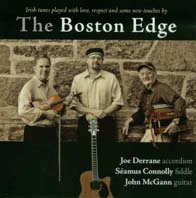
The press handout describes this release thus: "a 'dream team' Irish trio plays traditional jigs, reels and airs with passion and originality", so what gives it the "edge" of the title over other instrumental albums which might be similarly depicted? Well, the Boston edge refers to the distinct advantage of the superlative virtuosity of the three musicians who come from the Boston (Mass.) area. Button accordionist Joe, fiddler Séamus and guitarist/mandolinist John first played as a trio onstage at a New York club in 1999, an occasion noted by all who attended as bringing to the scene something worth pursuing further, an outstanding tightness of ensemble allied to brilliant solo work. Cementing the musicians' approach was their mutual deep respect and enjoyment of each other's music, and once they'd worked together it then seemed the most natural thing to continue the working relationship. After five years of memorable concert performances, at last we have a recording to treasure. It highlights their seamless togetherness, boosted by arrangements that are carefully prepared and yet remain flexible enough to allow inspired touches of improvisation or ornamentation or else felicitous swopping-round of the carrying of the melodic line from, say, accordion or fiddle onto guitar, giving surprising and delightful twists to one's expectations. The skill of these musicians in creatively rethinking well-trodden session staples is stunning, whether they're tackling sets compiled entirely from Irish sources or mixing in Scottish or Cape Breton tunes to demonstrate the cross-fertilisation and enriching of the different tune traditions. Highlights of this album for me are the sparkling opening set, the fiery lead work throughout but especially on the amazingly together fiddle/accordion duet that comprises two-thirds of the set of reels on track 9, also on the Humours Of Lisheen/McMahon's Jig/The Merry Old Woman set (track 7), the joyous sense of rhythm on the hornpipes (track 10), and, on a smaller canvas track 6, an entire set played solo by John on mandolin, a benchmark of agility and imaginative interpretation the like of which you don't often encounter on albums of Irish traditional music. But on every single track the playing exhibits a rich but vigorous energy that's absolutely captivating, with a healthily varied interplay between parts that's born of true understanding between the players. Each set is played at a sensible speed (not rushed through as if to fit onto one side of a 78!), allowing the felicities of melody to emerge through the spring in the step that the players' keen rhythmic sense deploys. And what's also important, listening to the music on this album rather often brings a smile to the face - a nice touch that (just lend an ear to the delicious swing of track 8 for instance!). It starts off really good, but then just goes on getting better, and you really don't want it to end! The only drawback as far as I can hear, albeit a minor one, is with the recorded sound, which isn't ideally clear, the guitar sound in particular being somewhat boomy or boxy in the ensemble context - or maybe I've heard too many state-of-the-engineer's-art recordings lately? But the 64 minutes of this seriously enjoyable album just fly by – take it from me!
www.mapleshaderecords.com
www.copperplatedistribution.com
David Kidman
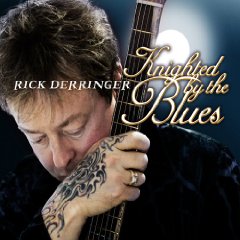
Knighted By The Blues opens with The Mess Around, a famous song (written by Ahmet Ertegun) and Derringer is a famous artist, having played with the McCoys as far back as 1965 on Hang On Sloopy. He went on to be an able sideman for Johnny and Edgar Winter as well as launching his own solo career. He plays this at high pace with searing guitar as you would expect. Derringer doesn't over complicate things and when you do that, things are unlikely to go wrong. The gritty Sometimes is a bit heavier and Derringer's voice is superb as is his guitar playing. He has certainly stood up to the test of time. Give Me Some Money is a stylish blues that swings along just fine and he delivers a fine version of If 6 Was 9, a Jimi Hendrix written chugging blues. He has certainly not lost any of his panache through the years and he delivers a big solo. The eponymous title track is a strolling blues – sophisticated night club stuff and exquisitely performed.
Jenda is not up to the standard of the rest of the album but we'll forgive him one average track. The lively instrumental Cat On A Hot Tin Roof is jazz rock with intricate runs and able backing from Ron Reinhardt on keyboards. My Gals Kinda Crazy is a classy hard core Chicago blues and Derringer lets rip. Time To Go is a driving blues that is let down slightly by the vocal but that's only a small criticism as the guitar work is superb and more than makes up for it. He finishes with the sultry Funny I Still Love You, which is the kind of slow blues that Clapton excels at. Written by Ray Charles, it sounds a bit like Hard Times.
You don't last as long as Rick Derringer without being good and Knighted By The Blues shows how good.
www.rickderringer.com
www.rickselectricguitar.com
www.provoguerecords.com
David Blue September 2009
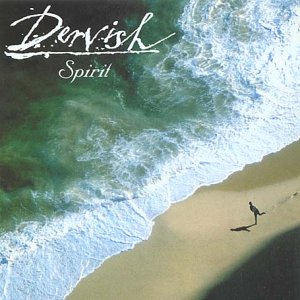
David Kidman
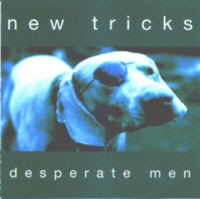
Noted purveyors of driving folk-roots-rock with a zydeco/cajun twist, Desperate Men have a reputation to die for on the West Midlands live circuit, and are regularly mentioned in the same breath as the Saw Doctors and Oysterband. Impressive, huh?! Fronted by John Richards (see Behind The Lines review), the remainder of this vibrant six-piece band consists of Emma Richards on vocals, Steve Watton (ex-R&B keyboardist) on suitably swampy accordion, Paul Dowswell on rockin' electric guitars, Pete Meyrick on bass and Dave Jones on drums. And what a fine noise they make; this CD's a rousing bon-temps experience, great for in-car play but also containing enough subtlety of detail to stand the scrutiny of closer home listening.
The material's half John's own and half covers. John's songs here, in contrast to those on his excellent solo album, are direct and earthy in feeling rather than philosophical or conscience-driven; that shouldn't imply any lack of substance, for the album's fine closer Warm Night On A Slow Moving Train very probably wouldn't have been out of place on Behind The Lines. One or two of the latter (Thompson's Wall Of Death, Bragg's A New England) border on being solid and efficient rather than specially inspired (though they'd surely more than pass muster in a live context, no doubt), but Emma's rendition of Clive Gregson's Blessing In Disguise turns out to be one of the highpoints of the CD. The playing's tight and muscular, with plenty of light and shade where the material demands it, and no hint of routine; the production by Mick Dolan is exemplary - believably balanced and with an abundance of both clarity and depth. The press handout describes New Tricks as "slick but with dirt beneath its nails" - I can't sum it up any better.
David Kidman
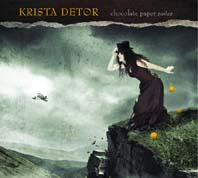
Peppered with images, in both the visuals and lyrics, of oranges, Detor's fourth and most ambitious solo album is a collection of thematically linked suites, each comprising three songs, variously inspired by the work of Federico Garcia Lorca, Dylan Thomas and Charles Darwin while musically calling to mind Suzanne Vega, Mitchell and cult singer-songwriter Bonnie Koloc.
Lorca and Thomas loom in the first suite, Oranges Fall Like Rain, which opens with quite possibly one of the most hypnotic songs she's ever written, the sultry steady rolling alt rock rhythms of Rich Man's Life with the Arabic hints of the strings and its electric guitar solo. The suite's title pops up on Lorca In Barcelona, a song she says came from a surreal image about watching oranges falling like rain in a dreamscape, while wearing a chocolate paper gown. Analyse that as you will, but, Detor back behind the piano, it's a lovely, warm summery number with a waltzing refrain that, for some reason, reminds me at times of Randy Newman's I Think It's Going To Rain Today.
That in turn flows into Recklessness And Rust, another tender ballad where, to hammered dulcimer and piano accompaniment, she sings of and going 'breathless into that good night', her voice like stars twinkling.
Staying in the skies, she leads into the second suite, Night Light, with Dazzling, a torchy jazz chanteuse waltz with acoustic guitar and brushed drums that namechecks Charlie Parker and which, some 30 years ago, would have been produced by Brooks Arthur. All To Do With The Moon is a pizzicato piano lullaby waltzer while Teeter-Totter On A Star is another dreamy 40s jazz flavoured caress.
Madness Of Love is, as the title suggests, a trilogy of heady, nervy and upbeat romance steeped numbers. Conjuring Hissing Of Summer Lawns era Joni and the jazzier blues side of Jan Ian, Innuendo is an itchy smoulderer streaked with a sense of anxiety that fully explodes in the gospel blues shuffling Middle Of A Breakdown where she sings about needing coffee and cigarettes with the urgency of train wheels turning while a guitar stings like a bee swarm.
Then there's the calm after the nervous storm with Deliver Me's sparse guitar and piano melancholically reflective "I told you so" tale of unrequited love and banjo boys who promise wedding rings.
The fourth suite, By Any Other Name, offers resolutions of sorts; of time moving on and things that will never be done as she takes to the electric piano for A Hundred Years More, the roses, dancers, and strolling lovers on the poetic snapshots of a waltzing So Goes The Night and, oranges and stars reappearing, Small Things offering an intimate romantic epiphany where "it's enough for me to look at you when you're looking back at me."
Included as a bonus, the final suite of three songs, Darwin Songhouse, isn't linked to the others but rather stems from a week-long songwriter's workshop in Shropshire devoted to musically exploring the life, works and legacy of Darwin. Detor chose to write hers in the voice of Creationist contemporary who refused to accept his ideas about evolution.
Delivered as a letter, From Miss Emma Brawley is a witty, cabaret jazz trio New Orleans shuffle where she sings that no man "is going to make a monkey out of me", Clock Of The World a wonderful hymnal celebration of the cycle of life with piano and choral harmonies recorded live at the BBC concert of the Darwin Song Project, and, finally, Emma's Lullaby plays the album out on a gentle piano goodnight reminiscent of Mary Chapin Carpenter at her most tenderly poignant.
A career high album that, if there's any justice, fully deserves to elevate Detor into the upper echelons of the singer-songwriter hall of fame. This chocolate is the full bean.
www.kristadetor.com
www.myspace.com/kristadetor
Mike Davies March 2010
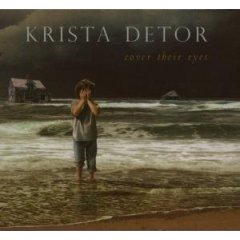
If the rustle of calico or the smell of fresh linen drying in the crisp breeze had a voice, it would sound like Indiana singer-songwriter Detor. Her vocal purity veined with a hint of world weary torchy seductress (heard to fine effect on the Paris jazz lounge piano crooner Dinner With Chantel), Detor cites Cohen as a prime influence, manifested less in the music than her poetic lyrics with their storyteller insights and observations.
Detor has a novelist's way with words, here masterfully illustrated by the title track's evocation of memories of family and childhood through the filter of hide and seek games or in the resonant use of images of leaves, clothing, a crust of stale bread. In Marlene In A Movie (a Deitrich inspired number guaranteed to roll out of the Suzanne Vega comparisons), with its flute and brass arrangements, she talks of 'the ghosts and the bones in the folds of your dress'. How striking a line is that!
Apparently informed by her travels through South America, Europe and the Midwest and the stories she collected, there's a musical richness here. A duet with Carrie Newcomer, Lay Him Down is Appalachian gospel straight out of Oh Brother while the Cormac McCarthy conjuring Pretty Horses Run (where her voice soars with the same spine-shivering effect she brought to Mudshow's title track) with its images of inevitable endings unfurling over tinkling piano and rippling dobro is laid back shuffling 40s jazzy folk. Coloured by gypsy fidddle and harmonica, Waterline is backwoods folk wrapped around a spell casting chant chorus that evokes the old religion to put an end to the physical and emotional drought.
Maybe it's the Independence Day reference, but the slow train rhythmed Robert Johnson Has Left Mississippi calls Springsteen to mind in another song that on rising waters and the absence of God suggesting (along with the sleeve painting) that perhaps the New Orleans floods may have had some input to her writings. Maybe because her folks are in the swimming pool business, but with inner sleeve photos of her up to her thighs in the sea, water clearly carries much symbolic import for Detor. Reminiscent of Shawn Colvin, the hymnal sounding The World Is Water is another song with an aquatic bent. here there's a sense of tidal ebb and flow, an enduring faith that what the world takes away it will one day return.
And if death and loss, with attendant guilt or denial, inform both the lushly arranged Icarus and the piano waltzing How Will I Know, the jaunty, tuba parping acoustic folk blues Go Ahead And Wait sees suicidal feelings being deferred ('today, there's only just a little sorrow') by eternal optimism. Listening to Detor sing it's impossible not to feel that same joy of just being alive.
www.kristadetor.com
www.myspace.com/kristadetor
Mike Davies November 2007
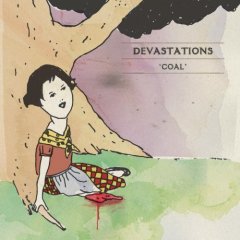
With Tindersticks apparently no more, the label's obviously been out shopping for a replacement. Thus this Berlin based Australian trio whose low mumbling singer, Conrad Standish also manages to take care of the Nick Cave comparisons. They're not as musically lugubrious as the 'sticks, but their album's certainly steeped in dark shades of gloom, menace, and desolate melancholy, variously carried along on rolling folk chords, rumbling, snarling guitar feedback or mournful violin.
"My mother she was a whore, she was lost before I was born, my father I barely knew when he said hold on...then he kicked away the chair" intones Standish on the title track, one of the cheerier love songs in their universe of black humour, crushing disappointment and life's harsh geography that sport titles like the mournful What's A Place Like That Doing In A Girl Like You, The Night I Couldn't Stop Crying and I Don't Want To Lose You Tonight.
Even the appearance of Bic Runga on A Man Of Fortune can't dispel the album's pervasive funereal nature, her usually sweet vocals taking on an air of beaten down weariness. If that cut evokes comparisons to Cave's Murder Ballads albums, and his Kylie collaboration in particular, elsewhere you'll spot hints of Lou Reed, Calexico, The Triffids and Leonard Cohen as the band mould an array of musical shapes and instruments into their intoxicating web of sound.
Probably not best listened to with pills or razor blades close at hand, but like its title, this burns with a smouldering heat that will warm you long into the coldest night.
Mike Davies, Sept 2006
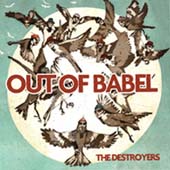
This 15 piece Birmingham outfit are a powerhouse of traditional Eastern European music, taking in klezmer, polka, mazurka and Romany gypsy folk filtered through the same sensibilities as Hawk & A Hacksaw, Devotchka and Gogol Bordello and laced with very modern concerns about financial collapse, big brother surveillance and genetic experimentation.
Clearly nodding to Vincent Price's turn on Thriller, Utopia Bypass provides a creepy spoken intro (they repeat the trick on Edgar Allen Poe-styled horror story The Glass Coffin Burial Of Professor Zurinak) before the title track launches in with its roaring Cossack carnival knees up, sudden outbreak of Greek dancing and, with fez wearing Paul Murphy's gravel and smoke beat poetry narrative curling around the rhythms, lyrics that reinforce the city's multicultural soul with references to banghra, tabla, bodhran, conga and dragon dance.
There's no time to catch your breath before you're caught up with Sirba, a roaring trad instrumental that begins with a trumpet reveille and includes a snatch of I Want To Be Like You from The Jungle Book before collapsing in the corner.
Where Has The Money Gone? is a wah wah chugging funk 'n' Balkan number about Bernard Madoff and thieves that "breakfast like Prometheus" in his penthouse suite while the gloriously titled Stork Crossing Dudley Canal is a tuba, trombone and trumpet showcase mariachi free jazz break down instrumental.
A flurry of brass, beatnik jazz, and Tom Waits clatter race through the paranoia twitchy surveillance and 'war on terror' subterfuge of Cavalcade, then it's time for a couple of instrumentals. The Case of The Dangerous Flamingo plays like the score to some imaginary silent noir thriller movie while the seven minute trad The Flying Kopanitas conjures images of Sidney Greenstreet lurking around Moroccan minarets and markets with its sultry snake charmer melody, flamenco guitar and oud (?) before a whistle blows and it erupts into a mutant Celtic hoe down.
Addressing the obsession with immortality, Methuselah Mouse returns to the cabaret horror narrative mood of Glass Coffin with Murphy talking through the tale of lab experiments to halt the ageing process (eruditely name dropping Gilgamesh, Utanapishtim and Oisin along the way for literary buffs) and its wry moral fable punch line.
And, just to show their passports aren't entirely filled with Balkan stamps, they throw a geographical curve for the remaining two numbers, heading off to Italy (singing in Italian) for the full blooded viva la musica flamenco of Questa Canzone and the Latin crooning hot club and Grappelli tinged accordion flavoured Torregaveta: il lamento di Cristina. The latter sounds all very romantic, until you find the translation reveals it to actually be the true story about two gypsy sisters, drowned at sea while people played on the beach and who now "lie in silence on the cold marble of the morgue." An Andrea Bocelli cover is not anticipated.
Chaotic, frenzied euphoria has rarely had such a brilliant house band.
www.thedestroyers.co.uk
www.myspace.com/thedestroyersplaymusic
Mike Davies October 2009
Though Montreal-born alt. country songwriter Angela grew up in Cape Breton, her music is not influenced by the folk music of that region but instead markedly by that of her avowed main musical inspirations Lucinda Williams and Gillian Welch. She returned to Montreal, working with local bluegrass and country groups, waiting a while to release this, her debut CD, which turns out to be a sparkling set of accessibly-country songs whose main interest comes with the jaded twist to her lyrics. The more pensive numbers like If Only, Made Up Your Mind and Bury Me Deeper probably come off best (shame the lyrics aren't included in the booklet by the way), while the more easygoing, uptempo songs don't seem to have quite the bite or individuality of melodic line that would make them stand out. But at least Angela's a pretty good singer, though not possessing any special quality that would mark her up into the Lucinda class, and she's got the ear for a good arrangement (although the slightly opaque, occasionally muted quality of the actual recording lessens the potential impact of this disc at times). Among her sidemen here are Mike Feuerstack, Eric Digras, Jean-Guy Grenier, Mike Moya and Jesse Levine, all perfectly competent though not previously known to me, whereas drummer Howard Bilerman formerly played for Arcade Fire, and producer Brian Paulson has worked with Wilco. In all, Wandering Eyes isn't an unimpressive debut, sure, tho' more Lucinda than Gillian I think in the end, but it's not just the "eyes" that have it, for attention wanders too at times, certainly on the evidence of the handful of plays I've had time to give the disc thus far. Let's see what Angela comes up with next time round.
David Kidman December 2006

He may still be best known for his days as leader of Mink DeVille, the Spanish Stroll Springsteen, but over the years he's proven himself adept in a variety of genres. As if to prove the point, his latest album, steeped in his experiences of New Orleans, feels almost like a musical CV sampler as tracks switch from roots to blues to funk and blues with fluid ease.
Opening in shades of slouch n swagger Dylan with So So Real, he happily confesses to being the nearly man as he sings 'I ain't no rocket, just a shooting star', but one who remains in love with what he does. On then to the growly vocals, brassy reggae chops and New Orleans soul of Been There Done That where he sounds like Dr John channelling Bob Marley before When I Get Home picks up the gospel torch and lights a roots candle to light his journey on the 'greyhound sea'.
It's back to New Orleans for the drunken funeral lurch of The Band Played On where he adopts a gummy vocal to sound like Van Morrison in his cups as he pays homage to the city's resilience. Then it's down to the Cajun swamps for a loose limbed voodoo blues You Got The World In Your Hands and back to the closest cantina for the Mexicali unrequited love romance cha cha I Remember the First Time.
Given his leathered look on the album sleeve, it feels wholly in character when Stars That Speak sees him turn into the bastard child of Tom Waits and Leonard Cohen as he talks his way through another romance drenched song (written in Paris back in 1980 ) about artistic drive as an aged sculptor chances upon the figure of a woman he carved in his youth. It's like Rodin as lived by Bukowski.
He's in recitation mode again for the final cut, The Mountains of Manhattan, with echoes of Morrison's lizard king person as, to Pete Thomas' tribal percussion, he spins a myth of 'tattoo spirited warriors and turtle women', superimposing images of the past on the landscape of the present, from natural forest to urban one.
There's one cover, here, a lovely countrified version of criminally overlooked 60s singer-songwriter Paul Siebel's Louise, a perfect grace note on an album that once more underlines just what a neglected talent DeVille truly is. The legendary Doc Pomus, with whom he collaborated on several songs, once said of him ' the harsh reality in his voice and phrasing is yesterday, today, and tomorrow; timeless in the same way that loneliness, no money, and troubles find each other and never quit for a minute." Sounds about right to me.
Mike Davies April 2008
The Devil's Interval, rather intriguingly named after a particular sounding-together of three notes which a decent music encyclopaedia might describe as "a tritone of notoriously sinister dissonance", is in fact the collective name for three fine young harmony singers (Jim Causley, Lauren McCormick and Emily Portman) who first met in 2002 at Newcastle University while studying for the Traditional Music degree. They'd first made an impression on me around 18 months ago when they appeared at the launch of the Songlinks 2 project, since which time they've gone from strength to strength with appearances at many folk festivals and as part of the Waterson: Carthy Yuletide Show Frost And Fire both last year and this. They've been hailed as "English folk's new supergroup", and whilst in my humble opinion that errs on the side of extravagant hype they certainly have a lot to offer, especially in terms of confidence, accomplishment and integrity.
They have a deep - and lively - interest in traditional song, one that transcends mere academicism and eschews the driness of that approach, preferring to view the tradition as a living, breathing phenomenon; in that regard they clearly take their inspiration from close listening to the source singers on the Voice Of The People sets and in particular, they aver, from the earthy, free-spirited singing style of the travelling people. That term "free spirit" is important, for it describes both the creativity with which the Devil's Interval come to express the songs and communicate their excitement in what they're doing, and their belief that all song is grist to the mill, whether it be traditional balladry or music-hall, Tom Waits or Bette Midler covers. (Not that we get any of the latter on this CD, I hasten to add ) The trio's debut album presents a good cross-section, though I'm not entirely convinced that the running-order of the tracks does either the singers or the material complete justice. Also, I don't always quite "connect" with their treatments of their chosen material, at least on first acquaintance; it may be that the trio's sheer daring takes a bit of getting used to, even for those of us who are normally of an adventuresome disposition. There are some extraordinary seat-of-the-pants moments in those harmonies, to be sure, and the often surprisingly restrained arrangements contain some serious subtleties to get your ears round.
On a first hearing, what you notice at once - indeed, what startles most, perhaps - is the relatively vast contrast between the three individual voices, not just in their actual coloristic or tonal qualities; they work together far better than you might imagine having heard them in a solo context. The timbre of Jim's voice is rich, solid and confident, at one moment lulling you into a sense of comfort yet at another quite disturbing, not least in its wondrous elasticity of line; Emily's enthusiastic, commendably precise, sibilant delivery complementing and contrasting with Lauren's smoother melodiousness yet both displaying that enviable combination of youthful (almost coy) innocence and full-bodied (thrusting) strength.
No exaggeration, but each time I play this disc I get the compulsion to replay at least some of it almost at once because I just know it will reveal more and more the next time: this is a rather special category for a new disc to be in! Examples: well, I always start Silver Dagger with trepidation, for (like some other tracks) it feels a bit polite and mannered at first and takes a while to "click" but it soon proves compulsive listening, as does (though immediately this time) the trio's haunting version of The Leaves Of Life. The delightful homespun-philosophy commentary of Studying Economy sounds fun to sing (and empathise with!), and fresh each time you hear it despite the tightness of the arrangement. The melancholy sequence just past midway through the disc, comprising two carols and Down Among The Dead Men, is superbly managed (and I wonder how many other listeners will, like me, hear uncanny resonances of Shirley Collins in Lauren's singing of her own May Carol?); Bonfire Carol in particular (which Devil's Interval are indeed lucky to have "squeezed out of Chris Coe"!) is a real discovery. Although the trio are committed to acappella singing, there's a smidgen of instrumental accompaniment on a small handful of the tracks. Long Lankin is given an episodic, quasi-retro treatment that smacks of something from the halcyon days of electro-folk (and arguably loses a little in holding-power and contemporary credibility by not going the whole hog down that road). Two Crows cavort along with a slightly lugubrious morris-y gait, a delicious rendition that's mildly spoilt only by some unnecessary crow-impersonations (caws for concern there, naughty Mr Cawsley - sic!). And while still waxing ornithological, the DI's choice of the Queen Caroline Hughes version of The Cuckoo is both bold and highly inspired. The disc closes with a jolly syncopated knees-up rendition of the old string-puller Blow Me Jack where I'd swear you can feel the "synchronised dance routine" of the participants! Yes, an intriguing disc that indicates much promise for this scintillating combination of vocal talents.
David Kidman October 2006

Vocalist Colin has a breathy quiver of a voice that well suits the album's reflective sometimes claustrophobic mood as the songs move through their urban relationship narratives, taking in samples, beat box loops and lush orchestral arrangements as well as simple acoustic settings to get their thoughtful impact over. There Is A Light sounds oddly like a mix of Del Amitri and David Gray, but you'll also hear hints of Bono and Dylan (both of them simulatenously on the wondrous, chiming Strangest Things) while recording their debut in Daniel Lanois' studio obviously left behind some atmospheric influences.
They get a bit harsh on the distortion pulsating People Still Believing, the musical context reflecting the angry nature of the lyrics while Static In The Flow has a sweet sweating poison and flurries of noise churning over its melodic roll, but generally speaking the intent is to lull rather than disturb, something they pull off with accomplished finesse on Wide Open and Montreal. There's a cinematic soundscape to much here, so no surprise to discover that, following on from the inclusion of Waiting, the title track from the last album, being used on Six Feeth under, the album's already been tapped for songs to be featured in both TV and big screen releases, the stand-out title number earmarked to crop up in an episode of MTV'sd The Real World.
Mike Davies
Here Barbara fulfils her latest ambition, to preserve in video form a contemporary concert performance that truly encapsulates her vocal and interpretive skills. Inevitably, it totally surpasses Barbara's previous VHS release (of a live show at the RAH, twenty years ago), and builds on the success of her most recent CD Time And Tide, continuing her fruitful artistic collaboration with Troy Donockley, whose inventive and superbly musical arrangements form the backdrop to the wonderfully controlled ebb and flow of Barbara's soaring voice. Just three of the 19 songs on this DVD are common to the CD, but there's no feeling of duplication or déjà-vu. Indeed, the DVD presents a rounded selection of material covering all bases, from keen revisits of traditional songs (Dónal Óg, The Great Silkie, Eriskay Love Song) to equally keen covers (Dylan, Harrison, Rafferty, James Taylor and a particularly sensitive rendition of Love Hurts) and show hits (Lloyd Webber, Willy Russell), together forming a magisterial sequence of performances which perfectly showcase Barbara's versatility and taste. And of course there are plenty of fine contributions from the backing band (Troy D, Nick Holland, Pete Zorn, Brad Lang and Russell Field). It's a polished, professional show in every respect, and the DVD's a faithful, magnificently state-of-the-art record of that show that won't disappoint. I actually prefer it to the Time And Tide CD if truth be told (good though that was/is). There's also a bonus disc, which features pre-concert preparation on location at Spilsby, Lincs., as well as interviews with Barbara and band members.
David Kidman June 2008
Maurice Dickson - A Year In The Life (Mo Music)
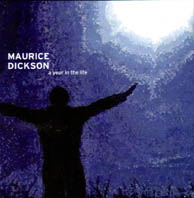
Belfast engineer turned gypsy troubadour, Dickson's been travelling the road for 25 years, four and a half of which were spent honing his craft in Europe and North Africa. Making various pit stops to record five albums as his style shifted from r&b to acoustic stylings, he's back now with a sixth. Recorded in the in the middle of nowhere in the Brecon Beacons (though presumably sufficiently on the map to allow a string section and assorted backing musicians to find their way), its country folk melodies seems to have distilled the essence of the surroundings so that songs come infused with the scent of loam, leaves, morning dew and dusk mists.
He has the tang of years spent in smoky Irish bars to his breathy, dust lined vocals, the lessons of bringing a sparkle to heartaches well learned to judge by the break up but not broke down Baby Blue. Not that he doesn't acknowledge the pain too. The jaunty Appalachian blues feel of In Your Company hides a loneliness for love let slip away while both Lady of Love and War Paint & Feathers recount the way both sexes can promise forever and then turn like the weather or the notes of a tune. Reflecting the world outside, several numbers deal with current world situations, the slow march Cold Blows This Wind questioning the endless wars into which leaders have led their nations over centuries, Texas Pride a bluegrass cajun stomp about going to war for oil with the help of Maggie Blair sung in the voice of, oh go on take a guess, that tellingly gives way to a masterclass spooky windswept Eastern textured guitar instrumental titled The Road To Basra.
But, whether it's women or world leaders trying to disfigure his life, Dickson remains defiantly resilient and open to hope. A dramatically moody Spanish inflected The Gypsy Queen (shades of Chris De Burgh I suspect) celebrates the magic of hands entwining like rhyme, Spread Your Wings is a Texas flavoured harmonica wailing, fiddle scraping hayseed stomper about taking that chance and learning to dance (it's a metaphor, right) while the fiery tribal rhythmed Spirit of Music and the sparse, nigh unaccompanied The Journey are triumphant celebrations of the uplifting healing power of music and a life lived to the full.
Mike Davies
Tina Dico - Far (Finest Gramophone)

Recently heard contributing vocals to two tracks on Zero 7's When It Falls, like fellow female collaborator Sia, the blonde Danish six footer is now capitalising on the exposure and striking out with a solo album. It's not her first, she'd released her debut three years back but, while big back home (where she was just voted Best Composer at the Danish Music Critic Awards and won a Best Songwriter Grammy at the Danish Music Awards) it received little exposure outside Denmark. Things should be different this time.
She's been compared to Joni Mitchell but a closer parallel would more likely be a slightly folksier Judy Tzuke or Natalie Inbrulgia, or perhaps a less enervated Julee Cruise. Break of Day is cool chilled pop with a beats anchored rhythm over which her voice swoops while the opening swirling sultry heat of Warm Sand underlines the sensuality that ripples through her work. With its big swelling hook chorus Haunted should attract the Sheryl Crow audience but it's the folkier numbers that prove the strongest here, a five minute Let's Get Lost that gradually builds to a crescendo and stabbing guitar and, the simple acoustic closing end of relationship track, Back Where We Started, where you suspect she may have stumbled across a few early Janis Ian albums somewhere along the line. At only six track's it's more of an extended EP than an album but it affords ample enticement to look forward to a fuller collection in the near future.
Mike Davies
Mainstay of Squeeze and masterly songwriter of long standing and much repute, Chris last released a solo album back in 2002 (I Didn't Get Where I Am), which I missed somehow. I'm glad to have had the chance to catch the followup, however, for it's a top-notch collection of 13 brand new gems which match biting wit and down-to-earth lyrical candour with a certain nostalgic whimsy and commercial savvy. Few songwriters can honestly achieve ticks in all those boxes (Clive Gregson comes to mind), but Chris has excelled himself I feel on this latest set. It's a collaboration (in both writing and production terms) with Boo Hewerdine, but contains all the essential hallmarks of Chris's tried-and-tested style on songs that really hit the mark almost without seeming to try, whether they're what Chris calls "just fun songs" (like Fat As A Fiddle), autobiographical essays (My Mother's Handbag) or altogether deeper personal observations (Reverso). Battersea Boys (one of the album's pair of tracks co-written with Geoff Martyn rather than with Boo) forms another of the record's emotional highpoints, being a poignantly expressed recollection of an overheard true story. At the other end of the spectrum, the bouncy Come On Down is a somewhat tongue-in-cheek testament to Chris's own relationship with money! The musical arrangements are both natural and spacious, direct and evocative, with plenty of punch and depth of focus but also conveying a feeling of warmth and honest spontaneity. Neat, complete and an aural treat.
David Kidman April 2008
Ani DiFranco - Evolve (Righteous Babe)
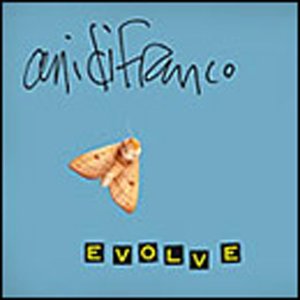
As prolific as ever (the last couple of years has seen a double studio set, a double live album and the Woody Guthrie tribute), this marks the culmination of the current phase of her career as she sheds the band to return to performing solo. As such it's hard to know if its a full stop or a glimpse of future directions, (indeed on the opening Promised Land she sings "what's with the new version of who you are?" ) but for those who reckon she's at her best with a forceful, rootsy driven guitar and concise melodic and lyrical structure hopefully it draws a line under the sort of loose limbed Latin jazz funk that characterises the likes of In The Way and Slide or the discordant beat cellar moods of O My My and paves the way for more of the caustic state of the nation/state of the industry boho poetry of Serpentine with its angular solo guitar or the stripped back syncopated beat of the title track that allows her trademark passionate lyrics the room to breathe and the space to cut.
As an album it's both experimental and focused, some stuff works, others just seem to swamp her in their desire to be out there in the groove, but if her future solo work can reconcile the best of what she achieves here on the Wynton Marsalis flavoured guitar and woodwind arranged Second Intermission where the form and the thoughtful content complement each other, then (as intimated by the closing Welcome To: ) the evolution should prove a very interesting future for the species.
Mike Davies
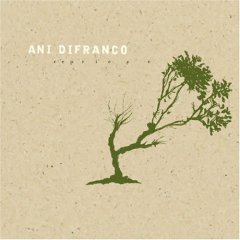
This, Ani's eighteenth studio album, at first seems a sublimely restrained affair, with Ani in stripped-down mode and accompanied only by Todd Sickafoose, her touring bassist. It's also quite a bit more sublimely accessible than many of Ani's previous records, with significantly less in the way of full-on agit-soapbox posturing. This you may well find refreshing – much as you (like I) may appreciate Ani's uncompromising stance and her political statements, you don't always want them to be shouted at you for close on three-quarters-of-an-hour. Sure enough, Reprieve deals with the usual Ani themes and preoccupations, but her more laid-back mode of expression here curiously imparts a greater sense of urgency to her thoughts and feelings (and her communication of them) and the result is significantly more persuasive. The title track, for instance, couches Ani's radical poetic musings in an equally radical quasi-beat Sprechstimme, while the lucid weirdness of the setting of A Spade only makes its defiant polemic even more unsettling. And even the most overtly upfront, scathing cut, Millennium Theater, makes its mark without overstaying its welcome. Apparently, the genesis of Reprieve lay in recordings Ani made in New Orleans just prior to the onslaught of Hurricane Katrina, which luckily were retrieved, and later completed and mastered back home in Buffalo, NY. The sparse immediacy and organic nature of the recordings is palpable, with subtle, home-grown instrumental touches (including assorted "found sounds" and environmental noises) augmenting the basic acoustic guitar and bass figures as a powerful backdrop which enables Ani to best point up her precise rhymes and meanings. All the while she challenges her listeners with intriguing, shapeshifting textures and images, drawing us ever closer in, to present us finally with a very compelling sequence of eerie, hypnotic creations that memorably intertwine the personal with the global-political. Reprieve, though still proudly unique, also happens to add up to one of the most musically addictive, and consistently repeatable, listening experiences among all of Ani's albums, and one that will I'm sure persuade the current non-believers to give this admirable artiste another chance. It's brilliant, in fact, and I'm sure will come to be regarded as one of Ani's very best.
www.righteousbabe.com
www.myspace.com/tombliss
David Kidman April 2007
Neil Diamond - 12 Songs (Sony)
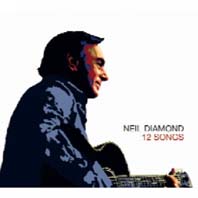
Dear Neil
I've not been in touch for a long time because to tell the truth, I sort of fell out love with you when I saw you in concert about 20 years ago. I'd gone along to see one of my all time musical heroes, the man who had recorded Taproot Manuscript, Stones, Brother Love's Travelling Salvation Show, Serenade and Moods, the man who'd electrified with his live performances on Gold and Hot August Night. I'd had a few rebuffs during our time together but I'd learned to embrace The Jazz Singer and Jonathan Livingstone Seagull and even to tolerate You Don't Bring Me Flowers (the album, you understand, the song itself was classic). However, here you were in some spangly red outfit like some Vegas showman, not the moody rebel who made Girl, You'll Be A Woman Soon or the lost soul of Brooklyn Nights. You sang Red Red Wine, one of your greatest, saddest love songs, but horrifyingly you gave it the UB40 reggae arrangement. Don't get me wrong, I like that they did with it, but Neil, this is your song, you should honour it as you wrote it. But worse was to come. You sang Forever In Blue Jeans. Then you sang it again, and you kept coming up to the edge of stage, pointing to people in the audience and mouthing 'I love you'. This was not the Neil Diamond I thought I knew and I confess I had to leave the show, bitterly disillusioned.
Since then, almost out of habit, I've always listened to your new albums but I've never found anything to rekindle the flame. How do you think I felt when the best thing about Headed For The Future was written by Bryan Adams!
But, I'm making contact again now because I see you have finally realised that your career needed to be artistically salvaged and you've recorded this acoustic album with Rick Rubin. He brought Johnny Cash from the depths within himself and guided him to recording the best albums of his life, so hopefully he could reignite the real Neil Diamond.
Well, I'm glad to hear your booming growl of a voice is on great form and it sends shivers to hear you deliver songs like the devotion of Oh Mary, the My Way defiance of Hell Yeah, and the big ballad Evermore in the way you did back in the days of I Am, I Said. And Save Me A Saturday Night is a lovely number that takes me back to your early days of the 60s.
I'm still saddened that Rubin hasn't inspired you to revisit the muse that provided the likes of Holly Holy, Solitary Man, Play Me, and Canta Libre and although I can hear you trying to dig deeper into yourself on Face Me I'm afraid songs such as Create Me, the banjo lollopping We and the slightly embarrassing gospel affirmation Man Of God are never going to be counted as the cornerstones of a reawakening of the fire.
But Neil, I'm glad to see you making the effort to reconnect with old flames like myself and remind others that you were once a credible songwriter of real power. I hope you and Rick stay together a while and that more great things come of the relationship. Let's stay in touch.
Mike Davies
Two very different new releases from arguably Northumbria's finest slide guitarist, a man with a solid reputation as purveyor of an eclectic range of music.
Sketches From The Road is a live collection, completely solo, and just what it says: artistic snapshots of points within Johnny's diverse repertoire, wherein his individual treatments of traditional songs (American and border ballads) sir easily alongside pieces by Fred McDowell and Jackson C. Frank. Johnny's famous for working without a set-list, playing just what takes his fancy at that moment, and this collection is a most persuasive marketing tool in that it replicates the atmosphere of a Johnny Dickinson live gig absolutely faithfully (for even though the recordings were made at four different venues, Johnny's performances are absolutely consistent), capturing all the intensity and intimacy of Johnny's fabulous playing and subtly shaded singing. Highlights of this set for me are the epic John Hardy and the vibrant township groove of Handsome Molly. The only thing missing from this collection is a representative freewheeling instrumental improvisation, several of which may occur in a typical JD live set.
Hilo Town is Johnny's latest excursion into the studio, where in the company of just four trusty musicians (Neil Harland, Ray Burns, Graham Hardy and Paul Smith) he proves his thesis that music is music is music, and that material from all manner of traditions has common roots and branches and will always be ripe for intelligent and creative reinterpretation. Each time I see Johnny live, I'm entranced anew by Johnny's playing and singing, and his abundantly open-minded, open-hearted approach really chimes in with my own sensibility. Here Johnny's come up trumps with a collection of 11 reworkings of traditional pieces sourced variously from England, Scotland, Ireland and America. It comprises both sung and instrumental treatments, not necessarily within the category you'd expect if you know the "originals". Courting Is A Pleasure is more Peggy Lee than Nic Jones, while Single Girl becomes a jaunty swing-shuffle with bluesy Max Geldray-style harmonica. The Smuggler's given a soulful troubadour feel rather different from the usual rip-roaring folk club treatment, while Ye Banks And Braes, shorn of its lyric, is Cooderesque in its cinematic scope, with more than a touch of Cowboy Junkies. Three Ravens step out in soulful ska-style down in Hilo, and A-Begging I Will Go is given an infectious rumba beat spiced up with a dash of mariachi brass; The Drunken Piper gets a hula-style rendition (the spirit of Sol Hoopi rules OK!) and Tom's Gone To Hilo places Tom firmly in the jumpin'-jazz-joint dives of any port in a storm. Both these new releases are delectable discs; if you haven't yet latched onto Johnny's talent, well now's the time to do so.
David Kidman November 2006
Johnny Dickinson - English Summer (Hard Road)
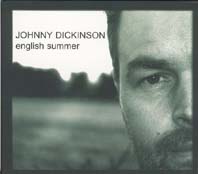
David Kidman

This one sounds tasty right from the start, with lazy but deft and atmospheric picking and bluesy-inflected singing on reflective lyrics, and excellently recorded too, on the first of the album's seven own-compositions (the remaining five being often intriguing and unusual arrangements of traditional folksongs/tunes). John plays an assortment of acoustic and electric guitars, including National steel and bottleneck, and he's backed simply and soulfully by three fellow-musicians, on double-bass, sparse percussion and occasional piano respectively. John's own slide playing in particular is outstanding, being potent yet with perfectly judged phrasing.
His CV to date carries some impressive references - after starting off with Northumbrian band Splitcrow, he then spent two years as a founder member of Paul Lamb and The King Snakes at the back end of the 80s, subsequently moving on through the iconoclastic Hillbillies From Outer Space, with whom John spent eight glorious years (it's one of music's perennial frustrations that the band apparently never actually recorded an album!). The band called it a day in 2001, after which a period of illness put paid to John's plans to record a solo album, but happily he recovered at the end of last summer and hot-footed it into Newcastle's refurbished Cluny Studios to do the necessary. Castles And Old Kings, the resulting album, is a masterly collection indeed, complete blues-folk artistry from start to finish, crammed with a quite special brand of subtlety.
Without wishing to imply in any way that John's music is at all derivative, there were times I was reminded of Martin Simpson (the bleak arrangements of She Moved Through The Fair and Searching For Lambs), other times of Eric Bibb or Michael Chapman (the wistfulness of If I Ever Go and the title track, for example), but John's an inventive fellow in his own right, although if as a folkie you never experienced the Hillbillies you might find one or two of his reworkings, such as the eerie R&B-voodoo setting of Black Jack Davy, a touch wayward; and I'm not quite convinced (yet) by the fast-paced shuffle arrangement he affords to Jock O'Hazeldene. Whatever, though, John sure has his own unique voice, and this finely minimal album is superbly evocative in all the right ways - there's something in the breeze indeed, and I can virtually taste the air of the wild Northumberland coast, in fact, fanciful as it might sound!
David Kidman
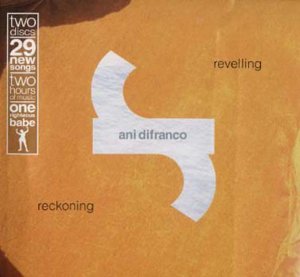
Ani DiFranco has never been afraid to be eclectic, sucking up new musical influences & incorporating them into her distinctive songwriting & sound. On this outing the new assimilation is Jazz.
The collection is split into 2 themed CDs, upbeat on "Revelling" & reflective on "Reckoning". It's initially tempting to think that within this 29 track package there's a single album with the power & impact of Ani's "Dilate" fighting to get out. Repeated listenings however, reveal 2 distinct entities in their own rights.
On "Revelling" it would be easy to dismiss the value of more relaxed, jazz-funk grooves such as "Ain't that the Way" & "Marrow" as a vehicle for Ani's brutally honest, often witty lyrics. Who else could make lines like: "there's a smorgasbord of unspoken poisons/a whole childhood of potions" ("Marrow") scan so naturally?
These 'feel pieces' sit alongside the more familiar punchy songs and stripped down, guitar & voice only performances such as the exquisite live favourite, "Garden of Simple". Unlike her early recordings, the list of performers is extensive with five members of Ani's current touring outfit forming the core band.
Despite the innovation & natural, unforced quality of the brass laden band performances on "Reeling", Ani is just getting warmed up for the real treat of "Reckoning".
Here we see DiFranco in a more mature, contemplative mode than on any of her previous releases. There's a greater emotional depth & intimacy, without the bravado of her earlier songwriting persona.
In keeping with the fact that she has more to say, arrangements are more intimate with sparse, understated instrumentation allowing breathing space for some very strong melodies. Ani's trademark clipped, semi-percussive guitar style remains intact & is provided with a greater depth by her increasing use of baritone guitar.
The sonic experimentation of recent albums continues with some tastefully employed organic sounds including guest spots from trumpeter Jon Hassell ('Revelling') & pedal steel player Lloyd Maines ('Sick of Me').
Subject matter varies from political ('Your Next Bold Move', 'Subdivision') to the heartfelt & affecting lovesong ('Sick of Me') or the stunning, articulate relationship song ('School Night'). The highlight is the beautiful, self-questioning 'Grey' where she asks "what kind of paradise I am looking for?" to a minimalist guitar accompaniment & sparse piano chords. This level of honesty & emotional communication is rare in contemporary songwriting.
Ani is without question an original & highly talented songwriter. While R&R might not be the most accessible introduction to her work, an investment in listening time with the lyric sheet in hand will certainly reward the patient listener.
James Hibbins
In September 2009, just a few months after the release of her award-winning album Hill Of Thieves, Cara assembled many of the musicians who worked with her and Sam Lakeman on the album to appear in a special live concert at Belfast's Grand Opera House, one of Cara's favourite locations. The close-on-85-minute performance was captured on film, and is now released on DVD for us all to savour and enjoy again at leisure.
It's an evening of pure magic, in which Cara is not only the star but the relaxed host who presents us with a delightful, well-balanced sequence of songs that – as she laconically observes near the start – mostly concern bad men who treat their women lovers badly. Cara's never sounded more persuasive, and her sweet, tender, deceptively fragile vocal timbre conceals a considerable expressive flair that if you listen carefully is never far from the surface but is in danger of being undersold.
Cara really is a very fine interpreter of song, and here she has carefully chosen a repertoire that, while mainly adhering to the album tracks, also slips into the scheme of things a generous handful of bonus items - The Snows They Melt The Soonest (culled from her After The Morning CD), her celebrated take on Black Is The Colour, the light-textured Érigh Suas A Stórín, covers of Tommy Sands' poignant There Were Roses and Van Morrison's Crazy Love. As a vivacious interlude in the first set, there's also a sparkling set of jigs on which Cara picks up the fiddle to augment Zoë's fire. Zoë being Zoë Conway, of course; the remainder of the support crew comprising Sam Lakeman (guitar, piano), Ed Boyd (guitar), James Fagan (gazouki), Eamon Murray (bodhrán), Brian Finnegan (flute, whistle) and James O'Grady (uilleann pipes, whistle). And what a team they make; for, even if – as Cara playfully teases – they don't iron their shirts, they're all brilliant at what they do, which is what matters! The instrumental backdrop is varied cleverly through the two sets, and ranges from just Sam Lakeman's piano to piano and violin to guitar with violin to full seven-piece ensemble; even so, and persuasive as the accompaniments are, it's Cara's pindrop acappella rendition of Fil, Fil A Run Ó (sung in Gaelic) that's just as much of a highlight on stage as on the album.
The elegance and subtlety of the performances is complemented by the musicians' easy accomplishment and gentle fire, and it all adds up to an evening to treasure, faithfully and straightforwardly conveyed by the camerawork, the only mild distractions being provided by occasional (and unnecessary) 360-degree panning shots that sweep up high, on out into the auditorium and then back onto the stage. The DVD's concert footage is suitably rich fare on its own, and worth the price of admission, so it's a bit of a mystery why they've bothered to append a so-called bonus feature which amounts to nothing of any significance. It's basically a five-minute assemblage of "behind the scenes" which cuts together shots of Cara and Sam walking through Belfast streets with soundchecking for the concert itself and a minute of congratulatory hugs; we're given the choice of soundtracks for this assemblage – audio of three different Hill Of Thieves album tracks. Pretty pointless really, and slightly undermining the main attraction.
David Kidman December 2010
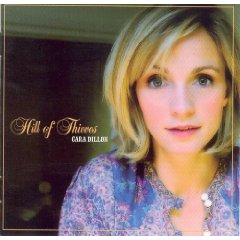
Three years on after the premature birth of her twins enforced an early career break, the Londonderry folkie returns with the first release through the label she's co-founded with partner Sam Lakeman. Perhaps she spend her sabbatical re-immersing herself in her roots, but she's in firmly traditional mood here with the opening title track the only fully self-penned number. And, set to the tune of The Lochaber Badger, that sounds as though it were plucked from some dusty collection of ballads as she sings what could be either an environmental or a prodigal soul lament while uillean pipes and bodhran thicken the atmosphere.
Everything else features arrangements by Dillon and Lakeman, earthier and more simple than of yore, with two numbers, The Parting Glass and The Verdant Braes of Skreen sung to just a spare piano backing from Sam, bringing out the pure quality of her voice.
Not that the fuller sounds are less evocative, Johnny, Lovely Johnny a jaunty tale of a faraway sweetheart tipping its toes to the pipes, bodhran, bouzouki and fiddle while, with mandola and flute, Jimmy Mo Mhile Story (another absent lover lament) has the freshness of mountain streams. P Stands For Paddy (into which they interpolate the self-written Lament For Johnny) is the album's six minute epic, Dillon sounding like a young maiden as she declares her love for 'the fairest man' while the instruments weave a thick web of Celtic mist.
Elsewhere you'll find a sterling reinvigorated version of that old chestnut Spencer The Rover that welcomes brother-in-law Seth to share vocals and contribute guitar and fiddle, while, adding to the stock of songs about false, absent or parted loves, False, False, and a piano, whistle and double bass setting of the evergreen She Moved Through The Fair. Just so it's not a total downer of romantic melancholy, there's also The Lass Of Glenshee providing a welcome breeze of love's constancy. Which just leaves the icing on the cake that is the final track, a haunting beautifully modulated acapella reading of Fil, Fil A Run O sung in Gaelic that sends you away on clouds of serenity.
Mike Davies January 2009
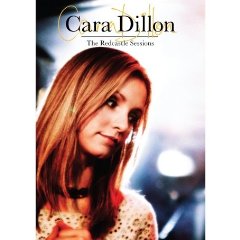
This DVD is the fruit of a one-off project that arose from the pipedreams of fine young Irish singer Cara and her husband Sam Lakeman, to present something different from the straight "recorded concert" format. For four days during 2007, they assembled their favourite musicians in a converted hospital on the shores of Lough Foyle, Co. Donegal, and filmed performances of 14 songs, each one captured in a single live take. (As a bonus track, there's also a rousing recording of P Stands For Paddy, made in McReynolds Bar in Cara's home town of Dungiven, Co. Derry.) Cara's captivating, intimate and expressive performance style, and the gentle warmth of her singing, are qualities that radiate out and through into the performances of the musicians with which she's surrounded herself. Just as Cara herself lovingly caresses the songs in interpretation, with a true understanding of what she's singing about, her husband Sam Lakeman lovingly caresses the musical settings he provides for her. These tend largely to stem from, or be built around, his own piano accompaniment, but at the same time they're sufficiently spacious to enable the other musicians to bring in telling detail of their own devising through perfectly-judged solo embellishments.
Although the musicianship is exceptional, it manages at the same time to remain unobtrusive and always at the service of the song and the singer; nowhere does any element of the backing get in the way of the song. The actual performances are magnificent, and refreshing new life is breathed into songs which even prior to the sessions Cara had already made very much her own (Black Is The Colour, Dougie MacLean's Garden Valley and Tommy Sands' There Were Roses) and Lakeman/Dillon originals like I Wish You Well, Where Are You and October Winds. There's a première recording too (a stunning take on the traditional False, False), along with some beautiful and memorable cameos, notably Cara's heart-stopping duet with gravel-voiced singer/songwriter/guitarist John Smith (If I Prove False), while out of a large field of brilliant individual contributions from the ten musicians involved I'd have to single out the playing of James O'Grady (uilleann pipes) and Zoe Conway (fiddle), with the playing of Russ Barenberg, Ed Boyd and Liam Bradley arguably not far behind.
The intimate style of the filming (by Robin Bextor) reflects that of the music-making and conveys the very special atmosphere of the sessions. Rather than watching a concert, you get the feeling of being right in there among Cara and the musicians; only during Bold Jamie, perhaps, does the fly-on-the-wall sense of the restless, busy wandering-camera get a touch overwhelming. Small segments of interview and reminiscence are interspersed with the session footage at certain points, and although these do break the flow a little, they can be skipped through careful selection of the programme. The only other mild inconvenience is the omission of track writing credits and full muso descriptions from the package (they're banded separately on the DVD itself). In every other respect, and certainly from the music and recording standpoints, this is an entirely recommendable - indeed, very special - release.
David Kidman October 2008
Touring through October & November
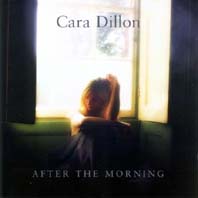
So far, the crystalline-voiced Cara's given us two rather nice solo albums that have presented her very much as a developing artiste, each showing a slightly different slant on her interpretative powers (predominantly traditional folksong on the first then branching out into self-penned material on the second), and this "difficult third" gathers together both strands (half of the set consists of compositions by Cara either solo or with Sam Lakeman) within an even more assured production that exudes commercial appeal yet doesn't compromise artistic quality in the slightest. In all respects, it's her best yet, although at first listen I found the opening track (Never In A Million Years, which has been chosen for release as a single and made the Radio 2 playlist) just a little too mainstream for my taste, but like the remainder of the album it's all beautifully done by Cara and the effervescent Sam, who's been at her side in truly creative rapport all through her solo career so far and who's been a constant inspiration as well as making significant personal leaps forward as a quality producer/arranger. The musical arrangements are more expansive this time round, though often quite subtly so and with a commendable sensitivity that matches the increase in Cara's own expressive maturity. Several of the tracks feature Sam on guitar (a new acquisition for him!), although his trademark rippling piano lines still do duty and provide a distinct signature. Another departure comes in that some songs have a definite contemporary-bluegrass tinge with banjo featuring prominently in the instrumental complement – though having said that, the attractively bouncy I Wish You Well is in its own way just as reminiscent both of Woody Guthrie's Minor Key and a McGarrigles-type uptempo number . Cara brings in Frank Gallagher to put together a finely-tuned and highly musical string setting for her haunting treatment of The Snows They Melt The Soonest. On the moving Walls, Cara recalls Nanci Griffith (although Cara originally learned the song from Maura O'Connell), the sublime closer Grace features the plaintive slide guitar of Martin Simpson, The Streets Of Derry features a magical duet vocal by Paul Brady and Bold Jamie (a fine original composition in true traditional style) features the keen playing of none less than Cathal Hayden and Martin O'Connor. On the traditional pieces (especially for example Brockagh Braes), Cara comes across like a more muscular Kate Rusby, where although she retains her tonal sweetness there's less of an element of mannerism in her accomplished delivery. Throughout the album, in fact, Cara's singing is elegant rather than anodyne, with a perceptive depth to its basically lyrical approach and tonal character that both complements and counters its intrinsic beauty. After The Morning is a well-rounded, charming and quite exquisite offering that ought to please all but those who demand the roughest-edged of song albums.
David Kidman
Cara Dillon - Sweet Liberty (Rough Trade)
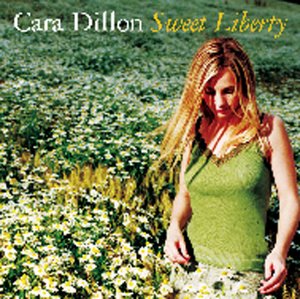
Formerly of De Dannan and then Equation before embarking on a solo career in partnership with Sam Lakeman, the Co Derry born songstress's sophomore album builds on their debut with a greater musical confidence, manifested not just in the performances but in five self-penned numbers to go with the traditional material and the two covers included. Much of the inspiration is drawn from her birth home of Dungiven, the river Roe itself giving rise to two numbers, a plaintive version of The Gem of the Roe and, Dillon accompanied by just harmonium, immigrant lament The Winding River Roe.
A sense of homesickness informs the album, evident on Standing On The Shore, written by Johnny Moynihan and Terry Woods and best known by Anne Briggs, Erin The Green, and the closing The Emigrant's Farewell (which features backing vocals by Lima O'Maonlai) from where comes the album title. Its hint of escaping the Troubles is explored further on the self-penned Broken Bridges, a story of two lovers eloping to get away from the sectarianism that would tear them apart and on the haunting cover of There Were Roses, Tommy Sands' tragic story of the cycle of violence and two friends from opposite sides of the religious divide that was commissioned for Billy Connolly's recent TV series.
It's all beautifully played and textured and the pair's own numbers, the voice and piano Falling Like A Star especially, show their writing prowess being impressively honed and polished. But, and it remains a reservation that puts me outside of their crowd of admirers, I still find Dillon's fragile, huskily breathy small voice lacking in the emotional depth much of the material demands to really grab the heart. Those that don't, however, will be suitably entranced.
Mike Davies
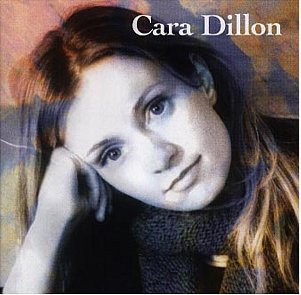
The so-called ''Folk super-group', Equation, always seemed to have got the calculation wrong. Someone in there appeared to be aiming at joining The Corrs in that fusion of pop/folk/Celtic/rock/fashion that ends up as bland as can be for these ears. Thankfully, getting the calculation wrong has provided two happy accidents. Firstly, Kate Rusby quickly decided that she should start a solo career rather than pursue life with Equation. Thanks for that one! Now, we seem to have another talented vocalist striking the right balance.
Cara Dillon, winner of the All Ireland Traditional Singing Trophy at 14, succeeded Ms. Rusby in Equation but left after a year with founder member Sam Lakeman and provides our second happy accident.
Her first self-titled solo album is now released and mainly contains arrangements of traditional songs with a couple of her own compositions in the middle of the record. The selection of traditional songs includes personal favourites such as "Donald of Glencoe" and "I Am A Youth Inclined To Ramble". The opening track, "Black Is The Colour" has also been recorded by fellow Irish vocalist, Niamh Parsons, and makes an interesting point of comparison. Niamh's version is sparser and sung with more traditional gusto in the voice whilst Cara's version relies more on the sweetness of her vocal and a backing of piano, bass and drums to drive the song. Both are excellent in their own way and, so, it comes down to which style you prefer. Indeed, this is how we might view the "Cara Dillon" CD as a whole. The traditional arrangements have had a modern feel applied to them without loosing touch with the tradition. For the purists, this may be too much. For those less inclined to go for the "finger in the ear" approach, this would be an excellent compromise. Without doubt, Cara's vocal is excellent, the backing sympathetic and the choices of songs is sound. The question is simply one of whether it's your style or not.
Steve Henderson
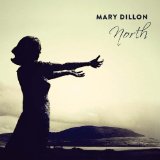
If, like me, you remember the Irish band Déanta from the 1990s, you'll have wondered what happened to their singer. Well, Dillon's spent the past 15 years raising a family and only occasionally visiting a recording studio to lend guest vocals to some of her friends' projects, but now is ready to re-launch her singing career in earnest. You might feel that on the evidence of her comeback recording, this move is not before time, since it's her younger sister Cara who's enjoyed the (not undeserved) limelight of late.
Here, Mary is proud to showcase a diverse collection of (mostly, but not exclusively) traditional songs from her native Ulster, proving herself one of the finest of contemporary interpreters in the process. And what a voice she possesses – gently pure and clear with every word lovingly enunciated. A special feature of her enchanting delivery is the expression of her involvement in the story by the creation and confident use of light and shade – I might usefully single out her wry takes on The Banks Of Claudy and When A Man's In Love on one hand, and her touching a cappella account of the lament Ard Tí Chuain on the other, with a particularly emotional, even angry rendition of The Month Of January also receiving a standout performance here.
Another high point of the album is the stunning cello-bed-bedecked account of the ballad Edward On Lough Erne Shore, while her timely revisit of the poignant, tragic tale of under-age First World War soldier John Condon (from the pen of Sam Starrett, Tracey McRory and Richard Laird) shows ever more depth of understanding and response even than on her landmark 2003 demo recording of the song. Then there's Mary's own composition The Boatman could be taken for traditional, for it definitively proves her keen grasp of the idiom. Another aspect of this thoughtful disc that works so well is the insistence of its co-producer, nephew Odhrán Mullen, on utilising the simplest of settings involving almost the barest minimum of instrumentation – basically any permutation of guitar (Eamon McElholm), fiddle (Clodagh Warnock), whistle (Neil Martin), and flute (Brendan Mulholland), with occasional guests playing mandola, accordion, pipes or bodhrán – and so very effectively too.
The whole album's quite masterly, and although its comparatively undemonstrative nature and aura of delectable quiet elegance may require a touch more listening concentration at times, Dillon's thoughtful performances are destined to haunt you.
David Kidman February 2013
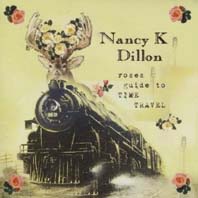
There's no explanation in the press release as to why there's been six years between the Oklaholma singer-songwriter's debut and her apostrophe-challenged sophomore album, so just be grateful that it's finally here.
Featuring contributions from such musicians as Danny Barnes, Gavin Sutherland and Stacy Phillips, as before, it's a desert dust coated brew of bluegrass, folk, honky tonk, blues and country in service of songs about small towns, trains, highways, drifters, loving and losing, leaving and hanging in as, per the title, years pass by.
With a voice somewhere between Nanci Griffith, Judy Collins and the young Lucinda Williams, she opens the album with arguably its strongest song, the weary waltzing, concertina and banjo flecked All The Pretty Americans, an Obama dawn lament for a country's loss of innocence and a hope for its awakening from its sleep.
While the focus may be micro rather than macro, it's a similar theme that informs the album's second standout and catchiest chorus, the penultimate Glory Days, a song about a faded rock star still clinging to memories of the past and hoping for a revival of his fortunes, even though 'songs that used to run now can barely walk'.
Ringing a personal note, drawled and streaked with hillbilly blues and slide guitar, Last Town On The Line stems from the discovery that her grandfather was a trainman working the Missouri-Pacific line, and sets her to wondering if he might have encountered Woody Guthrie riding one of the box cars.
Guthrie's invoked again on No Goodbyes, a tale a verse song about a Kerouac highway odyssey, a senorita shooting her cheating lover and a young man heading out to find fame with his guitar. Death rears its head too in The Ground She Walks On, a folk blues Southern gothic murder ballad ghost story that apparently began life as a tribute to her parents' enduring love. Such are the strange tangents the creative mind can take.
Innocence and experience loom large. The first stirrings of a relationship form the heart of the bluegrassy Desert Song where, to Barnes' banjo backing, the singer and her new beau go dancing down town as, giddy from his flaming gaze, she wonders 'what will go down'.
That's followed immediately by the sprightly hillbilly Looks Like Rain where, with what could be the same couple some years later, she observes that the summer's gone and the storm's bearing down fast. "I want to take off running" she sings, and, as she writes on the thumbnail sleevenotes, themes of escape and redemption are also woven into the sonorous desert blues New Train and the fairground waltzing paean to Portland.
All this and, in the line about how 'a hummingbird has to drink a thousand times a day' amid the romance metaphors of the bluesily soulful Sweet Honey, a lesson in natural history too. A good year for the Roses, then.
www.nancykdillon.net
www.myspace.com/nancykdillon
Mike Davies April 2010
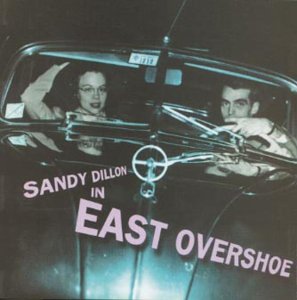
Second album release from this extraordinary young lady whose voice has been described as like Tom Waits on helium gargling on sandpaper… sure, she may sound petulant and wilfully warped, but hey, she can sing! Don't let that earlier description put you off, for this new collection (an admirable sequel to Electric Chair) is a raw and compelling, if disturbing listen. Rather strong stuff lyrically (dark tales of angst, incest and suchlike, if you can make the words out, which ain't always all that easy), and vividly visceral vocals set to weirdly transparent arrangements full of peculiar or home-made instrumental textures, spectral "breath voice" backing vocals, acoustic-bluesy licks ("prepared guitar") and garbage-can percussion to complement Sandy's own Hammond and other keyboard work.
Half-a-dozen other musicians are involved. It all makes for such an unusual sound, it's almost impossible to describe, you just gotta hear it for yourself. Think maybe a bit of Beefheart performed by Pooka or Janis Joplin with a backing band of Harry Partch and some crazed Delta blues musicians on instruments they just knocked up off the backporch, grooving through a demented X-Files soundtrack. I love it to bits, but the health warning is that I reckon you might need an ear for the decidedly oddball to appreciate its glories. Whatever, it's brilliant and absolutely unique - I guarantee you'll never hear anything else like it!
David Kidman
Smithereens singer Pat DiNizio proves that if you've got the tools you can do just about anything. The sheer spread of songs on his latest CD would surely crush a lesser talent. But This Is Pat DiNizio moulds My Funny Valentine, The Beach Boys' Surfer Girl and, rather bizarrely, the Bond theme You Only Live Twice around a voice that is bottomless in its depth and richness. Sixty years ago Pat DiNizio would be challenging the great singers of the day.
This is an album fashioned in the 'classic' style, DiNizio has chosen timeless pieces of music and made them fit him and his style. It's how it used to be done and it makes the familiar sound as fresh and new as the day they were written. But you've got to able to sing them and some these songs have proved beyond many a singer.
As Pat DiNizio uncovers hidden emotions in Wichita Lineman, California Dreaming and Burt Bacharach's This Guy's In Love With You, he is joined by Jay Rowe on piano. The pair turn each song into a shaft of light breaking through the inky blackness, they grab your complete attention and while you're in that cocoon, it feels as if nothing else exists.
The simplicity of the CD's cover, mirrors the simple beauty of the music, when you're this good what need of decoration? This is an album recorded in black and white. This is Pat DiNizio also demonstrates that a classic song, treated with respect and affection will repay you a thousandfold.
Michael Mee, Editor Hawick News, November 2006
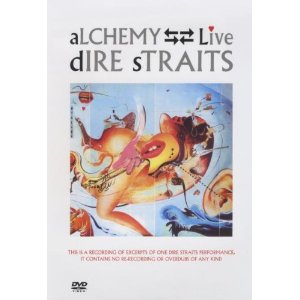
The iconic Dire Straits live album, originally released in double-disc format in March 1984 (and later with accompanying VHS video), went on to spend more than three years in the top album charts, and has since gained a reputation as one of the most revered live recordings of all time. It enshrined for posterity the band's stunning 90-minute performance given at Hammersmith Odeon in July 1983, the set-list for which contained definitive live readings of the hits Sultans Of Swing and Romeo And Juliet alongside album highlights such as Once Upon A Time In The West and Private Investigations, with no fewer than three encores including the Local Hero soundtrack theme Going Home. It's salutary to recall that it predated the equally iconic Brothers In Arms album, but it's probably best celebrated for its marking the band's transition from crack (but modest) pub outfit to savvier rock-stadium band.
This new, eagerly-awaited DVD release of Alchemy Live not only restores the entire concert from the original film stock, remixed in uncompressed stereo (and coming in HD and 5.1 surround sound on the Blu-ray version), but also presents some highly desirable bonus features in the shape of two earlier vintage live TV (Old Grey Whistle Test) performances (Tunnel Of Love and Sultans Of Swing) and a BBC Arena documentary from 1980 containing revealing interview segments and rehearsal footage. The whole splendid caboodle is also available in a deluxe limited edition that also incorporates the original live double CD album. Does it still justify all those decades of critical acclaim, then? Hmm, very probably, I'll admit.
www.direstraits.co.uk
www.markknopfler.com
David Kidman September 2010
Formerly co-founder, songwriter and frontman with the underrated Immaculate Fools, Kevin Weatherill disbanded them in 1997, after the release of their sixth and final album. He then took off to Spain, immersed himself in flamenco and the chant based alalas song of Galicia, mastering the complex guitar rhythms and fusing all this with his love of Delta blues.
Returning to the UK and adopting his current nom de music, he settled in Shropshire, started playing gigs at the Horseshoe Inn near Shrewsbury and, in 2008, met up with Miles Hunt of The Wonder Stuff.
The following year, he showcased three songs on the Hunt-produced Shared project of acoustic songwriters. One of those, the bittersweet The Rain Song, resurfaces here on this debut solo album, with Hunt again behind the desk as well as providing additional bass and guitars and his musical partner Erica Nockalls on violin and piano.
Wayne Hussey's called Ray's guitar playing "choreographed violence" while Hunt says watching him perform is "like being mauled." You can understand what they me when you hear the ferocious Battle of the Goggin, an anti-violence cry to silence the bells of hate that comes with the bitter twist line "the coward kills with kisses". Or, then again, Moon On A Stick, an acoustic guitar slashing number about those who want it all, "the fish not the bait" that largely features him spitting out the title over and over.
The voice, if you've not encountered it before, sounds like he gargles a concoction of unprocessed tobacco, rot gut bourbon and bramble thorns and has scoured the vocal chords with an abrasive rag to produce a burning torn throat cocktail of Dr John, Kevin Coyne and Tom Waits. Indeed, listen to the wonderful Bring Down The Day, which features Spirit Of The West's Geoffrey Kelly on flute, and you could be cruising down the boulevard looking for the heart of Saturday night.
When he's in shouting mode, as on the raw blues title track, it's a frightening proposition. Live, I can't imagine anyone daring to talk during the songs.
Yet, as well as such naked aggression, it's also capable of the crowd rousing stadium folk rock to be found on Mr Darwin or of straining emotion through a gauze of hurt and tenderness on Devil's Dream, a strummed love song that, driven by Knockall's fiddle, harks back to the anthemic ballads of early IM days, or the gently reflective last waltz that is Old Man In Young Man's Shoes.
With lyrics that meld poetic romanticism and frank sexual imagery, intense guitar work and Hunt's dynamic production, it's a highly charged affair that pins your ears to the ground and demands to be heard. The title may refer to his lack of inches in the height department, but when it comes to musical stature the man's a goliath.
www.dirtyray.co.uk
www.myspace.com/dirtyrayweatherill
Mike Davies September 2010
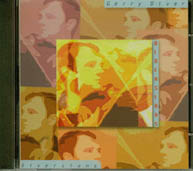
www.gerrydiver.com
go.to/copperplate
David Kidman
The Divine Comedy - Absent Friends (Parlophone)
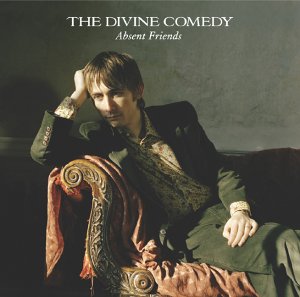
Mike Davies
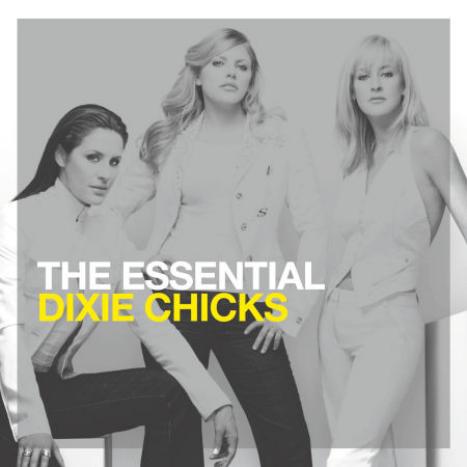
With Martie Maguire and Emily Robison pursuing their Courtyard Hounds project and Natalie Maines still showing no signs of getting back into the recording game, this double album compilation (following surprisingly quickly on the heels of this year's single CD Playlist best of) may well be more an epitaph than a reminder prod to keep the trio's profile visible.
It opens, rather tellingly with 2006's Not Ready To Make Nice, their defiant response to the vilification they received from Redneck America (and by definition the majority of country fans, radio and the Nashville industry) after their comments about Bush and the Gulf War. The Taking The Long Way album from which it came marked the parting of the ways between the trio and the country market, Maguire herself saying they no longer felt the country scene was their home. It was the year's ninth best-selling album and they won all five of the Grammys for which they were nominated, but the sales and votes came from the rock n roll rather than the country audience. It also sold a storm in Europe and Canada.
Having made the point, although it rather rewrites their own history by including nothing from the three albums recorded with Laura Lynch, there's plenty of cuts from the four released with Maines as the lead singer. Indeed, with the compilation including almost 50% of each of the four (working chronologically backwards in bite size chunks), it's almost more interesting to see what was left off rather than what was included.
Released in 1998, Wide Open Spaces was firmly in familiar Nashville territory with debut Country Music Top 10 hit I Can Love You Better and the title track providing the first of a string of #1s. Even their cover of Bonnie Raitt's Give It Up Or Let Me Go had a Western Swing makeover.
Capitalising on their new found 'overnight' success, they swiftly followed up with Fly, an album that spawned eight hit singles and courted both bluegrass (Sin Wagon) and Southern barroom rock n roll (Some Days You Gotta Dance) followings but also spiced up the regulation songs of yearning and heartbreak with a Texan rocking, twangy voiced cover of Dennis Linde's tale of domestic abuse and murder, Goodbye Earl.
Their last before the fall from grace, Home, was their best to date cranking up the bluegrass influence (banjo going crazy on Truth No 2 and White Trash Wedding) and featuring Darrell Scott's Long Time Gone and Bruce Robison's Travellin' Soldier. Although written about the Vietnam war, its sentiments were especially relevant in 2003. It was #1 in the country charts when Maines made her famous remark about Bush and Texas. Within a couple of weeks it had vanished from the chart entirely, marking the last time they would figure in the Top 20.
Which brings things to their last studio album to date, Taking The Long Way. A rockier affair (listen to them fire up on Lubbock Or Leave It) that mixed anger and reflection equally on such contrasting numbers as Everybody Knows and The Long Way Round.
It's a pity they couldn't find space for bonus collectibles such as the unreleased Baby Love or The Neighbor, the single that tied in with the Shut Up And Sing rockumentary, but, closing as tellingly as it opened with the yearningly uplifting I Believe In Love from Home (the only track out of chronological order), whether it marks and end or a new beginning, this is pretty much what it says on the label.
www.dixiechicks.com
www.myspace.com/dixiechicks
Mike Davies November 2010
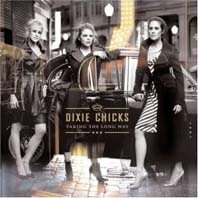
Quite simply, if there is a better album than Taking The Long Way - or a better song than the first single Not Ready To Make Nice - released in 2006 then we are in for a real treat.
There is a simple explanation as to why the Dixie Chicks are the biggest selling female band in musical history, it's because over a decade they have developed into one of the best bands, male or female, in musical history. There is not a note or lyric wasted on Taking The Long Way, each makes its point and is vital to the whole, if this album is the sum of its parts, then those parts are magnificent.
It may be that a certain amount of adversity has taken Natalie Maines, Emily Robison and Marti Maguire to the heights that they would undoubtedly have achieved anyway, that little bit quicker.
That 'adversity' of course occurred because of a remark Maines made in London in 2003, on the Top Of The World tour, regarding George W Bush. It's ironic that 'two long years since the Top Of The World came crashing down' not only would saying that you were ashamed that Bush came from Texas, be greeted with nods and cheers, now you can't see the anti-Bush bandwagon for passengers. Where the Dixie Chicks suffered, others followed at a safe distance.
The consequences were that their records were boycotted on country music radio stations, they were pilloried and even received death threats. It seems that the 'Land of the Free' doesn't extend that freedom to speech. But as you'd expect of three intelligent, articulate, opinionated and strong-willed musicians, they have harnessed that bitter experience and replied in the best possible way with the ultimate 'screw you' condemnation of Not Ready To Make Nice, a song whose lyrics and sentiments are so pointed and sharp. 'With no regrets and I don't mind sayin', It's a sad sad story when a mother will teach her daughter, That she ought to hate a perfect stranger. And how in the world can the words I said, Send somebody so over the edge, That they'd write me a letter, Sayin' I better shut up and sing or my life will be over', are chilling and a salutary lesson that the lunatics haven't just taken over the asylum.
However, while it would be understandable for Taking The Long Way to be a bitter album, it's not. Mad as hell? Definitely but it works just as beautifully on a more superficial level, the Dixie Chicks haven't forgotten the art or grace of harmony, melody or hook.
Once the pent up feeling is released (the band's disaffection with the once-adoring world of country music is emphasised by the CD's front cover where the three are rock chicked up to the nines), the album grows and blossoms into thoughtful, incisive country rock.
Again, experience, has been both a good tutor and source of material for the Dixie Chicks, they have harnessed it to their own burgeoning songwriting talent and, aided by co-writers Dan Wilson and The Jayhawks' Pete Yorn and Gary Louris, have crafted and moulded a set of songs that are, at times so personal, as to border on the uncomfortable. As musicians they are not only brave politically and personally but they expose their own joys and vulnerabilities so completely with Lullaby, So Hard and Silent House.
In the band's own turbulent journey from superstar country band, to Red, White and Blue black sheep, it is testament to a collective strength of will, that it has written and performed an album that is a true rock album. The Dixie Chicks is now a true and important rock band, not simply a country band testing the waters.
Given the last two years and the power of the establishment, it would have been understandable for there to be some kind of peace offering on Taking The Long Way, not a bit of it, this is an album recorded from the strength of facing down the critics. The group has become immeasurably stronger and it is likely it will continue to do so.
Taking The Long Way may be the first steps on a new path for Maines, Robison and Maguire but they haven't forgotten the music that got them to this point. The three are supremely talented and they have a conscience, on Taking The Long Way it makes for an unbreakable combination.
Michael Mee, June 2006
Every now and again a record comes your way that, unlike many from a new outfit, is brimful of memorable melodies, insistent hooks, feisty playing and lyrics with a tale to tell. One such record is No Xcuses, by newcomers D-n-K. Slipping into grammatical correctness for a second, D and K are Dan Insley and Keith Waterfield, a couple of songwriters who have produced an album of 10 strong, varied songs. While Waterfield sings and guitars, and Insley's piano playing is a key element throughout, a strength of this collection is the calibre of friends that lend a hand at points across the album.
The rhythm section is led by the always inventive drumming of Grammy-winning Jef Van Veen. Ace session bassist Julian Bury proves an excellent foil, and the pair provide a solid footing all over the album. Phil Beer's work with Show of Hands has long been admired, and his fiddle playing on Between the Ties is masterful - lifting, embellishing, and adding unexpected texture that weaves a tasteful backdrop to the vocals and refrain. Voice in a Crowd gives Geoff Whitehorn the opportunity to flex his wailing guitar muscle. His years of experience, working most recently with Procol Harum and Elkie Brooks, give the song an almighty kick in the rear end. Heroes' Grass is Green poignantly marks the sacrifices of generations of young soldiers lost in the last and current centuries – from the fields of Flanders and on to Helmand – the song boasts a melody that's guaranteed to stay with the listener. This was the first D-n-K track to get a public airing with a download release to mark November 2008's Remembrance Sunday; all profits went and continue to go to the Help for Heroes charity for fallen soldiers. Lost and Found is a slow burner of a song, with personal undercurrents, that builds and builds as successive instrumentation is layered on to the rhythm foundation.
For the rest, the album offers a mix of styles, including one track, Summertime, sung by guest Alicia Banton, that could find a chart placing in the hands of one of today's pop princesses. So, there we have it - an album of light, shade and a rainbow spread of colours that's sure to please, if not the eye, then certainly the ear of anybody who appreciates a good collection of songs well sung, and played with assurance.
Fred Hall April 2009
Allen Dobb - Bottomland (Skipping Stone)
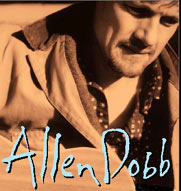
More Steve Earle than Garth Brooks, though there’s traces of both in the much travelled Alberta born singer-songwriter. You might also detect the influences of WayIon, Gordon Lightfoot (whose songs he started out singing) and Springsteen in Dobbs' gravelly voiced muscular guitar country. His songs, as you might gather from the title, are rooted in the dusty landscapes and prairies where there’s stones in the fields (Rock To Pick) and ‘the water rises it don’t give a damn’ (Bottomland), populated by characters trying to keep their hearts from hardening too much when faced with their broken dreams and empty hopes. You’ll find Della the two step queen with her neon blue soul and "the dress like Mrs Gene Autry wore right after the Second World War" in the semi-spoken cracked love in waiting Beer Bottle Chandelier, or ‘that ole hayseed Jimmy Roy’ who ‘taught Elvis all his moves’ and is now the hippest cat in Hollywood. On Like An Angel there’s stories of working in the frozen oil rigs of Alberta and melting in the heat of Sonora while The Big Wide Open finds him back home in his little town with the moon and stars but thinking about heading southwest. There’s a wanderer’s restlessness evident in the songs. perfectly summed up by Road Song For A Sailor, but they’re also about putting down roots (Bellingham Rain) and not, like the guy killed in a car crash on his way home to reconcile with his family in The Ballad of Willie Holmes, leaving things until they’re too late. It’s solid stuff, the taste of life on its tongue.
Mike Davies
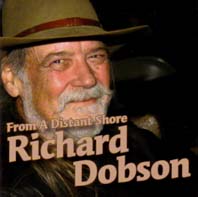
From A Distant Shore is this Texan's twelfth recording for the Swiss based imprint, Brambus. The latter land-locked European country is where Dobson has made his home for a number of years now, with his Swiss born wife Edith. This album was recorded at Thomm Jutz studio in Nashville. It's their sixth collaboration, the first four were recorded while Jutz still resided in his native Germany.
This collection – according to Dobson it's his twentieth recording, although I can only figure on nineteen albums – opens with the urgently paced road song Long Haul Hard Travelling Man. Doubling as an ode to love, the highway also appears as a theme in the ensuing The Old Wild Country. Windows Of The Soul is a ballad paced ode to "the love-light in your eyes" which the narrator compares to "Like fire on the mountain, like stars that fill the skies." Propelled by a happy-go-lucky melody, A Little Behind My Shoes is a humorous take on the narrator's efforts to avoid stumbling through his life.
Having alluded earlier to Dobson's Swiss domicile, the focus in It's Been The Way Forever is a local river, and the closing verse opens with "People come and people go with their languages and religions, Celt and Roman, Alemanni with their stories, Saints and visions. From A Distant Shore features a couple of co-writes with Nashville based scribes, Winners with Charley Stef and Let Tomorrow Come with John Hadley. At one stage the latter song scribe was an art professor at University of Oklahoma, and has collaborated with Kevin Welch, Kieran Kane and David Olney. Winners urges the listener to live and love 24/7 and it don't matter who you step on if that is what it takes, while Let Tomorrow Come is a gently paced love song.
The title Let's Talk Trash is something of a giveaway, and therein Dobson focuses with a sly wink on the bumps in the life of a songwriter and performing musician, while That Was Then And This Is Now finds the narrator reminisce about his early years - of course you remember them, those grand old days! In the penultimate cut The Old Rhythm Rebel a family man, who now walks the straight and narrow, recalls his previous life as a road weary touring musician and also the period he spent behind bars following "a certain loss of judgement. Another reflection on the narrator's past life, the album closes with the title track. 7 out of 10
Arthur Wood, Kerrville Kronikles April 2009
Born in Tyler, Texas, but moved around (mostly with his family) for some years thereafter (Holland, New Mexico), troubadour Richard ended up in Nashville in the early 70s, where he enjoyed the privilege of one of his early songs being covered by Guy Clark (he was later to co-write Old Friends with Guy and several other songs with Guy's wife Susanna). After an itinerant life for a decade or more, during which he cut his first albums, he returned to Nashville. Nanci Griffith covered a song of Richard's on her 1986 Once In A Very Blue Moon album, and referred to him as "the Hemingway of country music" (quite a claim that!), apparently on account of the quality of rough-hewn literacy in his writing. Musically too, his mode is country with a dash of much else but usually with a touch of wry humour too (Bob Cheevers fans will warm to Richard I feel sure, tho' Richard lacks that last degree of salaciousness!). Latterly making his home in Switzerland, Richard carried on writing and releasing records - on the Swiss label Brambus, which may explain why he's not a well-known name in the UK. Whatever, his down-to-earth writing style (much in the mould of Townes Van Zandt, it must be admitted) and solid musicianship would have been enough to endear him to Americana fans here and in the US - but somehow that doesn't seem to have happened, and On Thistledown Wind, his ninth album for Brambus (and 16th overall!) will probably end up being largely overlooked, which would be a pity for it contains some decidedly strong writing, honest and open-hearted almost to a fault. The title track is a wistful and beautifully evocative summer's day reflection, while Down Along The Reeperbahn shows the other side of the coin with a quite different depiction of sense of place and associative nostalgia. The Ballad Of Harpoon Barry is just one of those true-life character-narratives Richard does so well, while catchy uptempo songs like Scissortail Bird and the folky-cajun lilt of Slave To The Restless Wind really do make you wonder why you've not come across Richard's music before. And the closing track, New Morning Song, is an extraordinary piece: Richard sets a Tibetan Buddhist mantra to a gospel-style chant sequence, complete with whining pedal-steel backing (by guest fats Kaplin no less). Richard's support cast includes other notable musicians too, in the shape of Thomm Jutz, Mark "Sergio" Webb, LeAnn Etheridge and Pat McInerney, with David Olney and Catherine Craig making cameo appearances as well. This album, and no doubt many if not all of its predecessors too, is worth your time, for Richard has much to offer to the devotee of quality rootsy Americana songwriting.
David Kidman December 2007
A brand new Celtic all-girl quintet, calling themselves Dòchas, came out from the Highlands and Islands in 2002 and conquered all-comers on the Scottish traditional music scene with their abundantly satisfying eponymous debut album. They had so much in their favour that they could be relied upon to produce something different from the run-of-the-mill Celtic bands: immense versatility on a large number of instruments, and two singers with voices to die for. You'll already have noticed Julie Fowlis, whose exquisite singing scooped her the coveted title of Gaelic Singer Of The Year at the 2005 Scots Trad Music Awards and now this year's Horizon Award at the BBC Radio 2 Folk Awards as well! Julie's also an expert whistle player, and no slouch on the oboe or pipes either, but her four musical partners are equals in every respect, with complementary talents: Kathleen Boyle on accordion, guitar and keyboards, Carol-Anne MacKay on pipes, accordion and whistle, Eilidh MacLeod on clarsach and Jenna Reid on fiddle and piano. As if all that girl-power wasn't enough, they've now recruited bodhrán player Martin O'Neill to the lineup, in time to record this, the band's second CD.
Fine though their debut was, The Second Glance strides even further ahead - not exactly in terms of overall classiness and total excellence of recording (for it just maintains the already very high standard), but in the sheer dazzling variety of repertoire, tempo, mood and texture on display. Dòchas's musicianly skills are sealed with an unerring ear for balance with what can be rather difficult instruments to combine and blend effectively within a group sound (in this respect they seem to have picked up some tricks from the Battlefield Band, I feel), but that's not the whole story by any means, for their status is lifted even higher by the stunning performances of their two vocalists Julie and Jenna. For one thing, I'm sure I've never heard a more showstopping performance of a set of puirt a beul than track 9 here - Julie's control of line and diction is utterly - er, breathtaking (how does she breathe?!); then again, I don't think I've heard a more fetching rendition of the hoary old Burns song Ae Fond Kiss, with which Jenna closes the CD as a beautifully co-ordinated counterpart to Julie's singing of the poignant love song I Ho Ro 'S Na Hug Oro Eile. The fact that all of the five vocal tracks (with the exception of the Burns) are sung in Gaelic proves no barrier at all to appreciation; I'm so glad that Dòchas feel no need to compromise. Now, in highlighting superlative singing I wouldn't wish to undersell the considerable individual and combined talents of Dòchas in the purely instrumental music; the seven sets on this CD feature some sparkling and lively playing throughout, equally adept on the storming, driving faster tunes, the lyrical slow airs and the stirring marches. The use of piano is delectably musical and responsive, anything but the clumping plod you can so easily get when it's used within an already full-bodied ensemble sound, while the distinctive rippling tone of the clarsach cuts through the texture so well (Eilidh's handling of Dougie Hunter's Sileas is pretty magical) and Jenna's distinctive Shetland fiddle lifts the already lively tenor of each selection on which it appears. Picking highlights from such a consistently fine CD is a hard task, but I specially enjoyed the opening set of pipe jigs and the scintillating Dinny's Set. It's no wonder, then, that Dòchas, having already taken the Scottish traditional scene by storm, are hotly tipped to make a similar mark on the wider folk ambit any time now; they really do seem to have everything going for them. So if the band aren't currently touring anywhere near you, do make the effort to obtain this exceptional CD and I can guarantee it'll become a fixture on your CD player; it's certainly one of the best traditional-based albums I've heard this year.
David Kidman
For those readers not in the (time-) loop, Doctor Socrates is a locally-much-renowned quartet of Newcastle roots-rockers. Here they demonstrate considerable ingenuity in assembling for our edification a concept album that affords us an exhilarating (if in the end quite exhausting!) hour-long trip through time in their five-inch-square Tardis. The good Doctor's mission is to express indigenous folk music of his native north-east in a variety of styles while keeping the songs' essential spirit intact - and I do believe his band has largely succeeded. The concept cannily brings together strictly traditional sources and classic recent songwriting with a healthy quotient of self-penned material (courtesy of lead vocalist/guitarist Phil Kitchen), and moves easily through the ages in an admirably chronological sequence.
The disc opens with a stirring unaccompanied rendition of the dialect song Sair Fyel'd Hinny, a typically depressing rumination on mortality, before launching headlong into the tale of a Border Reiver hero Jock O' The Side, one of several tracks which have much of the feel of the gutsy Blyth Power brand of folk-rock (never a bad thing!). Moving on to timeline 1640, the first of the album's originals, The Battle, takes the perspective of an unwilling conscript at Newburn, the only major battle to be fought on Tyneside; giving the album a satisfying symmetry, this song is bookended by the desperately blues-inflected The Ballad Of Johnny Armstrong, which draws its totally relevant parallel in recounting the tale of one of the working-class poor who are as always being used by those in power to fight their battles. A suitably rumbustious canter through the satirical Cam Ye O'er Frae France is contrasted by a passionately delivered fragment of the press-gang song Captain Bover, to which is appended a perhaps overly jaunty, jazzy take on Here's The Tender Coming that even features a mild outbreak of cheery whistling! The old chestnut Buy Broom Buzzems then gets the full "18th century pop chart hit" treatment and emerges virtually unscathed.
After this, we get a sequence of mining songs, prefaced by a powerful spoken-word piece based on a contemporary news report of the 1815 Heaton Pit Disaster (with delicately managed guitar backdrop courtesy of band member John Dowsett). Alongside the inevitable Blackleg Miner (well above the purely workmanlike), there's the spirited musical dialogue between The Coal Owner And The Pitman's Wife (here represented by Phil and Lynn Dowsett), a brace of songs by pit-poet Tommy Armstrong and a banjo-led take on Byker Hill that in its effort to rock out rather misses the anthemic point of the song. Between these is sandwiched Sarah Charlton's Lament, brilliantly characterised by Wendy Saint, which tenderly yet harrowingly portrays the plight of a woman working in the Northumberland Leadworks.
The disc closes with three of its best tracks: Take It, It's Yours (a caustic scattergun critique of life in post-industrial Newcastle), Archie And Them (a poignant modern narrative telling of an old man whose home was cruelly demolished with a redevelopment scheme, which is done traditional-style and interspersed Radio-Ballad-style with sampled snatches of interviews with Archie's neighbours), and an inventive rap-style update (by Kenny Masters) of Louis MacNeice's poem Bagpipe Music which develops into a justified rant on contemporary society. First playthrough of the whole album in one sitting gives a momentary impression of unevenness, but a swift return brings dividends and an equally swift realisation of the project's unity and integrity of purpose. The basic musical delivery may seem a tad ramshackle at times, but I really like that - and anyway, there's no question that Doc Soc's hearts (and heads and voices!) are all very much in the right place. And Time Travelling fairly immediately reveals itself as a dynamic and very persuasive release.
David Kidman August 2010
This Hampshire-based outfit has been around for a good ten years now, honing its act to a fine art through constant live performance and gathering themselves a fanatically loyal following in the process. And yet this twelve-tracker album's their debut recording!
Who are these guys then? - Mike Hammond on lead guitar and banjo, Aly Hirji on rhythm guitar and mandolin, Mark Kermode on double bass, harmonica and accordion, Alex Hammond on snare, washboard and percussion. Each one of 'em a keen and accomplished musician with a clear respect both for his fellow-Dodgers and the musical territory they've chosen to make their home. Their tightly-knit yet affectionately loosely-driven brand of roots-Americana is a compulsive one alright, and I can't see anyone resisting tapping their feet or bopping about to this gloriously authentic-feeling mix of rock'n'roll, rockabilly, boogie, skiffle, country and blues. The band's fresh and lean sound borrows heavily from the vintage Sam Phillips/Sun era recordings (OK you could call it refreshingly retro if you like), and it conveys that edgy drive that marked out so many of those primitive standards. And while there's also all manner of knowing nods to established genre classics (including sly paraphrases and lyric-checks here and there), the whole caboodle just feels like a great trip to the hop or the drive-in.
Typically purveying songs of hard-drinkin', hard-lovin', hard-livin' and hard-dyin', The Dodge Brothers are masters of their game, whether on uptempo stompers like Brimstone Blues, the gleeful ragtime-banjo skiffle of 42 Days, the just-this-side-of-lonesome Ballad Of Frank Harris and the epic Dying Ranger (both featuring guest Linda Ruth Williams on autoharp), and the more reflective backporch of I Don't Want You To Go (one of three cuts to feature William J. Lunn guesting on vocal). Even the rowdy-house morning-after ribaldry of Died And Gone To Hell retains a measure of control.
Bullseye! For total-quality Revival Americana sure don't come any better than this. I luv it - brilliant!
David Kidman October 2009
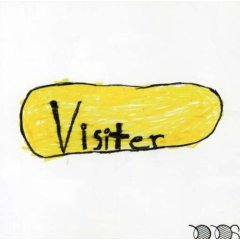
Hailing from San Francisco and playing psychedelic folk pop, drummer Logan Kroeber and songwriter-guitarist Meric Long might well be described as a folk version of The White Stripes. Indeed, they certainly share the same Led Zep influences, as readily demonstrated by Joe's Waltz. But listen to Kroeber's inventive percussion, often sounding like tribal rhythms, on the likes of Ashley, Winter Fools and The Seasons and you'll also hear early Tyrannosaurus Rex while Long's guitar work on God? and Paint The Rust calls to mind vintage John Fahey, at least until it takes off into swampy slide guitar sonics.
Walking comes dappled with country banjo and female harmonies, Red And Purple a Latin flavoured swayer with Kroeber skittering rimshots while Jodi builds from crystal water guitar figures to thundering tumbling clatter. They make a hell of a noise for an acoustic duo and you certainly won't find anyone else doing what they're doing.
www.dodosmusic.net
www.myspace.com/thedodos
Mike Davies June 2008
The Scottish folk-roots duo Doghouse Roses, comprising guitarist Paul Tasker and singer Iona Macdonald, have been around the scene for close on five years now, having so far released two plainly self-styled "folk-blues" EPs and one well-received full-length CD (2008's How've You Been All This Time?).
On the latter-mentioned, they were augmented by the talents of six guest musicians, but sparingly. And similarly, for their second full-lengther, where in spite of utilising four extra musicians (these including album producer Alan Scobie, who'd also played on the first album), textures remain significantly pared down, with a welcome sense of cool understatement and "less is more" to the proceedings. Once again the emphasis is firmly on own-compositions, with all tracks credited jointly to Paul and Iona, and although their romantic "tales of redemption, desperation and hell-raising" tend to speak for themselves it would have been nice to have at least a bare minimum of background information (if not the lyrics) somewhere in the foldout package.
Iona's singing is forthright yet duskily plaintive, and stylistically, while not at all derivative, veers between her admitted influences; there's some Fotheringay-era Sandy Denny (the gently rolling Evermore), with shades of a deeper Jacqui McShee perhaps (Survival) and Gillian Welch (especially on Blue Moon On The Mountain, which betrays an even more pronounced parallel in the Rawlings-like picking that accompanies her). Paul's guitar work is refreshingly minimal in its poetic expression, and, while evidently inspired by Bert Jansch, has an organic intensity that well complements the shadings and dynamics of Iona's vocal expressiveness.
This is one of those significantly accomplished records about which it's difficult to say a lot that's meaningful without giving too much away – and thus speaks best to the listener when saddled with a bare minimum of critical reference or depiction (or interference!).
If I tried to describe the music as Americana-tinged folk with acoustic-contemporary overtones, I'd be missing some aspect out – for Doghouse Roses seem to encompass most of those angles at some juncture. And yet by the end of the twelve-track sequence, there's also a sense of elusiveness, of mildly unfinished business: it's rather as if Paul and Iona have vanished mid-flight yet they had plenty more to say.
Even so, this is definitely a CD well worth tracking down - and savouring at leisure, for although much of its contents has an instant impact it may still not reveal all its skilled subtleties too immediately.
David Kidman September 2010
This has proved a difficult CD to review - even though I've lived with it for a few months now and, in order to be entirely fair, have deliberately returned to it afresh every so often. And yet… even though I enjoy Katie's music just fine on each replay (albeit with one or two technical reservations, of which more in due course), and there's nothing at all radically awry with either the performances, presentation or (excellent) recording, for some unaccountable reason it persistently fails to make enough of a significant lasting impression on me. The press release comes prominently endorsed with the legend "Steeped in the tradition, destined for the future". Yes, Katie clearly has talent, and she's already amassed an impressive CV in the "tradition" of today's young performers (Master's Degree, membership of the Nu Routes showcase tour and working with Kathryn Tickell); and equally clearly, she has a future. Her debut CD seems to be attempting to present Katie as an engaging and accessible performer somewhat in the mould of Kate Rusby & Bill Jones, taking inspiration from the tradition yet writing and creating her own material. She's certainly a skilled and confident singer and pianist, and her songwriting is appealing if perhaps not (yet?) especially distinctive. On Bridges, Katie's ably backed by an array of really good young musicians: Ian Stephenson (guitar, double bass), Calum Stewart (whistles, flute, uilleann pipes), Shona Mooney and Olivia Ross (fiddle and viola), Julian Batten (piano accordion) and Martin Douglas (percussion). The disc's eleven tracks consist of six of Katie's original compositions, one trad-inspired, one trad-arr, one Burns setting, Nancy Kerr's Port And Brandy, and - somewhat uncomfortably rounding off the disc - a frenetic throwaway cover of the blues chestnut Sitting On Top Of The World (complete with gimmick retro-scratchy intro). Taking each individual track in isolation, Katie's songs make a reasonable impression (for the simplicity of their language and expression and their appealing and pleasingly managed instrumental backdrop) - but the cumulative effect over a whole album, varied though she makes the arrangements, somehow proves less satisfying. And, although Katie's singing has an appealing use of phrasing and attractive timbre, she does exhibit a particular vocal mannerism - a tendency to an automatic decorative leap to the higher register - that soon becomes rather wearing on repeated exposure. There is a lot to like (and admire) about Katie's music-making, sure, but I honestly can't go along with the hype that proclaims that Katie "looks set to stake her place amongst the elite".
David Kidman February 2008
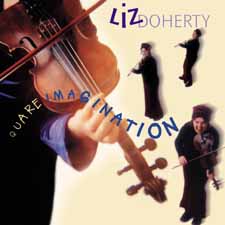
Exuberant Donegal fiddler Liz follows up her earlier brace of joyous albums on the Footstompin' label with this new outing on which she presents a selection of tunes that are in some respect genuinely "quare" (the Ulster parlance for "good", "nice", and/or "odd/strange", depending on context). Indeed, the term could also be applied to the arrangements, specifically with regard to the often highly imaginative way in which instrumental colours are used within the framework of the tune-set; the clue is supplied by a glance at the list of guest musicians Liz has imported for this recording – among them Tony McManus and Sarah Roberts (guitars), Daniel Lapp (trumpet and fiddle), Manus Lunny (bouzouki etc.), John Joe Kelly (bodhrán), Eilidh Shaw (fiddle), Gerry O'Connor (banjo) and Ryan MacNeil (piano). The blend of Ryan's typically forthright Cape Breton piano style with Liz's perennially energetic playing is irresistible (the central Gally Canter set of jigs being a case in point), and the extra special delicacy of momentum achieved by the backing of Sarah's guitar and Gerry's mandolin on the ensuing barndances is charmingly infectious. . Moments of relative repose, such as the closing "end of the long day" air on which Liz is backed by just a second fiddle and viola, prove enchanting. The arrangements are busy and deceptively full, sufficiently so to remain interesting over a wide range of tunes (mostly newish compositions) from a variety of original sources (Ireland, Scotland and Canada), and only that for Jennifer Wrigley's Ba' Rag feels slightly overcooked maybe. Of course, the focus is always firmly on Liz's enervating fiddling, and the skilled maturity with which she keeps things moving is always breathtaking yet without ever losing the plot. The evident pure joy in her music making is the overriding feature of this release, which should appeal greatly to those whose ears have become jaded by excessive exposure to indifferent diddling at sessions and the like; herein is the real spirit of the best of sessions, with the easy accomplishment of the gifted player to carry it off.
David Kidman
Malcolm John Rebennack (alias Dr. John Creaux the Night Tripper) has for well over 40 years been a prime ambassador for the musical culture of his native New Orleans, and was a key force in helping to rebuild its local musical community after the disastrous events of August last year. This primer-compilation serves as a more than reasonable introduction to the man's talents, though in truth it can do no more than scratch the surface of his multifarious accomplishments. It chronicles within the space of just over 67 minutes Dr. John's post-teenage years, where he followed a prolific, if hectic, apprenticeship in session work with music of a more individual bent. This took the form of a progression from sinister voodoo high-priest (three sufficiently representative cuts from the eerie Gris-Gris, although curiously not the album's nightmarish standout cut I Walk On Gilded Splinters) through the more confused, ostensibly multi-directional Babylon (represented by just one cut, Barefoot Lady), Remedies (yielding only Loop Garoo here), and The Sun, Moon & Herbs (Craney Crow) to the basic rock'n'roll roots music of Mac's youth on Gumbo (here represented by three cuts including the commercially-successful Iko, Iko). After this return to relative orthodoxy, the Toussaint-produced albums In The Right Place and Desitively Bonaroo, which featured Allen's "house band" The Meters, melded ultra-tight funk with Mac's accomplished eccentricity and are commonly regarded as Dr. John's finest hours in the studio; certainly their forward-looking, muscular take on disco created something quite special, and this compilation generously gives us three decent tracks from the former and two from the latter of those albums. After those successes, Dr. John's career flourished with mainstream success in the late-70s and 80s, although no tracks from these years appear on this anthology, which only picks up the trail again on a tedious track from the 1989 torch-song collection In A Sentimental Mood that co-features Rickie Lee Jones. The remaining three cuts are taken from 1992's Goin' Down To New Orleans, an album on which the good Doctor rejuvenated himself with an ambitious project that conjured up various ghosts in the context of an enormous variety of memoirs from his city's rich musical heritage. As an introduction, this is a good selection, but perhaps one or two substitutions might have made it even better!
David Kidman
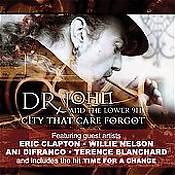
There have been many songs written in homage to New Orleans following the aftermath of Hurricane Katrina but one of the city's favourite sons has released an album full of them. Dr John is a true veteran of the music business and it has taken this tragedy to stir the passions and produce some of his best music for some time.
The mid-paced funk of Keep On Goin' has the good Dr's familiar drawl and is laid back in the extreme. Time For A Change features Eric Clapton and Willie Nelson pops up on the Gospel style Promises Promises. Both songs are enhanced by the guest appearances but the spotlight is left to the main man. He opens You Might Be Surprised with the line "Life is a near death experience" and I couldn't agree more. He delivers this message in his own inimitable style and you just sense that underlying feeling of caustic wit in everything that he does. Dream Warrior is a slow groover with a deep bass line - so smooth.
The funky Black Gold brings a true New Orleans feel to the proceedings and there is more funk on offer with We Getting' There, on which Terence Blanchard guests. Stripped Away grinds away with grungy guitar from Eric Clapton. It is a very punchy and upbeat song and one of the best on offer. Say Whut? Continues the grind but it is slowed down this time. He doesn't hold his punches as his political leanings come to the surface. My People Need A Second Line is more conventional and sweetly soulful. This breaks into true New Orleans jazz from James Andrews and Trombone Shorty with about 2 minutes to go. He is becoming more angry and political and Land Grab has a sense of release with its soaring trumpet. The title track is very easy going but don't let that fool you, this is a very serious song! The guest appearances by Eric Clapton, again, and Ani DiFranco give it that gravitas. There is a touch of Creole with Terence Simien to finish with on Save Our Wetlands.
This is an album to make you think.
www.drjohn.org
www.cookingvinyl.com
David Blue June 2008
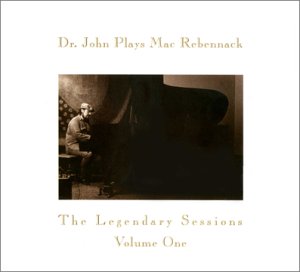
Legendary yessiree. The latest incarnation of one of the Good Doctor's finest ever albums boasts no less than four additional bonus tracks (that's even on top of the three that graced the very first CD issue of the album), bringing the total playing time up to some 71 minutes. Cleanly remastered too, with not a trace of the distortion that marred the vinyl issue. A feast indeed. It's just Mac and his piano, on a set that ranges from standards to boogie to mood pieces, from own compositions to traditional, from Careless Love to Honey Dripper to New Island Midnight to a rollin' Silent Night. Versatile to the last, with every note, trill and frill precisely fingered, but infused with all that true gumbo feeling that only deep immersion in the idiom can bring and which Mac possesses in spades. His communion with those 88 keys is impeccable, complete and very very special, with a perennially impressive command of dynamics and expressive nuance that you might not think achievable with a simple keyboard instrument. Groove along effortlessly with Mac on these uniformly stylish, vital, truly timeless and yes, beautiful performances, benchmarks of interpretation each and every one, that are guaranteed to bring a smile to your face. Then look forward with me to the appearance soon of volume 2 (The Brightest Smile In Town), which will complete the re-release of these landmark 1981 sessions.
David Kidman
Joe Dolan - Make Me An Island (Castle)
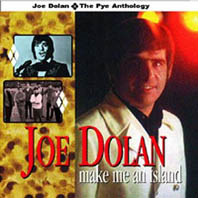
Sad confession time. Back in my formative years, I have to own up to being particularly fond of the big drama title track to this 2 disc twenty years anthology of the Irish showband balladeer's Pye recordings. And, what's worse, hearing it again, not only do I not find myself in any way contrite, but I'm even joining in with his other best known belters, Teresa and You're Such A Good Looking Woman.
Elsewhere, it's the sort of pre Daniel O'Donnell pure corn Irish country pop karaoke to be found on jukeboxes across the Emerald isle as Dolan turns his churn em out charm on everything from Love Of The Common People, Saturday Night At The Movies (well he did front The Drifters showband) and Proud Mary to Bridge Over Troubled Water, My Way, Unchained Melody and, oh dear, Love Grows (Where My Rosemary Goes). Oh yeh, Danny Boy's in there too and there's something called Aching Breaking Heart which has nothing to do with THAT song.
Ireland's most successful pop singer ever, no really, I'm not going to make any claims for artistic integrity or classic historical status in need of reappraisal, but really if you just want to order in a crate of Guinness, fry up the potato cakes and have an old fashioned irony free Irish pub singalong evening then you can't do much better than this. Be careful, you might even want to track down a copy of Joe's 90s featuring his versions of songs by Suede, Pulp, Blur and Radiohead too.
Mike Davies
Former lead guitarist and founder member of the cult 80s band The Godfathers, Kris Dollimore has taken some time to release his debut solo album. Since leaving The Godfathers in 1990 he has certainly diversified, playing with those such as Adam Ant, The Damned, Del Amitri and country-rock singer Eileen Rose.
02/01/1978 is the result of Dollimore's abandonment of session playing to concentrate on writing. Inspired by the blues of John Lee Hooker, Mississippi Fred McDowell and Robert Johnson he has produced an album of highly original songs. Opening with Groundhog, a jangly John Lee Hooker blues with thumping drums from Wolf Howard, Dollimore leads us off into his world. Brother Ray is an acoustic blues and a foot-stomper to boot. His frenetic guitar crosses over into mountain music at times and this sets the standard of guitar playing for the rest of the album. Dollimore continues in the acoustic vein with The Enemy. This incorporates slide guitar and keeps both the standard and the pace up. Miss Emma Jane is a storming blues that is on the rock side and played in a Rory Gallagher style. He goes all broody on Loved Up Blues and listen to the lyrics here because in many cases, it can be very true.
The interestingly titled The North Kent Post Industrial Hillstomp Blues is a modern blues shouter, nothing more, nothing less. The next one, Take What's Mine, is a plodding blues that is surprisingly hypnotic and he goes back to acoustic for the country blues of Cry For Me. One small gripe with this is that there isn't enough edge, something that the rest of the album has in heaps. The John Lee Hooker influenced Caned is a return to form and the gentle acoustic blues rock of Rollin' Stone takes us on another journey. T.V. Eye, co-written by Iggy Pop, is another blues influenced rocker and the closing track, East Of England is a slow acoustic finish that runs for over 6 minutes and is the perfect end to this first solo album. I hope that it won't be too long until the follow up.
David Blue February 2007
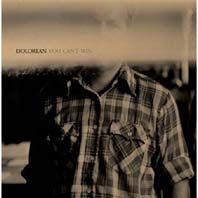
It's a couple of years since singer-songwriter Al James and his Oregon crew released Violence In The Snow Fields, an album drenched in melancholic meditations on faith and redemption, filtered through the influences of Neil Young, The Band and Townes Van Zandt. Things haven't lightened up much in the interim, Adams admitting he was in a 'dark place', broke, ungrounded and suffering relationship break downs, when he was working on the album. However, he also says that during the process he came out the other side, shedding frustration for the satisfaction of work, music and an understanding of love's complexity.
He also decided to approach the recording with more spontaneity ,booking three shows and going into the studio for the weekend between the second and third, the band unfamiliar with the new material and trying out different arrangements on the hoof to give it an edge. Indeed, the title track winds up a mantra of just those three words over an electronic buzz and muted percussion and organ.
The result's raw and imperfect, but there's an open honesty to songs like the lovely simple piano based We Winter Wrens, the lonesome Beachcomber Blues with its mournful electric guitar, country drowning miseries slow loper What One Bottle Can Do and the Gram meets Giant Sand desert waltzing In Love With The Doubt. An achingly ruminative worthy follow up, with a clutch of real stand out tracks, most notably the regret hued wistfulness of Heather, Remind Me How This Ends (a song McCartney might well relate to), making it a fine companion to romantic solitude.
Mike Davies May 2007
Dolorean - Violence In The Snowy Fields (Yep Roc)
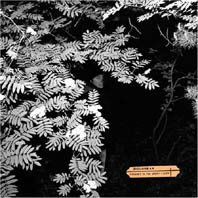
While you can't help but think of Leonard Cohen's The Partisan when you hear the guitar melody on Put You To Sleep, the second full length album from the Oregon outfit headed up by singer-songwriter Al James is generally much more indebted to the influences of Young, Parsons, Townes Van Zandt and The Band. Though opening with the two-step lope-along The Search, the album's more prevalent tone is intimate and hushed, Jones's sorrowful ache of a voice complemented by acoustic guitars and brushed percussion, occasionally rising to a crescendo as on The Righteous Shall Destroy the Precious though even that dies on a fading lonesome whistle.
Lyrically it's not the most immediately sunniest of listens, My Grey Life (Second Chances) a bitter break up number while Dying In Time is a pledge of love on which the singer wishes they could die at the same time. However, while gloomy prospects may inform Jones's perspectives, salvation and redemption still inform his outlook, To Destruction finds places along the way where rest and comfort can be found while the Young-like title track hymn to personal steadfastness finds faith and meaning even in the apparent bleakness and that 'all things shall be revealed.' "I'm holding on to anything" he sings on the six minute slow waltz Holding On, acknowledging that the fall may be greater as a result but seeking the moments of comfort while they last.
Mike Davies

Sterns Records tend to be known for their expertise in African music as well as their rather wonderful shop servicing all world music needs. When their own releases have deviated from their African strengths, I've not always been that impressed. So, it's great to be flagging up a rather tasty release that has emerged over the summer.
A Spanish friend of mine has a long held ambition to visit Recife in North Eastern Brazil to sample the varied rhythms of the area. Given the beats heard on 'Contraditório', I'm hardly surprised. ere, DJ Dolores with Orchestra Santa Massa pulls together a real musical soup with rabeca (the local traditional violin), rock guitar, percussion of all sorts, samples, scratching and traditional vocals. It's dance music but not as we know it, Jim. This is certainly not for the faint hearted or even those who consider themselves at the cutting edge because they listen to the latest dance beats. It's hard to describe – as is the best music, of course.
Just imagine something like Fat Boy Slim meets Lee 'Scratch' Perry for one too many on a night out in one of Brazil's finest clubs. Probably destined to be a record that inspires rather than sells. Take it from me, it will astonish.
Steve Henderson
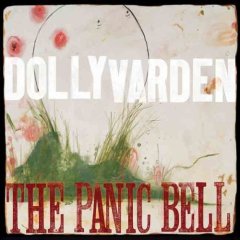
Within the dynamic of the group, the Diane Christiansen/ Steve Dawson axis has always been its strongest component. The husband and wife pair have not only been the voices but the face and backbone of Dolly Varden, it may have been unintentional but it was true, until now.
Whether the release by the duo of their Duets album has freed them and the band is a question only they can answer but the result is that The Panic Bell is a true band album and the stronger because of it.
Anyone who has seen DV perform on one of its many visits will know that just beneath the folk/Americana harmonies and melodies that were the band's trademarks, there lurked a rock band. Now the irascibility of the fish that gave the band its name has broken through, Dolly Varden just got mean and hungry.
This extension of the band's horizons has bred a new confidence that borders on a justified arrogance. S Steve Dawson snarls and moodies his way through Complete Resistance, the band appear to be in no hurry, happy to let the song's effect sink in. The result is almost a contradiction, a climactic opening track. Had this been a compilation then Dolly Varden would have thrown down a weighty gauntlet, as it is the future of The Panic Bell is in the band's own hands. The answer as to how safe those hands are, comes swiftly and emphatically, Dolly Varden simply raises the bar with the abrasive Everything. And even when the usually slightly demure Diane Christiansen lowers the lights, as she does brilliantly with Small Pockets, the song is shadowed by an air of desolation as if 'Daddy got real sad when he saw a hardcore porn show', is a metaphor for a wider loss of innocence. In many ways only a band like Dolly Varden, unencumbered by the trappings and baggage of stardom, can get that close to the truth.
Long time fans will undoubtedly blink a little as the new tougher Dolly Varden shines a blinding light on a darker side, the hearts have hardened and the flowers wilted. But it may just be that, even with a catalogue of superb albums behind it, Dolly Varden has now discovered how good a band it really is. You Never Will, with its gloriously chaotic opening, is proof positive that no matter how good it was, and it was very good, the best of Dolly Varden starts with The Panic Bell, and that's some prospect.
Michael Mee November 2007

Dolly Varden are Chicago-based husband and wife singer/songwriter duo Steve Dawson and Diane Christiansen and their band. Dumbest Magnets is their third album and is released on April 30th.
Here is an album of melodic beauty and instantly engaging songs you'll want to play again and again. It's pop/country, rootsy/rock with an inner warmth and gentle sadness which conjures up sunsets and warm breezes rather than some sharp Chicago alt.country wind.
Production is stylishly laid-back. Tasty acoustic and electric guitars, nicely rounded harmonies and lyrics which actually say something, combine to make Dumbest Magnets a real pleasure. It's a little Graham Parsons with a dusting of Van Morrison but memorably Dolly Varden.
And Dolly Varden? That's the name of a North Western American trout.
Sue Cavendish
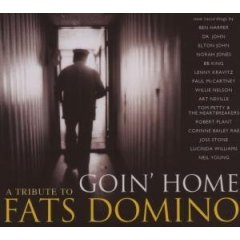
There's really no need to go into the why of the tribute and there's even less need to explain Fats Domino's place in modern music, if you don't know by now it's too late. Furthermore, so iconic are the likes of Ain't That A Shame, I'm Walking, One Night, My Blue Heaven, Blueberry Hill and I Hear You Knockin' that it would take a musicologist to find anything new to say about them, all are part of the lives of anyone with merely a passing interest in modern music.So it's the who and the what they've done, that is the real interest. You wouldn't expect musicians of this calibre to simply recreate and they don't disappoint.
Any album that begins with John Lennon attacking Ain't That A Shame with the same will as the huns at the gates of Rome, sets its stall out early on, it also lays down a benchmark for what follows. Elton John is pleasantly surprising with a very creditable rendition of Blueberry Hill. In truth there would be at least a dozen musicians ahead of Reg in the queue for that particular classic but he acquits himself well. Although the suspicion lingers that a career in the blues should not be one of his prioritites. But legend follows legend and, after Paul McCartney and Dr John, Robert Plant weighs in with the first of two offerings, firstly he joins L'il Band Of Gold on It Keeps Rainin' and then he goes all subdued as he collaborates with Soweto Gospel Choir on Valley Of Tears, a rock god with a sensitive side.
With Goin' Home it's pretty much a case of pick your favourite, sit back and enjoy. Willie Nelson is vintage Willie Nelson with I Hear You Knockin' and Neil Young is at his brilliant best nailing Walking To Memphis. Perhaps these two capture the untamed spirit of Fats Domino best. It's a close call and largely irrelevant because each track on the 2 CDs is a gem. How can you not marvel as Lucinda Williams, Norah Jones, Bonnie Raitt, Dr John, Taj Mahal all provide the threads that are spun into a cloth of gold.
However, the brightest stars in this firmament are the songs themselves, even after so long and so many variations the real surprise is just how good they are. Each demands, and thankfully gets, careful attention.What Goin' Home shows is just what a genius Fats Domino was, after all it's taken the combined talents of the best to do what he did all by himself.
Michael Mee October 2007
Lonnie Donegan - Rock Island Line The Singles Anthology 1955-1967 (Sequel)
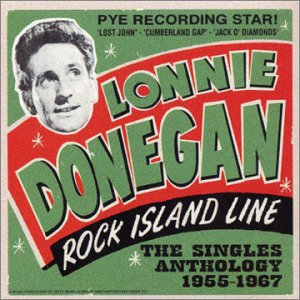
The king of skiffle, Donegan began his musical life playing guitar and banjo with the Chris Barber Band. Then in 1954 they recorded their New Orleans Joy album from which, that November, the label decided to release the Donegan featured cover of Huddie Ledbetter''s Rock Island Line backed with John Henry. Skiffle was born and Donegan suddenly found himself the first modern pop star as teenagers, looking for a new music, embraced his sound like crazy.
Reworking old American blues and folk songs like Stewball, Bring A Little Water Sylvie, Guthrie's Dead Or Alive, Tom Dooley, and The Grand Coolie Dam as well as covering American folk hits like Love Is Strange, he was soon a regular in the charts. In 1957, as a double A side, he released Puttin' On The Agony, a trad vaudeville style number that captured the sense of humour of his stage shows. It was a No 1 and paved the way for future 'comedy' hits Does Your Chewing Gum Lose Its Flavour, Battle of New Orleans, Have A Drink On Me and, of course, My Old Man's A Dustman.
It wasn't all knockabout stuff. Donegan could just as easily turn his hand to a plaintive, indeed often maudlin, ballad. Execution song Kevin Barry, about the teenage Irish patriot, I Wanna Go Home (better known as Sloop John B), Beyond The Sunset (about being reunited in heaven after earth's toils), Seven Daffodils (a B side that became a hit for The Mojos), and The Party's Over. For Donegan that proved to be the case when Pick A Bale of Cotton reached No 11 in 1962 and proved his last chart entry. This collection takes things up to his last Pye release, Auntie Maggie's Remedy, in 1966, but while those four years included things like a version of Doug Kershaw's Lousiana Man, Mike Settle's Where In This World Are We Going, a cover of Peter, Paul & Mary hit Lemon Tree (with old timers Miki and Griff on backing vocals) and 500 Miles From My Home, they also threw up such ill advised nonsense as his team up with music hall veteran Max Miller and, oh the shame, his world cup song, World Cup Willie, a classic case of bad timing since it came out six months before England beat Germany.
Much, inevitably, now sounds terribly dated, but as a comprehensive document of an innocent musical era in English pop history, this is well worth a place in the library.
Mike Davies
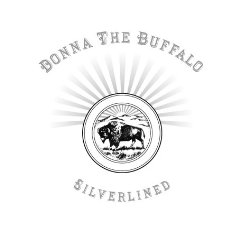
Whether your focus is drawn to the country, roots or indeed any of the myriad of delightful shades that colour Donna The Buffalo's Silverlined, you will be inevitably drawn back to one constant. This is a band that knows exactly what it wants to say and the very best way to say it.
Although Silverlined is probably one of the least self-congratulatory and bombastic albums you'll encounter, it has a certainty running through it like a steel spine. Once you've listened to the 13 tracks, you can't imagine them being done any better than they are here.
It would be a neat device to be able to say that with two vocalists - Tara Nevins and Jeb Puryear share the load equally - you get two distinct bands. In fact what you get is five hugely talented and committed musicians - Tom Gilbert, Bill Reynolds and Kathy Ziegler complete the line up - giving every ounce of effort and talent at their disposal.
What Puryear and Nevins do offer is a clever contrast, Nevins invests the album with a folk innocence, Temporary Misery in less sensitive hands would surely be nothing more than a run of the mill album track, here it flourishes and blooms, thanks to the subtle but distinct edge provided by Nevins. Puryear counters that with a rougher hewn quality.
While Silvelined is built upon an unbridled joy and passion for making music. it is also a mature and measured album. Donna The Buffalo may be able to jump styles with ease, there is aways a purpose to the shift.
It is also a body of work that has deep and solid roots, and it's that base that allows Puryear to make Tomorrow Still Knows something infiniely more interesting and layered than a standard country rock track. Silverlined may be recognizably traditional but it's not tied down by that tradition.
There is no doubt that Silverlined benefits from the fact that is a band that has been in existence for nearly two decades, it is a tight and beautifully constructed album. However instead of contempt, familiarity has bred the ability to weave magic into songs like Locket And Key and then move effortlessly on to Garden Of Eden.
After so long together, many bands find the spark of inspiration has dulled but with Silverlined, Donna The Buffalo has displayed the quirky intelligence of Biggie K, not a song you would produce from the comfort zone of simply going through the motions. It is also proof that Donna The Buffalo is unlikely to run out of ideas or steam anytime soon.
www.myspace.com/donnathebuffalo
Michael Mee August 2008
Donna The Buffalo - Positive Friction (Sugar Hill Records)

Here's another genre for you: rockin' country/cajun/reggae and its 'Fleetwood Mac' is Donna The Buffalo. But don't try and put them in a box, just enjoy their music.
Their new album Positive Friction is a quick-fix cure for a cold English summer. It's instant festival sunshine with that special something which will bring a big grin to your face and have you on your feet in two seconds flat, and keep you there. They've captured happiness on plastic!
The band's joyfully contagious music explodes unapologetically from the opening country rocker 'No Place Like The Right Time' with Tara Nevis on vocals. Bright acoustic guitar, percussion and rhythm guitar have you reaching for your tambourine to join in (you have one of course?). From then on it's no stopping; rootsy rockers with keyboards, plenty of chunky electric guitar, awesome punchy rhythm section, a rich stew of fiddle, pedal steel, gorgeous vocal harmonies and a touch of accordion. My one complaint? Of the thirteen tracks, Tara Nevis only sings lead vocals on five of them. Hers is the sort of Stevie Nicks' voice you want to hear more of.
This is the Ithaca, New York, formed six-piece's second album for Sugar Hill Records, the first being 'Rockin' In The Weary Land', but their repertoire extends back to three previous albums, two of which, 'The Ones You Love' and 'The Purple One', are available from their website.
www.donnathebuffalo.com
www.sugarhillrecords.com
Sue Cavendish
A fine recording of two Irish traditional musicians. Peadar, from Kilmaley in West Clare, who plays flute and uilleann pipes, is a recording veteran of over 40 years' standing, whereas fiddle player Maeve, who hails from East Galway (though she currently lives in Co Clare) first came to notice a little later, in the 70s. Over the years they've formed a very strong musical bond through a deep appreciation of each other's local playing style, and The Thing Itself is the second of Peadar's duet recordings (the first, Touch Me If You Dare, which teamed him up with Ronan Browne, came out in 2001). Their easy togetherness makes for comfortable (though in the sense of comforting not cosy, I hasten to add!) listening. Their empathy makes for a sensibly measured overall style, which may sound elegant and comparatively refined, but the satisfaction comes from the ease and confidence with which they play for each other - for that is what's happening, sure. We listeners are eavesdropping on some relaxed, private music-making, though we never feel unwelcome in the slightest. There's a joyous bounce to their playing that's gloriously infectious, and they give us really spirited renditions of their chosen session tunes (many from West Clare itself). On two of the tracks, producer Ronan Browne is even tempted into joining them, on flute and tin whistle. And the booklet notes enthusiastically and informingly give us everything we might wish to know about the pedigree of the tunes being played, alongside a couple of genuinely entertaining related stories. The only drawback is that delightful though their united (and unison) approach to the tunes is, there's little variation in that approach and you may yearn for a little more rough edge at times; when they do come closer to letting it rip a bit with the vitality of their playing, as on the set of polkas (track 5), the piano accompaniment (by Geraldine Cotter) imparts an altogether rather well-mannered feel to the proceedings. But that's a very minor point, and the whole album is really hugely enjoyable; I've listened to it several times, each in just the one sitting without getting bored and finding it uplifting and stimulating and always wanting more (42 minutes just ain't enough!).
David Kidman
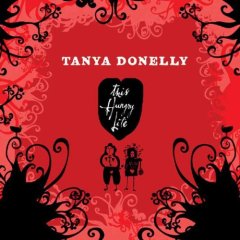
Heading even further away from her alt-rock days with Throwing Muses, The Breeders and Belly, Donelly's becoming increasingly country, a repositioning must acutely in evidence on this latest album, new material recorded in front of a live audience over two Vermont nights (with just a couple of subsequent studio tweaks), the band taking their cues from what the song demanded in the moment.
She still plays a mean guitar and her pop rock sensibilities remain, most notably so on the opening slow swaying, pedal steel backed New England where her twangy vibrato tones conjure a meeting of Maria McKee and Marianne Faithfull.
But listen to World On Fire and you'll hear the same Appalachian roots that twine through Loretta and Dolly; she even sings that she 'wants in on Lucinda's sweet old world'. Then there's the hymn-like This Hungry Life and the soaringly majestic River Girls, both nods in the direction of vintage Emmylou. Bringing a new country spiritual ambience to George Harrison's Long Long Long with its aching violin solo (courtesy Joan Wasser), she also dips into woody folk rock colours for Invisible One (one of three featuring Buffalo Tom's Bill Janovitz on harmonies) with its dark fiddle accompaniment.
As ever, the lyrics are thoughtful, nagging reflections and observations, some hewn from her feelings and fears about the world, exceptionally captured in the gorgeous dark lullaby Kundalini Slide's exploration of spiritual crisis, while others stem from her experiences and concerns as a mother, the skipping Littlewing a bedtime fable about being hit by lightning. Indie rock's loss, is patently Americana's gain.
www.www.tanyadonelly.com
www.myspace.com/tanyadonellymusic
Mike Davies November 2006
Tanya Donelly - Whiskey Tango Ghosts (4AD)
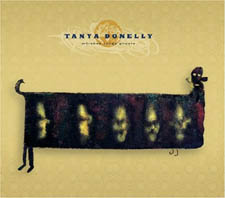
Belly, Throwing Muses and Breeders fans who've been holding out in the hope of a return to the alt rock noise will probably finally throw in the towel with Donnelly's third solo album on which she strips the sound and instrumentation back even further. Sparingly used guitar, supper club piano, bare hints of percussion and pedal steel murmurs provide the backdrop for her worn fragile falsetto and the spartan folksiness of the wistful songs. There is, as Herman and his Hermits once said, a kind of hush ('deathly quiet' she calls it) across this collection of domestic contentment and love's grace.
Well not totally content. There are hints in the likes of the communication gulf themed Divine Sweet Divine and the self-explanatory My Life As A Ghost that something has been lost, something that still haunts outside the window and in the mirror, something that reminds she had the 'art of making waves'. But whatever memories of the past linger, whatever fears of heartbreak flutter in the stomach of Fallout, it's the knowing of being able to turn to her crown of love and not be turned away that sets the mood throughout.
Musically it hovers languidly around the back porch, its country frameworks painted with shades of jazz and blues, inviting you to float in the warm waters of such songs as Just In Case You Quit Me, Golden Mean and the scratchy loveliness of Every Devil and Whiskey Tango. It ends with the hidden bonus Dona Nobis Pacem, a seraphic a capella multi-tracked Latin psalm that transports you to the front row of Christmas church. It translates as Give Us Peace. She does too.
Mike Davies
Tanya Donelly - Beauty Sleep (4AD)
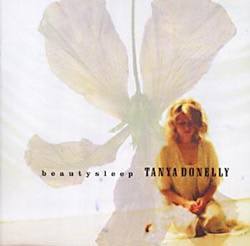
Her first album in almost five years, during which time she became a mother (thankfully not resulting in some mawkish hymn to new babies), finds Donnelly on far more assured form than her solo debut that tried too hard to replicate her work with Belly. It also marks a more serene mood as she explores a range of sonic colours within a generally melancholic melodic framework. A pulsing heartbeat is the first sound from the speakers as Life Is But A Dream unfolds like a drifting otherworldly lullaby blues, Donnelly's little girl voice taking on shades of Victoria Williams while elsewhere she'll suggest a slightly more brushed Cerys Matthews. It's not all tranquility, Wrap-Around Skirt with its eruption of guitar riffs for example, but there is a dreamlike quality to many of the tracks. The Storm with its beguiling agile melodic curves, the darker shaded Moonbeam Monkey with a lyric that sounds as if it's been plotted by Tim Burton and an arrangement plucked from some Native American medicine dance, and the closing brooding The Shadow. That number's ominous notes aside, the general tone is upbeat in its songs of finding a place and rising above the swamps, of salvation and self-acceptance. No more so perhaps than on the two glistening love song knockouts - The Wave, a simple Southern countrified acoustic waltzer with her voice at its most tar baby evoking the earthy innocence of dipping your soul in the muddy creek waters, and the disarmingly beautiful I'm Keeping You (which I suspect is the album's mother song with its reference to landing here with that 'screwed-up look on your face') set to a slow military march beat with a soaring storm of guitars for the chorus. Her most accomplished, tender and soulful work to date, if this is what doing birth does for her we can only hope she has plans for a very large family.
Mike Davies
Well here it is at last - the full (almost!) record of the famous November 1967 show at LA's then-newly-opened Anaheim Convention Center. Expanded from its original heavily-edited single LP to a glorious double CD, freshly remastered from the original 4-track tape source and sounding suitably immediate and full of presence. This hippy-trippy era was for many Donovan fans the acme of his creativity, coming between the epic, if mildly pretentious gentility of A Gift From A Flower To A Garden and the harder edges of Hurdy Gurdy Man; to many listeners, though, it grated with superficial sentiment and unbelievable naivety. I've always inclined more toward the former, while not managing to be entirely convinced by several of the songs written during that time. So Donovan's concert repertoire as portrayed here will necessarily alternate between the beauteous, poetic offerings and the trendy fripperies. The concert starts inauspiciously, with a cringeworthy intro from MC Rhett Walker, but settles in nicely with a relaxed Isle Of Islay. Young Girl Blues, which follows, provides the first of several opportunities for Donovan's accompanists to shine (Harold McNair turns in some superlative flute and sax work throughout the concert, notably on the punchy 9-minute workout on Preachin' Love that ends the first set). Taken as a whole, that first set's a bit wayward and inconsistent, with high-points like Epistle To Derroll and Widow With Shawl balanced by throwaways and disappointments (Sunny Goodge Street, There Is A Mountain). The second set follows a disappointingly lacklustre Sand And Foam with a really nice sequence that starts with Donovan augmented by the "Flower Quartet" for Hampstead Incident and spare, simple, intimate voice-and-guitar renditions of To Try For The Sun, Someone Singing and the then-newly-written Pebble And The Man (Happiness Runs), a pretty little song which always reminded me of the incredible String Band! Then it's back to childlike fables from whimsical fantasy-land with the charming Tinker And The Crab before the concert is allowed to disintegrate in terms of musical interest, with the singalong Rules And Regulations and Mellow Yellow making for a tediously blowsy and all-too-predictable finale complete with cabaret-style flourishes (thankfully faded at that point!). Tagged on at the end of which is the last half only of Catch The Wind, its frustrating incompleteness excused by what the all-too-brief liner note describes as a "machine problem"; it's a pity the notes don't tell us where this excerpt should be placed within the overall set-list... But whatever, it's still good to have the entire concert recording available now; it was clearly an occasion, very much of its time, and the sense of gentle, relaxed atmosphere is wonderful when the musical and lyrical invention is at its highest - so you can forgive (and skip!) the sillier and more embarrassing moments.
David Kidman August 2006
Donovan - Beat Cafe (Appleseed)

Dubbed the English Bob Dylan on the release of debut 69s single Catch The Wind, Donovan Leitch soon put paid to that tag with a swerve into the hippie concept album A Gift From A Flower To A Garden and the funky druggy jazzed psychedelia that characterised Mellow Yellow, Sunshine Superman, Goo Goo Barabajagal and The Hurdy Gurdy Man. The hits dried up at the end of the decade and while he continued to record through the 70s and 80s, producing such album gems as Cosmic Wheels (featuring the hilarious Intergalactic Laxative) and Essence to Essence, his fortunes continued on a downward slide.
Taking time out to recharge in the latter half of the 80s, he returned the following decade with concerts and, in 1993, a new album, One Night In Time. However, while previewing powerful tracks such as Runaway and Teenage Suicide during his UK tour, it remains unissued in the UK. The critically well-received Rick Rubin produced Sutras followed in 1996, but since then there's been silence. Until now.
Enlisting Richard Thompson producer and keyboard player John Chelew, drummer Jim Keltner and legendary jazz bassist Danny Thompson, and recording with no fixed arrangements he's created a sultry but cool collection that perfectly captures the smoky jazz, blues and poetry vibe of the bohemian cafes, the spirit of Peggy Lee informing the title track while a breathy off the shoulder setting of Dylan Thomas's Do Not Go Gentle surely owes a debt to both Eartha Kitt and Laurence Olivier.
The voice remains as softly burred and mellow as ever (beautifully so on Lover O Lover) sounding (as evidenced on the finger-snapping funky jazz groove Poor Man's Sunshine) like John Martyn but with honey rather than gravel, while the lyrics of songs such as Love Floats, Yin My Yang and Whirlwind show he's not forsaken his mystical inclinations either. Fortunately, as the self-mocking blues Lord of the Universe ably demonstrates, he's also managed to grow old with his sense of humour intact.
His folk roots are recalled too with a skittering nervy arrangement of the traditional The Cuckoo and while the closing tranquil spirituality of the simple and spare Shambhala might prompt lazy new age pigeonholing, there's a sensuous quality and earthiness here that, as in the Dr John-like voodoo ambience of The Question, shows real fire in the blood.
Unlikely to spur any major renaissance perhaps, but long time devotees will relish while providing a non decaf fix for audiences new to the jazz cafe experience.
Mike Davies
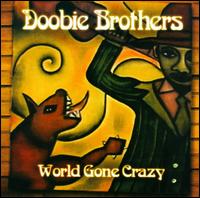
Formed by John Hartman, Tom Johnston, Patrick Simmons and Dave Shogren (soon to be replaced by Tiran Porter) back in 1970 California, the band hit an early peak with their first two albums yielding the classic Southern rock funk hits Listen To The Music, Jesus Is Just Alright, Long Train Running and China Grove.
Then, in 1975, Johnston's health problems saw the role of lead singer taken by Michael McDonald, transforming the music into soft rock blue-eyed soul and I lost interest. The rest of the record buying public continued to part with their bucks, making What A Fool Believes one of the band's biggest hits, but, by 1981 McDonald overkill had taken its toll and even the band had lost interest. Following the 1983 farewell tour, they called it quits.
Reuniting for a concert in 1987, two years later the constituted line up released Cycles, Johnston back on vocals to spawn Top 10 hit The Doctor. Despite a few line-up and sales hiccups, they've been keeping it going ever since. However, that's been predominantly as a live act. After 1999's Brotherhood they didn't release another album for nine years with Sibling Rivalry. That received indifferent reviews and poor sales, doubtless explaining why it's taken another decade for this follow up.
While it's not going to restore them to the glories of youth in their dotage, as a lapsed fan, I have to admit that, again produced by Ted Templeman and with a settled line that includes John McFee and Michael Hussack alongside Simmons and Johnston, it does go a long way to honouring the memory of their early 70s golden age. Certainly, were this 40 years ago, gospel infused opening cut A Brighter Day would have doubtless been all over the airwaves and charts while Chateau harks back to the driving rock groove of China Grove, and both the age-winking Young Man's Game and the title track are solid piano barrelling boogie.
I did find myself dozing off during McDonald's appearance for the Latin flavoured Don't Say Goodbye, but, despite being almost drowned out by McFee's banjo, Willie Nelson gives good guest vocal on the more country toned I Know We Won while Law Dogs shows they can still work up a slide guitar blues with the best. Coming up to their 40th anniversary, they also revisit their roots with a new recording of their first ever single Nobody. The press photos look rather different these days, but the sound is as classy as it was then.
Mike Davies October 2010
Winner of the BBC Young Folk Award in 2006 in tandem with Ben Murray, Rosie here moves even further away from her family heritage (the Doonan Family Band), and indeed folk music, presenting for her debut solo outing a confident set of songs (presumably all her own work, though actual confirmation of this is mysteriously absent from the CD's credits) that focus on exactly what the title denotes: moving on and making a fresh start and all the feelings and emotions associated with those key activities (travelling, falling in and out of love, developing new ideas and so on). In doing so, Rosie is following the time-honoured path (and themes) of those singer-songwriters who have - on the evidence of the music on this disc - clearly much inspired her (notably perhaps, Carole King and Joni Mitchell). Moving On is an absorbingly mature artistic statement, couched in a distinctly radio-friendly (and in fact not especially folky) musical language and intelligently realised settings that any major-league recording artist would be proud to embrace in a bid for airplay and chart success. There are points when it feels almost as though Rosie has moved on just a bit too far for a first-timer, whereas at other times the sweetness and brightness of the instrumental palette is a front for some pretty deep reflection; don't let the accessibility and forwardly-placed breeziness of many of the musical settings deceive you into treating these songs lightly. For example, the most sparsely-scored of the songs (Hold On) forms a bleak contrast to the busy, toyshop-playful psych-pop confection of Little Boat, but both carry their own persuasive degree of emotional weight. All in all, the songs together encompass a range of emotional states which Rosie proves herself more than capable of expressing vocally, with a haunting tonal quality and an enviable control of phrasing and inflection that seems almost prescient and certainly beyond her years. The settings are informed by a semi-jazzy, pop-conscious sensibility and boosted by some splendid musicianship courtesy of folks like Peter Tickell, Michael Doonan, Bob Thomas, with Joss and Theo Clapp figuring large in the picture. In view of the importance rightly placed on Rosie's songwriting here, though, it's a bit of a shame that she didn't include the lyrics in the package..
www.rosiedoonan.com
www.myspace.com/rosiedoonan
David Kidman February 2009
Long-term songsmith Charlie, for her sixth album release, delivers a disc that's every bit as personal as Cuckoo Hill, but in a different way. It's a delicious set of (almost exclusively) covers of songs from well back in the past: good old-fashioned songs with old-fashioned values like strong melodies, songs which she'd always loved but never got round to recording until seriously nudged to do so by Beth Nielsen Chapman. The story goes that Beth heard Charlie and her collaborator Julian Littman playing old Jimmie Rodgers songs for fun after a BBC radio broadcast they shared one day.
Indeed, the very title of this new album refers back to Hula Valley, the name of a pick-up band that Charlie, Julian and a few mates convened to fill a residency at a London club in her formative years – but to be fair there's a distinct Hawaiian vibe about many of the tracks, and with steel and resonator guitars and ukes and gentle acoustic brushings prominent in the instrumentation that's no wonder. Charlie's in great voice too, seductive and idiomatic with a keen and affectionate grasp of the material: light-toned but not lightweight, evocative and appealing as it glides effortlessly through the genres from lazy jazz to coquettish croon to playful swing. The eleven songs do include some from the repertoire of the Singing Brakeman, but they range far and wide over the Depression-era catalogue and beyond, from a gorgeous Roll Along Kentucky Moon and a tender Prairie Lullabye to the quirky Everybody Does It In Hawaii and the Milton Brown curiosity The Object Of My Affection; the obscure Al Bowlly number Alone to the fun Dixie-jugband Desert Blues and the spirited hillbilly standard Radio Boogie; and there's even two songs made famous by Bing Crosby (Love In Bloom and Learning To Croon). Finally, the tougher rockabilly-styled I'm Cleaning Out My House turns out to have been penned by Charlie herself!
As for Charlie's support crew on this new offering, well it's classy and real tasty: Julian naturally (on all things string), with Graham Henderson (dobro and piano), Jake Walker (violin), Dudley Phillips (double bass), Mick Foster (clarinet) and Tom Rees-Roberts (trumpet). And Beth returns the favours by donating backing vocals to lots of the songs – and a brilliant, happy job she makes of it too! This is a delectable, elegant, intelligent and thoroughly charming (if perhaps unexpected) addition to Charlie's recorded catalogue.
David Kidman July 2009
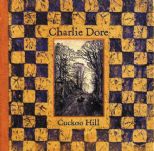
Last year Dore released Sleep All Day And Other Stories, her first album in a decade and only her fourth in the quarter of a century since her debut single Pilot of the Airwaves, a turntable hit here but reaching the Billboard Top 20 in America. Though as a writer she's provided songs for Tina Turner, Celine Dion and Hayley Westenra, she's not exactly been prolific as a recording artist. But she's clearly making up for lost time, swiftly returning with this second collection of new material, extending the last album's country-folk flavours with sultrier flavours; a tabla rippling through the late night torch groove of Your Lover Called with its greasy Guy Barker sax break, eastern European mazurka hints flecking When We Fall.
Taking its name from the street where she grew up, the album's dedicated to her late father and brother, both of whom passed away last year and whose ghosts haunt melancholic songs like Looking For My Own Lone Ranger, Someone Other, Shoeless and the quietly heartbreaking Captain Of Industry their recurring themes of the need for comfort, reassurance and self-discovery.
As with its predecessor, songs of abandonment and frustrated relationships such as Mr Williams (which wittily references Andy's hits) and the Gallic flavoured spare piano ballad She's Another Madeleine sit alongside the deep hymns to enduring love that are My Wayward Friend and When We Fall. Indeed, even When Bill Hicks Died, a bluegrassy homage to the legendary comic (complete with a sample from one of his performances) twists into some kind of back handed compliment.
Again often evoking comparisons to the McGarrigles with her achingly pure warbling voice, it's an album that seduces, beguiles, saddens and uplifts in equal measure. Quite, ahem, aDoreable.
Mike Davies, July 2006
The disc's title is a fair indication of the tenor and subject-matter of the songs penned by this Belfast-born, Glasgow-based singer-songwriter who has at last finally got round to making a solo record (you might recall his fine duo CD with Heather Innis, Waiting For The Calm, which was released in 2004). On this collection, Ciaran chases his dreams; he also revisits his home (The Prodigal's Return), and muses on the paradoxes of life (It's Only When I'm Drinking) while paying homage to Joni Mitchell, Josh Ritter and other heroes with whom he's crossed physical or metaphorical paths over the years. He sings well, directly communicating with his listeners, and he writes powerfully and persuasively with a keen feel for observation of people and their emotions. His songs are pensive, but invariably couched in a musical setting that's accessible and radio-friendly (almost to a fault, for I feel the nigh-ubiquitous soft-rock cadences of sax, piano and keyboards on several tracks detract a little from the impact and passion of Ciaran's lyrics - but that's a personal preference, and you may well warm to that approach more than I do). The standout songs for me come towards the close of the album: the climate-change warning of Halcyon Highway (written after reading Mark Lynas's book High Tide), Wrong Turns which poignantly epitomises the disc title's philosophical dilemma, and Calvary Circus, Ciaran's impassioned response to the Good Friday Agreement. Ciaran has an obvious strong respect for the tradition, which extends as much to the contemporary tradition (the writing of latter-day masters such as Eric Bogle, Anthony John Clarke and Kieran Halpin and, perhaps most especially in respect of elements such as some of the chord-changes, Joni Mitchell): his thoughtful rendition of Raglan Road, which forms the disc's one non-original, is very nicely done. As I hinted, there are occasional touches of over-arrangement, but overall Ciaran has produced, with the invaluable aid of Stuart Duncan and a host of other capable musicians and singers, a satisfying and well-rounded collection of self-penned songs.
David Kidman May 2008
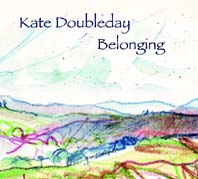
Longtime resident of suburban Birmingham, now domiciled in rural Wales where she doubles up as musician, organic gardener and educational environmental artist, the breathily reedy voiced thumb piano playing Doubleday made her recording debut five years ago with Renewal, earning warm reviews for its jazzy folk flavours and blend of African, Irish and Balkan influences. She returns to now plying the same mix of influences but with the increased maturity, confidence and deepening of textures passing time has wrought. Again those looking for quick references points might light on Sally Oldfield, but you'll also find shades of Joni, Janis Ian, Anne Briggs, the spidery aspects of Kate Bush, and a less darker voiced June Tabor while she'd be quick to point out the influence of the late poet Frances Horovitz on her work.
Trevor Lines reprises his bass duties from the debut album while this time round the musical line up welcomes percussionist Tom Chapman (who plays reclaimed copper pots), guitarist and acclaimed UK kora player Daniel Wilkins, producer Joe Broughton on violin and Pamela Pinnock and Tina Barnes providing backing vocals. Together they create an intoxicating brew, rich in layered and sinuously subtle arrangements hewn equally from the musical traditions of West Africa, Irish backwaters, the Mississippi and the hayricks of England.
Adorned with images of flowers and nature, her songs treat on the giddy rush of love (Do You Not Know, Sweet Dandelion), political hypocrisy (the heady chant structured Follow Through), fecund nature (Wild Poppies), grief and forgiveness (Watch The Flowers), her daughter (the pure tinkling trad folk In Full View) and the beauty but ephemeral nature of life (a tranquil watery Silver Blue). Songs like the hypnotic, sensual Eucalyptus (where she invokes Aboriginal vocalese) and the choral African hymnal title track (surely a number made to be sung into the Glastonbury twilight) curling through the blood, it's an album that seeps inside you, taking root and blossoming into a spiritual soundtrack for the soul.
www.katedoubleday.com
www.myspace.com/katedoubleday
Mike Davies March 2008
Kate Doubleday - Renewal (Copper)
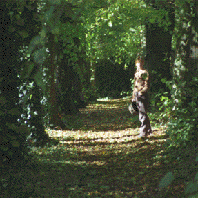
Built upon a foundation of leafy Englishness, Kate's musical influences bring with them hues of jazz, and world music, her love of South African a cappela clearly evident on the bouncy opening Footsteps and closing choral Badumba but also bubbling beneath the rhythms of Sweet Feeling, while the harmonic undercurrents of Had To Be evoke thoughts of Bulgarian outfit Les Mysteres de Voix Bulgares.
Whether standing alone or weaving through intricate multi-tracked harmonies as with the layered backing of Rise and Fall, her reedy, soaring voice has the taste of summer rain, beautifully set here among imaginative arrangements that vein Sid Peacock's acoustic guitar with Ruth Angell's violin, Trevor Lines's assorted basses, percussion courtesy Rocky Amoo and Mark Lockett, and her own thumb piano. At times (as with Needs And Wants) sounding not unlike a one woman Poozies, her songs of loss and renewal weave an evocative cool spell.
Mike Davies

Double Trouble were Stevie Ray Vaughan's rhythm section: Chris Layton, drums, and Tommy Shannon, bass. Here they are joined by 'friends', including SRV's brother Jimmie, Dr John, Charlie Sexton, Susan Tedeschi, Willie Nelson, Kenny Wayne Shepherd, and the outstanding Doyle Bramhall II, whose albums I'll be looking out for in the future.
It's not one of those supergroup experiments which didn't quite gel. The Layton/Shannon axis bonds this dynamic collection of musicians and songs like Superglue. Obviously recorded live in the studio, there's that smouldering fire a great live jam band has, even though different tracks have different line ups. Most have played with Layton and Shannon before: Sexton and Bramhall in the Arc Angels; Tedeschi; and Shepherd, who they'll be touring the US with in April.
Here's classic Texan rock/electric blues and R&B, original songs and covers. Tommy Shannon co-writes songs which soar like eagles; left-hander Doyle Bramhall's Fender Stratocaster is as dirty as R&B can get on Muddy Waters' She's All Right; Led Zep's Rock And Roll absolutely storms along with Kenny Wayne Shepherd on guitar and Susan Tedeschi on vocals; close your eyes for the gorgeous finale, Baby, There's No One Like You, deep and sophisticated, with Willie Nelson on guitar and Dr John's on vocals. Those are just a few highlights of an album I'll be playing for a long time to come.
There's more than the ghost of Stevie Ray Vaughan here (and I don't just mean the 30-second hidden track). The whole album is shiveringly good - it doesn't get much better than this for me.
Sue Cavendish
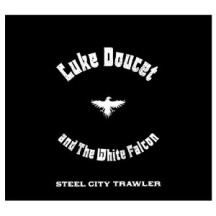
Erstwhile frontman with Veal, dubbed by some as Canada's answer to the Flaming Lips, Doucet's been flying solo for the past six years, his albums mixing up classic rock and roll and more rootsier material. And so it is here too, the opening Monkeys a Lou Red like strut with a muted boogie woogie piano in the background, Thinking People a pumping punky rockabilly thrash and Dirty, Dirty Blonde a Stonesy sleaze n swagger with wailing harmonica and blues guitar licks. Or how about Some Of You Folks with evocation of 60s psychedelic folk-pop?
On the other hand, away from the riffs and hi-hats, there's the quieter side of things represented by the lovely Hey Now where wife Melissa McClelland provides backing harmonies, a trad-like folky, mist wisping, acoustic Magpie and the poignant The Ballad Of Ian Curtis, a reflection on creative pressure and its fallout sung in the voice of the late Joy Division frontman.
However, I have to put my hand up and say that my favourite track here isn't one of Doucet's own, but a twangy guitar cover Gordon Lightfoot's Sundown in the manner of Roger McGuinn complete with an Eight Miles High-like guitar solo.
Well packaged with artwork and a comic strip narrative booklet incorporating the lyrics, not everyone will like all of it, but if only 50% pushes the button it's still money well spent.
www.lukedoucet.com
www.myspace.com/lukedoucet
Mike Davies November 2010
Blood's Too Rich is the latest - and most eagerly-awaited - offering from Canadian guitar virtuoso/hero Luke, on which he's backed by his storming White Falcon band (Rich Levesque, Melissa McClelland, with Paul Brennan and John Dinsmore and a load of others helping out). It's a heavy-duty collection of uniformly strong songs - all Luke's own, save for Motorbike (jointly penned with Mike Plume) and a cover of Robert Smith's Love Cats (which to be honest sounds out of place in this august company). But there's a definite danger that the quality of the songwriting will be overshadowed by Luke's signature Gretch axe-wielding; certainly I've a feeling that the album will be taken down from the shelves most often just to reacquaint oneself with such fabulous solo work as that on Take You Home and First Day (In The New Hometown).
My advice is to concentrate on the power of the storytelling too, for it reaps considerable rewards and then you'll find all that mad axe work is both a massive knife ripping and tearing through the textures and a thick layer of icing on the cake. Anyone unfamiliar with Luke's music who responds to Tom Petty or Springsteen, say, should find loads to get off on here; if you don't normally enjoy big killer geetar solos, then you should still be able to admire and enjoy Luke's thoroughly musical, and relevant, playing - he sees and develops the broader picture, and his soloing, while bold and upfront, genuinely serves the songs rather than being a mere vehicle for flashy pyrotechnics. The sound of the album - a self-production by Luke himself - is rich and suitably full-blooded: great stuff.
David Kidman March 2008
Jerry Douglas - The Best Kept Secret (Koch Records)
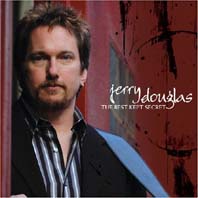
We can allow Jerry Douglas the irony of the title of his new CD. To the general public he may not be particularly well known but amongst Americana musicians and fans, to call him acclaimed and respected seems scant respect. Currently a member of Alison Krauss's Union Station (Krauss makes a guest appearance here singing on the neatly funky Back In Love Again) Douglas has played on over 1500 albums, including releases by Garth Brooks, Paul Simon, James Taylor and Ray Charles. Jerry Douglas is proof that the best only work with the best.
The Best Kept Secret is a masterclass in American and country roots but unlike a dry lecture, it is full of colour and passion. It also deftly draws together strands of country, blues (brilliantly on Swing Blues No 1 with the inimitable John Fogerty taking the vocals), and jazz and turns them into a marvellously ornate tapestry. The origins of Americana and country may be humble, however in the hands of Jerry Douglas the music is fit for the finest table.
Douglas takes what is largely an instrumental album and injects a sometimes one-dimensional genre with an irresistible energy. The breathless energy of Who's Your Uncle, the slightly dark and threatening energy of Ya Ya etc and the wild, romantic energy of U R My Flower all make this a rousing and gripping listen.
But that energy is punctuated by moments of pure beauty, A Remark You Made and Snow's First Fall are tender moments which help make this a rounded and complete listen.
Michael Mee, January 2006
Jerry Douglas - Lookout For Hope (Sugar Hill Records)
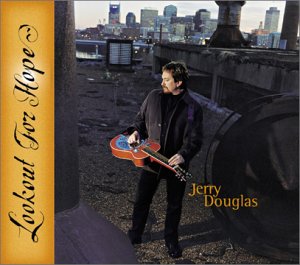
The man is the Master. Jerry Douglas and his Dobro are the ultimate instrumental marriage of steel, slide and melody. So often heard and seen in the credits of a host of other artists' albums, Douglas from time to time comes up with a CD gem of his own. Basically bluegrass, Douglas can take music in pretty much any genre and make it entirely his own.
The latest is the stunning Lookout For Hope. Opening with Duane Allman's sweet Little Martha simply arranged and beautifully played with just guitars and bass, Douglas moves on with a rebel-rousing Patrick Meets The Brickbats with full bluegrass band including Sam Bush on mandolin. Bush appears again on the achingly lovely Footsteps Fall (by Boo Hewerdine) with vocals by the wonderful Maura O'Connell - one of the only two tracks with vocals. Compare it with Eddi Reader's version on her last CD Simple Soul. I'll have to vote for the Jerry/Maura cover - a few more calories but quite delicious!
Monkey Let The Hogs Out is a sixty-second interlude with Douglas solo - then crickets (sampled) and a Bill Frisell song Lookout For Hope with full band - an intriguing experimental amble of jazzy, loopy music Frissell would be proud of. Lasting over ten minutes, it's a hypnotic groove in six eight time held together by stand-up bass. The mandolins of Sam Bush and Nickel Creek's Chris Thile weave an adversorial and hypnotic groove with Douglas and guitarists Bryan Sutton and Trey Anastasio. It's a knockout!
There's more: sax, electric guitar and drums on the jazz-frenzy Douglas original instrumental, Cave Bop. And there are several more originals - a favourite, the lazy-groove Senia's Lament, features Victor Krauss on bass and Larry Atamanuik on percussion. The album concludes with James Taylor on vocals on the reflective The Suit.
Jerry Douglas's Look Out For Hope is now available on-line from www.amazon.co.uk and I recommend it highly. My album of the week.
Sue Cavendish
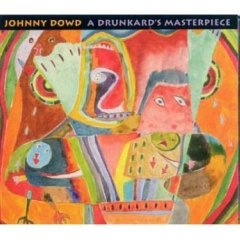
Recorded over three days in three parts, or opuses, with just four musicians (Kim Sherwood-Caso taking lead vocals on several cuts), the songs run together to emulate the live show, this, according to Dowd, is intended as a combination of variety show and soul revue, a personal mosaic of American music that embraces jazz, funk, blues, vaudeville, country and metal.
Over 17 tracks (three of them admittedly under 10 second introductions to each opus), the 60 year old purveyor of Americana gothic, this is more of a listening odyssey (through the battle of the sexes, as ever) and musical experience than your average album. There's a spooked nursery lullaby that transmutes into beat poetry in Danger/Blind Painter Paints Black, Off Broadway is samba shuffle and freak out jazz guitar, while Infidelity/Gargon vs the Unicorn tills similar ground to the early Beefheart with Mike Stark's keyboards weaving a funky spell.
Elsewhere Sherwood-Caso scats over the instrumental loose funk of Union Of Idiots, jazz-metal shards and desert beatnik blues boil over Easy Money and Things A Woman Needs and Maybe Brazil run together like the soundtrack to some 60s movie reefer trip sequence. You could imagine this playing to a liquid light show in the acid heyday of Monterey, which, more many heads, is probably the best recommendation it could have.
www.johnnydowd.com
www.myspace.com/johnnydowdband
Mike Davies April 2008
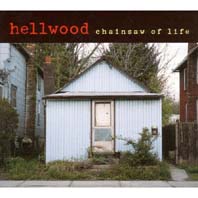
Two throaty voiced Southern gothic mavericks for the price of one, forged out of the Looking For The Wrong Eyed Jesus documentary this brings together both Johnny Dowd and Jim White with regular Dowd drummer Willie B for an album that hones and channels rather than dilutes their individual strengths.
As might be expected, shot through with biblical imagery the songs etch dark pictures of a hidden America devoid of not only God but the Devil too. A Man Loves His Wife may promise a tale of tenderness but instead you get a tenderly musically brushed portrait of a self-loathing drunk lost in weakness and failure, a disillusioned wife bone-weary with trying and a loveless marriage where the fireworks of love had sputtered out and suicide seems the only solution.
The swamp funky God's Back Pocket slouches through a tale of a con artist preacher, a sonic raging Man In A Plaid Suit tells of a 'frightened obscure man' who, a mixture of 'violence and shame' who sees a world washed in sin and only takes his hands out of his suit pockets at night, the spooky voodoo skewed nonsense rhyming pop of Spider In The Bed conjures all sort of sexual creepiness and on the deliberate talking blues funk The Good Die Young a guilt-ridden man has a vision of the best friend soldier of fortune whose death he caused when he fled a battle.
Often evocative of a weirded out Talking Heads (Ten commandments even borrows a riff from Crosseyed & Painless), it's a clanking, stylistically switchbacking affair that veers between extremes from the punk thrashing staccato jabs of Chicken Shack and the Zappa dance funk Alien Tongue to the molasses slow spoken Devil's music gospel Thomas Dorsey and the stripped back lonesome harmonica and banjo of the bittersweet stained romantic dreams of the closing Dream On. Not always an easy listen, but most definitely an intriguing one.
www.johnnydowd.com
www.jimwhite.net
www.williebmusic.net
Mike Davies, Sept 2006
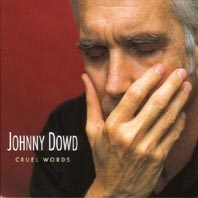
Whether or not it's the influence of Jim White but showing a welcome return to form after Cemetery Gates, Dowd's firing on all cylinders for this swampy country gothic blues rock set. Backed by drummer Brian Wilson and Michael Stark on organ, it snakes its lurching grooves, choppy rhythms and throaty vocals through a set of songs that burrow around in the sexual undergrowth "he realised his troubles came from that thing between his legs," he growls on House of Pain), the belly of despair (the lonely death of a washed up musician on Final Encore, a song worthy of Nick Cave) and the squalid garbage of Bush politics (Praise God's cynical soldier's commentary on Iraq).
Death, doom and drink loom large in Dowd's harsh landscapes, the clanging, lurching Waitsian industrial blue collar funk Ding Dong even sounds like its drunk. Which, as it happens, is also the title of another track, a country swayer about feeling suicidal and been desperate for a drink in which he namechecks himself and ropes in Sally Timms and Jon Langford from The Mekons to raise a harmony glass for the chorus.
It's a pressure cooker album, the tight playing turning up the heat with its jazz and blues flames so that you almost taste the sweat from the musical pores on things like grinding riffage blues Poverty House, nervy Beefheart-like Cradle of Lies, a swamp fever Miracles Never Happen and the spoken verses of urban neon noir steamroller Corner Laundromat.
There's several times here where Dowd invites old school heavy metal into the arrangements, so it's appropriate that the album plays out with a slow, snake-eyed predatory blues spoken version of Johnny B Goode that incorporates a sample of Black Sabbath's crushing riff from Iron Man. Cruel but irresistible.
Mike Davies
Johnny Dowd - Cemetery Shoes (Munich)
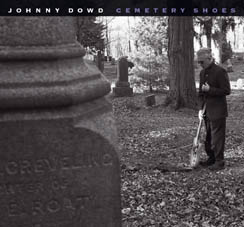
On stage Johnny Dowd has charisma in a cool dude, mature James Dean kinda way - but his songs are Grimm Tales for adults and when he smiles you might expect to see fangs. Cult figure? He's probably someone's doctoral thesis already.
This owner of a furniture moving company in Ithica, New York (via Texas, Memphis & Oklahoma), spawns darkly skewed Americana with delightful regularity. His latest release is Cemetry Shoes, his sixth album since '98's disturbing & original work of genius, Wrong Side of Memphis.
Cemetery Shoes is classic rocking Dowd with lyrics drawled like a personal threat - guitars, organ, bass and drums (& crashing dustbin lids, gun and wrecker's yard?) from Dowd himself, Brian Wilson and Justin Asher - could have been recorded on a set of a gothic horror movie - but actually it's the less onimous office of the Zolar Moving Company with Dowd the producer. No cool, clear harmonies from vocal partner Kim Sherwood-Caso, who complements him so well on previous albums, but there's quite enough meat on the bone here not to want more.
If you like story-telling from the Dark Side, Johnny Dowd's for you. He's a true poet, he intrigues, he entertains, he makes you smile and however paranoid he might appear to be, he's wonderful. Every album is collectors' gold.
Sue Cavendish
Mark Dowding & Chris Harvey - Manchester Ballads (Cock Robin)
This two-disc set of 35 ballads is termed (with some degree of understatement!) a musical companion to the 1983 Manchester Education Committee publication Manchester Ballads which had been compiled and edited by Harry Boardman and Roy Palmer. The ballads themselves are concerned with an apparently inexhaustible variety of subjects (love and romance, crime and punishment, politics, transport, major historical or local events and innovations of the time), so there's plenty of lively interest (a far cry from the esoteric and often impenetrable mythology of the Child ballad, many listeners will note with relief!). We learn from the booklet note that in many cases the original broadsides containing the ballads did not have tunes indicated, and so a popular tune of the day might reasonably be appropriated - a practice which is followed entirely honourably on several of the ballads on this set. As regards performance convention and arrangement, this as Mark acknowledges is very much open to speculation; since a potentially quite authentic-seeming (though simplistic) unaccompanied ballad-seller's approach would not have made for interesting listening over 35 ballads, a wide range of instrumental timbres has instead been used on this recording (the brief being that theoretically all possible instrumental sounds would have been available to the 19th century performer). The piano was the century's "key" instrument, so its sound features heavily rather than the guitar), and is imaginatively augmented by keyboard-reproduction- harmonium, bugle-and-drum (courtesy of Chris, naturally), as well as Mark's own banjo, concertinas, mandolin and (very occasional) guitar. Mark proves the ideal advocate for the unearthing of these ballads, with his lively performing style and enthusiastic espousal of the Manchester heritage (he's already given tumultuously-received folk festival presentations on the Ballads); his collaboration with Chris here proves the absolute dream-team for bringing these ballads vividly to life. Alison Younger also adds vocal to one of the selections, while three of the ballads are recited rather than sung. The set's a real embarrassment of riches - there's so much to enjoy here that a succinct review such as this cannot begin to do justice to the invaluable treasure-trove of material which these two discs contain; additional interest is provided by the revelation of discovering the "proper" (ie authentic) tunes for folk-repertoire stalwarts like The Calico Printer's Clerk, and I feel sure that singers will be eager to learn many of these ballads themselves. This is a very entertaining set which will I'm sure enjoy considerable, and wide, appeal - even well outwith Greater Manchester!
David Kidman
This is the latest release in the superb In The House series from Germany's Crosscut Records. Recorded at the Lucerne Blues Festival it features R.J. Mischo, Richard Innes and Felix Goldwasser, otherwise known as The Down Home Super Trio.
Goldwasser takes on the vocal for the up-tempo, urban opener, If You Dig Me Let Me Know, but it is Mischo's stunning lungs on harmonica that steal the show. Sister Taught Me Guitar is again in the urban style but this time it is a bit more rounded with Mischo on vocals and more of his excellent harp. It is all the more surprising that they achieve this sound without a bassist. They continue to switch lead vocalists and Goldwasser returns for Candle Is Burning Low which a John Lee Hooker style grinder.
Mischo then takes over the mike for a series of songs beginning with Just Can't Say. This loses its way slightly but Mischo's harmonica playing is still top drawer. Blues King Mango is short and sweet but swings along very well and Keep On Running shows Mischo's lungs of steel again. He also chips in with a bit of bass drum for what is a highlight of the set. Alex Schultz adds his not inconsiderable guitar talents on the instrumental Grand Casino and hangs around for another highlight, Going Down The Line. This is up-tempo and played to the highest class.
Mischo's final vocal involvement is on They Try To Kill Me which has a Howlin' Wolf cadence to it. Goldwasser returns to the mike for the last three songs and Just Don't Care vies for the title of best song on the album with Keep On Running and Going Down The Line. This has Mischo's best harmonica performance and is very easy to sing along to. Homesick Blues keeps up the faster pace and the album finishes with the Willie Dixon song Bloody Tears which is played in an Elmore James style and has Billy Flynn joining in on guitar.
Congratulations to Crosscut for covering the Lucerne Blues Festival and I hope that they continue to do so.
David Blue
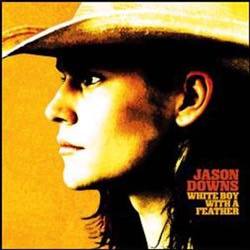
Does it work? I think it might. The starting point is country music, heavily influenced by American singer/ songwriters and NY rap. With a sense of humour and even irony. If anything as the CD progresses it gets softer and back onto more familiar territory. Definitely different.
Colin Edwards
[Ed. He's got the looks and the hat. Mixed race, Native American Jason has also got the attitude!]
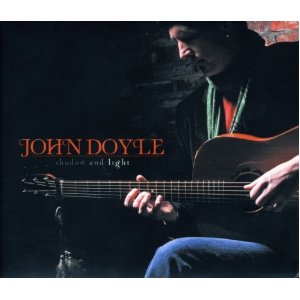
John, founder member of Irish-American supergroup Solas and latterly also member of Joan Baez's backing band, has been increasingly renowned for his singing and songwriting since the release of his first solo album Wayward Son all of six years ago, and its successor, Shadow And Light, builds on that prowess with a further collection that manages both to expand his musical envelope and to consolidate his expertise.
Of course, the disc also contains plenty of John's scintillating guitar playing, which after all was how most of us will have first encountered his skills; the disc's two instrumental selections are predictably breathtaking, especially the storming Swedishish and the equally deliberately virtuoso Tribute To Donal Ward/The Curraghman set which forms a by turns wistful and nifty – but always admirably delicate – finger-picking homage to John's late and much-lamented uncle. But John's signature natural and undemonstrative playing (of bouzouki, mandolin and mandola as well as sundry guitars) is a salient feature of the disc, underpinning his traditionally-inflected songs in the most apt manner imaginable.
Whether contributing just a driven and well-pointed solo accompaniment to a song (The Arabic, a family ode concerning his grandfather's rescue from a German submarine attack, and Wheel Of Fortune, a first-person narrative set in the time of the gold rush) or pulling back the shades of his own playing to let other musicians shine (as on Liberty's Sweet Shore, Clear The Way and the country-flavoured Bitter Brew). John's songwriting talent seems to know virtually no bounds, as it expands to encompass affectionate love songs (Little Sparrow, penned for his daughter), a beguiling retelling of the Selkie legend inspired by a curious dream, the rousing American Civil War-set disc opener Clear The Way and the biting, Great War-inspired Farewell To All That – all of which prove John as a master of the songwriting idiom.
The one traditional song on the album, Bound For Botany Bay, fits in this illustrious company like a glove – even so, John has adapted the time-honoured Whitby Lad variant into an intrinsically Irish version partly of his own devising. As if all that expertise were not enough reason to buy this CD, assisting John with the songs' instrumental backdrops we find a hand-picked team of exceptional musicians including Tim O'Brien, Alison Brown, Stuart Duncan, Dirk Powell, Todd Phillips, John Williams, while others of equivalent calibre turn in the occasional cameo (including Michael McGoldrick on both uillean pipes and flute during the second of the instrumental tracks). The icing on the cake is John's own careful yet vibrant production. An exceedingly masterly disc.
David Kidman May 2012
John Doyle - Wayward Son (Compass)
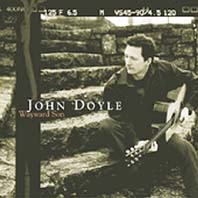
There's nothing wayward about the musicianship of guitarist and singer John who as co-founder of Solas remains at the forefront of the ongoing renaissance in Irish traditional music. John once again demonstrates his impeccable credentials with a new album of well-chosen songs and tunes on which he enjoys the instrumental and vocal assistance of a dozen illustrious guest musicians and singers. John's guitar is to the forefront of all the tracks, driving the rhythm along exactly as you'd expect yet also delivering some tastefully tricky runs and fills of the type that astound and delight and for which he's always been renowned. It may come as a small surprise to learn that only four of the twelve tracks are purely instrumental, but John's blessed with a fine singing voice, which in the band context and on previous offerings has been undervalued I feel so Wayward Son redresses the balance to some extent. The first of the instrumental tracks is perhaps the best of the four, a glorious jigs-to-reel set ending up with the tune after which the album is named, but in truth you just can't fault any of the tune-sets, especially as John's taken such care to clothe them all in significantly different garb. I thought the concertina and whistle combination (courtesy of John Williams and Seamus Egan) backing John on the unusually-metred track 11 set of reels most beguiling (though it's a pity the set is faded), while the characteristic blend of Messrs McCusker and McGoldrick is heard to good advantage on the Tie The Bonnet reel-set (track 8). And speaking of the McCusker connection, who but a certain K. Rusby should crop up singing a duet vocal on Bitter The Parting, a song penned by John himself to which Kate's vocal qualities are perfectly suited, indeed this song could almost have been taken for one of her own compositions with its acute feel for the traditional idiom. John also turns in a fine version of The Apprentice Boy, for which he uses the delightful tune that Cathal McConnell sung on an early Boys Of The Lough recording, and makes an unexpected but most successful excursion into old-time Americana with Little Sadie, a song from his adopted home-territory of North Carolina, with Stuart Duncan's whining fiddle an ideal foil for John's vocal treatment of the tale. The jewel in the crown as far as the songs are concerned, though, is The Month Of January, on which Linda Thompson duets with John in an intriguing harmony vocal arrangement that imparts a bleak and chilling quality entirely befitting the words. As well as John's necessary signature presence on every track, a further unity is imparted by the presence of Danny Thompson on bass for the majority of the selections, and Kenny Malone's percussion enhances around half of the tracks too. I shouldn't need to mention contributions from Alison Brown, Liz Carroll and Tim O'Brien, but should you not be convinced of the excellence of this CD already… !
David Kidman
Delta Moon - Howlin' (Delta Moon Records)
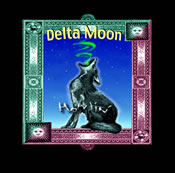
The cover has a wolf howling at the moon so are we in for some Howlin' Wolf blues? The answer is no but what Delta Moon offer is blues and roots in a style that is very much their own. Howlin' opens with the meaty You Don't Have To Go, which has dual slide guitars from Tom Gray and Mark Johnson added to Kristin Markiton's sultry vocal. This all adds up to blues/rock of the highest standard. Higher Ground is not the Stevie Wonder song but rather another original from the band. Tom Gray's husky vocal works well with Markiton's on this country blues influenced offering. The band is already tight and Johnson produces some classy slide. Must Be Lonely is some more country rock and is a fine example of how well Gray and Markiton's voices go together.
Midnight Train is, in my opinion, the standout track on the album. This is one that I want to rock to and Scott Callison on drums and Phil Skipper on bass show how good a rhythm section they are. There's more country inflected roots on Put Your Arms Around Me but this is not their best. Low Country Boil is more like them - this is swamp music and you better believe it. Officer is a bit of a missed chance. It is a good blues based Southern rock track but the sound is just not full enough. The electric Blue Highway has funky piano from Gray, good vocals from Markiton and Callison keeps things together on drums. If anything was to be described as Delta Moon's style then this would be it.
The strangely titled Tiltawhirl is a solid blues rock song and we get the fuller sound that we sought on Officer through Let Tomorrow Be. This is a bit 70s style rock (not that that's a bad thing) and it is Johnson who excels here. Lovin' In The Moonlight is the closing track and is full of sultry southern roots references. All in all, this is a good introduction to the music of Delta Moon - I think I'll go and find some more.
David Blue
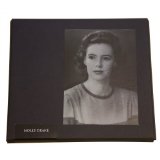
Initially released in a limited edition of 500 copies and rather modestly promoted by the Drake estate, this, as producer Joe Boyd puts it, is the "the missing link in the Nick Drake story ? there, in the piano chords, are the roots of Nick's harmonies". Molly was Drake's mother and, while she never released any of her own music, during the 50s and 60s she did amass a collection of reel to reel domestic recordings and husband Rodney cut several of her songs to three one-off vinyl discs, the CD depicting the label they bore.
Two of the 19 tracks on the CD have been previously released with both Poor Mum and Do You Ever Remember surfacing on the Nick Drake compilation Family Tree, but otherwise none have ever been officially available. Generally around the two minute mark, the material's drawn from the reel to reel archives and while the sound reflects their origins and the 60 years in storage, there's an alluring quality about them.
Accompanying herself on piano, her songs very much reflect the times, calling to mind the sort of music that might have been heard on the BBC Light Programme of the day. Indeed, her breathy, soft and slighty fuzzy (though that may be the age of the tapes) voice and BBC English enunciation and accent may well put older listeners in mind of Listen With Mother presenter Daphne Oxenford.
The songs are generally sentimental ballads with an intimate fragility - and a lyrical sadness - that would find equal expression in her son's own songs. With titles such as Fine Summer Morning, Woods In May, Cuckoo Time and Breakfast At Bradenham Woods, you can see where his love of pastoral imagery came from too.
Accompanied by a booklet containing some 45 hitherto unpublished poems (many written in the 30s and 40 when she and Rodney lived overseas in counteries such as Burma and India) variously addressing love, regret, identity, war, isolation, and nature with most imbued with an aching sadness, they may well cast light on Nick's music, but it would be a shame if they were not also appreciated in their own right.
Mike Davies March 2013
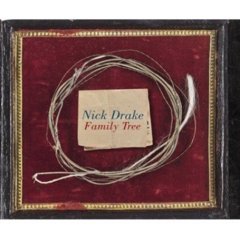
First, the "complete recorded works" set Fruit Tree had supposedly presented in one handy box all the Nick Drake we ever needed; then in 2004 came along Made To Love Magic, ostensibly a "mopping-up exercise" which contained among other delights a rich pearl in the shape of a newly-discovered, long-forgotten song (Tow The Line). Fans had by then gained access to a handful of bootleg discs, the latest of which had purported to contain "the complete home recordings" (made at Nick's mother's house in Tamworth-in-Arden) which pre-dated the three studio albums; surely that would have been the last word, and there really was no more to be unearthed? But now along comes a new "official" collection, Family Tree, masterminded by the managers of Nick's estate (his sister Gabrielle and Cally Callomon), which presents a co-ordinated sequence of what are described as "period amateur home recordings that capture the sketches of a burgeoning songwriting genius as he learns his trade" (that might be over-egging it a bit I feel, but we get the gist!). Drawing from recordings made at home and during his year's sojourn in Aix En Provence (1967), a key period in his artistic quest, Family Tree deliberately tells a story of sorts, mostly through performances by Nick himself but also tellingly including within the sequence a couple of songs movingly performed by his mother Molly, and a delightful duet with Gabrielle (All My Trials). And Nick's classical upbringing is represented by a brief snippet of the first movement of Mozart's Kegelstatt trio (where he plays clarinet alongside his aunt and uncle). Overall I'm not entirely convinced by the "story-telling" approach, but the music itself has been extremely capably remastered (some tracks sound absolutely brilliant, and most are infinitely acceptable in comparison with the original flaky tape sources) and there many fascinating insights are to be gained by hearing these recordings. High points will inevitably be the extraordinary original songs like Strange Meeting II and Rain; Nick's distinctly unusual approach to covering Dylan's Tomorrow Is A Long Time; his unorthodox phrasing on Jackson C. Frank's Milk And Honey; and of course the early tryouts of Day Is Done and Way To Blue (the latter piano-accompanied), which prove amazingly rich even without the later Robert Kirby string arrangements. Sadly, my promo copy of the disc doesn't include sleeve notes, so, rather unhelpfully, I'm left guessing regarding the actual provenance and date of individual tracks within the sequence. But it's still evident that the compilers have achieved their goal of assembling "something worthy of Nick's legacy", and I'm sure the "finished package" will be seen to reflect this admirably when it finally gets released in a week or so's time. I can safely say that Nick Drake completists will want this release, whether or not they already have the aforementioned bootleg (and ten out of the 28 tracks on Family Tree are common to both); but it's sure also to appeal strongly to those wishing to gain an insight into his development as a performer (and yes, songwriter - even though much of the material on Family Tree consists of covers), his almost-overnight shift from the Bert-Jansch-inflected, bluesy style of his contemporaries to the strikingly original singer-songwriter he became. I'd consider this new disc an essential acquisition for anyone who's ever found Nick's work an inspiration, not least because during the course of its hour-long span we ourselves are brought closer to his own formative process than hitherto.
David Kidman June 2007
Nick Drake - Made To Love Magic (Island/Universal)
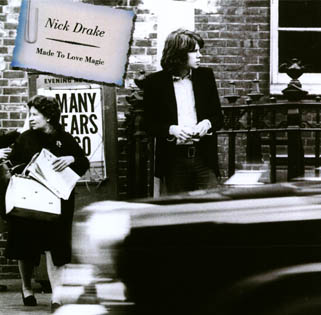
www.islandrecords.co.uk
www.brytermusic.com
David Kidman
Barry Dransfield - Unruly (Violin Workshop)
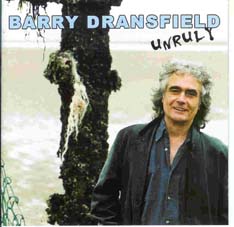
I've long been a big admirer of Barry Dransfield's artistry; he and his brother Robin provided many a formative folk revival experience for local youths I know, and although my own appreciation was conducted at a significantly greater geographical remove I would never underestimate the brothers' seminal importance in the context of that revival. Since the demise of the Dransfields as a duo unit, Barry's retired to instrument-making at least twice, but on each occasion he's made a (seemingly reluctant?) comeback to performing. Last time was in the mid-to-late 90s, with two excellent CDs (Be Your Own Man and Wings Of The Sphinx, both of which still comes down from the dusty shelves more often than many of their companions). This new CD, then, arrived very much out of the blue, with no fanfare. Of course it's welcome, that goes without saying. But first I was rather mystified by the title - for it's hardly "Dransfield goes punk" (now there's a thought!) but actually quite a refined product, in character almost anything but unruly (and in any case, that title's already been used by the ECBB hasn't it?). I'll even admit that on first couple of plays I was distinctly underwhelmed, thinking that Barry was underselling his fiddle prowess and sacrificing it at the altar of some fairly bland guitar playing, but first impressions were deceptive and I think I was judging it a little harshly for there's a healthy amount of fine fiddle playing to enjoy here. Unruly is a purely solo effort, with straightforward voice-and-guitar or voice-and-fiddle performances that on several occasions are overdubbed with further multiple fiddles and/or cello(s) to give a stately consort-like ambience to the arrangements. It's also very much an album that reflects Barry's current place of residence (Sussex), not least in a significant proportion of its choice of material. The opener, Haul Away, for instance, is a gentle, reflective own-composition about the Hastings fishermen. Then, three of the ensuing songs have been learned directly from Sussex traditional singers: Adieu Sweet Lovely Nancy from the Copper Family, the epic Grand Conversation On Napoleon from the mighty Gordon Hall and Constant Lovers from Ron Spicer. The latter works especially well, taken slightly faster than its customary lugubrious singaround pace and embracing a tender lilt that enhances the tune's intrinsic beauty with a compassionate arrangement (perhaps it's as well, then, that on this occasion Barry didn't opt for Gordon Hall's wicked "completion" of the song!). Grand Conversation at first seems a mite dull, with just the guitar framing Barry's singing, but builds nicely over its eight-minute span and again is enhanced by the cello-rich setting. Pick of the rest of the vocal selections for me is Barry's simple and unaffected setting of Mary Webb's Harps In Heaven, three minutes of comparatively unadorned beauty. I was less captivated by Barry's arrangements of the popular Handel arias Where'er You Walk and Silent Worship; although I can see the merit of his treating them almost as folksongs, it's just that I don't particularly rate Handel! I also found Barry's treatment of The Star Of Logy Bay a trifle dull (so perhaps it's as well that he'd cut it down to just four verses). Finally, there's a small clutch of instrumental tracks scattered judiciously throughout the CD; Barry's twin-fiddle version of the Mittel Jigs is delightful for a start, and his winning way of bringing classical and folk sources together is persuasively demonstrated on Glory/Biber, while a short solo set combining a slow air by William Marshall that "just reeks of the Highlands" with a vigorous Shetland reel provides a superb end to the album. (Distributed by Proper.)
David Kidman
Robin, with his brother Barry, together formed arguably the most charismatic of the acoustic duos who hung onto the coat-tails of the 60s folk revival and the ensuing folk-rock scene. They made two of the most influential LPs of the period (Rout Of The Blues and Lord Of All I Behold) for Bill Leader's Trailer label, then went their own separate ways. Robin's solo LP project Tidewave was begun in 1974 during a sojourn in France, but only finally completed five years later in London. The resulting Tidewave album is reissued here in its entirety as the first disc of this two-disc set. It's an unusually eclectic disc by the standards of the day, boasting some imaginative arrangements both in terms of musical settings and source material, even though the bulk of the repertoire is traditional in origin. Robin's version of The Cutty Wren is eerie rather than jolly; recorded in Paris and featuring the spectral hurdy gurdy playing of Christian Gourhan. His take on Spencer The Rover features a "true Yorkshire" brass band arrangement courtesy of the multitracked Bob White and Chris Stearn (and by the by, we learn from the ultra-informative booklet notes that John Martyn first learnt that song from Robin). There's the fun music-hall number When It's Night-Time In Italy, It's Wednesday Over Here, on which Robin accompanies himself on banjo. And delicious performances of The Barley And The Rye (with Lea Nicholson on concertina), The Rigs O' Rye, the Johnny Handle-sourced Faithful Johnny, the evocative Anne Briggs-penned title song. Not to mention a couple of intriguing near-contemporary songs from the pens of Steve Sproxton and Paul Parrish. The only less convincing rendition to my mind is a superficial and brisk runthrough of the Cornish Cadgwith Anthem. But Tidewave proves a splendid album worth exhuming, and sounds just fine nearly thirty years on. Disc 2 of this set presents a live solo folk club set from Robin recorded in November 1972 at Medway Folk Centre. It showcases Robin's inspired choice of repertoire and his keen fun-filled presence in front of an audience, as well as demonstrating his intelligent way of reinterpreting traditional material, his skilful singing and guitar playing. Robin's chatty introductions have been left in, and apart from some extraneous tuning the set is given complete, occasional sound dropouts and all - but it's a reliable and high-quality performance that shows Robin's skill in working a healthy range of material, from songs that would later surface on Tidewave to a mock-medieval instrumental (Tapestry), trad acappella (Cold Blow & A Rainy Night), choice contemporary s/s (Allan Taylor's excellent Still He Sings and Stan Ellison's Lazy Afternoon), and a useful variant of Scarborough Fair (to a rarely-heard tune). This compilation is invaluable, filling in some much-missed pieces of the Dransfield jigsaw, and presentation is right up there with the best standards of the house, with a revealing memoir from Robin himself and plenty of archive photos within the 20-page booklet.
David Kidman November 2008
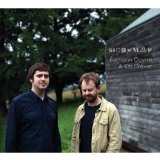
Not counting an EP released for last year's Celtic Connections, Storymap is the second collaborative album to be released by Éamonn and Kris, following some five years on from 2007's acclaimed Honk Toot Suite. But this is a different animal altogether, with what might best be termed a distinctly polarised approach whereby its half-dozen purely instrumental tracks (tune-medleys) are complemented by three songs.
However, that somewhat plain-sounding description conceals an abundance of skill and dynamism; although each of the two musicians is already renowned for his contribution to a major group act (Éamonn with Treacherous Orchestra and Kris with Lau), their collaboration on this album is even-closer-knitted, radiating a keen warmth and palpable sense of true enjoyment of each other's company that brings a joy-filled glow into the ears of the listener from the very first bar of the opening set of reels. Notwithstanding the obvious virtuosity on display, the protagonists clearly feel no need (or desire) to rush onwards to reach the three-minute milepost; they both wear that virtuosity very easily indeed.
Maybe the "storymap" concept – of producing what are, in essence, stories in miniature mapped out over a portmanteau format – is a little stretched imaginatively, but the music tells its own story without resorting to any pretension, and each specific combination of tunes has been thought through carefully and makes a telling impact on its own terms. Whether it's the stirring, if frenetic, Marches And Reels set, the brilliant Teddy Bears' Picnic Jigs finale or the tour-de-force Goat Walk (on which the tender Mickey Finn's Air and a fine tune composed by Kris himself are finally ousted by the rabble-rousing Abe's Retreat), the partnerships, both material-wise and musician-wise, are exemplarily judged.
Another of the disc's instrumental high points is the fabulous penultimate track, Pot Luck, which shows just how much mileage can be got out of a simple duet on two guitars (six-string and tenor). Most of the tracks employ some guest musicians – notably Megan Henderson (fiddle and harmonium), Calum McIntyre (drums), Nico Bruce (double bass) and Eamonn Nugent (bodhrán).
But I really mustn't undersell the songs, each of which receives a standout vocal performance from Kris. His interpretation of May Morning Dew (which also features Henderson's specially evocative fiddle playing) comes close to rivalling the treasurably intense reading from Sherburn & Bartley, and his passionate treatment of Isle De France also enables Éamonn to showcase what he calls his "electric-guitar-style-tremolo tenor guitar" (a wondrous texture, to be sure), while Farewell To Stromness brings in Eliza Carthy for a lovely, characterful harmony vocal. The whole adds up to a marvellously clear-sighted and deeply engaging album, as much of a real treat for the listener as for the participants. Thanks, guys.
www.krisdrever.com
www.eamonncoyne.com
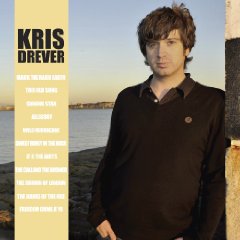
Not long since, this was the cry: "I say I say I say – when will Kris get round to recording a followup to his award-winning Black Water album?". To which came the reply: "When time all-Lau-s!" (yo ho ho)… And I'm pleased to report that's now happened, for Mark The Hard Earth has just been launched at this year's Celtic Connections festival and is all ready to hit the shops on 8th March, with full promotional copies of the CD landing with commendable efficiency on reviewers' doormats in plenty of time for a decent considered assessment (other promoters would do well to take a leaf out of Navigator's book here!).
Mark The Hard Earth, much like Black Water in fact, contains a selection of songs that Kris has known and played over recent years, supplemented by some newer songs written by various friends and collaborators – and in this case, just one item (the title song) composed by Kris himself. It's a strong set, but it took more than a couple of plays for it to reveal its strengths. The disc's prevailing musical idiom is at times more akin to country than traditional folk, notably during its first half; this is doubtless partly due to the presence of Tim O'Brien (bouzouki, mandolin, banjo, fiddle and vocals) on over half of the tracks, and partly due to the sociable, relaxed nature of the session playing generally. For also variously contributing here, and skilfully as ever, are the album's producer John McCusker (fiddle), Ian Carr (guitar), Phil Cunningham (accordion), Donald Shaw (harmonium) and Roy Dodds (drums), while Ewen Vernal and Andy Seward share bass duties and Kris's own guitar playing is a model of effective restraint, at times almost unobtrusive to a fault.
The easy amiability and often understated nature of these contributions can give a superficial, and slightly misleading, impression of the depth of the content. Having said that, the title track, which kicks off proceedings, might appear quite dour, even monotonous (where's the tune, I can hear you cry, for its descending three-note motif is constantly repeated, with little melodic interest or variation occurring until much later in the song, except within the subtly changing backing chords and harmonies); but it turns out an interesting song with an insistent premise (railing against "being told what to like by televised aspirationalists", Kris tells us). There are two attractively wistful songs by Sandy Wright (Shining Star and Wild Hurricane) which share an easy lilting slow-waltz-tempo, while the companionable This Old Song (from the pen of the Foghorn String Band's Caleb Klauder) ripples along like an old Carter Family number (except for a strange and disconcerting little irregularity in the chorus tag section).
The more consciously riff-based philosophy of Allegory (by Guadalcanal Diary mainman Murray Attaway) is initially harder to connect with, but worth persevering, whereas the genial gospel vibe of Boo Hewerdine's Sweet Honey In The Rock, though providing quite a contrast, also suits Kris's delivery well. The latter is one of three tracks where Kris is vocally augmented by (part-time touring partner) Heidi Talbot; she takes a more formal duet role on The Banks Of The Nile, and mildly embellishes the traditional O' A' The Airts. Phil Colclough's Call And The Answer is given a chirpy uptempo bluegrass treatment: pleasing, sure, but quite different from the passionate and more measured renditions I'm used to. Kris's brother Duncan has contributed the telling anthem The Crown Of London, which sits well in conjunction with Hamish Henderson's celebrated Freedom Come A' Ye, the disc's stirring finale, on which Karine Polwart duets with Kris.
By the time I've completed four or five playthroughs, I'm fairly convinced that Mark The Hard Earth will be a contender for the 2010 awards. Only one thing's missing from the package - the lyrics - which will no doubt be available on Kris's website in due course.
David Kidman February 2010
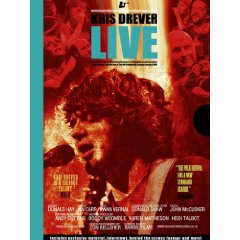
This DVD presents a permanent record of Kris's well-received appearance at Glasgow's Fruitmarket during this year's Celtic Connections festival. It may be a moot point this, but there's a danger at first that one might from a glance at the box be tempted to class this release a non-essential purchase, since it intentionally replicates the menu of Kris's hit CD Black Water - well, almost (see below) - but in truth, once you've actually viewed the disc, this is unlikely to be an issue in the slightest, for it forms a complementary as well as supplementary issue, and thus a true companion to the audio CD.
The actual performance is faithfully captured, 55 minutes of music with minimal editing (only some between-numbers tuning and personnel-shuffling has been excised, so far as I can tell) and a good live sound balance. Kris is on splendid form of course, both vocally and instrumentally, and he proves an unassuming yet persuasive host for the gig. His own singing and playing are both ably counterpointed and thrown into bold relief by the contributions of his backing musicians (Ian Carr, Andy Cutting, John McCusker, Donald Shaw, Donald Hay and Ewan Vernal), and the whole ensemble really gels as a working band when the full resources are utilised. They really rock on Patrick Spence, and Poor Man's Son has a good-time vibe that recalls the Malkies as much as the Waterboys. But even though there's no individual contribution that's lacking in any way, Ian's nifty guitar work is a particular feature, ever attentive and playfully weaving into and around Kris's own picking; the Rodney's Glory set (with John McCusker) is spellbinding in its shift from beautifully contoured slow air to Jim Donoghue's Reel, but Honk Toot is even more scintillating, a breathtaking feast of nimble showmanship.
As for the songs, there are isolated instances where I marginally prefer the Black Water album versions (Harvest Gypsies, for instance, sounds a mite rushed here), but Kris has really honed his interpretations of these songs over the couple of years since making the original record and the live band chemistry provides the ideal setting for their present-day portrayal. There's also some beguiling backing vocals from Heidi Talbot (Braw Sailin' On The Sea), Karen Matheson (three songs including Navigator, which also brings on Roddy Woomble). As for the almost-replication question, it's worth noting that the original CD's running-order is faithfully followed, with the sole exception that Farewell To Fuineray is inserted in place of Fause Fause (one of Black Water's standout tracks, I thought at the time). After Navigator, we also get a bonus track in the form of an encore, a quite frenzied solo rendition of Shady Grove by Kris - this track is also given in a multi-angle version on the parade of extras that's appended to the main menu. These include a zany interview with Lau, some behind-the-scenes footage and the inevitable photo gallery, but arguably the most interesting extra item is a brief interview with Sandy Wright, writer of Black Water's lead song Steel And Stone, together with a performance by Sandy of that very song. The one detail omitted from this fine package is the writer credits for the material performed (for not every purchaser will have access to the original album).
David Kidman October 2008
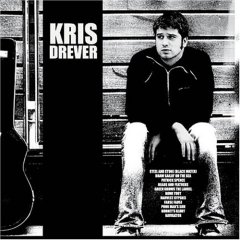
A new addition to the singer-songwriter ranks, Drever is a Scottish multi-instrumentalist with a voice reminiscent of the late great Stan Rogers. The son of Wolfstone member Ivan, he started singing and playing in the Orkneys when he was just 13, moving to become a fixture on the Edinburgh folk scene when he was 17 as well as touring with the likes of John McCusker, Karine Polwart and Kate Rusby, for whose band he supplies guitar.
Now he makes his solo debut with a stunning acoustic collection of songs that features guest appearances from Rusby, Idlewild's Roddy Woomble and Eddi Reader. Rich, and heartfelt, it ranges from traditional numbers like Patrick Spence, Green Grow The Laurel and Braw Sailin' On The Sea to contemporary social themed contributions such as Boo Hewardine's Harvest Gypsies, Phil Gaston's haunting Navigator and Edinburgh writer Sandy Wright's title track lament Steel & Stone (Black Water). He's just picked up the Horizon Award for best newcomer at the Radio 2 Folk Awards, and is setting out as support to and backing musican for Reader. The betting on folk debut album of the year starts here.
www.krisdrever.com
www.myspace.com/krisdrevermusic
Mike Davies February 2007
David Kidman January 2007
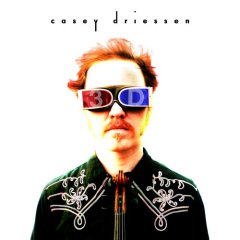
OK, so this is a brave album for a bluegrass fiddler to make in these pure-roots-conscious times. Infused with elements like programming and beats on some tracks, it won't be to everyone's taste. Casey's still young (27), but has always been considered a prodigious talent; though trained on both violin and fiddle from an early age, he was headhunted by Steve Earle for his Bluegrass Dukes Band while still to graduate! Subsequent touring with Darrell Scott, Chris Jones and Abigail Washburn led swiftly to a by-all-accounts-amazing trio tour with Bela Fleck and Bryan Sutton last year.
His reputation for mixing tradition with innovation had clearly spread, and Casey's latest project 3D continues in that spirit; on it, Casey fearlessly reinvents old-time and bluegrass tunes, often quite aggressively and with a distinct jazz ethic - so much of the album may well not appeal to the purist bluegrasser. But for those of an open mind it's a most stimulating exercise, and while some tracks come off better than others Casey always insists on bringing something new to the mix and it's a welcome sign that Casey's boldly unafraid to try out different kinds of treatment. The Sugarfoot Rag/Freedom Jazz Dance medley thrives on a gently funky hoedown groove, while on Jerusalem Ridge that old Bill Monroe tune provides a platform for some serious exploration that gets to visit some weird and wonderful locations, and Dock Boggs' Country Blues gets dusted down with lowdown grit and growly gravel for a Garcia-like workout. The Confusion Before Dreams evokes rather powerfully that strange pre-sleep stage, 2 am fast-forwards to the state of jet-lag with some superb dobro counterpoint, and Lady Bowmore inventively crosses high'n'lonesome with a Scottish-sounding air; in contrast, the vivacious wild-man fiddle-drums duet (track 7, a kind of Irish'n'American medley with classical overtones) is a real hoot. And although Casey's star is well in evidence throughout the album with some stellar (and stratospheric) playing, he gets to share the soundstage around a bit with Darrell Scott, Jerry Douglas, Bela Fleck, Viktor Krauss, Tim O'Brien and Cleveland's world-aware percussionist Jamey Haddad - fellow musicians who clearly and audibly believe in what Casey's doing, I'd say; as do I.
www.caseydriessen.com
www.myspace.com/caseydriessen
David Kidman, July 2006
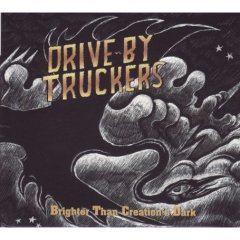
There's been disruption and refreshment since the last Drive-By Truckers album. Jason Isbell has departed, John Neff has become an official part of the set-up on pedal steel and guitars and, for this album at least, Spooner Oldham has brought his keyboard playing into the mix. With nineteen tracks - an hour and a quarter of music - this is a big album; quaintly, the tracks are listed as sides 1 - 4 on the back of the cd cover, just like in the old days.
Well, it's pretty mighty stuff; Patterson Hood contributes most of the songs but there's seven from Mike Cooley and three from Shonna Tucker - her first songwriting contributions to the band's recorded output. Each sings lead vocals on their own compositions, each as strong and characterful as the others and this in itself gives The Drive-By Truckers a breadth and depth that leaves many other bands looking one-dimensional. Add in the interplay of guitars, keyboards and rhythm section that the Truckers revel in and you have a band with pretty phenomenal strengths.
The album opens quietly with 'Two Daughters and a Beautiful Wife', a Patterson Hood song that contemplates the effects of an unexpected death. Spooner Oldham's sparse piano contributes a lot to this quietly dramatic song. After a couple of pretty heavy rocking songs with the band conjuring up a fair old maelstrom, Shonna Tucker's song, 'I'm Sorry Huston', comes as the most brilliant contrast: a slow, soulful country rock number with gallons of pedal steel and constrained electric guitar building a stack of atmosphere.
And the contrasts keep coming: 'Perfect Timing' is a largely acoustic country shuffle with an impeccably picked lead acoustic guitar from John Neff; 'That Man I Shot', one of two songs that identify with the confused foot-soldiers caught up in a stupid war, is a harsh yelp of pain, an evocation of the numbed shock that follows a traumatic event. This song is actually quite similar in tone to 'The Righteous Path', the chorus-free rocker at Track 3 that is pretty much four minutes of Patterson Hood yelling the same few notes over and over. This grates a bit because I don't think his voice has the power to carry it off, but I have to say it's the only thing in the whole album that I didn't quite go for. His singing on the poignant 'The Opening Act' is lovely, and with no other two songs sounding quite the same, my favourite song on the album keeps changing.
There are ways in which this is John Neff's record: his pedal steel playing is pretty extraordinary. Sometimes, in the background, it's like the cicadas on the soundtrack of a western, producing atmosphere without you really being aware of its presence. At other times, his guitar swirls and swoops above the band, lyrical and magnificent.
When the Truckers extend the instrumental tails to their songs and allow the interplay of the different parts of the band to develop, it's a wondrous thing to pick out the elements contributing to the beautiful noise and feel the weight of Brad Morgan's drumming holding it all together. And then, as in 'You and Your Crystal Meth', they'll go for a sparse sound with a little repeated piano phrase and it's just as powerful in its own way.
'Brighter Than Creation's Dark' is a complex and magnificent beast, one to 'play loud and play often' as Patterson Hood suggests.
www.drivebytruckers.com
www.myspace.com/drivebytruckers
John Davy March 2008
[Ed note: The Truckers play five UK dates early August 2008]
Drive By Truckers - Southern Rock Opera (Lost Highway)
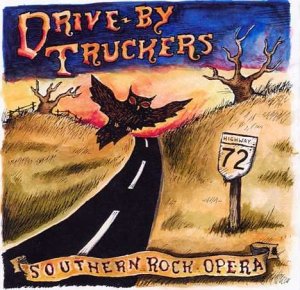
Drive By Truckers first came to my attention with their Pizza Deliverance CD. Southern Rock Opera may not be as dramatically titled but it's certainly dramatically themed. Loosely based around the story of Lynyrd Skynyrd, the music draws its inspiration from those days of hard rockin', beer swilling, fun loving, good ole boys from Alabama. Patterson Hood, son of respected Muscle Shoals musician David, is the guy behind the project. As the sleeve notes tell us, his musical heritage was wrapped up with the early days of Lynyrd Skynyrd and the band became a natural touchstone in his life.
This double album throws up plenty of contradictions with reverential sitting side by side with tongue in cheek. Ronnie and Neil pokes fun at their 'feud in song' following on from Neil Young's dig at the locals on Alabama from his Harvest album. Whilst the Dead, Drunk And Naked track is the first of a number of tributes to Ronnie's Lynyrd Skynyrd. The rap of The Three Great Alabama Icons harmlessly takes to task George Wallace as well as the good guys American football hero Bear Bryant and, of course Ronnie Van Zant. Mind you on Wallace, George ends up in hell in true 'opera' style. By the time of the second CD, we get more into the tale of Betamax Guillotine – our spoof southern band. Let There Be Rock, Road Cases, Shut Up And Get On The Plane, etc. You get the idea and we all know what happened to the plane.
It is already selling like hot cakes in the US. However, I suspect that the appeal won't spread too far outside of America's southern states. Certainly, spreading this concept across two CDs will be a test to anyone whose attention is prone to wander. On the other hand, the rock opera isn't dead and if you hanker after those Alabama type guitar riffs along with some that sound like Neil Young at his finest, then, walk this way to sweet home Alabama.
Steve Henderson
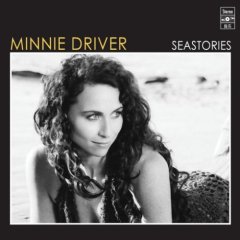
A singer before she became an actress, Driver finally got round to releasing her debut album a couple of years ago. Now she's found time between career reviving TV series The Riches and getting pregnant to record a follow up. Recorded in New York with Ryan Adams and the Cardinals and in LA with her own backing band, it both complements and expands on its predecessor with a mix of waltzing dreamy pop ballads (Stars & Satellites), high lonesome country (Beloved), blues (Cold Dark River), torchy piano ballad jazz (Lakewater Hair) and even Latin tinged deep Southern brooding soul-country (Mockingbird). There's a little less Dido or Cowboy Junkies to the voice this time, but you'll still hear Gillian Welsh in there while Stevie Nicks comes to mind on several occasions and, to prove she can do more than slow waltz, King Without A Queen is an uptempo, pedal steel driven country-rocker that nods in the Lucinda direction while Mary really cranks up the guitar outage.
The self-penned songs pretty much hang on the central theme of love, from failed relationships to those unrequited or lost to unconditional (London Skies apparently inspired by her father) and redemptive. Generally speaking though, while there's regrets there's no recriminations, Driver grateful for moments shared, memories made, lessons learned. All f which pulls together to make up an album that, while not obviously immediate, gradually works its way under the skin, as you find things like the six minute Coming Back To Life, the simple acoustic 70 second Love Is Love, the Elton John gone Nashville of How To Be Good and, most especially the starlight-kissed tumbling Sorry Baby (featuring Liz Phair) constantly running around your head.
Mike Davies May 2008
Minnie Driver - Everything I've Got In My Pocket (Liberty)
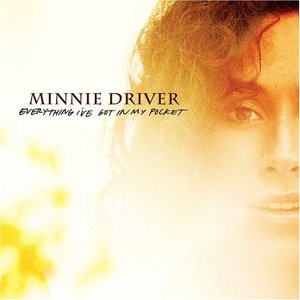
It's taken a while but, having virtually put her acting on hold for a year, she's finally got round to fulfilling her original dream. The solo album. And it's an impressive affair. You'll hear shades of Dido, Sarah McLachlan, Gillian Welsh and the Cowboy Junkies to her warm, roots and folk inflected vocals, her phrasings and control indebted to early years singing jazz standards in London clubs, while the consummately smooth backing's provided by assorted members of The Wallflowers, producer guitarist Marc Dauer and Pete Yorn's band. Drawing on what she refers to as 'major changes in her life', the songs generally concern getting into, out of and over relationships, self-questioning and self-healing. Thus the wistfully bittersweet So Well concerns trying to let go as she sings of not picking up the phone, putting away the photos and passing the house without looking, while both the narcotic Wire and the country shaded Home with its yearning pedal steel are testaments to the power of love to guide you. Singing from the same hymn sheet, the gently drifting ebb and flow of Deeper Water reminds that you have to have the courage to get back into the tide after you've been battered by the waves.
There's lovely stuff here; the languid smokiness that curls around Fast As You Can, the folksy early dawn ache behind Yellow Eyes, the bluesy sensuality and rhythmic pulse of the chilled title track. But above these, three tracks really stand out; Ruby Adeline is a plaintively gorgeous acoustic ballad love song to sister Kate, the autobiographical Invisible Girl provides a missing link between Alanis and Norah and with its cascading chorus could be the one to provide major breakout success, and, in a brave move that could so easily have courted critical vitriol, a stunning slow dance piano ballad recasting of Springsteen's Hungry Heart that deserves to become the definitive alternate arrangement and positively cries out to be heard over the end credits of some classy romantic drama.
Driver's a fine actress, but if this album gets the attention it deserves and she finds herself at another career crossroads, it has to be hoped this time it's Hollywood that takes the back seat.
Mike Davies
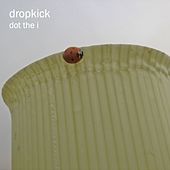
You never ever tire of listening to a band making music because it wants to, rather than as a way of gaining a fingerhold on the greasy pole of success. Seven albums in and Scotland's finest country pop/rock band still manages to create an atmosphere of excitement about its music. Dot The I has the feeling of the start of the band's journey, a spirit of adventure courses through the veins of Drop The I, it's the lifeblood that keeps the music alive and vital.
The reason that Dropkick requires such a wide-ranging label as country pop/rock is entirely its own fault. Dot The I floats effortlessly from the bubbly to the downright moody.
While the early part of the album, particularly the sunshine pop of the title track, does bring to mind bands like Weezer and Fountains Of Wayne (not the worst stablemates in the world) once you get past the obvious guitar-driven rock connection, there lies a world of delights which are all of Dropkick's making.
Where Dropkick parts from the literal, sometimes overly sentimental US version of country rock, is in having the good sense to leave well alone, Back Door Key is a career crowd-pleaser in the making but it's the unschooled and non-manufactured energy that is at the heart of it all. The song is left in its best and most natural state.
Everything good about Dropkick and Dot The I, which is just about the lot, can be summed up by listening to Guess You Didn't Make It. Slightly raw, slightly naïve and with guitars reborn as equal partners, the track crackles and fizzes with fulfilled promise.
Far too often bands like Dropkick allow the life to be squeezed out of the music. For whatever reason, many bands plump for the path of least resistance but Dot The I shows that music with slight imperfections and a lot of heart, is infinitely more satisfying and longer lasting.
Few bands would fit neatly into the awkward simplicity of If You Can't Be Mine, a song that is almost childlike in its honesty and then appear just as comfortable with the brooding cloud that is Girlfriend.
With Dot The I, Dropkick has returned to a time when bands weren't typecast simply in order to 'sell', they were either good or bad. Dot The I is the album of a band that plays its music the way it was meant to be played. Call it country rock/pop or whatever you like, the end result is a superb listen and in the end what else do you need?
Michael Mee June 2008
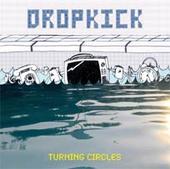
There is something inescapably wonderful about Dropkick's Turning Circles, the only difficulty is deciding quite why it's as good as it is.
Dropkick introduces Turning Circles with the warm waves of melody that make Only For Yourself such a pleasant experience. But the music isn't just built on a foundation of melodies that will bring a nostalgic glow. Give It Back is a superbly natural and unpolished pop song that has surely grown with the band from its early days. There's an infectious naivety running through it, courtesy of vocalist Alastair Taylor.
On Turning Circles, Dropkick is a 'not quite' kind of band, Avenues is a poignant and personal song that hasn't quite committed itself fully to country rock, but then again Dropkick is not a wholly pop or college rock band either, they move easily between the outer fringes of styles and genres. Everywhere you turn there seems to be a twist. Without suggesting that this is a one-man band, much of the band's uniqueness derives from Taylor's voice, on Rewind he appears lost in his own world, he creates a magnetism that is nigh on impossible to escape.
On Turning Circles it's the feeling of promise that is most mouthwatering. The album is a gem, no doubt about it but, as the band continues to grow, the feeling is that the jewels in its crown are yet to be discovered.
Michael Mee June 2007
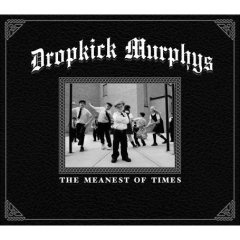
This sixth album from the snarling but "tunefully sotted" Boston,MA-based Dropkick Murphys is a joyous full-in-yer-face 50-minute onslaught of Celtic-flavoured punk that shows they're in no danger whatsoever of running out of steam. School's out, and now it's time to party, to romp thru the streets and make noisy but harmless mayhem... The Murphys have been brilliantly described as "sired from the loins of Johnny Rotten and Shane McGowan", and that's precisely what you get - rampant hard-charging energy, stirring lyrics shouted out at you and exhorting you to join in full-throatedly. No empty rhetoric here, these guys have always meant business. And it's all set to an equally stirring, insistently pulsing musical backdrop of angry thrusting electric guitars, droning bagpipes, fiery banjo, accordion and a touch of mandolin sometimes barely making it thru all the smoke and flames, the upfront pounding battering drumming... absolutely feckin' brilliant! It's great that The Meanest Of Times shows no letup in a long road continuously travelled since the Murphys' debut album Do Or Die ten years ago. Amidst the frenetic cavalry charge there's still room to breathe, some light and shade, and - important - some goosebump intensity moments: like the splendid Rude Awakenings for one, there's a cut that demands immediate replay, and The State Of Massachusetts, and Never Forget too (with its stark and unexpected ending). The band's authoritative cover of Phil Lynott's Jailbreak, while pointing up one critical side of their musical lineage, seems just a little restrained when set alongside the preceding 15 tracks, but no matter. There's also a sprinkling of trad-arr cuts in there too: (F)lannigan's Ball and Johnny I Hardly Knew Ya, while totally recognisable, are streets ahead of the Dubliners renditions and light years away from the ersatz-heartiness of the countless pub-Irish tribute acts that give Irish trad a bad name. On the latter in particular, the moments of repose show - alongside the ultra-tough, aggressive propulsion of the rest - that the Murphys have their spiritual heart and affections firmly in the right place and they really do care about that heritage. Oi!
David Kidman October 2007
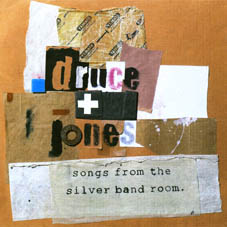
David Kidman
This mainly self-penned album is quite an eye opener. A follow-up to her year 2000 release 'The Guilt Trip' it shows a young blues artist with much to offer. Ably backed by Kevin Willoughby on bass and Chris Smyth on dobro and lap steel Druce shows that she can certainly play guitar.
She only covers five songs on this fifteen-track album. These go from Robert Johnson's Come On In My Kitchen to Robert Lockwood's Don't Drive Me Away. Each of the covers is played impeccably although maybe not all are suited to the female voice. Talking of her voice – it reminded me of Michelle Shocked on more than one occasion and that's not a bad thing, believe me.
Highlights from her own songs are the opening track Call Me, the laid back Maybe Some Day and the title track. If you like your blues of the acoustic variety then you should be well pleased here. If there is currently a better British female acoustic blues player then bring her on.
David Blue
30 years of making music, and DBFS are as popular as ever on the American acoustic (read bluegrass/oldtime) circuit, where they've become a well-loved institution. An anniversary of that vintage is bound to prompt thoughts of the desirability of a compilation, and Rounder have risen to the challenge with enterprise and good taste. Having said that, this 21-track collection concentrates on the purely musical aspect of the DBFS's act (you need to buy their Live At The Newburyport Firehouse double-disc set to experience Ron's hilarious, droll monologues which form such an integral part of the band's stage show). Musically, the DBFS specialise in a particularly rugged and soulful full-throated brand of bluegrass and oldtime, fuelled by the real hardcore southern-gospel spirit. The first thing you notice is the intense and fully committed vocal delivery of leader Ron Thomason: he founded the band in 1976, since which time the band lineup has gone through changes galore almost worthy of a Pete Frame family-tree with Ron the only common factor, and which are represented by tracks from just six of the band's dozen or so records to date. The DBFS provide the connecting link between the aforementioned sub-genres in a way that possibly no other band does – tho' singers like Hazel Dickens come real close, and Hazel pays the compliment of singing with the band on a gutsy rendition of Hide You In The Blood that's taken from the band's previous (all-gospel) compilation album, 1999's Memories That Bless And Burn. Just three tracks are performed acappella: two come from Memories … and one previously unreleased. A further three cuts turn out to be released here for the first time, and they're all brilliant: there's a gentle, lovingly phrased instrumental How Great Thou Art and a gloriously primitive He's Coming To Us Dead which features just Ron solo (accompanying himself on banjo) and was recorded back in 2002 at the Firehouse. Myself, I could've been content if every track here had come from those years when the band included Mary Jo Leet (Mary Jo's harmonies on Dave Gordon's Devil Take The Farmer are priceless) and Suzanne Thomas (her duet with Ron on Long Journey is one of the all-time great DBFS recordings) - not that the current all-male lineup is in any way substandard, but I just love that extra frisson of the ladies' contributions. As it is, this anniversary collection certainly tempts one to dig further into those other DBFS albums.
David Kidman October 2007
Duck Soup, as you may recall, is a Sussex-based trio featuring the diverse talents of melodeonist Dan Quinn, Oysterband's Ian Kearey on 12-string dobro, mandolin, piano, and bass guitars, and multi-instrumentalist Adam Bushell on marimba, mandolin, phonofiddle and musical saw. Ponder anew the possibilities and permutations of that quirky instrumental complement – and not just for its obvious novelty valuye… Duck Soup score high in the originality stakes by bringing a chunky marimba on board, and then move on up a notch further with the occasional incorporation of the phonofiddle (a violin that amplifies its sound through a metal resonator and horn rather than a wooden sound-box).
The first Duck Soup CD was an eponymous effort that came out close on five years ago, and in many respects Open On Sundays "extends our potential shopping week" by giving us more of the same but in a further (and generous, 53-minute) time-slot. All the hallmarks of that earlier disc are present and correct: the splendid musicianship, the musicians' keen feel for the tradition, and importantly, respect for their sources, and yes, the sheer unpretentious fun they're having making their music.
But the three musicians have in the intervening years also moved on in terms of expertise, with an increased confidence apparent in the forward drive of the performances (especially Dan's singing, which though retaining its slightly ramshackle demeanour seems also to have a greater sense of purpose) and the overall presentation of the material. And the repertoire is more adventurous on Open On Sundays, the various tunes being both more cosmopolitan in origin and even more imaginatively staged and combined.
For instance, a blind listen to the set-dance An Suisin Bán (which, like Dan, most of us probably know from the Chieftains 4 album!) might dupe us into thinking it were of Scottish origin; Marche Des Touristes is but one of the selections that might have come straight from those Raymond Scott soundtracks for Bugs Bunny Silly Symphony/Looney Tunes cartoons, while the mildly luxurious Indian Intermezzo is a deliciously exotic little bonbon by Brooklyn melodeon player John Joseph Kimmel. There's also an assortment, nay veritable cornucopia, of cheerful little tunes from the pen of the obscure Alfred Montmarquette, including Marche Des Trois-Rivières (which sounds like Jingle Bells reinvented for a parade of wooden soldiers with a bedspring in their step!). And just try to imagine a roomful of ceilidh dancers getting to grips with Mr. Turner's Academy Cotillion (where the jawing phonofiddle fairly competes with the melodeon and makes a mighty racket for Ian's piano to pump away against)!
This time, no fewer than four of the eleven tracks are songs; there's a hint of Dan's admitted source (Martin Carthy) in his phrasing of The False Lover Won Back, while The Bonny Bunch Of Roses (it's Danny Stradling's version) is done in jaunty vaudeville style (now there's a change! – hmm, not sure about this one yet!). Young Morgan (from the singing of Phoebe Smith) is delectable English-country, and Little Brown Jug a quintessential romp. I've tried to think who else Dan's singing reminds me of (Paul Sartin, or perhaps Simon Ritchie?), but its distinctiveness (and appeal) probably resides in its quaintness, with a measure of almost diffident "stepping-up-to-the-mic for his turn".
Now this is what I call feelgood folk, brightening up the gloomiest of autumn days and leaving a grin all over its grey visage: at times quite intrepid, sure, but totally irresistible (and a snip at just £11).
www.danquinn.co.uk
www.myspace.com/soupofduck
David Kidman November 2010
Drums & Tuba - Killer Vinyl (Righteous Babe Records)

Errr? I thought we were going into the intro to Miami Vice. Actually the first track does play like music to some 70's American crime series. From there it continues with instrumental grooves of loops and electronica funk and jazz, but it's not as confusing as this acclaimed genre-defying band might have you believe. Having a tuba centre stage, though, could be considered a 'first'!
What we have here is an album from Ani DiFranco's Righteous Babe label and co-produced by her. New York-based Drums & Tuba are Brian Wolff (tuba, trumpet and trombone), Tony Nozero (drums, percussion and electronics) and Neal McKeeby (guitars) and their thirteen tracks of echoes and influences hold remarkably well together.
All this shouldn't have you trembling with fear in your acoustic boots. If I like it (and I do) you very well might too!
Sue Cavendish
Drunk in Public is three of the Levellers (the band minus drummer and bassist but plus Rev Hammer on guitar and vocals). Despite the lack of rhythm section and a smaller PA, 'Drunk' are no less raucous, energising and crowd-pleasing than the parent band - and hardly any quieter.
The fearsome foursome's appearance at Kelly's Bar, Leamington Spa, was in many respects a typical pub gig; in other words, a deafening stand-up where the punters' stuck to the floor and the beer flowed freely (often over over hapless members of the crowd). But it was more - it was a fan-fest, and definitely the audience's evening.
Given their two guitars, fiddle, mandolin and sundry Celtic instruments and influences, Drunk in Public fall, albeit loosely, under the 'folk' umbrella. But this is folk with attitude, diddly-di-do-music with balls. Sweaty balls - and the four certainly worked theirs off. Though not as much as the dancing fools out front. As the band rattled through their Pogue-ish punk-ish set of melodramatic Levellers' crowd-pleasers (including Dirty Davey, Julie, Is this Art, It's a Beautiful Day, Edge of the World and The Beanfield), half-pissed dervishes leapt and lumbered, joining in joyously with the sing-along-anthems. "There's only one way of life/and that's your own" - and their way was to pogo and mosh.
Levellers fans have a reputation for drunkeness in public, crowd surfing, and general mayhem. Sure enough, Kelly's boasted its fair share of the tatooed builders-bum-and-beer-belly brigade (and that was just the women) but the crowd was as good-natured as it it was disorderly. Long after closing time, a hardcore residue were still singing round an impromptu campfire on the adjacent carpark. Well, with Glastonbury cancelled...
Needless to say, after God-knows-how-many years at it, Drunk in Public's vocal attack, harmony, rhythm, and instrumental work was as confident and professional as it gets. A great night's entertainment though not suitable for folknik purists, old farts or young ladies of a sensitive disposition.
Andy Farquarson

Chris Duarte appeared on the scene in the early 90s and wowed industry insiders at the South X Southwest convention. Since then he, and his band, has built a reputation as one of the best blues rock guitarists around. From his debut album for Silvertone Records to last years commercially and critically acclaimed Blue Velocity, he has consistently raised his standard, album by album. The latest in that line is Vantage point, which opens with the high impact The Best I Can Do and this boogie follows on perfectly from Blue Velocity. Satisfy is another no nonsense blues/boogie with a very deliberate beat. It has a good time feel much in the Dave Edmunds style. The instrumental, Slapstak, has funky guitar and bass peppered by the drums of Jeff Reilly who has replaced Damien Lewis since the last album. The removal of vocal duties allows Duarte to really display his true guitar virtuosity. More Boogie is a title that should be easy to follow and the song itself has no airs and graces. Duarte impresses with his fleet fingered guitar. Troubles On Me is a slow Chicago blues with an explosive solo and is perfect for the power trio format.
They crank up the speed for Let's Have A Party, another impact boogie but the one disappointment of the album is The End Of Me And You. It's funky but it just doesn't really hit the mark although you cannot fault Duarte's guitar playing. They are back on form with Blow Your Mind, which is a grinding rocker. She Don't Live Here Anymore is heavy rock and has one of the better vocals too. Pounding drums from Reilly lead to an increase of speed after a couple of minutes and the band lets loose for a good old fashioned rocker. Babylon is a Guns N Roses/Black Crowes amalgam with a little Aerosmith thrown in for good measure. What that produces is an expansive track with top guitar work from Duarte. They close with an instrumental, Woodpecker, and that's never a good idea in my book. However, this gives Duarte a showcase for his guitar and bassist Joseph Patrick Moore, Dustin Sargent's replacement, is given a chance to shine. His easy style comes through very well and Duarte's guitar is as fast as Woody himself at times. There are extended versions of Blow Your Mind and Troubles On Me added as a bonus to finally close things off. Duarte has continued his streak of ever improving albums.
David Blue November 2008
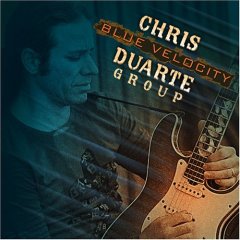
The Chris Duarte Group comes from Austin, Texas and Duarte follows in the steps of Stevie Ray Vaughan, whom he has been compared to on many an occasion. He finished fourth behind Eric Clapton, Buddy Guy and B.B. King is 1995s Guitar Reader's poll so you can imagine what a talent we have here. His previous four albums were all critically acclaimed and I'm sure that this will join the list. Amy Lee is stomping blues rock on which Duarte uses sustain to great effect and grinds it out to the end. Things go a bit more up-tempo on Do It Again and this has more of a vintage feel. Dextrous guitar playing and a classic rock voice make this a favourite. Damien Lewis' rolling drums guide us through Hard Mind but when Duarte unleashes his guitar, the whole tone changes. This is good time music, played by a top practitioner and although it is over 7 minutes long, it certainly does not feel it. The opening to Something Wicked blew me away and this has power all the way. Don't fall for the sedate opening bars and turn up the volume - you are liable to go deaf very quickly. When the vocal comes in, things slow down to an epic blues and blues with such feeling. At over 13 minutes long it sits with the classic tracks of the seventies – get your air guitar out! The pace picks up again for I'll Never Know, another rocker on which Duarte funks it up. The vocal is a little detached at times but there is no doubting his guitar credentials. The rhythm section deserves special mention for Dustin Sargent's pulsating bass and pounding drums from Lewis.
Sun Prairie Blues is a laconic blues with a not so PC lyric but many blues songs fall into that category. Guitar and voice are in complete synchronicity and he keeps things simple, apart from his solo where he rips it up. Never Gonna Change is a total wall of sound with the full band on a rocking tip but R U 4 Real? (I hate text language) is probably the weakest track on the album. Even Duarte's guitar pyrotechnics fail to save this strange one and it is far too long at just under 9 minutes. He is back on form with the straightforward rocker, Out In The Rain and follows it up with a standard electric 12 bar blues, Leave Her Be. This Chicago style blues has a ringing guitar and heavily accented vocals and hits the spot. It's a heavy finish as the band takes it to the limit with Met My Match. It's short, it's sweet and it's a great way to finish. Provogue keeps coming up with more and more top class guitarists and long may it continue.
David Blue October 2007
My own favourite among these reissues has to be the electrifying In Concert, the group's second release, which was recorded at Cecil Sharp House in December 1964; full of raw energy, it was the only album the group recorded for Transatlantic not to feature Luke Kelly (who'd departed temporarily from the group) but instead his short-lived replacement Bob Lynch, while it also marked the debut of new member John Sheahan and the dawning of the era of new refinements and possibilities in expansion of the basic group sound. Ronnie and Bob now shared vocal duties, and the Dubs showed they could do sensitive too with a stirring rendition of Dominic Behan's Patriot Game. In Concert is topped up with tracks from the two EPs Dubliners Sampler and Mainly Barney. As for … With Luke Kelly, this album, the group's recording debut, was also recorded live, albeit in the studio, and packs a fierce punch with its characteristically raucous yet fully accessible blend of music and humour. This reissue adds some unreleased material and tracks from The Dubliners In Person EP.
Finally, Finnegan Wakes was the group's third album, originally released in 1966. Again recorded live, but this time back in Ireland, Finnegan Wakes was effectively the soundtrack to a theatrical review which reflected the country's then-prevalent atmosphere of social and cultural revolution in the Dubliners' most outspoken anti-establishment statement to date, to which the return of Luke Kelly to the group added an even greater political authority. This is a wonderfully solid collection of vigorous, highly charged, often decidedly satirical material performed with typical Dubliners brashness and commitment. It's topped up with an unreleased slice of repartee from Ronnie Drew and tracks from the More Of The Dubliners EP. So, if you want to add to your collection some prime examples of "Irish music with guts", then these three discs just cannot be bettered.
en.wikipedia.org/wiki/The_Dubliners
David Kidman
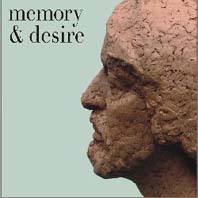
A founder member of Duran Duran, leaving before they turned New Romantic and signed to EMI, Duffy has always been one of my favourite artists, a witty, perceptive and romantic (despite a professed cynicism) writer blessed with an innate understanding of what makes for a beautiful melody and an intuitive pop sensibility that, inexplicably, hasn't always been rewarded by commercial success.
Accompanied by a lyric book with candid observations and recollections on each of the songs, it opens with the title track, his most recently written song that serves as preface, if you will, to "the story of my life." Proceeding chronologically, that's exactly what this is, a documentation of a life in music through the songs and the memories they evoke.
It does cheat slightly with the second track, Aztec Moon, which comes from Dark Circles, the album he made with Nick Rhodes as The Devils. However, while it was recorded in 2002, the song itself dates back to 1979 and, written in his parents' bedroom in Selly Park, was, he says, the first thing he'd done he felt was any good. Inspired by Kerouac's Mexico City Blues, it was an early indication of Duffy's literary influences and his own literate, poetic writing.
After quitting Duran and a brief stint in Obviously Five Believers (their solitary single, Words of Hope is sadly absent), he became TinTin, then Stephen TinTin Duffy and finally Stephen Duffy (as well as adopting a one off alias as Dr Calculus), releasing a series of single and albums to mixed chart fortunes, from which come Sunday Supplement, Catch That Bus, Julie Christie, and Cover, before relievedly knocking the pop star business on the head in 1986 to form the folk inclined Lilac Time.
It's disappointing that Return To Yesterday from the eponymous debut isn't included, but there's plenty of sterling nuggets from the four albums of their first incarnation (among them the home recording trad inclined Bed Of Roses and the wistfully nostalgic Madresfield) before moving on to Music In Color's 'Floydian moment' and Jackson Pollock referencing collaboration with West Malvern neighbour Nigel Kennedy.
1995 saw the release of Duffy (striking a Nick Drake pose on the cover), recorded with the Velvet Crush rhythm section and an ill fated stab at BritPop that produced two Indie Top 10 singles (neither of them here) but otherwise sank without trace. Skipping his Me Me Me hit with Alex James and Justine Welch, 1998's I Love My Friends closes the first disc with the bittersweet acoustic Postcard (a song about a - fictitious- friend's overdose) and opens the second with The Deal, In The Evening Of The Day, and (one of his many songs to talk fo either/or unrequited love and his days in Birmingham) Twenty Three before Nursery Walls heralds the revival of The Lilac Time, subsequently Stephen Duffy and..... To date the new incarnation's released four critically admired but increasingly commercially ignored albums, Looking For A Day In The Night, Lilac 6, Keep Going and, most recently, Runout Groove. They're variously represented here by such numbers as Back In The Car Park (a slice of darkling English folk that marked the arrival of Claire Worrall and Melvin Duffy), the arpeggios tumbling Salvation Song, folk-country shuffle I Want To Be Your Man, the 9/11 sparked Oh God, and the lovely hymn to individualism, The Kite & The Sky.
The final track is also a new recording, a revisiting (and, he says, definitive version) of his biggest hit, Kiss Me With Your Mouth, now transformed into a slow, Eastern drone melody blues unrecognisable from its frothy electro dance pop origins.
In a just world, Duffy would be a revered, globally successful national treasure, But, if that's not to be then, battles with self-destructive indulgence and depression over, happily married, bearded and living in Cornwall, let's just hope that (bolstered by royalties from the 8 million selling Robbie Williams album Intensive Care, which he co-wrote and produced) he continues to find the inspiration and enthusiasm to write and record the sort of well crafted, wistful, romantic, honest and very human songs that have kept the flames of the faithful burning for the past three decades.
PS: Douglas Arrowsmith's documentary of the same name is playing film festivals and a book will be published in 2010.
www.stephenduffy.com
www.thelilactime.com
www.memoryanddesirefilm.com
Mike Davies September 2009

Presumably having made a few bob as co-writer and musical director for Robbie Williams, the erstwhile Brummie's been able to fund a new album of his own. Of course, pretty much like all the others, it will receive glowing critical acclaim and be much cherished his loyal admirers but be completely ignored by the bulk of the population. Their (though unfortunately also his) loss because, yet again, this is a lovely collection of country inflected pastoral British pop music, this time with the band joined by veteran double bassist Danny Thompson.
It's very much a reflective album, Duffy getting back in touch with himself and his inspirations after the Williams madness. Thus you'll hear the strains of the Incredible String Band and George Harrison seeping through the trad-sounding Parliament Hill Fields and the raga-rock folk of Dark Squadrons, cellar club jazzy folk on No Direction (Thompson in fine fettle) while he says the touchstones for the gorgeous pedal steel rolling Driving Somewhere were Townes Van Zandt in Two Lane Blacktop and Fleetwood Mac's cover of The Beach Boy' Farmers Daughter.
Then the strummed ache that is Desert Shore was birthed after driving through the Mojave Desert listening to the Nico album, although musically it sound more what you might expect from James Taylor had he been born in Sussex and spent his days apple scrumping.
He's to be found pondering the changes the world's been through over the years too; Aldermaston's a country-tinged folk stroller that recalls the famous protest marches of the 60s while also embracing references to Franco's death and the war in Afghanistan to conclude that the shape of the darkness may change but it remains with us.
With its opening lines 'here they come, the belligerents...every shade of ignorance', the keeningly plaintive slow swaying Another Time is another song about feeling out of sync. "I hope they die before I'm old' he adds with a wry misquote. 'No one can change your world except you', he notes on the lovely closing acoustic guitar number The Kite & The Sky, dreaming of living 'in a lilac time'.
Naturally, there's bruised romance here, going up in Gauloise smoke on Aldermaston, riding pillion in patent leather boots in the hay making and heart harvesting Pruning The Vine (is that a dulcimer plucking away behind him? and the languid romance A Dream Of A Girl (which oddly sounds a bit like Eric Carmen's All By Myself at times). And, of course, on the album's solitary cover, a slow lollopping home on the range trot through the Everlys' Until I Kissed You that you could almost imagine being sung by Roy Rogers and Dale Evans as easily as Duffy and Claire Worrall.
"Don't wish for fame," he sings on Happy Go Lucky, a gathering tempo bittersweet number about being content with your place in the scheme of things, appreciating what you have and making your sorrows work for you. But it would be nice to think it might yet creep up on him unawares.
www.thelilactime.com
www.myspace.com/stephenduffyandthelilactime
Mike Davies October 2007
Here in this fast-paced world, it's only to be expected perhaps that with each new album The Duhks will undergo a further lineup change. And so it proves, for since album number three (Migrations), Sarah Dugas and her brother Christian have arrived, in terms of roles within the band directly replacing original band members lead vocalist Jessee Harvey and percussionist Scott Senior. The musical world the band inhabits is similarly fast-paced, for it moves capriciously twixt different musical modes, from rocked-up gospel (Mighty Storm), tricky tune-sets (including originals from the pens of banjoist Leonard Podolak and fiddler Tania Elizabeth) and contemporary song with twists of bluegrass, zydeco and country. Sarah's vocal personality is undeniably impressive - soulful, strong and rootsy on anything from the slouchingly seductive Sleepin' Is All I Wanna Do to the vibrant percussion-soaked Magalenha - while her overall contribution to the band dynamic is such that her own original compositions are in the ascendance on the new album too (four out of the twelve cuts): these include the nicely melancholy This Fall and one that's sung entirely in French (the more pop-influenced Toujours Vouloir). It's interesting, though, that overall I prefer the songs by Tania (I See You) and Leonard (95 South, jointly penned with Jonathan Byrd) which for some reason are tucked away towards the end of the CD. And I rather liked their more straightforwardly neo-bluegrass cover of Dan Plechette's gorgeous You Don't See It. Instrumentally, the Duhks are at their hottest on this latest album, although one of the three non-vocal tracks (Adam's Three-Step) is little more than a gimmicky squib. To summarise, I'd say that the lineup change has done the band no harm and the newcomers really fit in with the previously-notified Duhks' mix'n'match mission statement (I might say they've taken to the band like Duhks to water!), but as with Migrations I do get left with a feeling of transience that leaves me slightly dissatisfied and wanting more in terms of a unified musical vision.
David Kidman November 2008
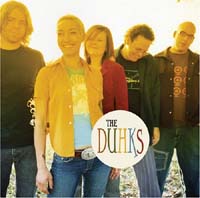
Maybe it's the wonderful weather that's causing this general feeling of well-being, more likely it is the sheer pleasure derived from listening to a group of musicians as talented as Canada's The Duhks.
As you listen to their debut album you can't help wishing it was always like this and that every band would play with as much freedom, of course they can't because they haven't got the five talents that make up The Duhks.
As a band, although collective is more accurate, The Duhks is the brainchild of Leonard Podolak and is pronounced like the bird, in fact it grew out of an earlier band Scruj McDuhk. Podolak, already immersed in Appalachian and country music, gathered round him fiddle player Tania Elizabeth, guitarist Jordan McConnell, drummer Scott Senior and singer Jessee Havey.
While that line up sounds all well and good, there's nothing startling about guitars, drums, banjo and fiddle. However, Senior plays a handmade Cajun drum, learnt his Latin rhythms in Havana and his salsa in New York, while Havey has the kind of bottomless soul voice that a man could wander around for years. Podolak, Elizabeth and McConnell give the whole project its rock solid folk roots.
But it's what the individuals in the band do with the spices at their disposal that makes this a dish to savour. Folk complements country and pop sits happily alongside the wonderfully exotic Du Temps Que J'Etais Jeune, like they've known each other intimately for years. The Duhks is a celebration of life and an explosion of colour.
So the album kicks off with the deep, dark soul groove of Death Came A Knocking and ends with the lighter, slightly poppy, funky folk of Love Is The Seventh Wave. Both are sung by Havey as if she'd spent a lifetime singing soul and then been granted another one as a folk singer. In between there is what can only be described as a world of music gathered in one place.
Mists Down Below and Four Blue Walls have the steaminess of Southern USA hanging over them like a malevolent cloud, both are the kind of hard-edged roots folk most connected with Gillian Welch and David Rawlings, while Gene's Machine is a wild-eyed reel that can't help but conjure up images of rugged places, it is joined quite naturally by the strictly traditional The Waggoner's Lad. Everywhere you look marvellous music is being conjured up. Because The Duhks steadfastly refuse to constrain themselves, or allow their music to fall into any kind of recognisable pattern, it is almost impossible to sum it up, except to say that their joy of playing is multiplied by your joy of listening.
Michael Mee
Taking their names from characters in Huckleberry Finn, the Duke is Simon Felice formerly drummer with the Felice Brothers, the King is instrumentalist Robert Burke, and, joined by violinist Simi Stone and former George Clinton sideman Nowell Haskins on drums, this is their second album. The debut, Nothing Gold Can Stay, was a collection of melancholic dust coated rock, folk, soul and psychedelia with songs of lost innocence, love and a yearning for simpler times suffused with hints of hope and there's not too many departures from the essential template here. Indeed were it not for the backing vocal sounding like some drunk shouting the lines outside the studio, the slowly waltzing opening track Gloria would easily be on a par with that album's best.
The influences ring loud, Harvest era Neil Young notably evident on Shine On You and Have You Seen It (very Cowgirl In The Sand) while the desolate six minute Don't Take That Plane Tonight recalls the lengthy workouts of CSN&Y. The Southern country soul vibe is also more accentuated, serving up the gospel Motown of Right Now and the Sam Cooke meets Aaron Neville feel of Hudson River.
There's a very definite late 60s flavour going down, particularly so on Shaky, which borrows a couple of guitar notes from What's That Sound and namechecks the Jackson 5 in a song about American foreign policy delivered in the person of soldier in Baghdad thinking of home. Fading out on funky horns, it's one of the album's strongest numbers even if it does contain the cringe-making line 'come and shake that country ass'.
They're more poetically inspired in the acoustic strummer weary love song You And I where the opening line runs 'love is a coke dealer's daughter, love is a slave ship at sea, love is a wheel made of sawdust'. On the downside, however, you also get the psychedelic trippiness and backward tape of Children Of The Sun which not only sounds alarmingly like CS&N channelling Donovan's Hurdy Gurdy Man but might make even unreconstructed hippies wince with lines like 'hello children of the sun how does it feel to hold a gun?' and Stone's Munchkin-like backing vocals.
It is, though, a merciful one-off misfire on an album that, rounded out with Stone taking lead on the soulful blues rock of No Easy Way Out, does much to confirm them as Americana royalty.
www.thedukeandtheking.co.uk
www.myspace.com/thedukeandtheking
Mike Davies October 2010
A first album from a new voice, although I gather she's well known around the London clubs, and has played the Edinburgh festival. What a fine voice Becky has too, well suited to this collection of jazz/folk and catchy pop numbers. There is a clear John Martyn influence, among others - her choice of Danny Thompson on bass is surely no coincidence. Bruce Knapp also adds some excellent chunky, as well as subtle, guitar to the mix - and what a mix it is. No shrinking violets here, as the album blasts off with 'Drown in Beige', a superb song of defiance, and continues with a selection of well crafted and very personal compositions, the highlights being 'If You Fall', 'Like It Like This', 'It's The Same View', 'Don't Cross The Line', and 'It's The Way'.
The final track, 'Can You Hear Me' is one of those hypnotic chanted musical works that one really doesn't want to end - I loved this track, and the mandolin really works superbly! One of the best debut albums to be released recently - buy it!!
Jon Hall
We all know Sussex anglo concertina player and singer Will from his contributions to those celebrated ensembles the Albion Dance Band, Etchingham Steam Band, and the Pump & Pluck Band, more recently Bob Davenport's band and his duo work with Dan Quinn. But here he delivers us a refreshingly unpretentious solo disc, on which thirteen instrumental tracks are complemented by six songs. Will's depth of expertise (playing since 1971 and singing since 1973) and breadth of experience are manifest, his degree of accomplishment keen yet unobtrusive. He plays the trusty anglo with an unassumingly natural and entirely genial gusto, but also with evident respect for his inspirations (notably Scan Tester of Horsted Keynes, whose style provides the template and source for nine of the tracks here), yet brings his own brand of lightness of touch and a notable sense of openness of texture (the latter in spite of quite an intense use of ornamentation). This uncluttered stance is also a feature which Will carries through into his lively and committed renditions of tunes from other sources (here ranging from the Sussex Tune Book to Kent and Co. Clare, and even Australia). Incidentally, Will plays one of Scan's own instruments on three of the tracks including the disc's final (overdubbed) set.
Uncluttered and faultless Will's own playing may be, but it also conveys a deft and slightly vulnerable quality that's human rather than mechanical. And we mustn't underestimate the gentle power of Will's singing – both genuinely melodious and fully engaging (I could listen to Will for much longer than just these six songs). The songs are sourced from predominantly Sussex traditional singers, and contain items from the repertoires of Mabs and Gordon Hall, Gladys Stone and Bob Copper. These gems include the excellent but rarely-heard The Iron Door and a version of William Taylor complete with the backwards-counting motif from Spanish Ladies and the delicious Victorian parody of Lord Lovell, Joe Muggins! I also loved the delightful and highly apposite cover cartoon by fellow-musician Tony Hall, which provides icing for the top of this supremely tasty cake.
David Kidman June 2009
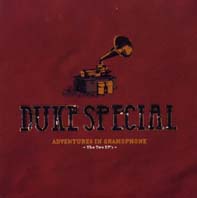
Known to his family as dreadlocked Belfast singer-songwriter Peter Wilson, this debut album compiles his two EPs into one convenient package to offer an impressive portrait of his pop influences and melancholically romantic songs.
On Last Night I Nearly Died he marries his warm Neil Hannon burr of a voice to a Motown beat, Brian Wilson harmonies and a dreamy West Coast pop vibe while Don't Breathe sounds spookily like Daydream Believer and Some Things Make Your Soul Feel Clean at times melodically harks to Wild Mountain Thyme were it to have been written by Stuart Adamson and arranged by Brian Wilson.
An obvious afficionado of the Brill Building era, he favours the dreamily spare piano ballad - viz Kill Me Quickly Please, As Good As It Gets, Love Is A Series Of Scars - but as a clangy guitar stalking I Let You Down (Like a Tonne Weight) shows he can scuff up the carpet if need be. A beguiling album that more than live sup to Wilson's non de music and promises great riches to come.
Mike Davies
On one of those rare, heart-lifting moments of serendipity, when the stars of good fortune are in alignment and the cosmic wheels of fate purr with chrism-oiled perfection, along comes an album that wafts away all the worries and woes of Life with fragrant, Zephyred breezes of delight. Such a moment is this album that includes amongst the sleeve notes the recommendation that it is best listened to through a Linn hi-fi system.
Hardly surprising being that they oversaw the recording process in conjunction with producer, Calum Malcom, he of The Blue Nile, a band renowned for profligate album releases every ten years or so. Having been listening to this album on near rotation both in the car, and slumming it on a recently restored vintage Quad system, and even - heaven forbid, on the iShuffle on the train along the North Wales coast - one shouldn't feel too put upon to immediately invest in wallet-shriveling new kit. But, mind, the production is second to none and it needs air to let it breath, so shun head-phones at all costs.
The reflective, eponymous title track sets the tone for this ensemble of heart and psyche-on-sleeve sad and celebratory vignettes. Scottish-born and a classically trained double bassist (and doesn't it just show) Duncan really is flexing her craft on this fourth album - the previous being self-releases. Second track, Song To Myself, brushes damnably close to Nancy Griffiths' rhinestone lullaby ballad sentimentality, but such is its sincerity and life-affirming harmonic cadences you'd need a Cabinet Minister's heart-void not to be beguiled.
As for the voice you might ponder the poignant-breathed vulnerability of both Joanne Newsom and Regina Spektor (that babbling-brook Celtic tickling harp on Crack In The World) and the subtle, wry nuances of Suzanne Vega - check-out the darker, twelve-string haunting Ivory Tower. You can imagine the lyrical content on that one. Wowing live audiences across the UK in recent months this album nails her singer-songwriter credentials firmly to the mast. At a tad under forty minutes, its comparative brevity enhances the experiences. If you have to jump in randomly, err towards Wild Animals and its entrancing harmonies and cello counterpoint. Very recommended listening. No mp3s please - Calum Malcolm will find you out!
John Kennedy May 2013
The extraordinarily gifted Perthshire piper, composer and folk musician, died in December 2005 aged just 41. On 29th September 2007 the Gordon Duncan Memorial Trust (set up to promote piping and other traditional musics in Scotland, with a particular emphasis on young musicians) presented a fund-raising concert in celebration of Gordon's life and achievements.<.p>
Arranged by Ross Ainslie, it featured performances by many star names from the piping and traditional music scenes, many of whom were accompanied by a specially-convened Concert Band which included members of "supergroup" Session A9 and percussionist "young" Gordon Duncan. This disc draws an hour's worth of performances from that concert, and powerfully captures this "hugely emotional and yet very happy occasion", where every single artist or ensemble is clearly tremendously fired up by the experience of playing to this capacity audience and by the memory of Gordon himself. Given Gordon's own predilections and the musical ambits in which he moved, it's fitting that this CD should encompass an equally varied musical menu. It opens in skirling form with the panoramic sweep of the Atholl Highlanders' Pipe Band in full glorious flight, then moves on through Jarlath Henderson's supremely sensitive rendition (on the uilleann pipes) of the air Taimse Im'Chodlach, a brace of Breton pipe tunes performed by a brace of Breton pipers (Sylvain and Bobo), then performances featuring singer Maggie MacInnes, fiddler Duncan Chisholm and Asturian piper Xose Manuel Tejedor. Master guitarist Kris Drever features on two consecutive selections: a bring-the-house-down session-tune-set in company with piper Allan MacDonald and banjoist Eamonn Coyne and a revisit of Steel And Stone (from his own Black Water album) with Eamonn and Tim Edey.
Inevitably, several items from the programme have specific connections with Gordon: the National Youth Pipe Band perform his '98 Jig, Session A9 Pressed For Time, and most poignant of all, Dougie MacLean sings Charlotte, the song he and Gordon composed together in celebration of their strong friendship and deep bond of musical understanding. And an early comic interlude is provided when Gordon's father Jock delivers a priceless rendition of The Plooin' Match, which involves him sometimes moving about the stage (and almost out of earshot!) when emulating the ploughing of the field; sonic imperfections matter less when you're confronted with such a delightful performance. As if all the above were not incentive enough for purchasing this tremendous live set, then note that all profits from the sale of the album go to the Gordon Duncan Memorial Trust.
David Kidman June 2009
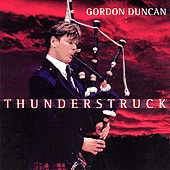
David Kidman
Can't decide if you want to buy a Jonathan Richman album or one by Leonard Cohen. Here's the answer. Opening with the clip clopping Spanish flavoured walking rhythms of the tremendous My Home Is Nowhere Without You, evoving thoughts of The Partisan, songwriter David Ivar-Herman and drummer Neman Herman Dune do near perfect carbon copies of both. For talk-sing Richman fans there's the liting Try ToThink About Me Don't Worry A Bit), the joyous When The Sun Rose Up This Morning, On A Saturday, My Best Kiss, the calypso shimmering Baby Baby You're My Baby and similarly tropical Next Year In Zion and (Nothing Left But) Poison In The Rain. Prefer Len? Then how about When We Were Still Friends or Someone Knows Better Than Me? Ok, so the Richman clones dominate, but that doesn't make it mutually incompatible listening.
Now, from this you might just think why bother, why not just go to the originals. Fair enough. But while the songs may be cheerfully derivative in terms of soundalike influences, they're also endearingly warm, melodically infectious and filled with a joi de vivre and whimsical wit so that, even Lovers Are Waterproof's story about a guy on the lam from the law has him more worried about getting a burrito breakfast. And, really, Richman hasn't written something as good as My Baby Is Afraid Of Sharks is ages. They.re not embarrassed about sounding like the music they love, and you shouldn't be embarrassed about listening to it either.
www.hermandune.com
www.myspace.com/therealhermandune
Mike Davies October 2008
The self-deprecatory tag "Never heard of him..." is etched on young Sam's publicity handout – but I'm sure you will soon! So far, during the past five years, he's performed support sets for - and received prominent endorsements from - Harvey Andrews, Steve Tilston and Ric Sanders. He's "a Birmingham lad exiled in Yorkshire" (Huddersfield), but I've seen him at folk festival and club singarounds all over, from Otley to Alcester, and wherever he performs he makes a big impression, notably with the dynamic quality of his singing. Not only does he have a superb voice and vocal command (he's classically trained - but don't hold that against him!), but you can also tell at once that he really thinks about what he's singing about in order to reach the heart of the song (and I'm with him all the way on that one!); he makes "a real connection with his audience so that they actually listen to the songs, rather than just hearing them". He's tried to carefully nurture "a style and repertoire that can appeal to traditional folkies whilst interesting a whole new generation" (a mission statement that has a whiff of the Jim Moray about it, and thus may be viewed with suspicion by traditionalists, though it shouldn't cause concern since Sam's individual treatments are nowhere near as controversial or radical). And to a large extent, I can buy into his thesis that the pop songs of today are the folk songs of tomorrow. But I must be honest: although Sam's singing (and self-accompaniment on guitar) wins folks over big-time in the live environment due to his careful reading both of the situation and the tastes of the audience, what on the evidence of this debut CD alone may alienate Sam from the folkier audiences at any rate is his fearless choice of material. Stepping Stone contains only three traditional songs (these are given neatly inventive settings as it turns out, if not exactly in the "frighten the horses" category), the remainder being a mixture of his own compositions (three in number, and these much in the acoustic-pop mould) and firmly contemporary (Loudon Wainwright, Lindisfarne, Leonard Cohen, Graham Browning), even venturing a waltz-time arrangement of a message-song by rap artist Pink! Brian Bedford's Wings is given a powerful unaccompanied rendition (among the best you'll ever hear), and Sam also turns in a persuasive version of Dougie Maclean's Caledonia. Boosting his own guitar, keyboard and percussion Sam gets some further limited but effective instrumental support from a string trio, extra keyboard and voices. But while appreciating the thoughtful nature of Sam's interpretations generally, the cultured, cultivated nature of his performances inevitably brings a concomitant lessening of the quality of spontaneity which many lovers of folk music cherish. I'm also less than happy about his decision to skimp on the provision of writing credits for the songs chosen - especially considering his avowed commitment to communicating them. It's hard, too, to escape the occasional notion that while Sam's utterly genuine in his artistic response to a wide range of material he may be either unsure of his intended market or else unconsciously trying to cover too many bases, thus sometimes as a result is not entirely convincing even though the stylishness of his vocal accomplishment gives his repertoire as a whole a worthy, intrinsic unity.
David Kidman October 2006
It's been a while since Judy's ventured into the recording studio, but this, her latest collection, is well worth the wait. Here she delivers a set of peerless vocal performances with brilliantly economical and perfectly complementary accompaniment by Steve Marsh, a well-respected classical guitarist and composer of considerable stature and no mean accomplishment. The range of material Judy tackles here is astonishing by any singer's standards; it encompasses the cream of contemporary (and contemporary folk) songwriters as well as some traditional material, and throughout Judy's commitment to the songs is as clear as is her joy in performing them. This is not to play down Steve's splendid guitar playing: with its classical purity of line and execution, a triumph of technique it may be, but it also makes its mark by virtue of the sheer musicality of its deft brushstrokes and its eminently sympathetic restraint. The guitar is of course a vital element within the tellingly spartan aural picture, but it never draws attention to itself in the way that virtuoso guitar playing often does. There is a limited degree of additional instrumental enhancement on five of the songs: Ruth Angell provides a mini-string section on three including the opener (Graham Pratt's Kerry Is No More), Nip Heeley plays percussion on three and Ashley Hutchings bass on one. It also comes as no surprise to find master musician Gordon Giltrap, writer of the significantly "less is more" liner note, bringing some of his distinctive and superlative filigree playing (baritone guitar) to one track, Wolfe, which sets words by Ashley Hutchings to Stan Rogers melodies (well that's how it sounds - I tried to find out more about this and the other songs on the disc, but the website reference given doesn't deliver the promised further information). So this is a disc whose all-round excellence makes it difficult to critically appraise beyond the inevitable superlatives: all I can do is point to some highlights along the way on its 69-minute journey. Mike Silver's sublime Angel In Deep Shadow receives one of the standout interpretations of the whole disc, and Judy also makes a fine fist of Harry Chapin's early song Flowers Are Red, Carolyn Hester's lovely setting of Whitman's Captain My Captain, and Judy Collins' epic Albatross. No complaints either about her takes on compositions by Jennifer Warnes, Billy Joel and Dougie MacLean, or her energetic (rather than incantatory) rendition of Charlie Murphy's Burning Times. There's only one disconcerting moment, where you hear the tune-shift during this Judy's version of Amazing Grace for the first time! The CD also contains two non-duo items: Evening Star is a stunning seven-minute tone-picture for solo guitar, and The Leaves Turn To Brown is sung acappella (and very beautifully too) by Judy. The latter selection, along with a further three tracks tacked on at the end of the disc, are helpfully annotated as being "archive recordings 1984-1989", and yes, the recording isn't quite as perfect as the rest of the disc but the artistic quality of these tracks is second to none. This disc, being a salutary reminder both of just how (consistently) abundantly fine a singer Judy is and how tremendously skilled a musician Steve is, can thus very probably be considered beyond criticism - which in itself is not an easy judgement for a reviewer to arrive at!
David Kidman August 2008
Singer, whistle and bodhrán player with the acclaimed Scots band Malinky, Co. Antrim-born Mark now brings us his debut solo album, one of real character which consists almost exclusively of traditional Northern Irish songs albeit with a delightful set of reels (of his own composition) and a march thrown in for good measure. Mark's prowess as a singer may have been underestimated in the past, but here he gets the chance to show just how sensitive an interpreter he can be on songs as diverse as The Banks Of Newfoundland (with an admirably sparse, though inspirationally atmospheric setting) and Ewan MacColl's Lag's Song (one of the finest I've heard, and it gains from being sung unaccompanied here). The latter song in particular highlights Mark's seriously accomplished yet entirely natural-sounding approach to ornamentation of line, through which he's able to harness the impassioned expression of emotion: intensely commanding and very impressive. Mark also has a creative way with his sources, as evidenced by his mournful, minor-key take on the hoary pub singalong Black Velvet Band: partly by taking the song at a slow pace, he rescues the song from its normal fate and actually proves it's worth your consideration. He also turns in a delicious rendition of the decidedly strange fable The Quaker's Song (learnt from the redoubtable Pete Grassby, we learn), and a lively Three Huntsmen (a variant of Johnston or The Two Butchers). Mark is skilfully and selectively accompanied at various points on the album by Chris Wright (guitar, cittern, mandolin, shruti box, tabla), Heather Montgomery (fiddle) and/or Steve Byrne (jew's harp, guitar, percussion), and the whole affair is cleanly recorded. A fine addition to the Greentrax catalogue: of that there's no doubt..
David Kidman February 2009
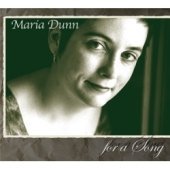
Born in Scotland and raised in Ontario and Alberta, Maria Dunn is a singer and a writer of songs - for which, read storyteller in song. She combines North American folk and country styles with influences of her Celtic heritage, and does so in a natural and appealing way without a trace of artifice or fusion-forcing.
For A Song is Maria's second album, and was first released in Canada back in 2002, only now gaining a wider distribution deal (via Rounder): and not before time, for it's a very fine set indeed, one that makes me want to hear the albums either side (1998's From Where I Stand and 2004's We Were Good People) real soon. Maria's songs are generally concerned with the struggles and triumphs of historical and contemporary characters, whom she brings to life vividly and with a strong feel of intuitive or inside knowledge; several of the songs take their title from these characters' names (Annie Weaver, Nan McGowan, Maggie Thompson).
For A Song features 11 of Maria's own original songs, and backing is provided by Canadian Celtic band The McDades with Shannon Johnson (violin) and Craig Korth (banjo, guitar, dobro) and further guests including Jerusalem Ridge. That is, aside from the 12th track, which is a tremendous acappella rendition of a traditional Newfoundland song Grá Geal Mo Chroi (sung in English). Maria's an excellent singer, and has a natural clarity of expression allied to a forthright purity of tone: a most attractive combination. She can turn those vocal chords equally adeptly to Celtic and bluegrass stylings, as consecutive tracks The Lingan Strike (her energetic tale of the Cape Breton coal miners' protest of 1882) and Lonesome And Then Some show, while the contemporary narrative ballad is well within her ambit too (Maggie Thompson, Heather Down Road), and Poor Lonesome Hen finds her at home with the idiom of the Gaelic waulking song. The reflective What Did I Do? raises more than just the obvious personal question in its memorable musings, whereas Take It Easy On Me presents a beautifully controlled country-ballad setting wherein Maria takes a host of different viewpoints and finds common ground in order to make a plea for social justice. Nan McGowan may not go quite as far as the proverbial stitch in time, but she sure stands up to her drunken husband (to a disarmingly merry musical backdrop too!). And the disc ends with God Bless Us Everyone, an inspired "Parting Glass"-type chorus anthem that really should be more widely-circulated.
For A Song is an album that's crammed full of timeless music, seriously high-quality songs (many with incredibly catchy, lilting melodies to boot!) that could've been written yesterday. Its diverse musical influences could so easily have made for an aimless, unsatisfying and inconsistent brew, but through Maria's skill it all comes together to make one of the most impressive records I've heard come out of Canada in recent years, and affirms Maria as a major talent.
David Kidman August 2008
Robyne Dunn - Live At The Basement (Laughing Outlaw)
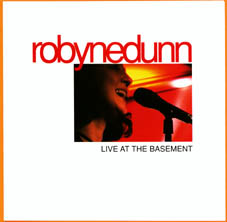
I'm obviously not well up on my Australian female singer-songwriters. Born and raised in Sydney on a diet of Miles Davis and Weather Report before getting in to Costello, Kate Bush and Led Zep, Dunn released her debut EP way back in 1987, since which time she's released three solo albums and played countless concerts. Taped over three nights in 1999, this, her first release in six years is also her first live recording, and, though I'm in no position to know different, apparently puts a spin on her material by setting the songs, drawn from her back catalogue I guess, within a sparse laid back jazz context of piano, bass, drums and sax
I don't know what they sound like originally - though references points have embraced both Tori Amos, Peter Gabriel, Edie Brickell, Joni and inevitably Bush - but here their torchy, late night smoky sultriness certainly grabs the attention with Dunn sounding like some seducing angel, Jane Siberry with the sensual heat turned up.
The performances tends to stick around the same mood, which does tend to mean there's not that much variety of tempo and with songs stretching out from between five to eight minutes you do have to get into the groove to really appreciate the textures. But given the quality of the writing and the playing on things like the biting commentary of History, the forlorn Valley Of Tears which addresses an artist's loss of creativity, the upbeat Be Yours and the moody voyage of discovery and life experience that is Lucky, it's well worth turning down the lights, stretching back and letting her flow through you.
www.robynedunn.com.au
www.laughingoutlaw.com.au
Mike Davies
Cellist Barney Morse-Brown, currently working (and touring) with the Imagined Village project and Chris Wood's Handmade Life band, has a musical life of his own too! This eight-track solo album presents a self-contained suite of mellow, melancholy and tremendously evocative songs that were inspired by - and are dedicated to the memory of - Barney's late partner and musical collaborator Kate Garrett.
Here Barney has constructed a direct, honest, thoughtful and very powerful musical experience, his own cello, guitar and vocal supplemented on occasion by just a smidgen of pedal steel (the incomparable B.J. Cole, notably on Work Harder) or percussion (James Garrett), with Rob Harbron lending his expertise to the production duties. Barney's own creative cello playing is both lyrical and fulsome, and together with some sensitively fingerpicked guitar weaves a haunting tapestry of sound with a strongly individual identity that's real hard to forget.
Barney's lyrics are sad, sure, but they're also kind-of uplifting, in a come-to-terms-kind-of-sadness way rather than a self-pitying one, with not a trace of hackneyed sentimentality. The memories Barney evokes are personal, clearly focused and deeply telling, intimate but not exclusive, with many succinct phrases that are destined to haunt the listener as much as the rich, rippling textures of the music into the fabric of which those lyrical patterns are so deftly woven. Barney's singing is equally directly focused, while remaining dreamily persuasive: a combination of vocal qualities he shares with Syd Barrett and Brian Eno in particular – and there are times when he's a dead ringer for either or both, albeit not in any copycat way. There are also hints of the gentler John Cale, Nick Drake or even Kevin Ayers in his phrasing, but it's not worth making too much of those comparisons when Barney's music is so distinctive in its own right. It's hard to categorise: not exactly folk (more like the late-60s/early-70s folk-baroque or acid-folk in many respects but markedly less elusive lyrically), and not exactly standard s/s fare; it embodies the crystalline perfection of good chamber music, albeit without the more formal structurings that tag implies, and yet there's a roundness of the total aural picture that removes it from the more esoteric or rarefied song-cycle concept model.
Barney's well-articulated voice copes well with the variety of expressive and emotional levels he needs to conjure during the course of the suite, from the meditative House In Keremma to the delicately sing-song Golden Hair Saved My Life (echoing the James Joyce paraphrase from Syd's solo œuvre), the reflective Nick Drake mode of In The Evening and the charming You Don't Need Church to the desperation of Pray For Me. And one ingeniously looped instrumental piece, Finally Unwoven, unravels delicately as an interlude near the end of the sequence.
All in all, this is a disarmingly memorable disc whose contents fix themselves in the mind and stay there for a very long time - in which respect it could be described as genuinely timeless.
David Kidman June 2010
David Kidman December 2006
Other than being a previously unknown name to me before receiving the current release for review, the Manitoban band Dust Poets have something else in common with Agnostic Mountain Gospel Choir: the band name gives a rather misleading impression of the music. In Dust Poets' case, the only real nod towards the dust-bowl or poetry (or indeed dusty roads) is their latest disc's only cover - Woody Guthrie's Way Over Yonder In The Minor Key - which is attractively managed.
The rest of the Dust Poets' output is firmly within the singer-songwriter ambit, stylistically rooted in chamber-pop with touches of soul and folk. It slips down smoothly, is nicely arranged and very well recorded, but in the end there's a distinct feeling that the band is steering too much towards the middle-or-the-road to retain roots credibility, even though they clearly relish drawing influences from all over the Americana spectrum. Sure, the instrumental arrangements can be very appealing, with mandolin, accordion and clarinet adding spice and interest amongst the guitars, bass and drums. And Dust Poets sport two reasonably good vocalists in wunderkind principal songwriter Murray D. Evans and accordionist Karla Ferguson.
It's just that much of their material just isn't terribly distinguished. The album's title refers to the nature of much of the lyric content – fairly predictable discussion (or criticism) of the world at large. But even given that remit, some songs are just too trite, or else sound like limp pastiche – Hold Out For Love tries too hard to be soulful but ends up merely bland, and Opening Day is like a song While & Matthews might've written on an off-day but rejected at an early stage as being twee, and can't be redeemed by some neat mandolin work. I Won't Set Down is appealing enough in its cod-country-cajun way, but gauche and melodically derivative (you'll know it when you hear it). Deceived By Gasoline is a touch sub-Durbervilles, Skeletons In Your Inbox is an over-obvious and somewhat self-conscious casual commentary on cyberspace, and Kiss Away The Afternoon has been done so many times before (and more interestingly). Harsh perhaps, but (to build on the Dust Poets' own analogy) I'm not a critic to choke on a mouthful of my own words. It's a pity, for the band members are evidently very talented musicians; it's just that maybe their talents need to be channelled better.
David Kidman September 2009
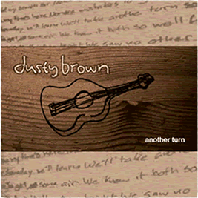
I've always thought that names like Tex, Clint, Dusty and, unless your surname happens to be Williams or Snow, Hank should be avoided at all costs by country musicians, they are just too much of a cliché.
I should have known that such narrow-mindedness would come back to bite me, and so it has with the Swedish band Dusty Brown and their excellent album Another Turn.
The album may well have been born and recorded in Sweden but its heart and inspiration lies in the heat of the Southern states of USA.
The effect their brand of low-key country rock has, is quite amazing. The band is laid back to the point of being horizontal, relying on their respective musical talents and instincts rather than any great theatrics or showmanship. On this evidence it's not a bad policy.
First the bad news. I may be missing something obvious, but nowhere on the CD can I find a track listing - in fact it took an e-mail to the band to get one which is included below - I have to admit the absence of any titles is initially a little disconcerting.
That aside, it's the overall 'feel' of the album that is its real pleasure, built around an acoustic base it is a homespun version of country rock. No airs no graces you could imagine the foot-stomping Scream being the star turn at the dance that followed a country fair, while the sheer sensitivity and thought behind the writing of Enough is magnified by the simple honesty of its performance.
By the end of Another Turn, its country of origin and lack of names is totally eclipsed by the brilliance of its music.
Track listing: Bastard, Let It Rain, Reaching, I Do, Scream, Enough, Hug, Back, The Letter, Another Turn, Take My Hand, Hide, Bright Light.
Michael Mee
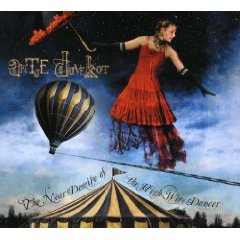
The opening cut Vertigo was co-written with the multi-talented Mark Erelli, who contributes mandolin and harmony vocals. Duvekot's narrator, a woman in love, compares the sensation to walking on a highwire and readily admits her discomfort - "I lied about the vertigo, And I have never been up this high." Architect of the twelve-string jangle that helps propel Ragdoll Princes & Junkyard Queens is the one and only Duke Levine. Think of the lyric as a poetic travelogue, and the same can be said of her old song Long Way (which immediately follows). John Gorka supplies a harmony vocal to the latter, while verse-on-verse Duvekot's narrator traverses America in the
Seamus Egan, leader of the renowned Irish music band Solas, produced Duvekot's previous studio album Big Dream Boulevard. That recording featured three Antje/Seamus co-writes and two more appear on The Near Demise Of The High Wire Dancer, respectively The Bridge and Scream. The waltz paced Coney Island is a pleasant travelogue/love song, as is her reprise of the already familiar Dublin Boys – relative to lyric content, an overall pattern is emerging. Last year's Snapshots reprised material from Duvekot's early career, self-released solo recordings. The disc included three previously unreleased studio cuts, and here she reprises Merry-Go-Round a reflection upon the multi-faceted tapestry that is human life.
Duvekot closes with Augen, Ohren Und Herz (translates as Eyes, Ears And Heart) by Gerhardt Schone, a [East] German children's music composer whose music she grew to love as a child (living in West Germany). An English translation of the lyric in the liner booklet would have been appreciated. It appears that I may be swimming against a rather powerful current relative to my assessment of Antje's music. Her career in folk music is most assuredly on the up, and in that regard an estimable music business scribe has compared her to Patty Griffin. That said, while musically adequate and agreeable, I have yet to hear a Duvekot creation as focused and goose bump inducing as Patty's Makin' Pies or Burgundy Shoes. Score 7 out of 10
Arthur Wood, Kerrville Kronikles, June 2009
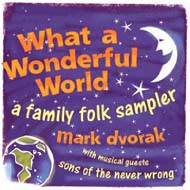
It's unfortunate, but the title of this CD is just a bit offputting. I cringe at mere mention of that Louis Armstrong song, and always have done. If it weren't for the fact that the record's released by that excellent label Waterbug, I'd have been tempted to give up and pass it on to another reviewer. Even so, the opening cut - a rendition of When The Red Red Robin Comes Bob-Bob-Bobbin' Along, another of my non-favourite songs - didn't exactly put me in a good mood. But thereafter, Mark presents us with a collection of songs that (with one or two exceptions) no-one would be embarrassed to teach to the kids, and certainly plenty of songs that are worth an airing. Fans of Mark Dvorak will need to know that all but four of the tracks have already been available on his previous records (which are all currently out of print, more's the pity): one comes from 1992's Use It Up, Wear It Out, eleven from 1995's Old Songs And New People, and three apiece from 1996'sJust Something My Grandma Used To Sing and 2000's Weavermania Live. Mark's simple and accessible performances are charming without being twee, and above all refreshingly unpatronising, while his selection of songs enterprisingly embraces several that we don't hear often enough, like fun songs by Woody Guthrie (Put Your Finger In The Air, Lay Down Little Dogies, My Daddy Flies That Ship In The Sky) and Dave Williams (Little Pink Pig), and that brilliantly intelligent piece of hokum I'm My Own Grandpa. These are unashamedly placed alongside Malvina Reynolds' thoughtful God Bless The Grass and established classics like Oh Susanna and This Land Is Your Land, with Brownie McGhee's Jump Little Children and two intriguing Leadbelly-associated items providing further roots interest. Mark gets suitably spirited (but not over-cooked) support from a host of Chicago's finest folk musicians, and The Sons Of The Never Wrong help him out on the four newly-recorded cuts. Shame about the bookending tracks (even tho' they're tastefully and unsentimentally done - but that's personal preference for ya)! The rest is unpretentious magic for kids of all ages: oh yes!
David Kidman August 2008
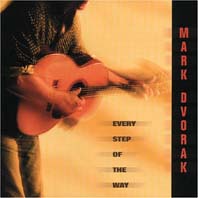
Mark's a new addition to the Waterbug stable; though Chicago-born, he's well described (as on the CD's accompanying press release) as "a folk-singer's folk-singer who follows unerringly in the footsteps of Guthrie, Leadbelly, Broonzy and Thieme". Definitely not a navel-gazer then, for his music is easy-going, affectionate and all-embracing, with effortless traces of good-time country, blues, old-time pop, swing and back-porch; I hear everything from Johnny Cash (the title track) and Billie Holiday (Don't Let The Blues Make You Bad) to the Everlys (My Rose Of Jericho) and Terry & McGhee (One Couldn't Run...), yet Mark's writing's not without its darker side too: That Old Man is a sensitive tribute to his father, while Not War is a powerfully simple piece very much in the style of the 60s patriotic protest song, with soulful and haunting bowed-bass accompaniment from Al Ehrich. As well as the trusty Keith Baumann (mandolin, resophonic and National steel guitars), Mark's expert backing crew also includes Dave Moore (button accordion), Tony Dale (percussion) and three backing vocalists. The latter provide a crooning chorus on a handful of cuts including You'll Make It Somehow, which is like a compendium of every barroom heartache ballad you've ever known. Which brings me to the one slightly nagging impression that Mark's music leaves, its only (minor) drawback, in that his tunes often sound so very heavily reminiscent of classic songs, not exactly derivative (though some are so darn maddeningly familiar!) but it's that they don't always entirely avoid the charge of pastiche or over-conscious homage; one exception though is My Rose Of Jericho, which though uncannily like Green Green Grass Of Home, manages to transcend the mawkishness of that song. And his cover of Nat King Cole's Smile (though efficient) ends the CD on a rather routine note, I feel. Well I may not be there with Mark "every step of the way", but altogether I believe that Mark can be seen as a natural heir to the aforementioned Guthrie et al., with a well-developed sense of the living tradition and certainly having the ability to carry it forward with songs that resonate both with all aspects of that tradition and of our own time.
David Kidman
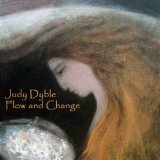
Four years on from the folk, jazz and avant garde mix of Talking With Strangers (variously reissued in 2010,2011 and 2012), Fairport's original female singer returns with her much anticipated fifth solo album, one steeped very much in a chamber folk style (though not forsaking her jazz colours) with strings and piano the dominant bedrock and a bank of musicians drawn from , among others, the ranks of King Crimson, Counting Crows and Spiritualized.
A reassurance that depression, fear and doubts are all perfectly natural provides the unusual the theme for the opening metaphorical Black Dog, rumbling guitar, lap steel, keyboards, snyths and Julianne Regan's background vocals weaving a sort of dark musical box mood before, a memoir of her and her two sisters musical childhood, Featherdancing brings a suitably airy breeze the strings evoking images of cafe orchestras.
Family also informs piano and strings lullaby Beautiful Child (Freya's song), a darkling-tinged hope for the future dedicated to her granddaughter that leads naturally, if a little pessimistically into Crowbaby, one of the more musically experimental numbers with its scratching effects and brooding guitar splinters, which sees childhood as a brief era of peace and protection before entering the carrion demands of the world.
Yet these four numbers are merely a prelude to what follows with the tranquil all things much pass reverie of Driftaway, the progressive-folk 60s sound of a deceptively gentle Head Full Of Stars, the loneliness-laden Silence with the string section compounding the oppressive melancholia, Letters, a stately, almost medieval at times, piano backed duet with Matt Malley about parted lovers doomed to remain separated thanks to the inefficiency of the postal system, and Wintersongs, a tender remembrance of lost love soothed by piano and cello.
Then comes the album's closing tour de force, the nigh 12 minute Sisterhood Of Ruralists, a celebration of a modern-day Pre-Raphaelite creative collective of artists (many of whose work is featured in the album booklet) that, beginning with piano chords reminiscent of Procul Harum's A Salty Dog, shifts time signatures and moods as it goes, unfurling an enchanted pastoral atmosphere that reflects the mythical and nature imagery of the lyrics as she captures the paintings, jewellery and glass work in song. A true treasury.
Mike Davies July 2013
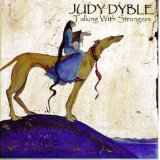
Don't get too excited, this isn't a new album by the original female singer from Fairport Convention. Her first fully released album (2004's Enchanted Garden and 2006's Spindle and The Whorl were very limited) in over 30 years, this originally appeared in 2009. A stylistically adventurous affair that saw her collaborating with Robert Frpp and Ian McDonald as well as Simon Nicol, it embraced folk, jazz and avant garde experimentalism in equal measure on numbers such as Jazzbird, Neverknowing, Grey October Day (a duet with Tim Bowness) and the 19 minte epic autobiographical epic Harpsong, a track that took off into a jam-lie esoteric section of Eastern psychedelia and free form jazz.
However, the album never received a US release, a matter now rectified by this reissue that also features two bonus tracks, Sparkling and Waiting, recorded at the same time but originally released on 2010's limited edition Fragile EP. The former a shimmering folk tune with acoustic guitar and electronic sheen that reflects the title and the latter a six minute, more musically experimental, number with Bowness providing the e-bow soundscapes of what sound like geese calls. A brand new album, Flow And Change, is set for release some time this year.
Mike Davies March 2013
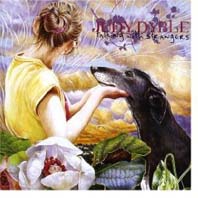
Judy's certainly astute in her choice of collaborators, and for her latest recording venture, Talking With Strangers, she gathers together a batch of brand new songs co-written (co-conceived) with No-Man's Tim Bowness and Cromer Museum's Alistair Murphy. Perhaps uncharacteristically for the work of a librarian (sic!), the disc's contents defy easy classification - for if anything, it's an even more intelligent mix of psych-folk, retro and prog, with spellbinding textures that are lush and heady yet with strands keenly, crisply separated by virtue of abundantly imaginative scoring and an adept use of new technology.
But however consistent the purely musical vision, it's nevertheless Judy's ultra-pure, utterly distinctive (and still tremendously beautiful) singing voice that remains both the most vital unifying force of the project and its aural focus, invariably stopping the listener in his/her tracks and compelling one's attention. Judy sweeps us along with her on a spiritual journey from the deliberately uncomplicated, gentle acoustics of the deceptively simple folky Neverknowing, by way of the mysterious and charming exotic innocence of the swirling, swooning autoharp-rich Jazzbirds, the enigmatic chansonnière of (Greg Lake and Pete Sinfield's) C'est La Vie (the album's one cover), and the pleading, desperate searching of the title track, thence by way of the confidences of Judy's Dreamtime and the melancholy reality of Grey October Day onto the final stage of her quest. Here Judy bares her soul and (you might say) lays down her weary tune (through "the strength of strings", of course) on the epic (19-minute) and necessarily episodic Harpsong; here the joyous optimism and celebration of the power of musical creativity that has become a constant for her personally, conjoining then and now and the future, becomes an overpowering life-mantra. The experimental wyrd-folk of Trader Horne meets the nascent prog-rock of King Crimson head-on during the course of this final track, with an extensive instrumental middle-section that wouldn't have sounded out of place on In The Wake Of Poseidon, say.
Harpsong sets the artistic seal on an inspirational record: one that's all the more extraordinary an achievement for having been recorded remotely - such is the technological expertise of Tim and Alistair in giving Judy's songs wings in order to fly in contributions from all over the globe. These have come from near at hand (Simon Nicol, Jacqui McShee, Julianne Regan, Robert Fripp), France (Celia Humphris), and the USA (Ian McDonald, Pat Mastelotto), while the list of other musicians involved includes Mark Fletcher, Laurie A'Court, Rachel Hall, Sanchia Pattinson and at least four guitarists!
And to fully complement the music on the disc itself, another strongly unifying signature of the project is the exceptionally fine cover and inlay artwork (by John Hurford and Koldo Barroso respectively), which has a very striking visual impact and is acutely well conceived and reproduced. The press release statement, that "Judy feels it's the best album she's ever produced", proves no hollow claim. It's magic, it really is.
David Kidman August 2009
This latest release in The Bootleg Series collects together for the first time, in strictly chronological order, 47 demo recordings made by the barely-into-his-20s Bob Dylan over a period of 2½ years during which he developed an urgent maturity as a performing artist that was as striking as his songwriting prolicity.
In January 1962, almost exactly halfway between the recording and the release of his very first LP, Dylan recorded a demo session for music publisher Leeds Music, with whom he'd just been accorded a contract; its eight cuts (three of which came from his club repertoire, one of these – Man In The Street – supplementing a fragment with a more complete rendition, and the remainder were newly-written) showed Dylan quite wildly hitting out in all directions trying to carve his own way, not entirely certain of his direction (it would seem) and yet with an often uncanny (prescient) confidence establishing his own take on a range of influences both predictable (Woody Guthrie) and wholly unlikely (Howlin' Wolf).
At that time, Dylan was a songmaker in the true sense (and arguably less of a songwriter-poet as we now understand the tag), innovatively transforming source materials (which included traditional folksong as well as songs by those aforementioned, and other, progenitors) by writing new hard-hitting or caustic or wickedly funny words to age-old melodies carrying resonances beyond those ages into the present and the future. He'd encountered Mike Seeger in the early days at Greenwich Village, and admits that Mike was likely to have been a particular influence in his perhaps subconscious decision to (in effect) write his own folk songs. Either way, it's clear from these demos that Dylan was developing his craft – and fast! – under his own motto of "Don't Look Back" no doubt, and thus rapidly becoming what could only be fairly termed a creative genius.
Only four of the tracks on this pair of well-filled discs have been previously released, on earlier titles in the (official) Bootleg Series (by which statement I mean the very same recordings, as opposed to other contemporary performances of the songs themselves by Dylan himself in alternative outtake or demo or live versions). Of course, we know many of the actual songs from the official canon of Dylan's Columbia albums, but in a large number of cases there are fascinating comparisons to be made in matters of treatment (Boots Of Spanish Leather is but one telling example), lyrics (Tomorrow Is A Long Time), or instrumentation or accompaniment (The Times They Are A-Changin', When The Ship Comes In and a handful of others that are piano-backed).
And while a good many of the more familiar songs (like Blowin' In The Wind) are delivered with an extra degree of immediacy, a sometimes weary urgency that complements the roughness of delivery, others gain much with Dylan's rather different (here wistful, croaky, fragile, almost subliminally emotional) delivery. In that respect, Tomorrow Is A Long Time in particular is probably THE discovery of the entire set: a real revelation (this, we learn, is the very studio take that Judy Collins overheard and immediately decided she must cover the song), for, as well as Dylan's amazingly emotional vocal performance, it contains some sublime guitar phrasing that belies the oft-peddled putdown that Dylan was at that stage a mere strummer. Similarly, Mama You Been On My Mind gains in intense impact here due to the pained poignancy of Dylan's reading. Mr Tambourine Man, the penultimate recording in the set, is interesting in that the almost casual unfolding of its defiant, stubborn ramblings is so keenly focused against the clunky, tentative piano backing. Finally, the markedly elusive I'll Keep It With Mine (the status of which as a Witmark demo had once been contested) brings the second disc to a close.
A significant number of the songs on this set, 15 in all, have never before been heard in any incarnation on a previous Dylan release. Notwithstanding the fact that some are mere fragments and a few others are (you gotta admit) decidedly underwhelming or just plain below-par, the 15 contain some real gems, however, in the form of often striking indications of what might have been, and paths not taken – notably the plaintive, thoughtful and incredibly mature Ballad Of A Friend and the resigned Guess I'm Doing Fine (which is also quite astonishing for a mere 23-year-old). Other previously unheard songs that can be deemed richly deserving of outing include Hero Blues, the fatalistic Long Time Gone, and the two civil-rights-era-inspired pieces (Long Ago, Far Away and the legendary, bitingly confrontational The Death Of Emmett Till).
As far as sound quality is concerned, the vast majority of the 47 cuts are pretty fine; some (like Walkin' Down The Line, I'll Keep It With Mine and Mama, You Been On My Mind) suffer from varying measures of bad distortion, but even the worst examples tend to be an improvement on the versions hitherto only available intermittently on obscure bootleg discs. Inevitably, there are a few instances of dropout or slipped edits, and quite a few coughs, fluffs, forgotten lines and false starts on Dylan's part – but hey, none of these seriously spoil the historical importance of these recordings. Presented in their totality here, these demos represent a kind of missing link, a parallel history that charts Dylan's development as increasingly confident songwriter and performer during the course of that crucial couple of years near the very start of his career, placing the official Columbia releases in a different and often quite exciting context.
Presentation is largely up to the high standard set by previous volumes in The Bootleg Series, and the booklet essay by Colin Escott provides some intriguing new details while enabling us to appreciate a different perspective. Steering clear of merely regurgitating received opinion, Escott posits Dylan's natural yet then-radical adoption (in a climate where music publishing was customarily the means to an end in persuading other artists to cover one's songs) of the role of the all-encompassing singer-who-was-also-a-songwriter-and-performer, a strongly-characterised individual rather than a Guthrie clone. The essay is complemented by reproductions of some original lyric sheets and a few rare photos. The only significant detail missing from the booklet is that of actual recording dates – although we are told that the sequence presented is almost entirely accurately chronological, it would have been helpful to have been given the full facts really (after all, not everyone has ready access to Clinton Heylin's celebrated sessionography Dylan: Behind Closed Doors).
But even so, in my opinion this new set's definitely one of the most valuable issues in the Bootleg Series thus far, and emphatically not just for Dylan completists or hardcore enthusiasts.
David Kidman December 2010
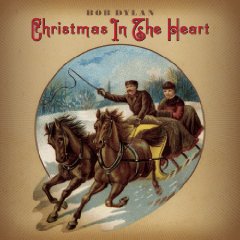
So, here you have it. God rest ye merry Zimmerman, he's ringing those silver bells with his first album of carols and Christmas holiday songs, singing them perfectly straight, and packaging them in a box with a photo of Bettie Page as Santa's Helper on the booklet and a cover that looks like a Norman Rockwell Christmas Card. Indeed, you even get a bonus package of 5 cards and envelopes of the same design.
Before saying anything else, it should be pointed out that all Bob's international royalties are being donated in perpetuity to the World Food Programme and Crisis UK, to provide meals to school children in the developing world and to feed the homeless in the United Kingdom during Christmas week. Likewise, his American royalties will be donated to Feeding America. One might ask of Sony are doing likewise.
The question being is it worth buying or should you just give the money straight to charity? Well, quite frankly, between the twee scrubbed up Holiday Special backing singers, jaunty jog and Bob's delivery, Here Comes Santa Claus couldn't sound creepier if it was done by Freddie Krueger and when he 'sings' along with angelic carollers on The First Noel, your first thought is to warn child protection services.
However, while it's not exactly going to go down a storm with fans of Andy Williams or Bing Crosby and those rasping, phlegmy tones and offkey notes can make you wince, if you try and think of it as somewhere between Louis Armstrong and (on Little Town of Bethlehem and The The Christmas Blues especially) Tom Waits, it may prove to have more charms than you first thought.
Sure there's a couple of numbers (Winter Wonderland and a Latin mangling Oh Come All Ye Faithful), you want to get over with as soon as humanly possible, but the Tex Mex polka romp through Must Be Santa, Christmas Island's hula sway, the lazy jazzy drawl through The Christmas Song and the slow military beat march of Little Drummer Boy are all genuinely growers. Slightly surreal perhaps, but somehow I'd rather have Bob roasting his chestnuts by my open fire than Mariah Carey or Taylor Swift.
Mike Davies October 2009
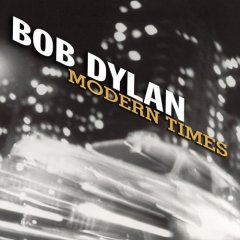
Supposedly the final part of a musical trilogy that embraces Time Out of Mind and Love and Theft, this has been hailed as one of his greatest albums, a self-produced Dylan masterpiece. Well, let's not go overboard. It's very good but it's not going to be one future audiences return to in polls to come and vote superior to Blood On The Tracks, Blonde on Blonde, Highway 61 Revisited or Desire.
But that was Dylan then and this is Dylan now, and in terms of his more contemporary output it does warrant much of the praise that has been lavished, not least for the way he's managed to combine very relevant social and political observations with a music that was old before he first started blowing a harmonica.
Listen to Beyond the Horizon (musically very derivative), the dreamily nostalgic romance of When The Deal Goes Down where his croak takes on a burnished hush, or the lovely Spirit On The Water (where he defiantly jibes 'you think I'm over the hill, you think I'm past my prime") and you're back in the soft shoe jazzy crooner days of the 30s; complete with what often sounds a lot like Hawaiian guitars lapping away in a manner more associated with Leon Redbone or Hoagy Carmichael. Elsewhere the band lopes into rockabilly or rocking blues strides, opening with a laid back Chuck Berry boogie on the lyrically loping Thunder On The Mountains (an often vitriolic song that bizarrely references Alicia Keys who apparently makes Bob cry because she's overcome hard a tough childhood), harking back to his Woody influences with Rollin' And Tumblin', and scuffing along with the roadhouse blues for Someday Baby.
But if there's no snarls to the melodies, Dylan still infuses his material with bite. Listen to Workingman's Blues 2, an elegiac back porch folk blues lament for the blue collar poverty trap that now passes for the American economy where the export business demands that 'low wages are a reality'.
Or the rolling riffing blues of The Levee Gonna Break, a veiled metaphorical reference perhaps to New Orleans perhaps with 'some people on the road carrying everything that they own' in a divisive country where 'some people are gonna strip you of all they can take.
And then there's the nine minute last track Ain't Talkin', an Old Testament revenge fuelled doom laden blues-folk semi-spoken dirge about 'cities of the plague' and those who would 'crush you with wealth and power' in a weary modern world where 'the suffering is unending'. The times they are, it seems, not a-changing that much after all.
Cheery it's not but despite the album's notes of pessimism this is a far from nihilistic Dylan. Even Levee contains lines where he remarks that love can ease a troubled mind while, conjuring a mood of sun dappling on still water creeks, the lazily strummed seven minute Nettie Moore is an uncut love song from a dying man, a 'lost John sitting on a railroad track' remembering the woman he left behind as the world grows black before his eyes.
Modern Times may not be a Dylan masterpiece for the ages, but it's certainly very welcome in the here and now.
www.bobdylan.com
en.wikipedia.org/wiki/Bob_Dylan
Mike Davies, Sept 2006
Bob Dylan - No Direction Home: The Soundtrack (The Bootleg Series Volume 7) (Columbia/Sony)
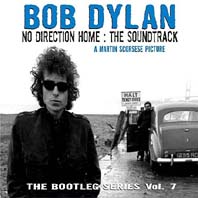
The latest edition in the excellent Bootleg Series is a two-CD, chronologically sequenced package. It contains 28 tracks (of which 26 are previously unreleased); with just two exceptions these are drawn from a combination of private recordings, concert/festival/ TV appearances, together with 12 alternate takes of songs recorded at studio sessions. The inclusion of the two previously released and easily available recordings (Song For Woody, from Dylan's first album, and the famous "Judas" take of Like A Rolling Stone taken from Volume 4: Live 1966) is explained by the Volume's raison-d'être, ie as a companion soundtrack to the two-part feature-length film No Direction Home: Bob Dylan, directed by Martin Scorsese and receiving its UK première on BBC2 on Monday 26th and Tuesday 27th September. But whatever the rationale, it's a well-compiled, compellingly-sequenced and fine-sounding release that contains more than a few items of sufficient rarity to tempt even those Dylanophiles with an already extensive bootleg collection. (For instance, Sally Gal appeared on The Freewheelin' Outtakes, on the Witmark Demos, Blowin' In The Wind and Masters Of War on Town Hall, NYC April 1963, She Belongs To Me and It's All Over Now Baby Blue on Thin Wild Mercury Music, and five other takes on Highway 61 Revisited Again). That still leaves some real valuable curios, though. First up is an "audio snapshot" from 1959 (When I Got Troubles), recorded by one of Bob's high-school friends, then a 1960 home-taped recording of Rambler, Gambler. An early highlight of this set is an only recently unearthed, superbly intimate rendition of This Land Is Your Land taken from a 1961 Carnegie Chapter Hall concert. Another is the fiery "sound of a man with lightning in his pocket" (Eddie Gorodetsky's words) live Newport version of Chimes Of Freedom. And that famed first moment from the electric set at Newport, a supercharged Maggie's Farm, heard in a newly-found source tape revealing the full power of the recently-co-opted Butterfield Blues Band. But there are so very many tremendous performances on this set that cast well-known material in a different light (always a feature with Dylan, right up to the present day).
Disc 2 includes the celebrated first take of Desolation Row, with its glorious electric-guitar backing and intriguingly variant lyrics ("spoon-feeding Casanova the boiled guts of birds", for example), as well as a unique, slow, bluesy take of Leopard-Skin Pillbox Hat (with two extra verses) that at a stroke forces re-evaluation of a song I'd considered a bit of a throwaway; there's also fascinating alternate takes of Tombstone Blues and Visions Of Johanna, and a lower-fi live Ballad Of A Thin Man captured in Edinburgh in May 1966. Although this release is a companion to the Scorsese film, it does not merely duplicate the recordings used in the film (there's a DVD release of the film itself in parallel) - for example, with regard to Mr. Tambourine Man, Volume 7 here presents the first complete studio take (with Rambling Jack Elliott joining Dylan), whereas the DVD and film present the 1964 Newport Folk Festival performance instead, and on When The Ship Comes In the CD has the October 1963 Carnegie Hall performance whereas the film features the Washington civil rights march performance with Joan Baez. As far as presentation is concerned, Volume 7 easily maintains the high standard of previous volumes, with sound quality very fine indeed, while both CDs and 60-page colour booklet are housed in an elegant slipcase. The booklet contains a track-by-track discussion, excellent photographic coverage and essays by Andrew Loog Oldham and Al Kooper, the latter being especially revealing in his reminiscences of the recording sessions for Highway 61 Revisited and Blonde On Blonde. As I've hinted already, even Dylan fanatics who claim to have everything will still want to purchase this release, but for those who hitherto only collected the official studio releases this set is an immensely valuable tool to aid appreciation of Dylan's massively important contribution to music in his pre-crash years.
David Kidman
Bob Dylan - The Bootleg Series Volume 5 - Live 1975 (The Rolling Thunder Revue) (Columbia-Legacy)
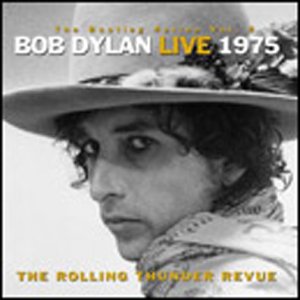
At last, an official release for one of the most popular and unpredictably-bootlegged areas of Dylan's output – the extensive, and deservedly more-than-legendary, Rolling Thunder Revue tour in late 1975. Considering the high artistic quality of the recordings made on that tour, I've never quite understood why only a couple of items recorded on this tour, Isis and Romance In Durango, had ever been "properly" released – and at that, on the unduly expensive 1985 set Biograph - so this new release is all the more welcome (and by the way, those two cuts aren't duplicated here).
Dylan admirers don't need remindin' that 1975 was the year of what was indisputably one of his greatest achievements – the Blood On The Tracks album – and the year that he authorised the official release of at least some of the "basement tapes". A vintage year, therefore, even without a stunning live act, this time ambitiously (some say foolhardily!) revolving around a nine-piece band (though this time less of a rock-and-roll troupe and more like an "old-time medicine show", a veritable "caravan of gypsies, hobos, trapeze artists, lonesome guitar stranglers and spiritual green berets…"!) and positively welcoming contributions from an array of guests as itinerant as the Revue itself. Dylan was audibly fired up by the chemistry, and in the process of being "reborn" as a credible touring artist (after a series of fallow years and a couple of lacklustre studio albums, then having tested the water with a Band-accompanied comeback tour the previous year). Having said that, good as the Revue's looser band-format outings are (and most of them are really storming – check out A Hard Rain's A-Gonna Fall for instance!), Dylan really shines on the solo performances tucked in here – Tangled Up In Blue, Mr. Tambourine Man and a really powerful rendition of Sara (predating and surpassing the studio version on Desire, released only a short time later very early in 1976) being but three of the highlights. Back with the guests though, the four duets featuring Joan Baez are particularly memorable too.
This two-disc set comes with a fairly lengthy composite memoir by "Ratso" (Larry Sloman, author of On The Road With Bob Dylan), and the booklet also contains a plethora of contemporary photographs (though some have been carelessly cropped). The 22 tracks on these CDs have been newly mastered from pukka professional sound-truck recordings made at just four of the venues on the tour, and sound absolutely superb, with atmosphere a-plenty. Yes, this is an essential purchase; tho' even more so if you can also get hold of the limited-edition companion bonus DVD (which I couldn't – boo hoo…!).
David Kidman
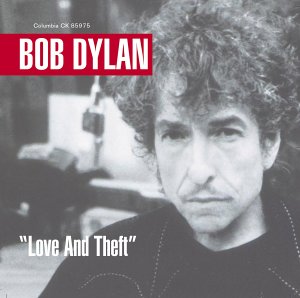
As anyone who saw the recent tour will testify, his Bobness was in high spirits and having a good time. Looks like he and the boys in the band were partying in the studio too, since after the mournful tone of Time Out Of Mind this, his 43rd album, positively kicks up its heels and boogies. Yet it also casts its mind back to the classic tradition of American song that crackled out of the young Robert Zimmerman's radio. Tweedle Dee & Tweedle Dum may not make much lyrical sense but it rattles along like an express train, guitar whistle blowing and a sense that there's a laugh riding shotgun in the guard's van. Mississippi brings it down slightly for a Forever Youngish country melody and a tale of hard times and struggle ("got nothing for you, I had nothing before, Lord don't even have anything for myself anymore") yet this time with a sense of defiance as the ship goes down. Or as he puts it, "Stick with me baby, stick with me anyhow, things should start to get interesting right about now." Then it's back to good timing ("everybody get ready lift up your glasses and sing") with a straight up rock n roll swingabilly Summer Days that wouldn't sound out of place on a Bill Haley collection while, if the voice were a little croakier, Bye And Bye is the sort of lazy 20s sugar blues number you might mistake for Leon Redbone. Same's true of Floater (Too Much To Ask) and the laid back and back porch hammock swinging lazybones romancer of Moonlight, two songs that makes you positively want to rush out and catch catfish. Someone suggest a Willie Nelson duet at once.
Vintage Bob echoes come a knocking with Lonesome Day Blues which pays another musical visit to those Rainy Day Women and then even further back to his Woody roots with a banjo plucking bluegrass and outlaw blues High Water that arrives just too late for a slot on Oh Brother, Where Art Thou? Soundtrack.
Honest With Me is back to rawk n roll, slide guitar yelping away like a klaxon, digging up the basement again and finding another buried tape. "The siamese twins are coming to town, you can't wait to gather them round," he yowls a propos of nothing in particular as the song heads off down Highway 51. As you might surmise from the title, another ragtime blues Po'Boy makes a feature of his cracked croon, disarmingly recounting how the narrator's uncle, who ran a funeral parlour, took him in when his mother died "and did a lot of nice things for me." It's old school blues time again for Cry A While, but one that keeps breaking away from its standard 12 bar boogie as the time signature lurches into a remarkable staccato lurch that, as if joking around with the genre, only a genius could pull off with such casual finesse. Which winds it all up with Sugar Baby, a sort of reflective plantation lullaby about acceptance, vaguely Daniel Lanois in mood, that remarks "you can't turn back, you can't come back, sometimes we push too far. One day you'll open up your eyes and you'll see where you are." It's the song and sound of a man at peace, content to let things be as they roll along and remember the roads that brought him here, but also a man who isn't about to settle back into his myth and smoke his slippers yet awhile.
Mike Davies
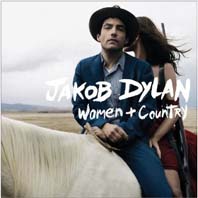
Seeing Things, his first solo album after leaving The Wallflowers, was a bare bones acoustic affair but the follow-up is much fuller project, one which bears the unmistakable stamp of producer T Bone Burnett (who handled the first Wallflowers album and was part of the Rolling Thunder Revue) and features such high profile session names as Marc Ribot, Dennis Crouch, David Mansfield, Greg Leisz and Jay Bellarose with Neko Case and Kelly Hogan providing back ups.
Although there's Slow Train Coming echoes on the bluesy slow burn We Don't Live Here anymore, the baritone Dylan's never really sounded much like his father, but you can certainly hear other influences at work.
The opening track, the quite wonderful Nothing But The Whole Wide World, has the same sort of laid back tapped rolling rhythm of early Don Williams hits alongside more than a hint of Townes Van Zandt while Lend A Hand is of the clanking Tom Waits bourbon jazz variety, a softly burred Down On Our Own Shield conjures Daniel Lanois atmospherics, Holy Rollers For Love the early Jackson Browne and a countrified Everybody's Hurting shimmers with the same lonesome desert heat Burnett imbued Burning Sand.
Addressing questions of spirituality, loss of direction, social injustice and the vicissitudes of love, he may not have his father's way with a lyric, but, as "we're up to out throats in knives' demonstrates, that doesn't mean he can't pen a memorable line. Equally, Truth For A Truth and the pedal steel lilting border country Smile When You Call Me That are ample evidence of an effortless ability to write melodies that get inside your head.
It's hard to fathom some of the mealy-mouthed US reviews that have greeted the album, but this is easily his finest hour and certainly a strong contender for my year of bests.
www.jakobdylan.com
www.myspace.com/jakobdylan
Mike Davies April 2010
The phrase 'tribute band' has become synonymous with ubiquitous cash-in copycat acts of dubious quality. Which is a shame because, in the best sense of the word, 'tribute' aptly describes this laudable reworking of the master's works by the Dylan Project (DP). Despite the fact that Brummie rocker Steve Gibbons sounds uncannily like Bob Dylan, this band is no pale copycat and the album brings you their own distinctive take on the material. Above all, respect shines through.
All bar one of the 14 tracks are Dylan songs - the set opening with Gibbons' own 'in the style of' composition Colours To The Mast. The setlist includes many of the early- and mid-period standards including a lyrical Simple Twist Of Fate and a storming Highway 61 Revisited.
As a live act, DP takes some beating. This is particularly true of the charismatic Gibbons - ever a man for a jam, the encore finds him leading the DP through Like A Rolling Stone before sliding seamlessly into Twist and Shout, reprising the Dylan classic for the enthusiastically-received finale.
There's so much to relish in this 70-minute amble through the repertoire. As well as Gibbons' admirable and admiring vocal homage to Dylan, the ensemble behind him pays equally worthy tribute to the legendary tightness and musicianship of The Band. PJ Wright is on consistently good form playing scintillating slide and hauntingly mellifluous pedal steel; Simon Nichol adds compelling rhythm guitar and fine backing vocals; Dave Pegg brings his distinctive and powerful bass (just listen to his subtle solo on You've Gotta Serve Somebody); and the whole groove is held together by Gerry Conway's exceptional percussion. And as a bonus (the core DP line-up doesn't include keyboards) renowned guest Rabbit Bundrick's fine contribution to the Cropredy set reflects the character which Garth Hudson's organ brought to Dylan's late 60s sound.
www.hedgeofsound.com/dylans.html
Princess Florence
This disc appeared in tandem with another pipe-band disc back in 2006, and somehow escaped my net – a pity, for it's an enterprising issue that brings a slightly different perspective to the standard pipe-band release. This Fife-based pipe-band has a long and proud history (going back to 1929), and has amassed an impressive total of over twenty individual Championship wins over the years. Their latest CD presents an invigorating mixture of competition tunes and other equally well-suited material. That entails plenty of typically stirring sets of marches, hornpipes etc, giving us the unadulterated pipe-band sound we know and love - and especially well-drilled examples of its art too. Elsewhere, the musical climate is cleverly varied on occasion with the inclusion of a couple of slow airs, a set of fine own-compositions played solo by band member Douglas Murray (on the Highland bagpipe) and two sets which feature the band's current Pipe Major Brian Lamond playing the Scottish smallpipes. Other enhancements to the basic band texture are provided by guest musicians on accordion, guitar, keyboards and percussion, and although (as on Kintail and The Ale Is Dear) tastefully enough applied, these seem (especially on initial acquaintance) to not quite belong, even though they deserve a better assessment than being accorded the status of classy background-music. There's also a vocal performance by guest Andy Hunter, of The Yowie's Horn, which leads off the spirited set of that name early on the disc. Overall, the disc proves an interesting listen, which improves with acquaintance - and even though it can't exactly be said to comprise "Terra Incognita" in the literal sense I suppose, that's not intended as a complaint at all! By the way, the booklet notes also include a detailed history of the band itself, which adds further interest.
David Kidman March 2008